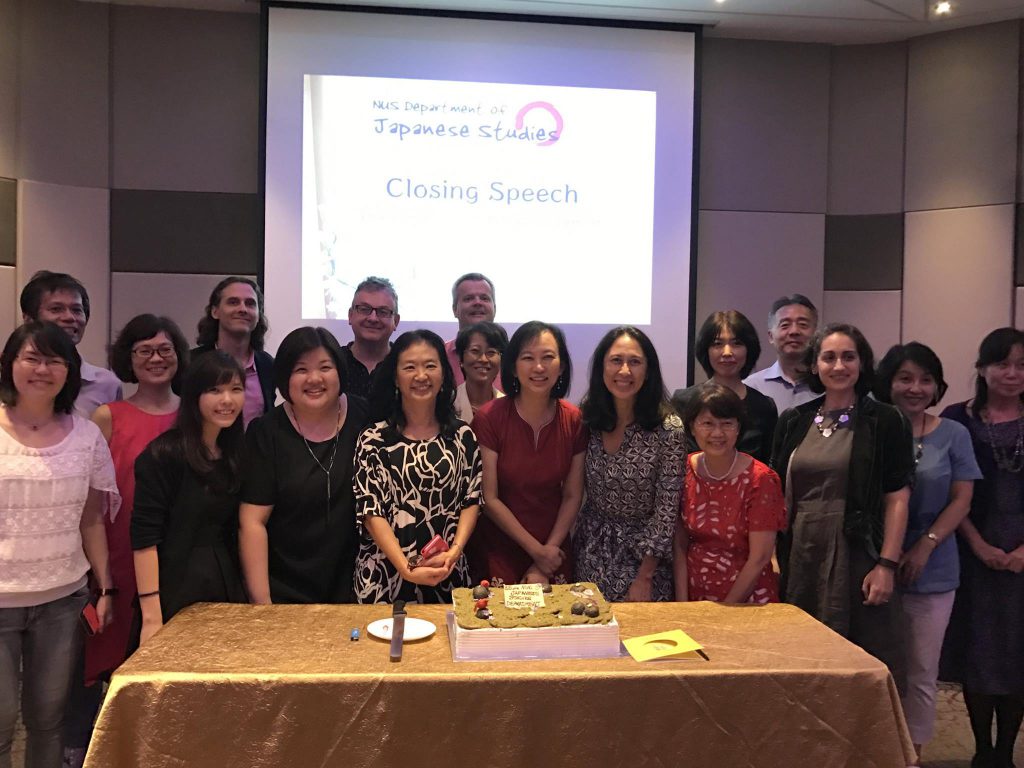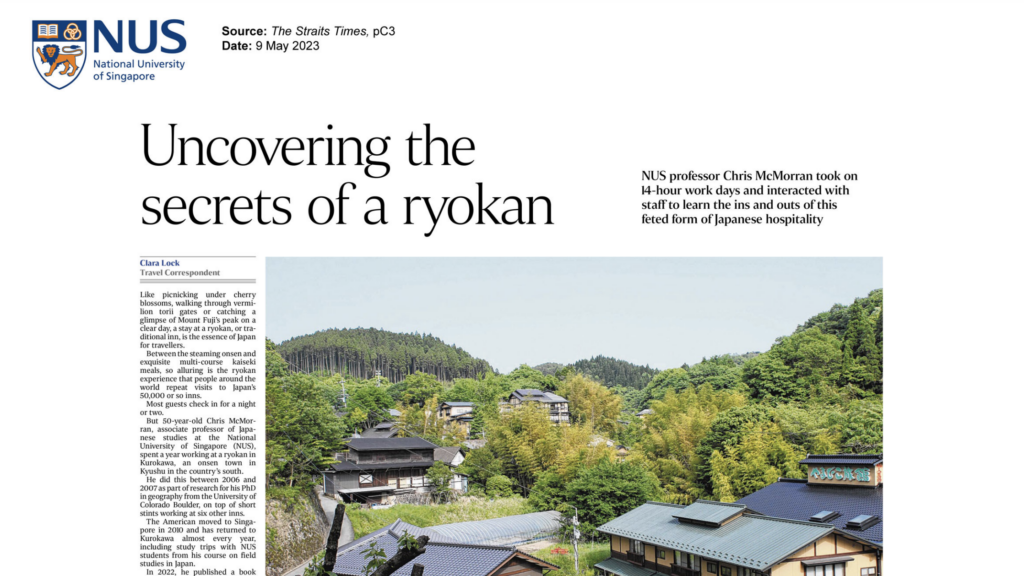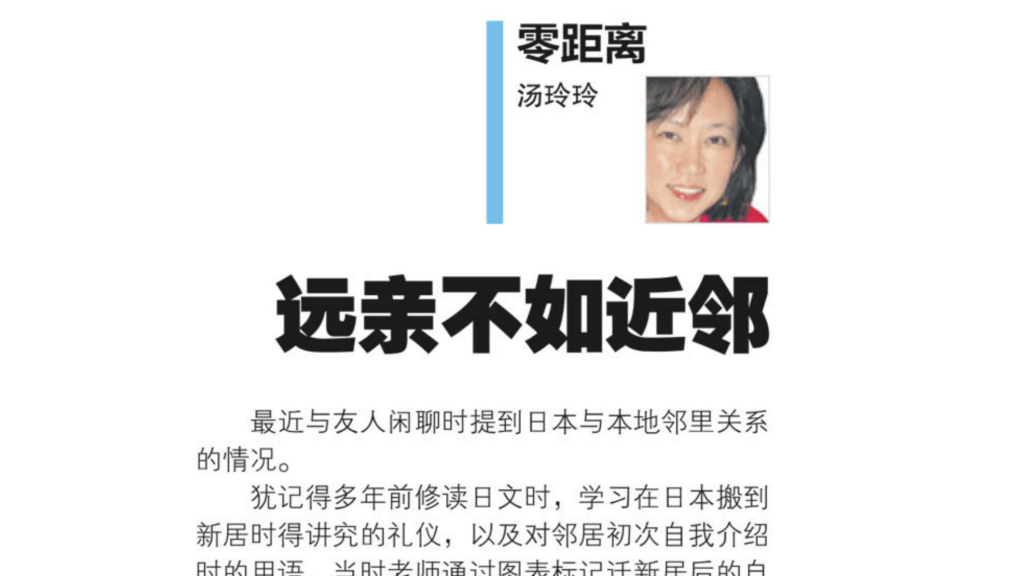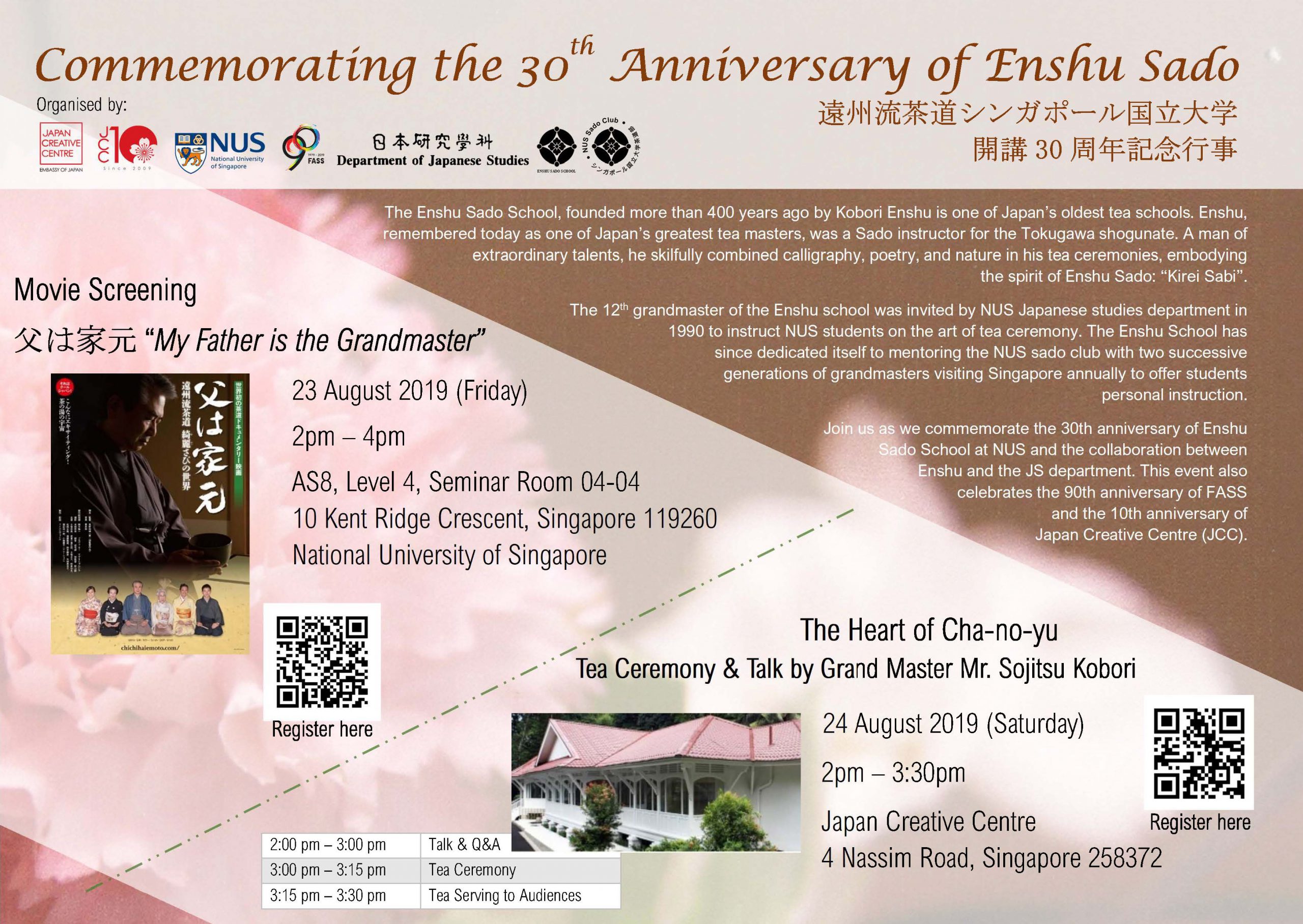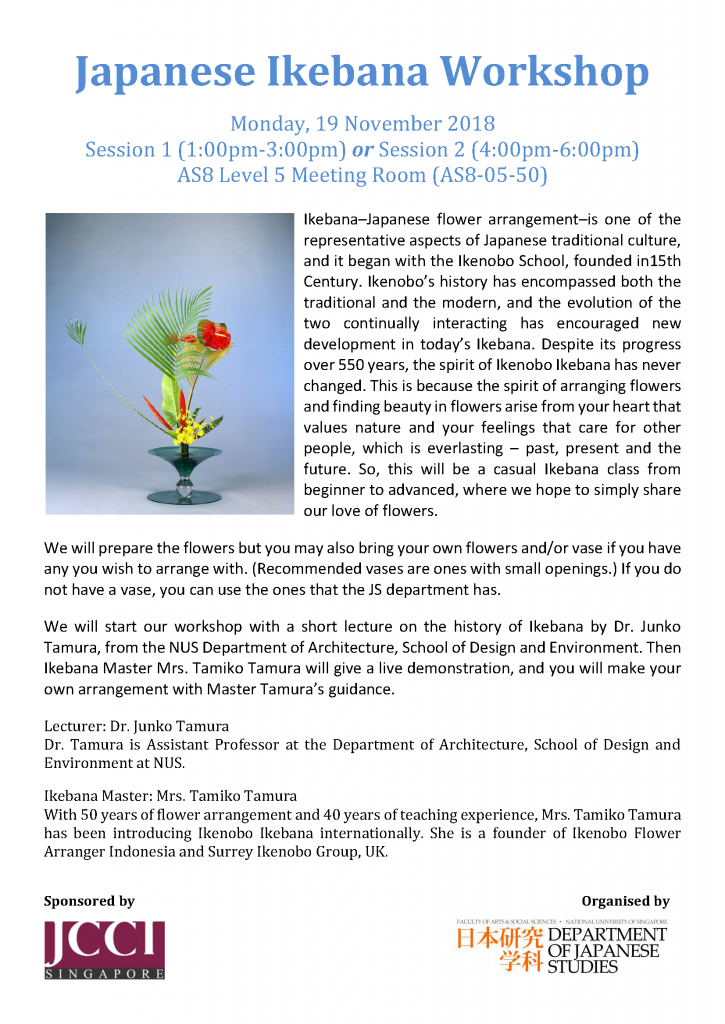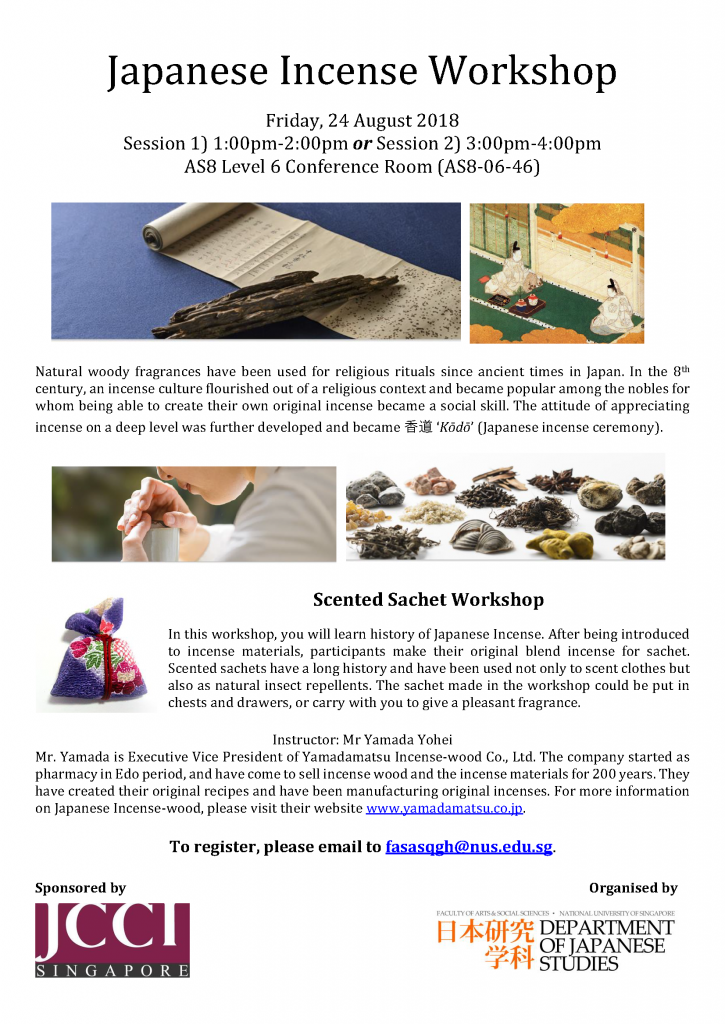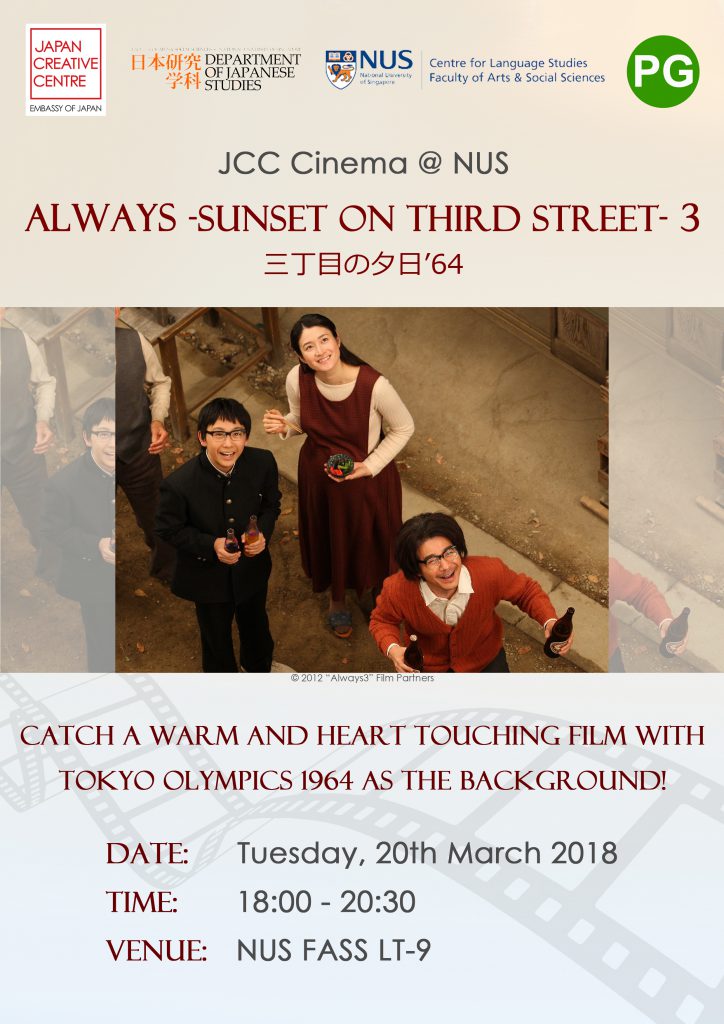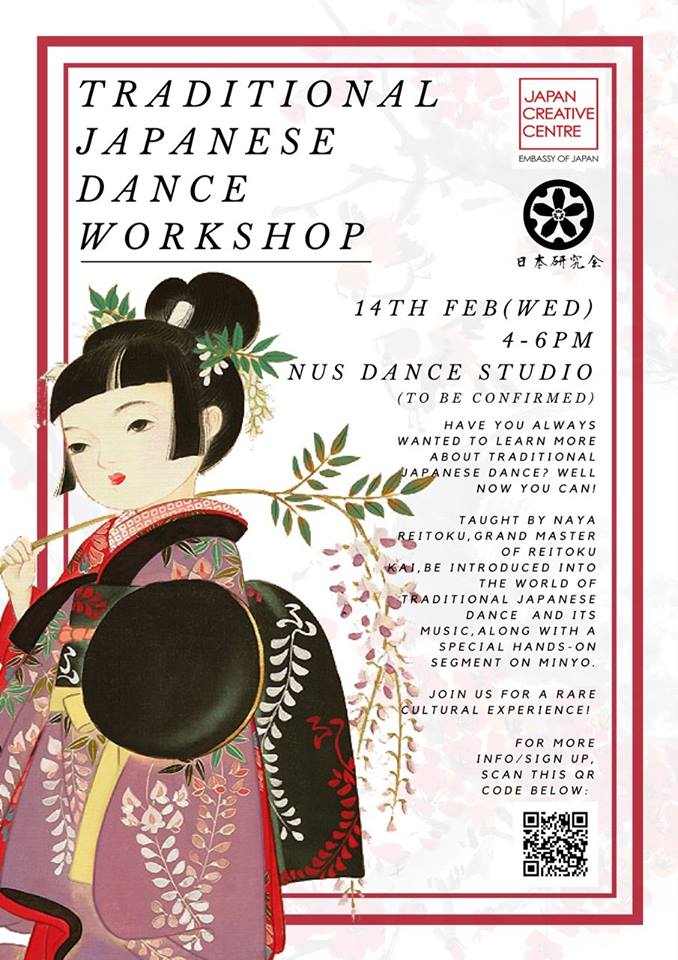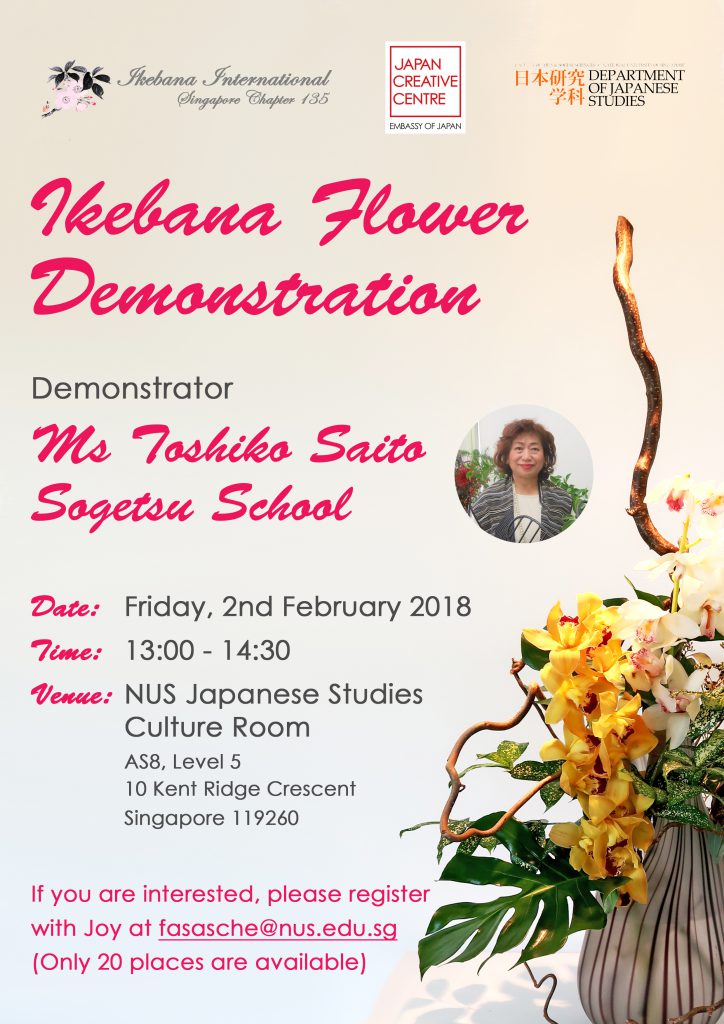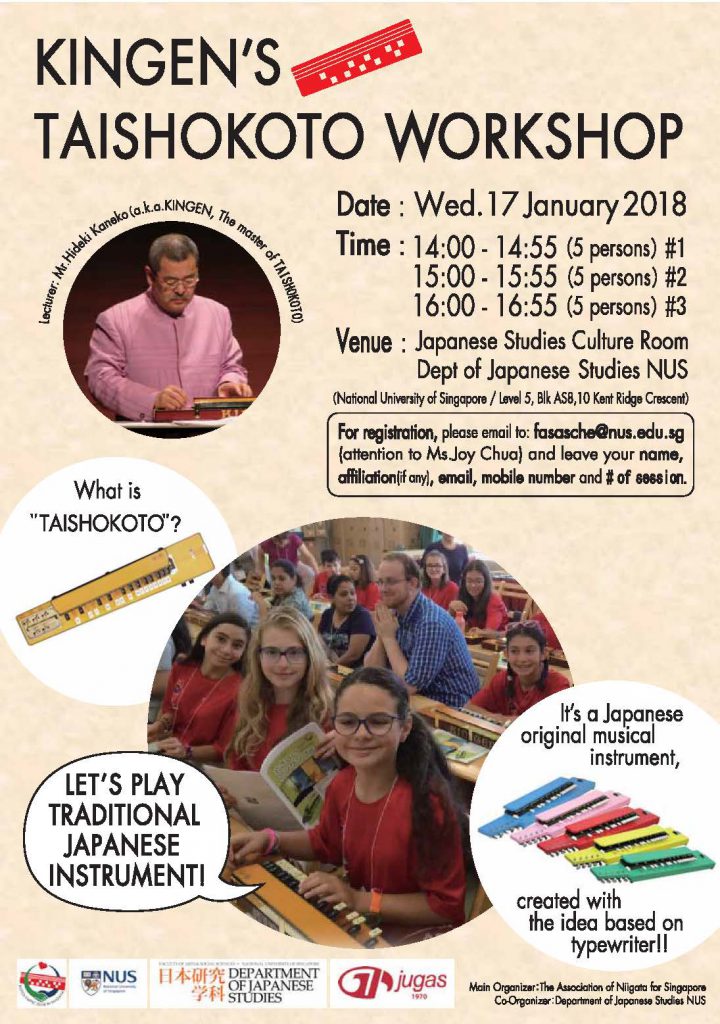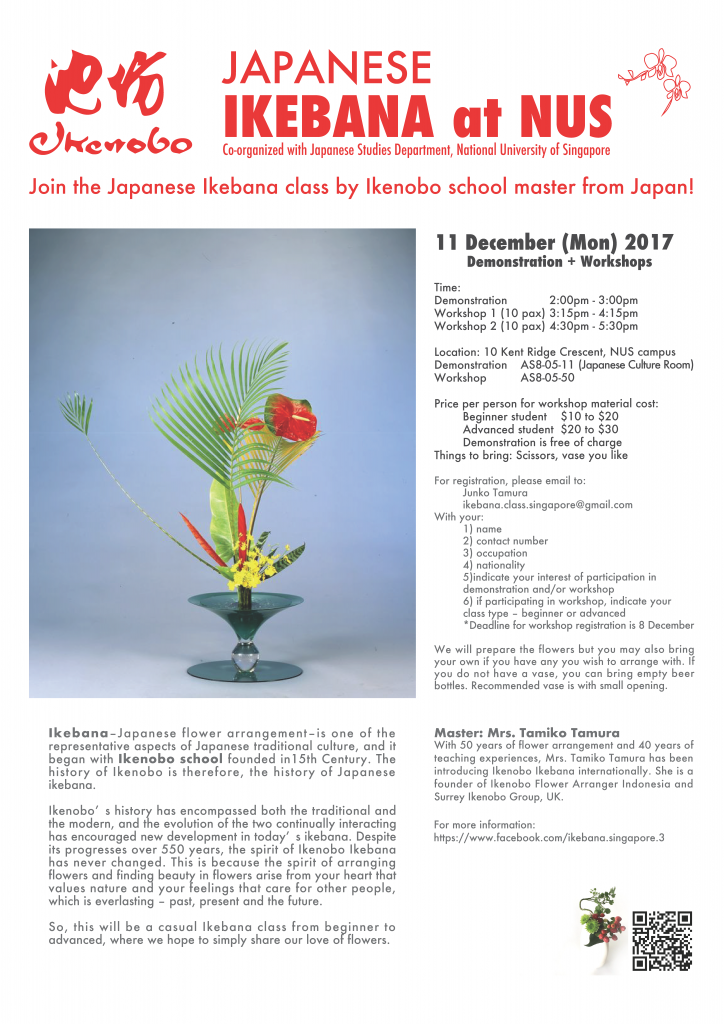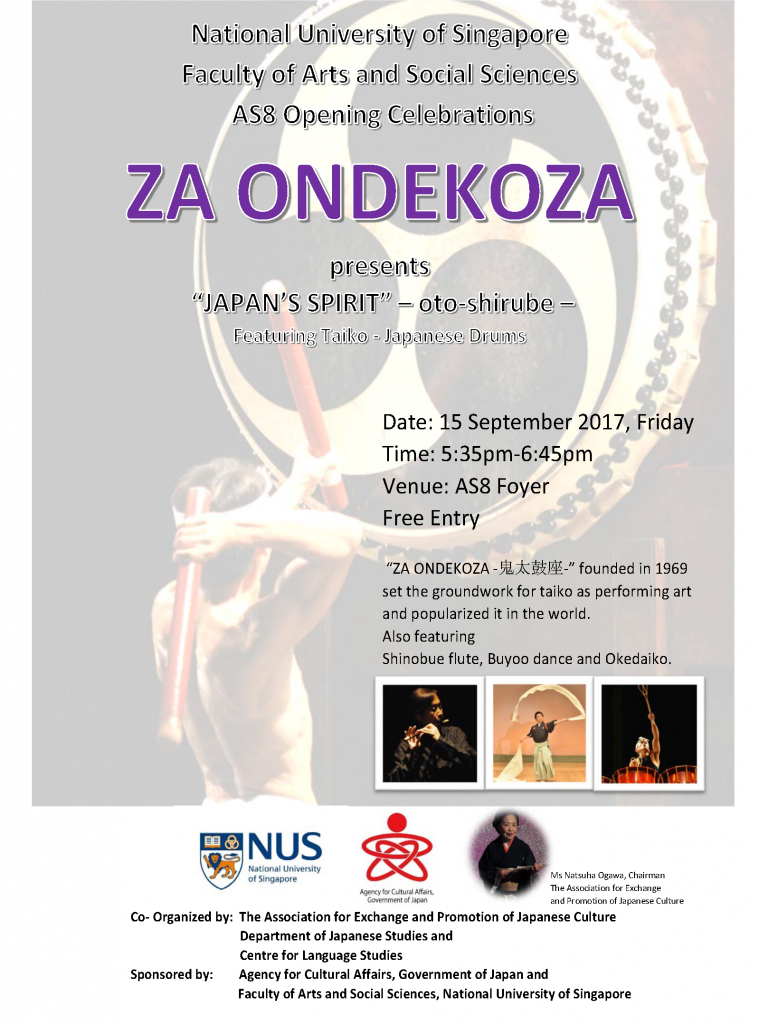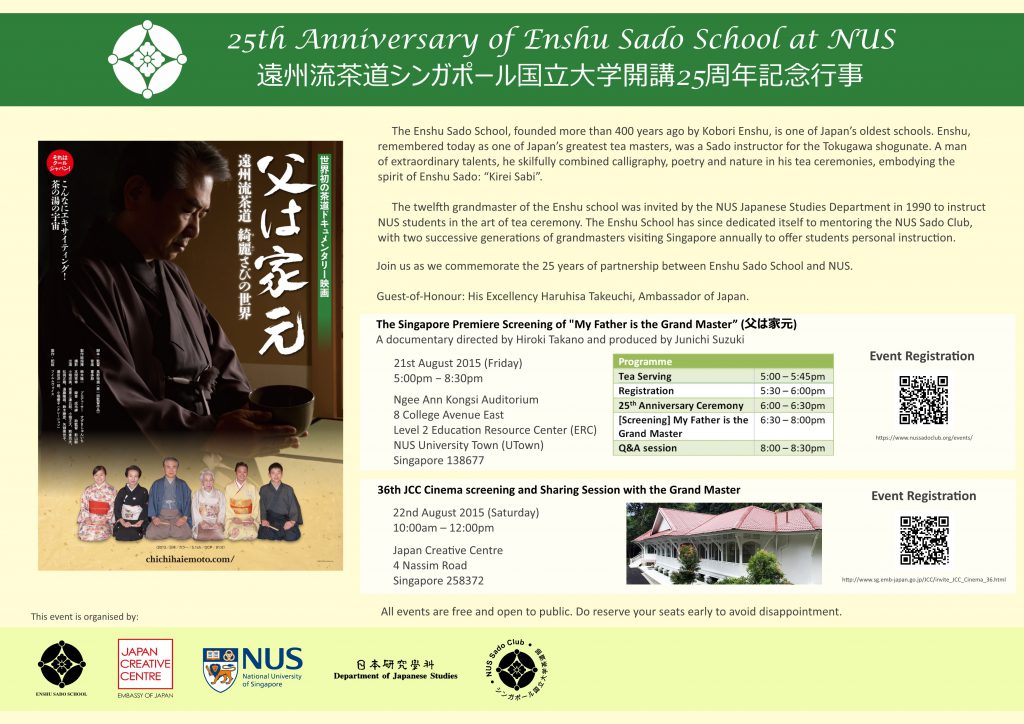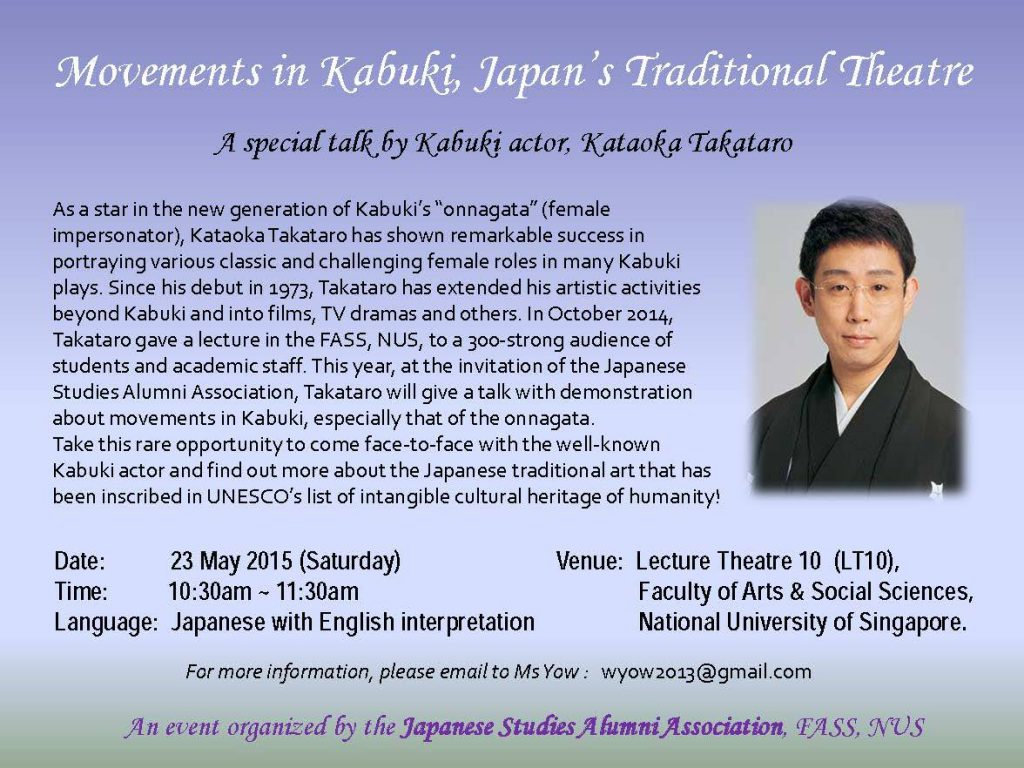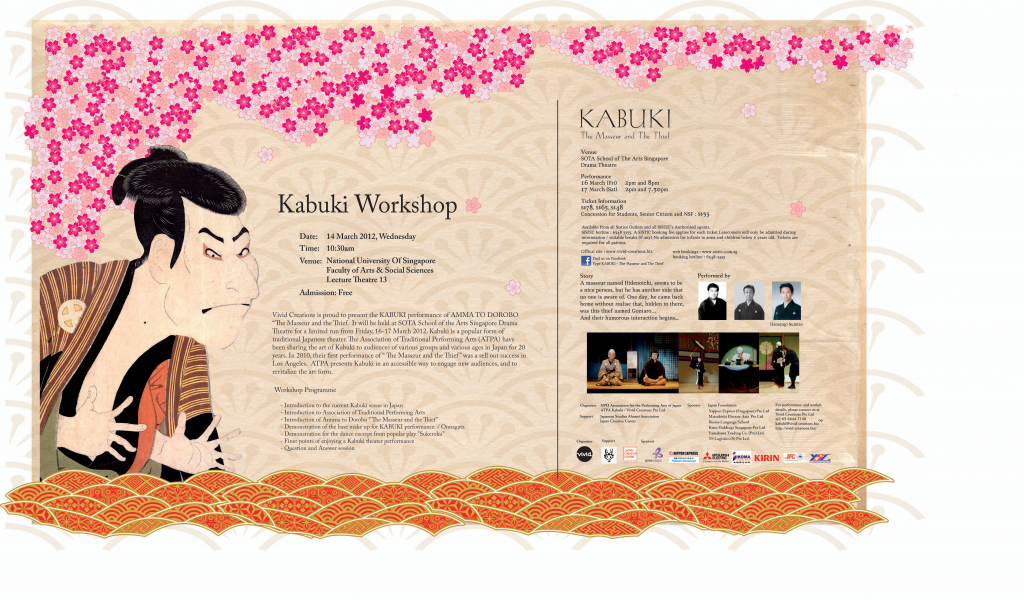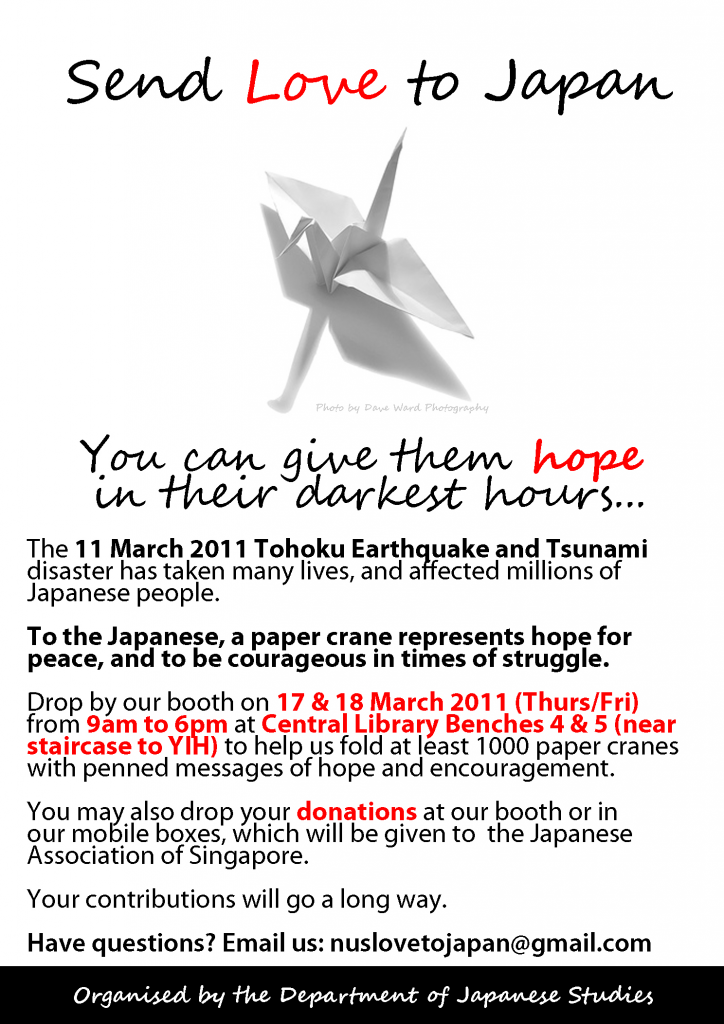News
Teaching with heart: The human side of higher education

Forget the confines of a lecture theatre, abstract theories and math equations. For their core Economics introductory course at NUS, students found themselves not in a classroom, but outside Sri Mariamman Temple where their phones buzzed with a Telegram chatbot's cryptic challenge: "All are welcome past the door. So when footwear outside are a-plenty, the temple is a ______, and when footwear outside are a-wanting, the temple is a ______."
Exchanging puzzled looks, the students typed "/hint" into the chat. "If there are many pairs of footwear outside, it must be crowded (and uncomfortable) inside," the chatbot prompted. After recognising the relevant concepts, they typed the answers into the Telegram chat before receiving a clue to their next location.
It is not every day that students participate in a chatbot-guided scavenger hunt as part of their core Economics introductory course. But Associate Professor Ong Ee Cheng, Mr Chan Kok Hoe and Dr Timothy Wong from the Department of Economics at the Faculty of Arts and Social Sciences believe that experiential learning can help students better understand key economics concepts in everyday contexts.
This was one of many innovative teaching strategies presented at the Higher Education Conference in Singapore (HECS) 2025. Organised by the NUS Centre for Teaching, Learning and Technology (CTLT), the event held on 10 December 2025 gathered educators from universities across Singapore to explore how to enrich learning experiences.
This year's theme, "Building Relationships in Teaching and Learning", echoes Prime Minister Lawrence Wong's call for education to move beyond narrow definitions of success, and empower learners to discover and develop their unique strengths, in his speech at the Debate on the President's Address 2025.
"It is most fitting that HECS 2025 is championing the human dimension of education. This focus on relational teaching aligns with PM Wong's call to broaden meritocracy, creating environments where learning is joyful, fulfilling, collaborative, inclusive and future-ready," said NUS President Professor Tan Eng Chye in his opening speech.
The power of play
A recurring theme throughout the conference was the role of play in teaching - widely used in early childhood education but often undervalued in higher education despite being found to increase student engagement.

At NUS, faculty members have been experimenting with such approaches, several of which were showcased in the "Playful Minds: Learning Through Play" installation.
One example is the use of tableau, where students create a frozen, dramatic image with their bodies to interpret an abstract prompt. While tableau is most commonly associated with theatre studies, it is also used across humanities disciplines such as anthropology and philosophy, combining embodied, experiential and collaborative learning.
In HS2902: Do Play Play: The Importance of Play, an interdisciplinary course offered as part of the common curriculum of the College of Humanities and Sciences, students design card games about a social issue of their choice. In "We Just Bought a Zoo", for instance, players juggle the welfare of animals against profit-making, exploring ethical dilemmas surrounding captive animal welfare.
On the sidelines of the "Playful Minds: Learning Through Play" installation, Assoc Prof Ong added, "In the context of higher education, play is about moving away from extrinsic to intrinsic motivation - the feeling of 'I'm doing it because it's interesting and I'm curious, not just because I want an A'."
Different strokes for different folks
While much of the conference focused on undergraduate learners, speakers also highlighted the need to tailor teaching to different learner profiles.
In a paper presentation, Dr Ng Boon Yuen and Dr Ganthi Viswanathan from the Singapore University of Social Sciences (SUSS) examined how adult learners' sense of belonging affects their learning in online classes.

Unlike undergraduates who place greater emphasis on social connection, adult learners prioritise practical factors like convenience and flexibility. While the majority of surveyed students reported that they did not feel a sense of community with their peers, most were satisfied with online courses and planned to continue taking them.
However, this absence of a sense of belonging still manifests in challenges such as a lack of trust among members during group work, noted Dr Ng. To foster stronger rapport, one suggestion was for instructors to facilitate early relationship building through icebreakers and breakout rooms.
Creating a culture of care
Speakers also emphasised that meaningful relationships form the foundation of fulfilling learning experience, whether between educators and learners, or learners and communities. Within classrooms, small, intentional gestures can reshape dynamics. Dr Daryl Ooi, a lecturer at the NUS Department of Philosophy, called these "pedagogies of care".
"There are a lot of acts that happen to us and in our hearts, we are sorting out what is caring and uncaring," said Dr Ooi, who was representing an NUS learning community on pedagogies of relationality and care, at the workshop. Pedagogies of care respect students' autonomy and the plurality of their experiences, opinions and emotions. One participant shared how simply sitting on the floor with her students helped to reduce hierarchical barriers.

Reinforcing the importance of relationships in her closing keynote, Associate Professor Chng Huang Hoon, Director of the Chua Thian Poh Community Leadership Centre at NUS, said, "High-impact experiences have to be founded on relationships, community bonds and mutual trust. If we can enact an educational experience that is relationship-rich in- and outside our classrooms, we would have gone some ways in restoring the human in the work we do."
This story first appeared in NUSnews on 26 December 2025.
Photos from the Singapore Heritage Roundtable
Check out the photos from our Singapore Heritage Roundtable!
The roundtable was chaired by FASS Assistant Dean of Research and Foo Hai Associate Professor in Buddhist Studies Jack Meng-Tat Chia and opened by Ms Melissa May Tan, Director of Heritage Policy & Research at the National Heritage Board.
The programme featured four National Heritage Board Heritage Research Grant recipients from FASS:
- Dr Yang Yan (NUS Chinese Studies) – In Their Own Ways: Identification and Documentation of Singapore’s Chinese Medicine
- Dr Clay Eaton (NUS Japanese Studies) – Mapping Middle Road: Prewar Japanese Community in Singapore
- Dr Jinna Tay (NUS Communications and New Media) – Re-Interpreting Fashion Narratives in Singapore: De-colonising the Modern
- Assistant Professor Guo-Quan Seng (NUS History) – Small Businesses and Shops of Chinatown, 1819–1980s
You can also watch the full video recording here, and download the programme booklet here.

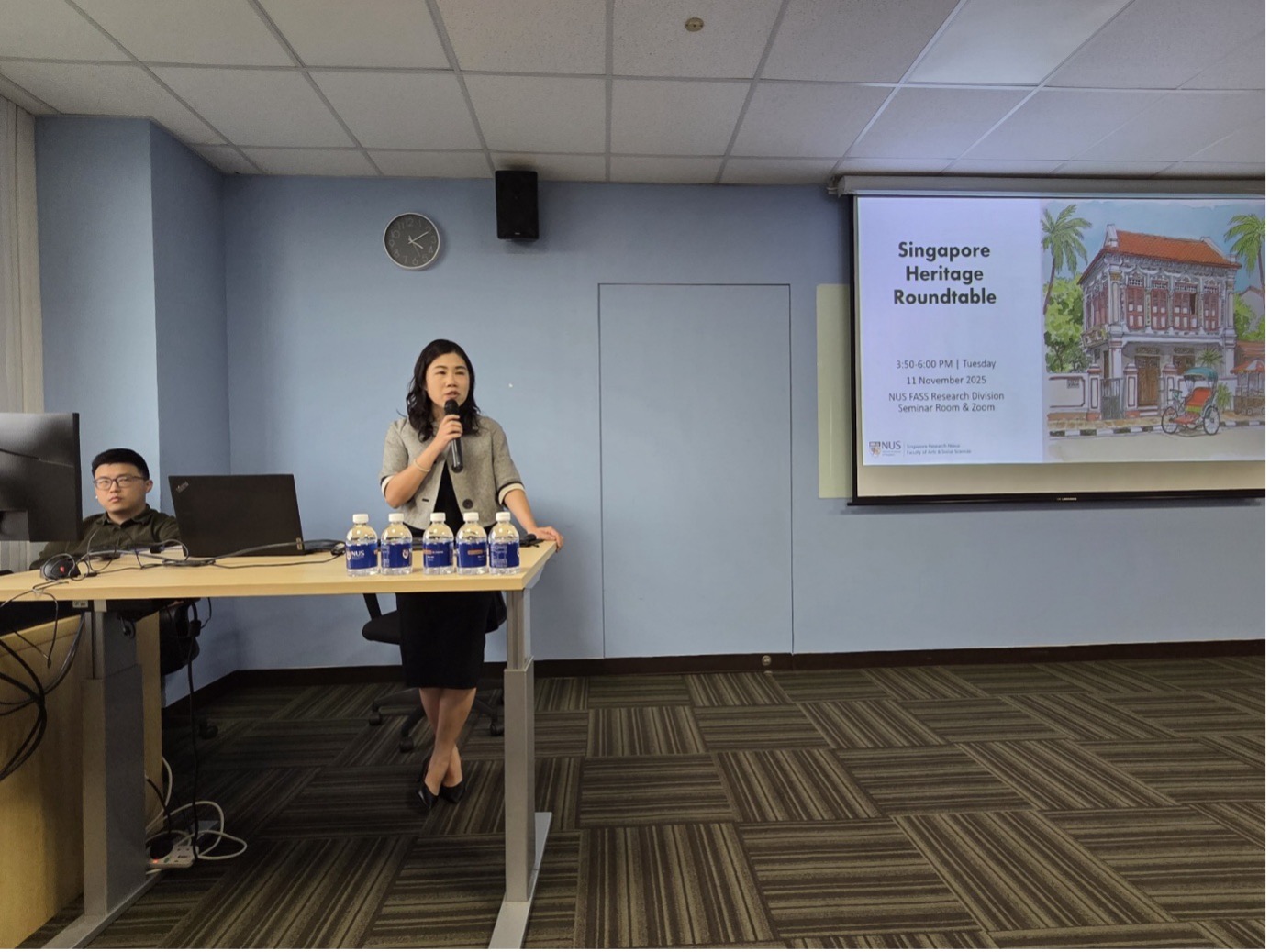

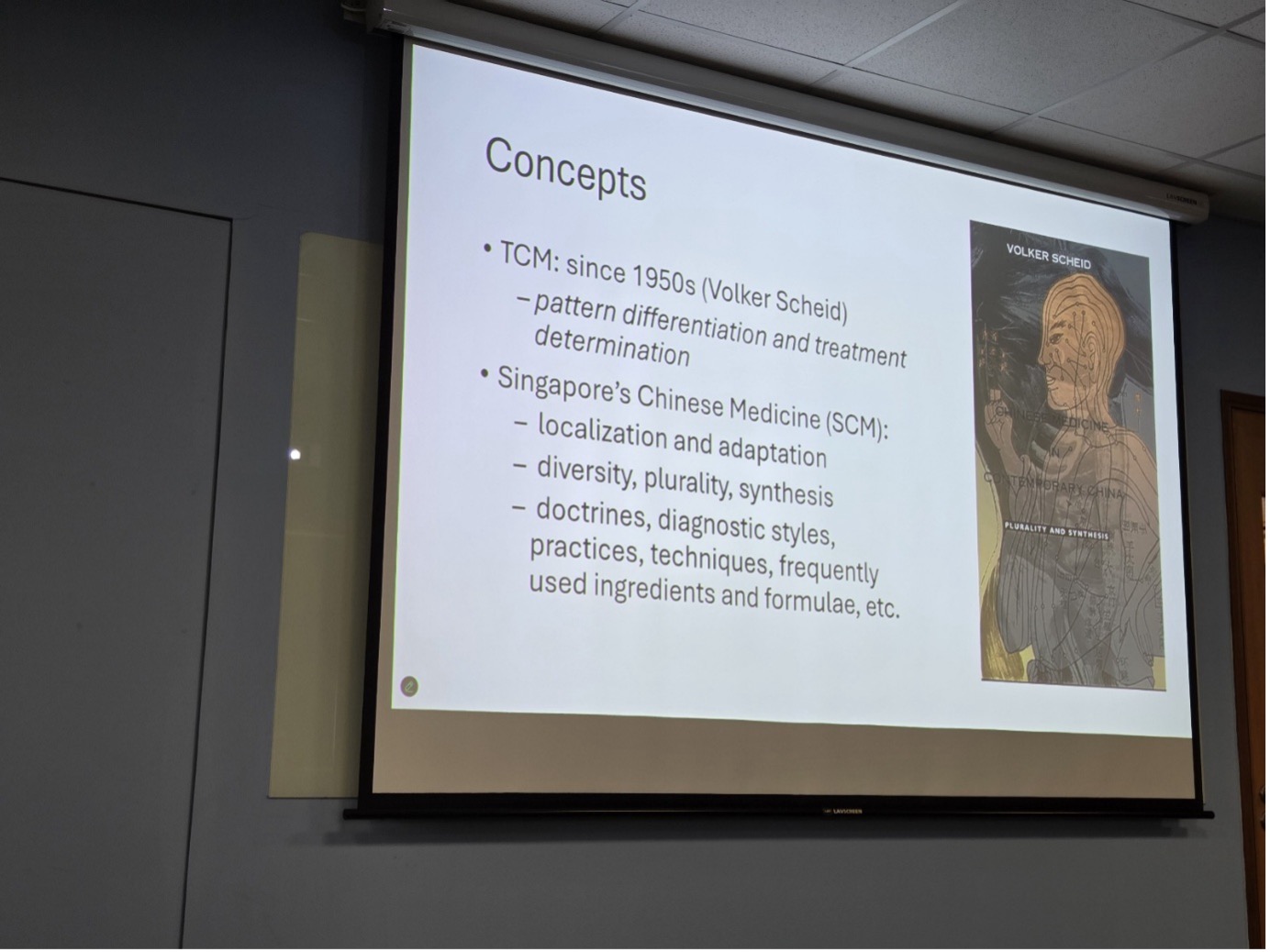

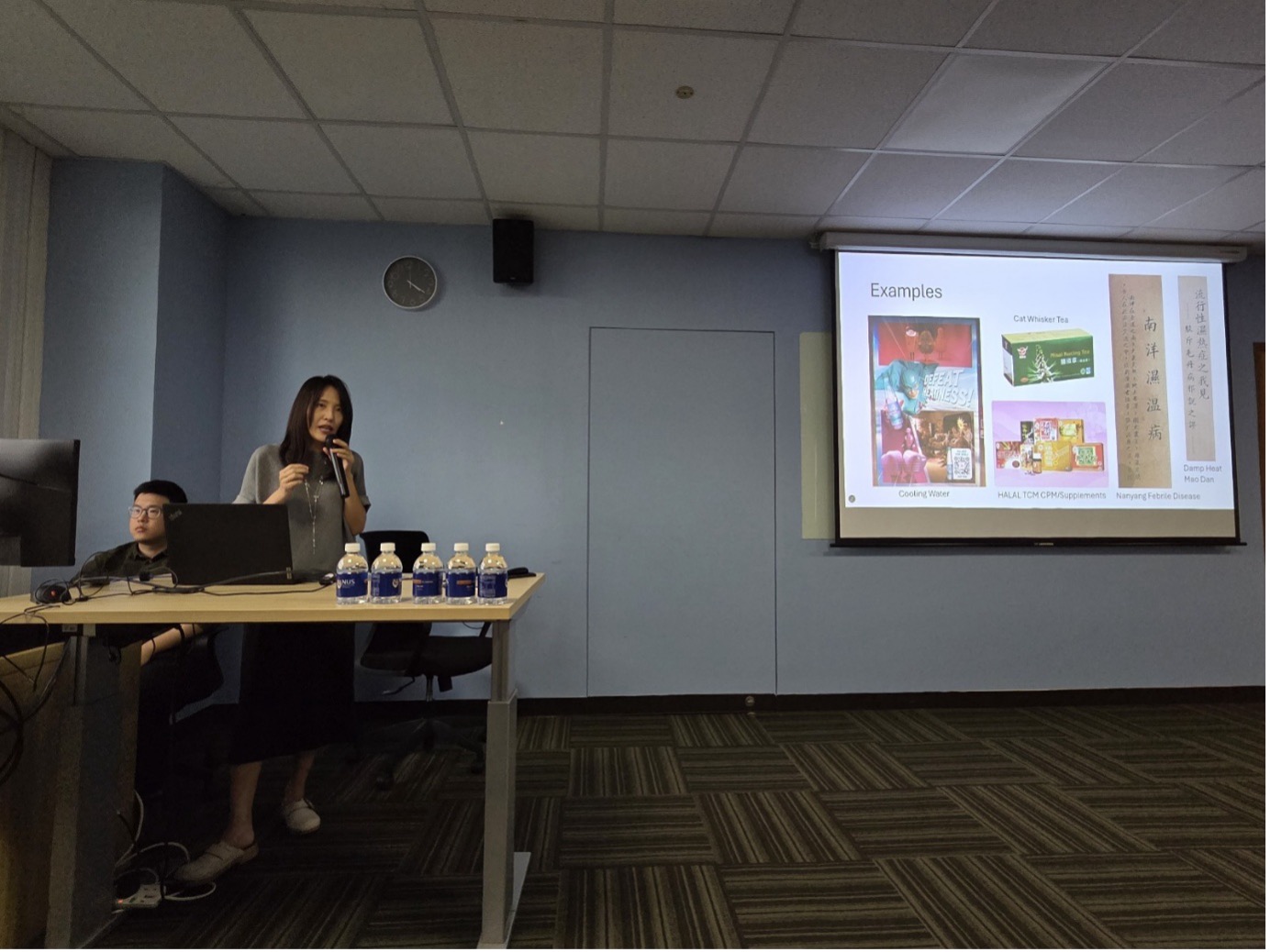
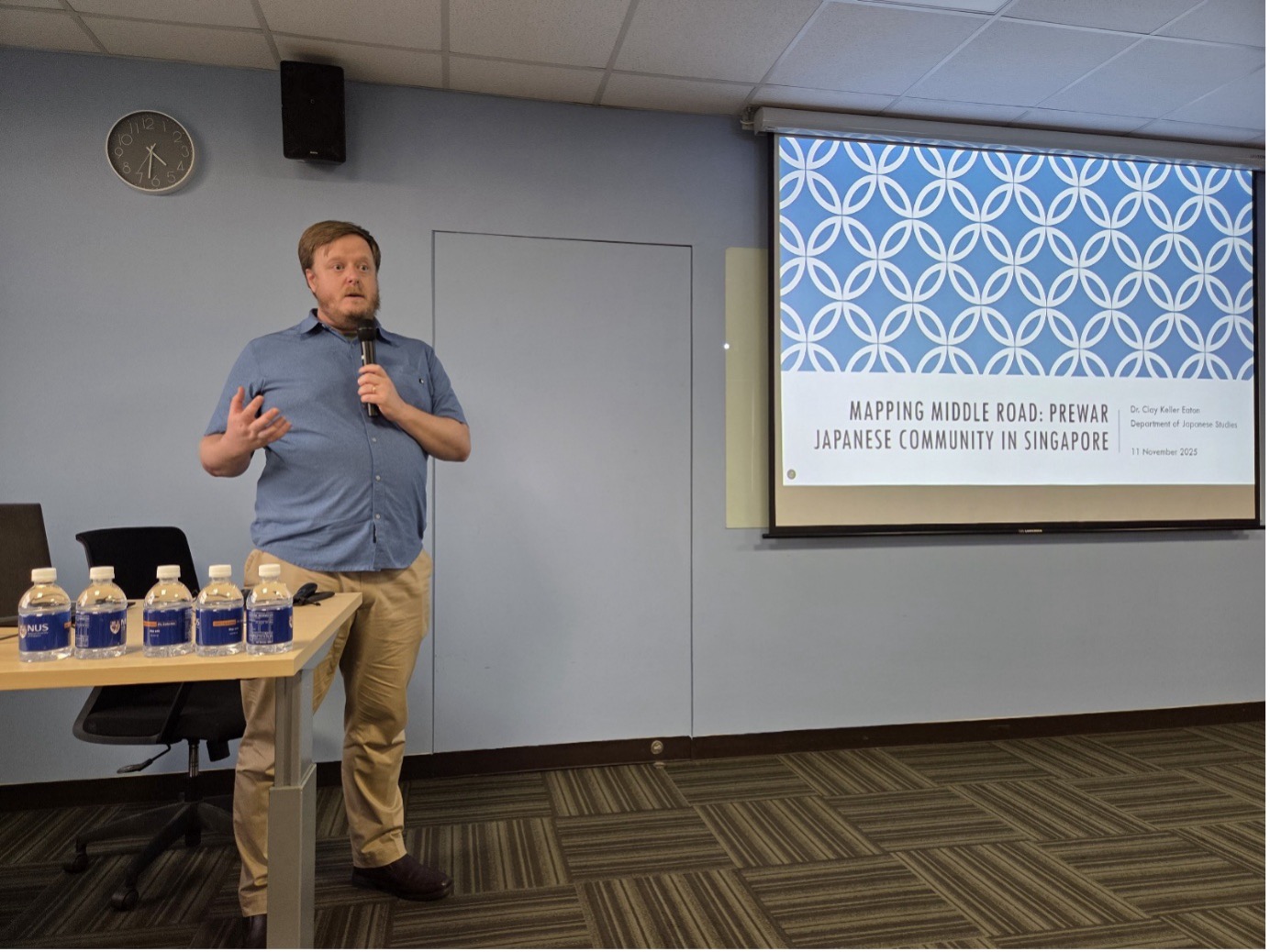
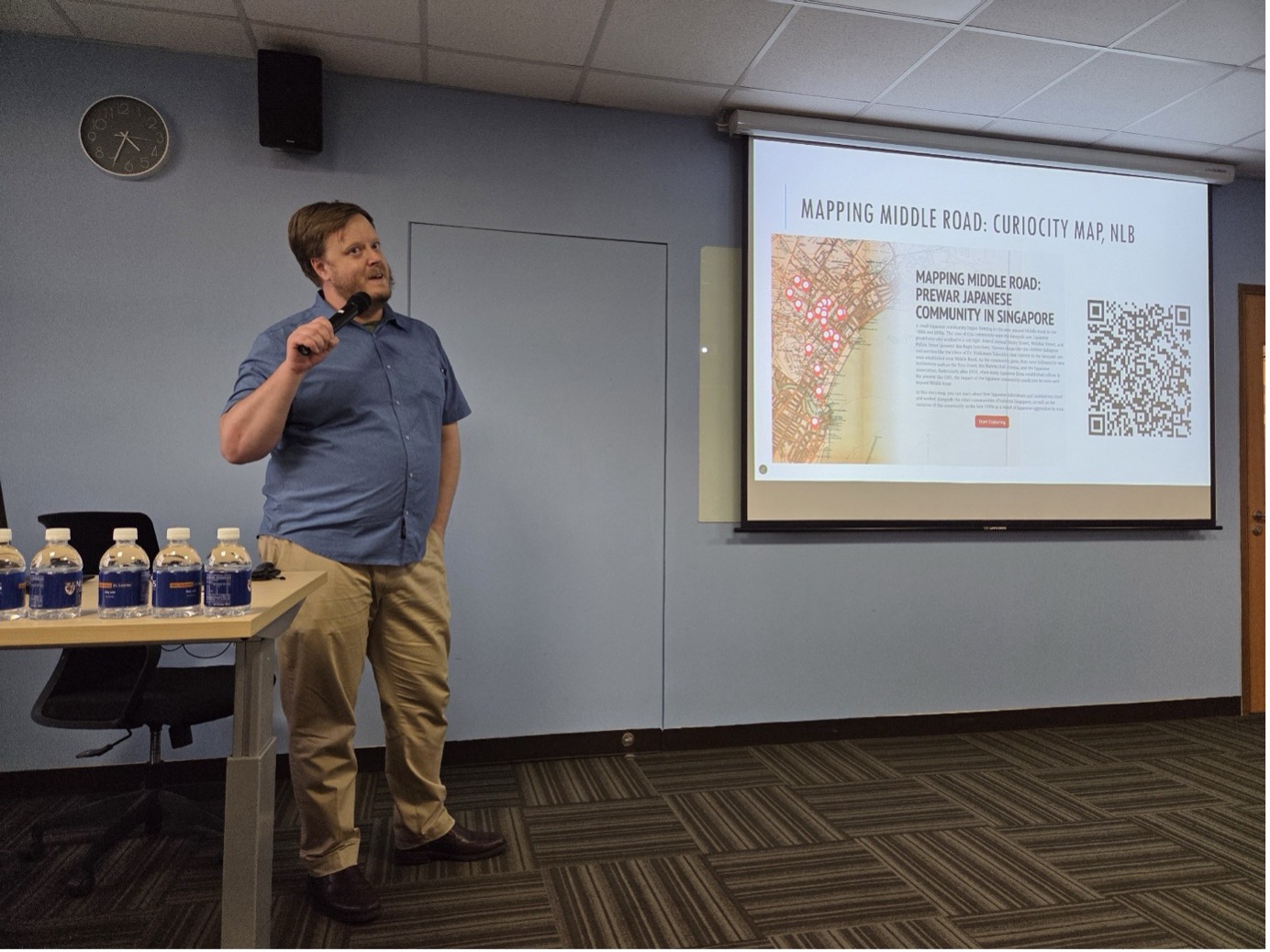
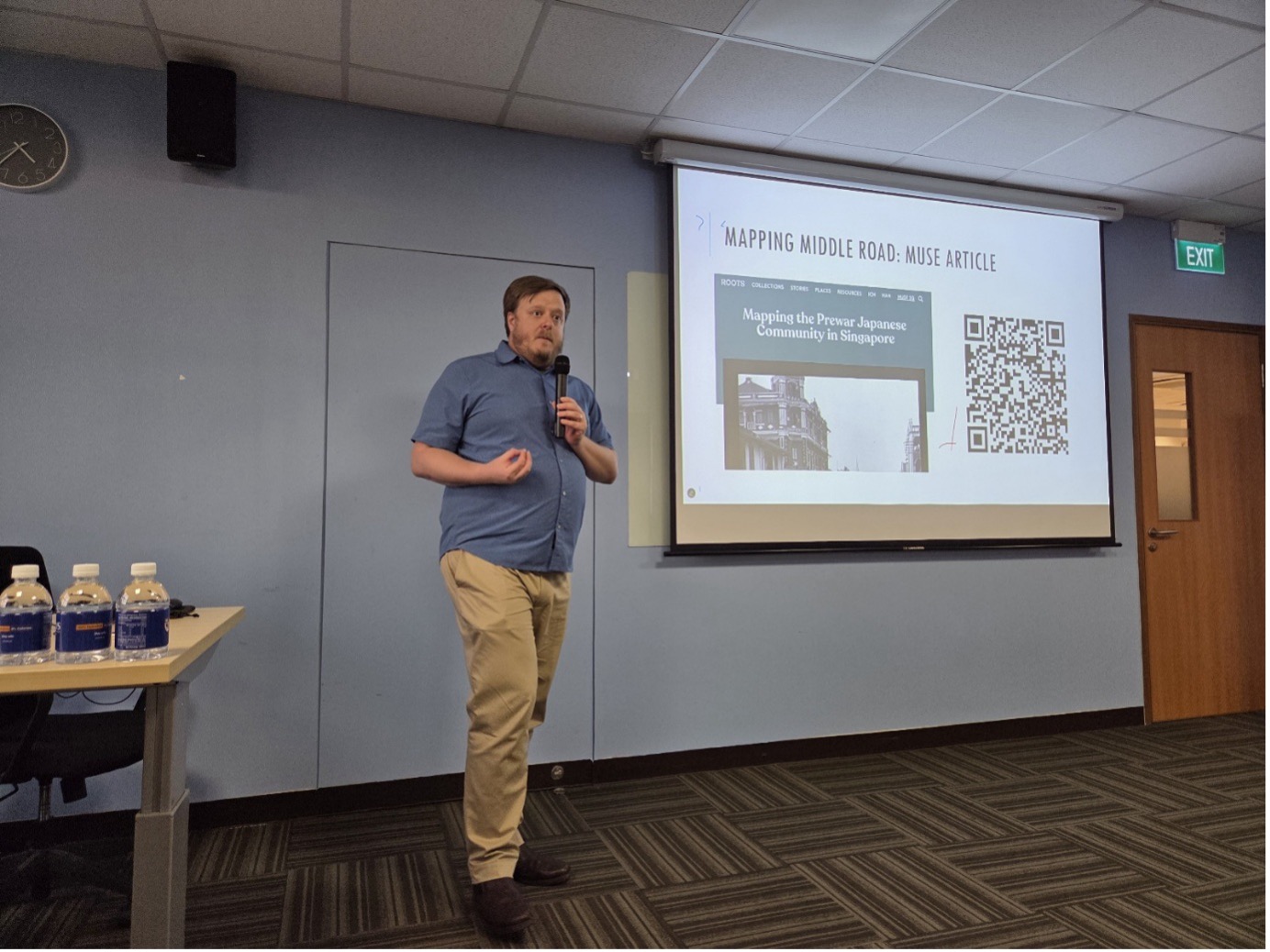
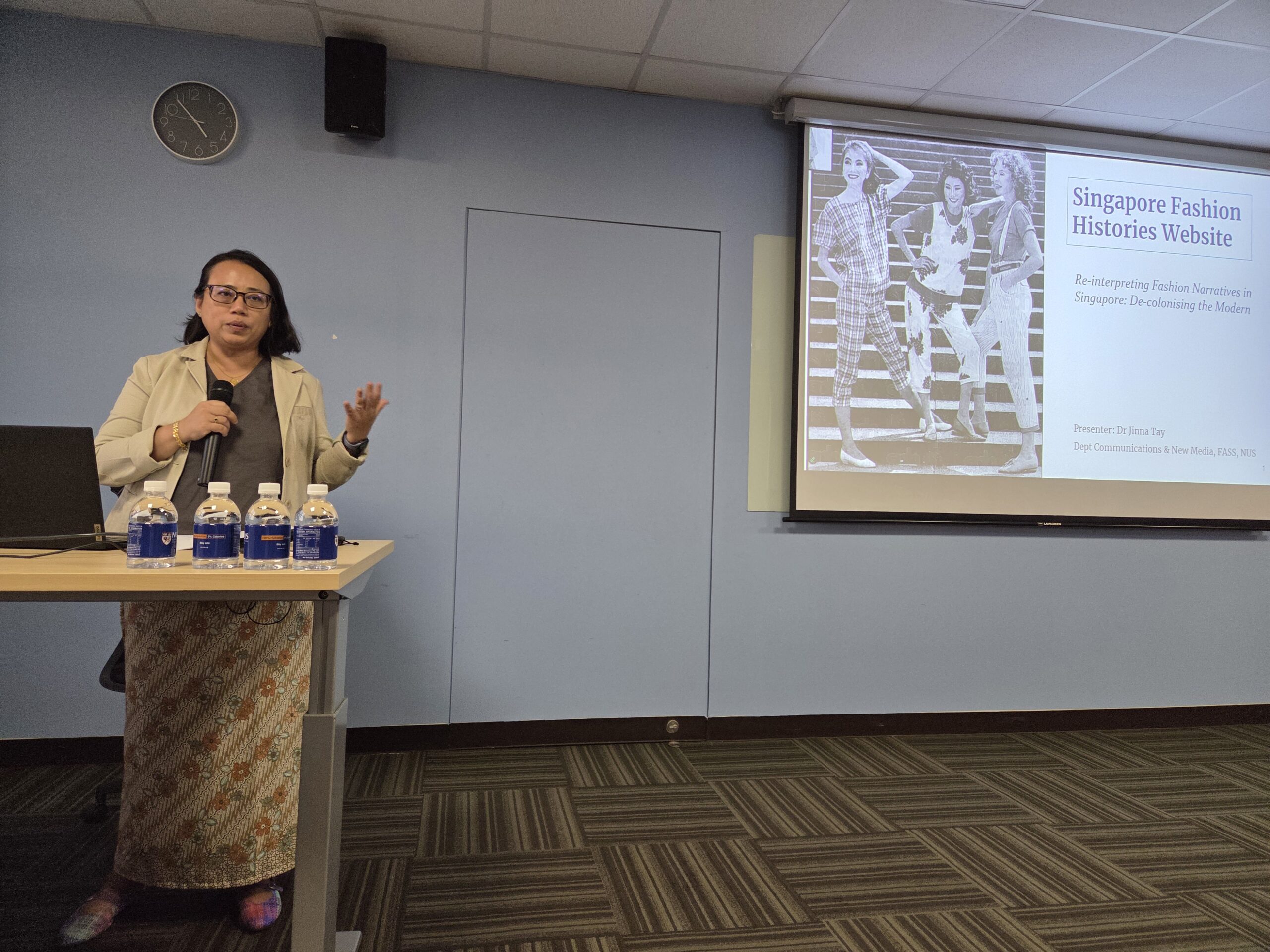

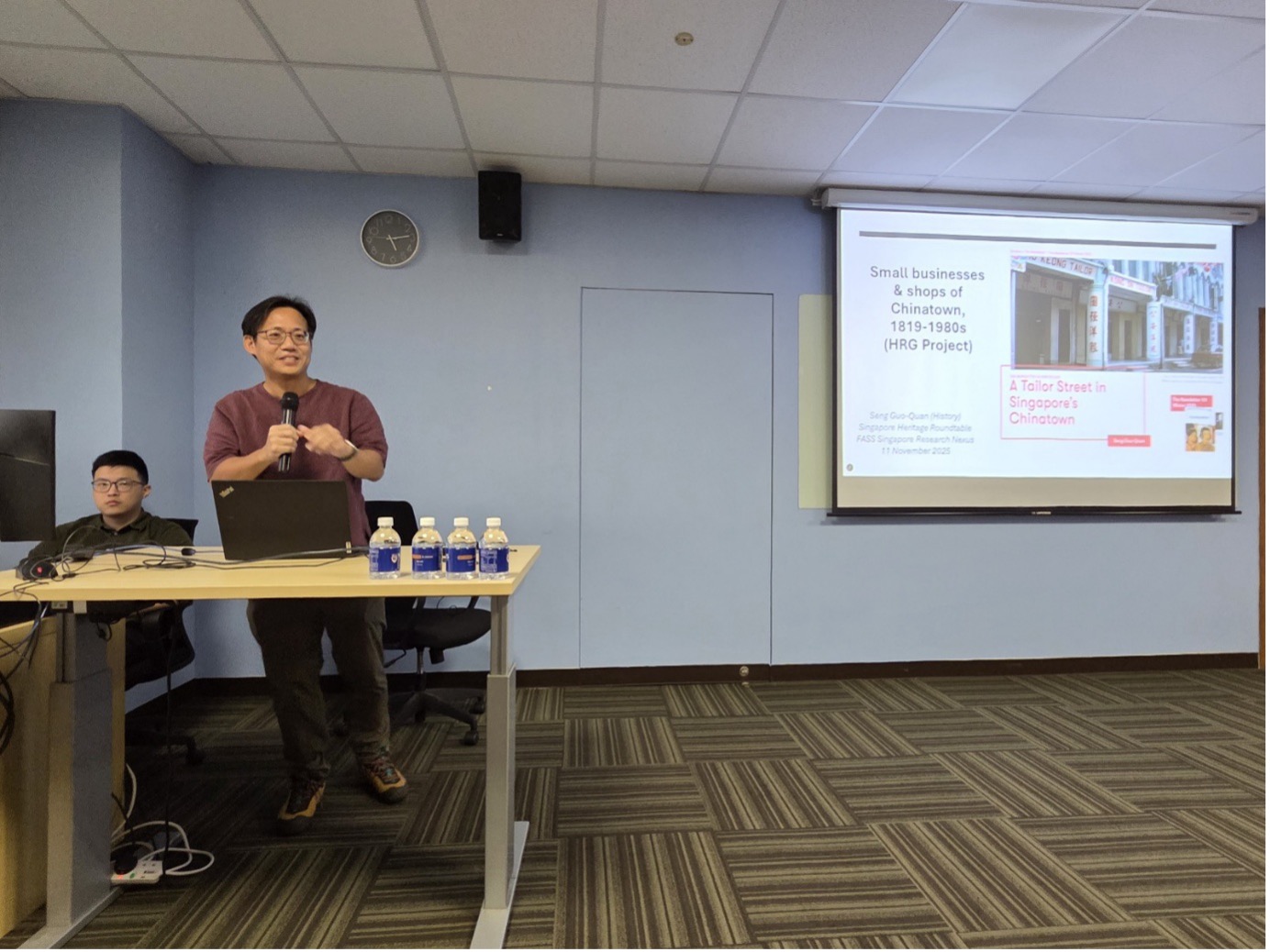
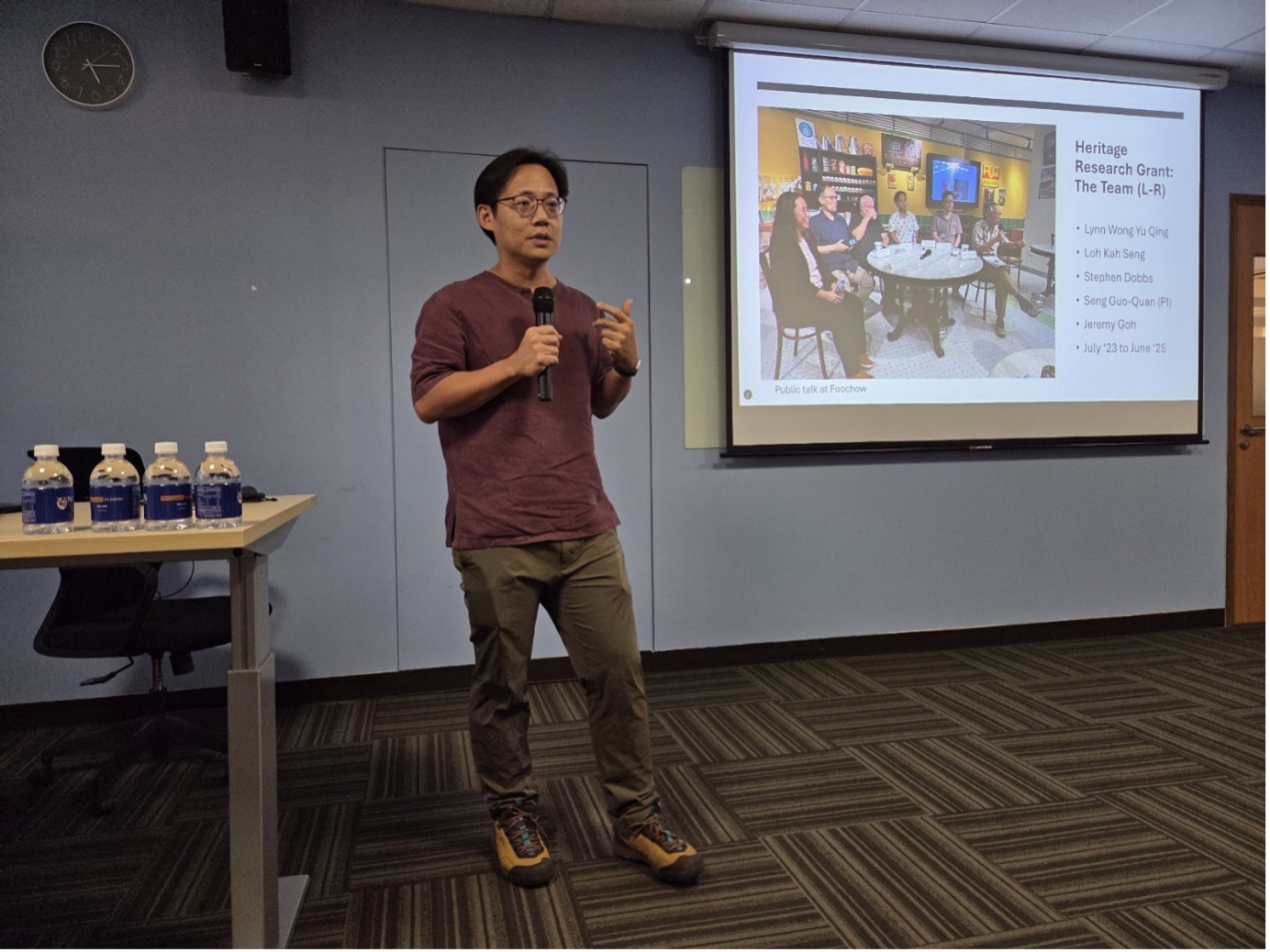
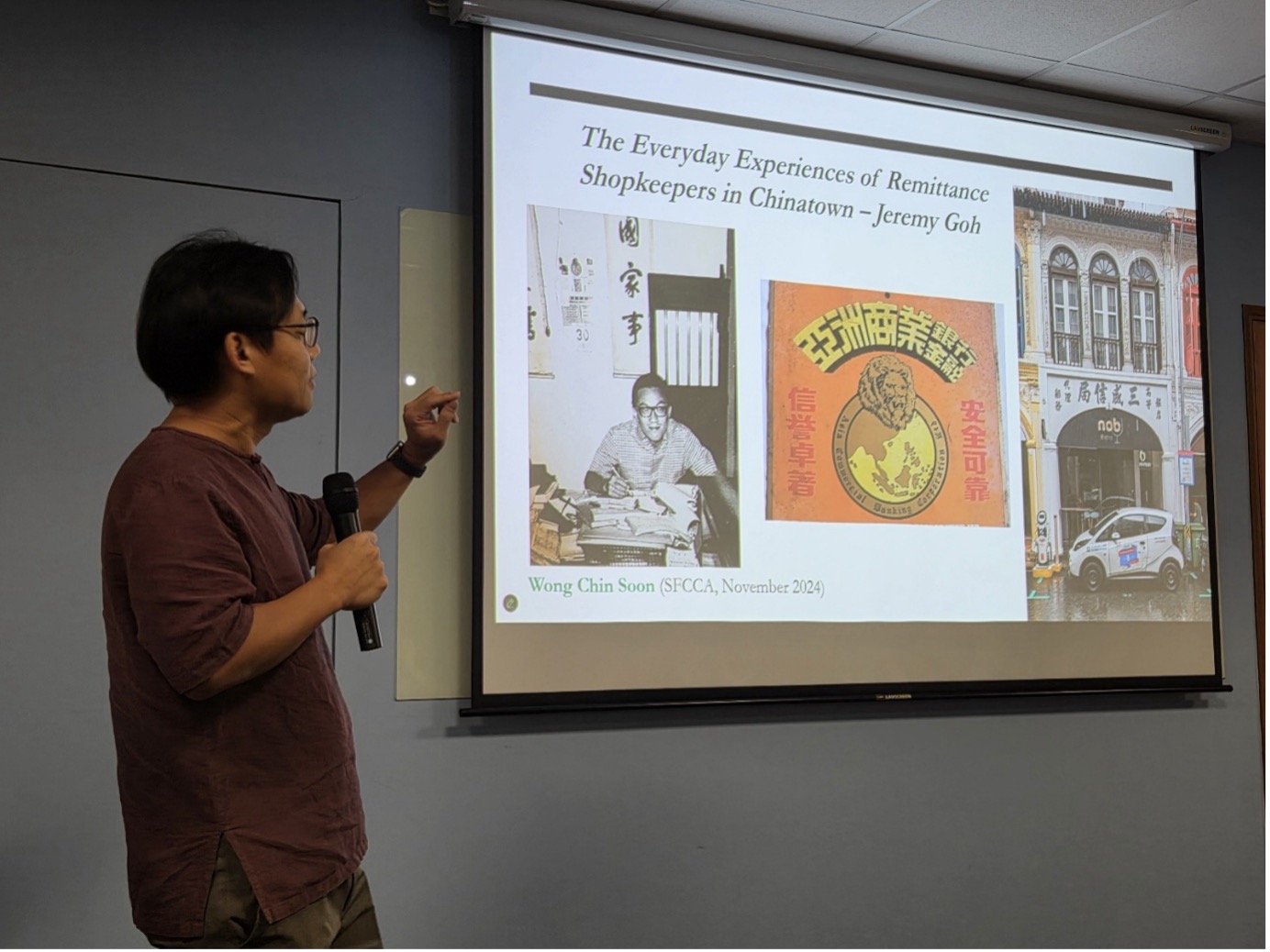
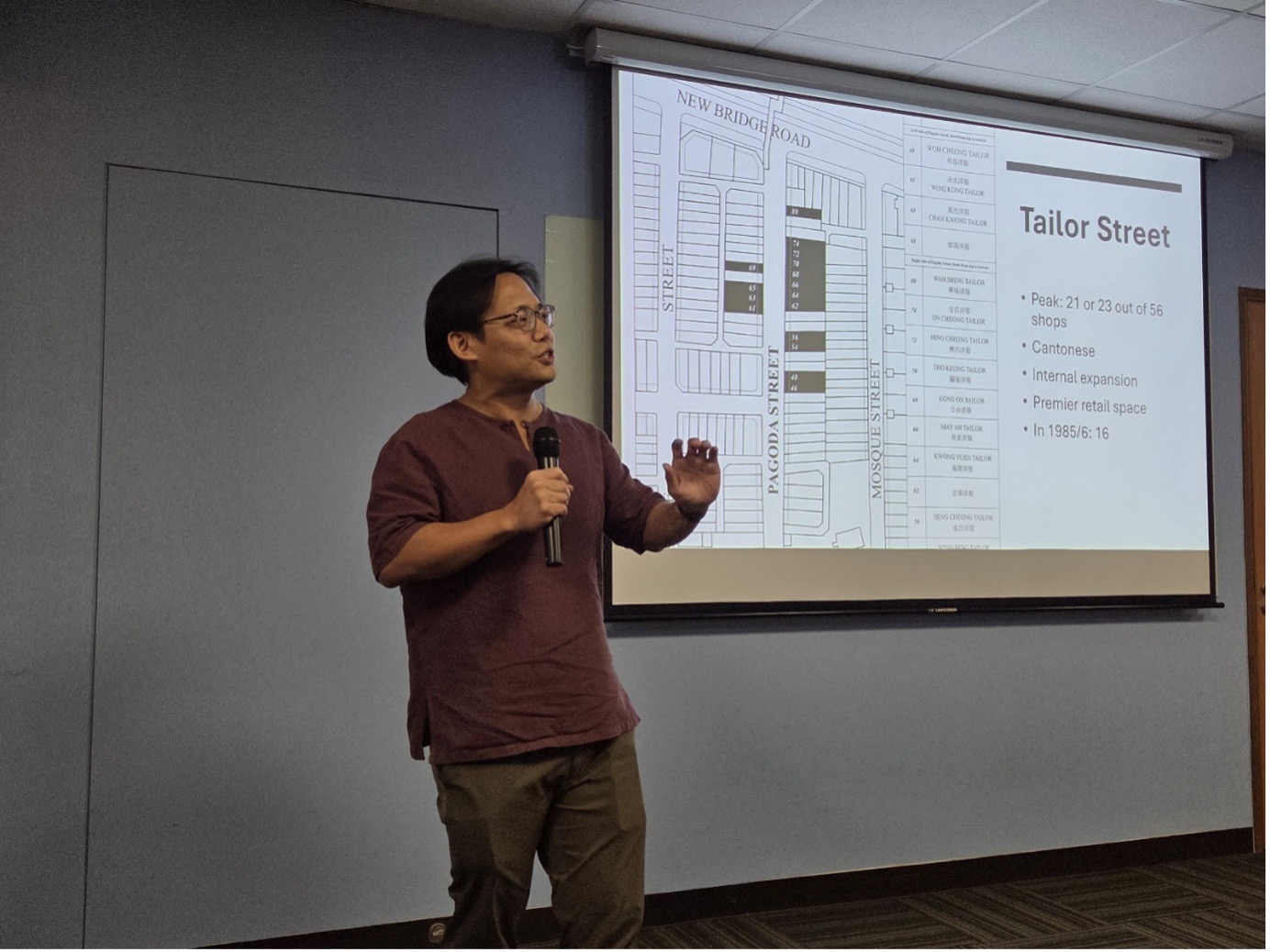
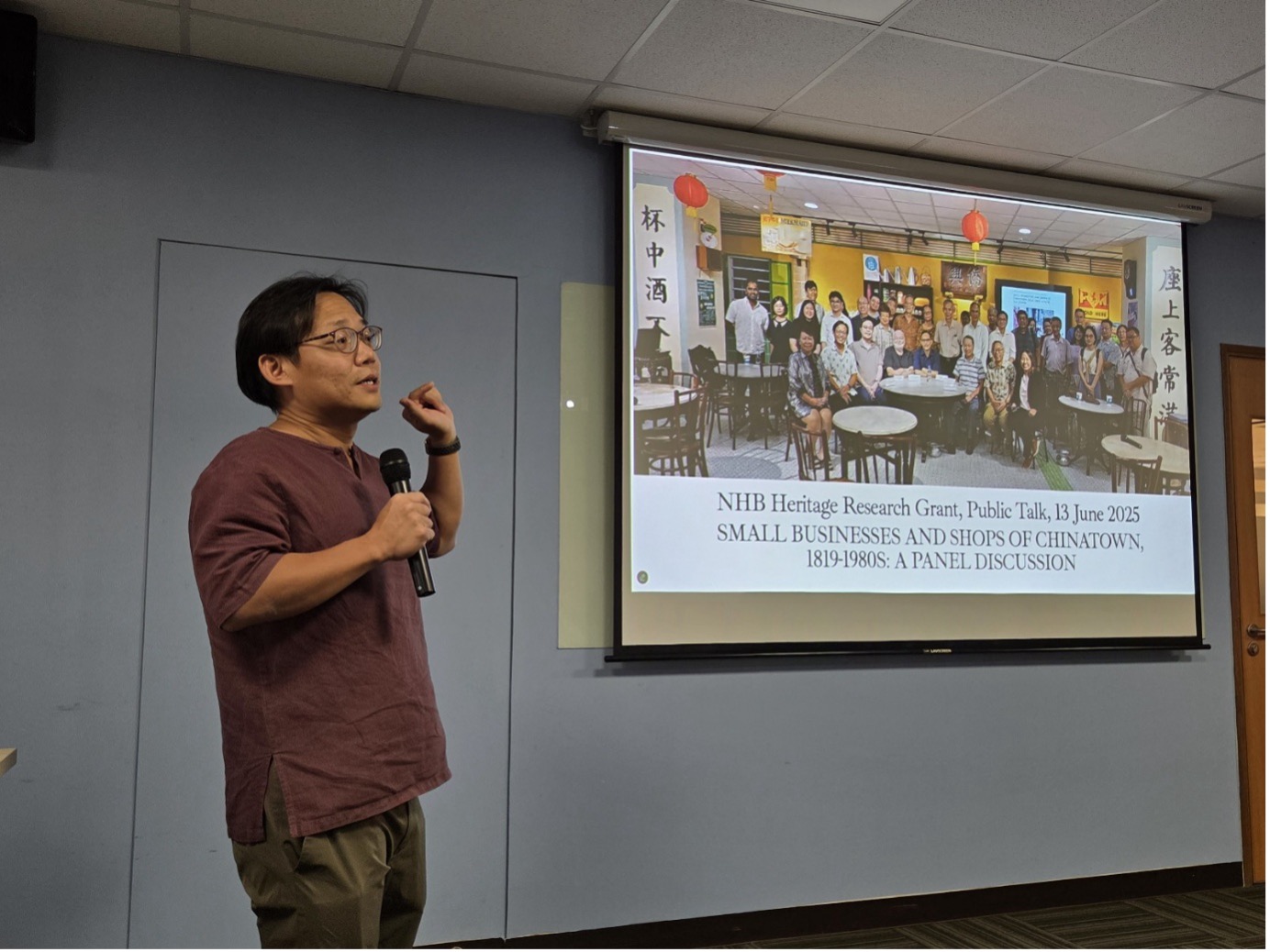
Photos from the Singapore Heritage Roundtable
Check out the photos from our Singapore Heritage Roundtable!
The roundtable was chaired by FASS Assistant Dean of Research and Foo Hai Associate Professor in Buddhist Studies Jack Meng-Tat Chia and opened by Ms Melissa May Tan, Director of Heritage Policy & Research at the National Heritage Board.
The programme featured four National Heritage Board Heritage Research Grant recipients from FASS:
- Dr Yang Yan (NUS Chinese Studies) – In Their Own Ways: Identification and Documentation of Singapore’s Chinese Medicine
- Dr Clay Eaton (NUS Japanese Studies) – Mapping Middle Road: Prewar Japanese Community in Singapore
- Dr Jinna Tay (NUS Communications and New Media) – Re-Interpreting Fashion Narratives in Singapore: De-colonising the Modern
- Assistant Professor Guo-Quan Seng (NUS History) – Small Businesses and Shops of Chinatown, 1819–1980s
You can also watch the full video recording here, and download the programme booklet here.
















Recording now available: Singapore Heritage Roundtable (11 November 2025)
As part of the “Celebrating Singapore Studies: Sixty Years of Nationhood” campaign, the Singapore Research Nexus hosted a richly informative Heritage Research Roundtable that featured four National Heritage Board Heritage Research Grant recipients from FASS and brought fresh scholarly light to lesser-known chapters of Singapore’s past. The full video recording is now available here.
Programme
- Welcome Remarks and Chair: Assoc Prof Jack Meng-Tat Chia (NUS History & Assistant Dean of Research, FASS)
- Opening Remarks: Ms Melissa May Tan (Director, Heritage Policy & Research, National Heritage Board)
Presentations
- Dr Yang Yan (Research Fellow, NUS Chinese Studies)
In Their Own Ways: Identification and Documentation of Singapore’s Chinese Medicine
Explores how Singapore’s Chinese medical tradition diverged from mainland TCM, developing distinctive doctrines, diagnostics, and formulae shaped by local climates, migration patterns, and everyday clinical practice.
- Dr Clay Eaton (Lecturer, NUS Japanese Studies)
Mapping Middle Road: Prewar Japanese Community in Singapore
Reconstructs the vibrant yet largely forgotten “Little Japan” centred on Middle Road – home to merchants, photographers, dentists, schoolchildren, and karayuki-san – and its place within colonial Singapore’s cosmopolitan society.
- Dr Jinna Tay (Senior Lecturer, NUS Communications and New Media)
Re-Interpreting Fashion Narratives in Singapore: De-colonising the Modern
Draws on decades of newspaper archives (1950s-1990s) to reveal how fashion became a site where colonial ideas of modernity persisted, and how contemporary research can help deconstruct those inherited frameworks.
- Asst Prof Guo-Quan Seng (Assistant Professor, NUS History)
Small Businesses and Shops of Chinatown, 1819-1980s
A social history of the modest shophouses and enterprises that formed the backbone of Chinatown’s economy, tracing flows of textiles, rubber, remittances, and credit across regional Chinese networks.
We invite researchers alumni, heritage enthusiasts, and the wider public to watch the recording and discover how NUS FASS scholars are uncovering the diverse, lived textures of Singapore’s past.

𝗘𝗩𝗘𝗡𝗧 | 𝗦𝗶𝗻𝗴𝗮𝗽𝗼𝗿𝗲 𝗛𝗲𝗿𝗶𝘁𝗮𝗴𝗲 𝗥𝗼𝘂𝗻𝗱𝘁𝗮𝗯𝗹𝗲 | 𝟭𝟭 𝗡𝗼𝘃, 𝟯:𝟱𝟬-𝟲:𝟬𝟬 𝗽𝗺
2025 Valedictorian's Speech by Wang Lei
https://youtu.be/4pex9bBXEY4 Wang Lei graduated with a BA with Honours (Highest Distinction), having majored in Japanese Studies with a minor in Art History. She received university-level awards for Best Student in Japanese Studies and the prestigious Japanese Chamber of Commerce and Industry (JCCI) Scholarship. Lei also served as Publicity Director of the Japanese Studies Society (JSS). Congratulations, Lei!
Uncovering hidden stories of the pre-war Japanese community in Singapore
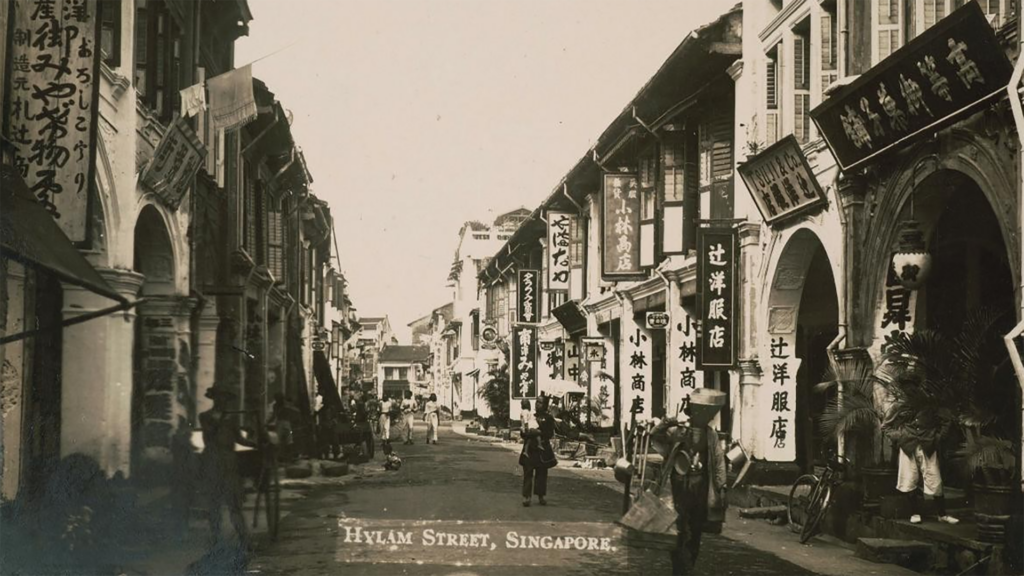
Singapore is home to cultural neighbourhoods such as Little India, Chinatown, Kampong Glam and the area around Tanjong Pagar that has become affectionately known as 'Koreatown'. But did you know that there was once a 'Little Japan' too?
'Little Japan' was an area around Middle Road - part of what we know as Bugis today - that comprised businesses, schools and places of worship for a Japanese community that settled in Singapore in the 1800s and 1900s. A community of thousands, they were far from little. Their presence in pre-war Singapore was significant in shaping Singapore's identity as a cosmopolitan port city in the colonial period.
Dr Clay Eaton, historian and lecturer in the NUS Department of Japanese Studies and Associate at the NUS Asia Research Institute's (ARI's) Inter-Asia Engagement cluster, said, "The Japanese wartime occupation of Singapore is well-known to many of us, but Japan and Singapore's relationship predates World War II. The unique role that the Japanese played here, as representatives of a major imperial power as well as a part of the broader Asian community, can help us better appreciate Singapore's rich cultural past. Very little work has been done on this community, especially in English, but they can tell us quite a bit about the social complexity of this period."
In an attempt to reconstruct the pre-war Japanese community in Singapore's "Little Japan" around Middle Road, Dr Eaton; Professor Naoko Shimazu, also an Associate at ARI's Inter-Asia Engagements Cluster and former Research Cluster Leader; and Dr Chee Keng Lee from NUS College teamed up for a project known as 'Mapping Middle Road', the first public history project of its kind about the Japanese community in Singapore.
The project was carried out under the National Heritage Board's (NHB) Heritage Research Grant and was hosted by ARI. It took two years to complete and was published as a story map for the National Library Board's Curiocity[1]. Mapping these historical findings allows users to better visualise how past movements of the Japanese communities around Middle Road unfolded and changed with significant events, thus turning abstract historical change into something we can see and trace across a real-world landscape.
The findings in 'Mapping Middle Road' were widely discussed at conferences and talks in Asia and Europe.
The researchers' findings were also further expanded and later developed into an online resource named 'Middle Road: Pre-War Japanese Community in Singapore' that is accessible to the public at MUSE, NHB's digital heritage publication hosted on Roots.
Bringing the Japanese community's shifting past to life through maps and movement
Developing this digital map to help users see not only where events and communities existed, but also how they shifted over time, was no easy task.
A team of faculty and student researchers combed through resources such as photos, advertisements, newspaper articles, travelogues and guides in various English- and Japanese-language materials residing in the National Library's NewspaperSG online archive, the Japanese Association of Singapore's collections, and the National Diet Library (the national library of Japan); to locate specific references to the Japanese community associated with particular places in the country.
They identified over 20 locations and institutions to feature in the story map, with their efforts culminating in the visual reconstruction of the presence and movement of various Japanese institutions over time. These included schools, clinics, places of worship and businesses - all of which together help us imagine what life was like for the Japanese community here in Singapore at that time.
Dr Eaton shared, "Perhaps our biggest surprise, since this was a mapping project, was how mobile some of the institutions we were tracking ended up being. Just about every prominent business moved at least once (like the clothier Ebisuya) or had multiple branch locations (like the Tamagawa restaurant)."
Important locations such as the Japanese Consulate, Japanese Association and Toyo Hotel moved multiple times, making it challenging to pinpoint their locations onto a map, Dr Eaton shared. Ultimately, the team embraced the shifts in locations as a key factor in explaining the changes within the community over time.
The Consulate's move from its original location on Sophia Road - located near the Japanese resident community along Middle Road - to the 'Gudan' district (the Japanese term for the Central Business District) came as Japan rose in political power globally. Its eventual return to quieter offices on Mt Emily before World War II presumably symbolised the growing isolation of the Japanese Empire on the world stage.
Prof Shimazu shared how researchers had also identified a significant class division within Singapore's pre-war Japanese community, noting tensions between the first Japanese settlers in Singapore in the late 1800s and a more affluent and educated wave of Japanese immigrants who arrived after 1910 and worked in the Gudan district.
The establishment of elite institutions like the Japanese Association and Japanese Club did not help to bridge the gap. The Gudan expatriates played a crucial role in ending licensed Japanese prostitution in 1920, which affected the original Japanese community along Middle Road.
The stories the research team uncovered confirmed what they had initially thought - that the Japanese community was diverse just like any other and was made up of interesting and dynamic individuals who were at times at odds with each other, but at other times, brought together by a shared sense of national belonging.
[1] National Library Board's Curiocity houses digitised maps, photographs and multimedia content that are combined for users to explore the past and see how it has shaped the present.
This story first appeared on NUSNews on 16 May 2025.
Make the library a modern kampung
IN BRIEF | 10 min read
- By Associate Professor Thang Leng Leng, Deputy Head of NUS Japanese Studies.
Click through image below to read this piece.
This story first appeared in zbSunday and on NUSNews on 13 April 2025.
Adaptability and a well-rounded university experience pay off for NUS graduates amidst a volatile job market

Stepping out into the working world amidst global uncertainties can be daunting but the NUS Class of 2024 graduates have adapted to this transition with poise and confidence, bolstered by the interdisciplinary educational approach at NUS and a myriad opportunities to take on experiences that prepare them for the future of work.
Achieving a broader worldview through internship and exchanges
For Data Science and Analytics graduate Micole Chan, her NUS journey has been a fertile ground to refine and apply her expertise. Micole, who graduated with Honours (Highest Distinction), is currently a Graduate Trading Analyst at a global financial institution, an industry she aspired to work in as an undergraduate. In her work, she leverages data science techniques to develop trading strategies, analysing financial data, applying advanced models, and building quantitative frameworks to identify market opportunities.
Her final-year internship at the same company provided a strong foundation for her current role, ultimately leading to a full-time offer under its Graduate Trading Programme. During her extended seven-month internship, she applied her theoretical data science knowledge from NUS in a real-world setting, delivering data-driven trading solutions and deepening her understanding of data science's impact on financial markets.
To shore up experience and expertise in her focus areas, Micole tapped on many opportunities in NUS, such as taking a Minor in Computer Science which helped her to establish a firm foundation in programming, statistics and machine learning, as well as expertise in specialised areas such as Natural Language Processing (NLP), computer vision and software engineering.
Micole also participated in multiple internships, and local and international exchange programmes. These experiences expanded her academic and cultural perspectives, allowing her to gain a broader worldview while enabling her to explore diverse courses beyond her curriculum.
"My studies equipped me with the technical expertise, problem-solving mindset and global exposure essential for my career. The blend of strong academics, hands-on projects and industry engagement prepared me to thrive in the working world," said Micole.
Strong skill sets founded on a rigorous curriculum
Chen Hsiao Ting graduated from the NUS School of Computing (NUS Computing) with Honours (Distinction), specialising in Software Engineering and Multimedia Information Retrieval. Working as a Software Engineer in Visa's Core Payment Development team, she is involved in developing and optimising Visa Resolve Online, a critical global application that enhances dispute processing for millions of users.
Hsiao Ting credits NUS Computing's rigorous computer science curriculum for equipping her with both the technical expertise and soft skills necessary to excel in the tech industry. The four-year programme equipped her with a solid foundation in computer science and software engineering, complemented by hands-on projects and valuable internships. These internships sharpened her adaptability, collaboration, and analytical thinking skills, which are essential for her current role.
One of the highlights of her undergraduate journey was her exchange at Peking University, where she pursued computing courses such as text mining, computer networks, and operating systems, broadening her worldview through exposure to different academic environments, learning methodologies, and teaching styles.
Hsiao Ting's job search process was intense, requiring extensive preparation for both technical and behavioural interviews. However, she effectively leveraged NUS' comprehensive career resources, and received guidance from NUS Computing's Career Advisory Team, particularly in resume writing, career planning, and cultivating a positive mindset - valuable elements that boosted her confidence during interviews. Standalone sessions on workplace dynamics, leadership, and personality development further prepared her well to navigate the recruitment process successfully.
Hsiao Ting said, "By actively engaging with the NUS community, whether through conversations with peers, mentorship from faculty, or participating in career workshops and student activities, I gained not just technical expertise but also soft skills and industry connections. The well-rounded education and strong career support at NUS truly shaped my journey, giving me the confidence and preparation to thrive in my role at Visa and beyond."
Rising above challenges with grit and determination
NUS Business School Accountancy alumnus Joel Gwey Jia Jie started applying for jobs about three months before graduation and juggled his final semester of studies alongside assessments and interviews for his job applications. As a management associate at homegrown financial services company Singlife, currently on rotation in its strategy department, he assists with the development and execution of the group's strategy and the business units with their transformation efforts.
Graduating with first class honours was a hard-earned achievement for Joel, coming from a modest background with a father who works as a hawker and a mother who is a housewife. A goal-getter, he has continually persevered to achieve his ambitions since his polytechnic days.
"My NUS experience taught me that whatever challenges I face, if I continue to work hard, I'll be able to rise above them and achieve my goals," Joel said. "When I faced challenges during my first rotation in Singlife, I put my head down and tried to learn as much as possible and ask questions to improve every day, and I think my first rotation was a success."
He recounted preparing for his job interviews with help from NUS Business School's BizCareers advisors, who coached him on tackling different scenarios. He also sought advice from his business professors who had industry experience and could give him tips on questions to expect and ask during interviews. Joel found that the preparation helped him to stand out especially in group interviews, and he eventually secured his role with Singlife two months after graduation.
Joel added that the soft skills that he picked up at NUS also proved crucial in his transition into the insurance industry from an accountancy background. For instance, a business communication module taught him how to present effectively to senior business leaders, a task he handles frequently in his current role with the strategy team.
Pursuing passion from childhood to university
Passionate about electronics from a young age, pursuing engineering in university was a natural choice for Faruq Khan Bin Hayat Khan, who went on to graduate from NUS with a Bachelor of Engineering (Electrical Engineering) with Honours (Distinction), specialising in robotics and control. After a fruitful three-month internship with the Land Transport Authority (LTA) Singapore during the second year of his undergraduate studies, Faruq applied for a full-time position with LTA, where he is now an engineer involved in designing power supply and systems integration for the rail and road transport systems.
His deep interest in electronics began at a young age when his father taught him how to build and dismantle various items such as remote-controlled boats and automatic plant watering systems. His passion also led him to join the Robotics Club in secondary school, and to study Electrical and Electronic Engineering in Singapore Polytechnic prior to pursuing his degree with NUS.
Faruq's undergraduate training has equipped him with the skills to acquire new information and concepts. "At NUS, we learnt how to break down complex concepts and look at problems from different perspectives - these are problem-solving skills which I now apply in my daily work. The technical knowledge gained from my Engineering courses has also enabled me to better grasp the new concepts I encounter at work," Faruq said.
He also benefitted from the multidisciplinary education offered by the College of Design and Engineering at NUS. The curriculum, which emphasises interdisciplinary learning, allowed him to take courses beyond his major, including modules in Mechanical Engineering, Civil Engineering and Project Management.
"The interdisciplinary approach not only broadened my skill set across various disciplines, it also allowed me to integrate what I learnt about Mechanical Engineering into my robotics specialisation," Faruq added.
Leveraging interdisciplinary and experiential exposure to navigate transition
Saashtika Mohan had an intense and busy university life, but her journey has been a fulfilling one encompassing two majors and an enriching involvement in co-curricular activities such as the NUS Students' Political Association and the Harvard College in Asia Program.
The alumna of the College of Design and Engineering at NUS and NUS College (NUSC), who graduated with a double major in Biomedical Engineering and Innovation and Design, is now a process and equipment engineer at Micron Technology where she works on optimising manufacturing processes and equipment performance to enhance efficiency and product quality.
She came across the job opening for her current position when she attended an NUS Career Fair in her final semester of studies and completed an on-the-spot interview that kickstarted the hiring process and eventually led to her securing the job before graduation.
Said Saashtika, who graduated with first class honours: "NUS' commitment to interdisciplinary education was the cornerstone of my undergraduate journey, empowering me to collaborate with individuals from diverse fields. This has allowed me to broaden my perspectives and sharpened my critical thinking skills."
The experiential approach offered by the University Scholars Programme (USP) and, later, NUSC also enhanced her ability to collaborate with cross-functional teams and quickly adapt to new challenges. These experiences, along with the emphasis on critical thinking, innovation and design, and exploring topics beyond one's major, helped her to successfully adapt and navigate the transition from the healthcare focus of her field of study to her new role in the semiconductor industry.
Outside of work, Saashtika remains deeply committed to making a positive impact. A SINDA Singapore Excellence Award Valedictorian, she is active in the Singapore Indian Development Association (SINDA) and recently hosted a 'Let Her Shine' event, a programme dedicated to empowering women within the Indian community.
A dream job paved by immersion and internship opportunities
Four years in NUS has provided Rhys Thiagarajan, who graduated with a Bachelor of Arts in Japanese Studies with Honours (Highest Distinction), the valuable opportunity to delve deep into all things Japan during his time in NUS.
In addition to immersing himself in Japanese culture, history and way of life during a four-month student exchange programme in Ritsumeikan University in Kyoto, and a year-long study abroad programme in Waseda University in Tokyo, Rhys also joined the NUS Japanese Studies Society's Brothers and Sisters Programme and helped to coordinate student exchange programmes between Japanese schools and NUS. This provided him the opportunity to interact with other like-minded individuals and cultivated his interest in Japan and Japanese as a language.
An internship as an Analyst in Asia Business Creation Pte Ltd - an advisory firm that supports business creation between Southeast Asia and Japan - also gave him invaluable exposure to how Japanese businesses operate in Singapore as he learnt and interacted with Japanese clients.
Far from being a niche interest, these accumulated experiences at home and abroad have made him more adaptable, helped broadened his worldview, and gave him the confidence to venture into the finance industry, where he is now a Margin and Collateral Analyst at leading global financial services firm, JPMorganChase. In his work, Rhys handles collateral management operations and manages a portfolio of clients across the Asia-Pacific region, including Japan.
He said, "My experience at NUS has taught me to think more critically and learn independently. NUS' multidisciplinary approach to education has also helped me view opportunities and problems holistically. As my role requires a lot of interaction with internal and external stakeholders, these skills have definitely given me confidence to take on tasks and challenges confidently."
Higher starting salaries and strong employment rates for NUS graduates
NUS graduates continued to command high employment rates and earned higher starting salaries in 2024, according to the Joint Autonomous Universities Graduate Employment Survey 2024. Please click here for the press release.
Some 5,269 out of a total of 7,382 fresh NUS graduates from the Class of 2024, and 427 out of 806 follow-up NUS graduates, participated in the joint survey.
Close to nine in 10 NUS fresh graduates employed within six months after final exams
- 88.1 per cent of NUS fresh graduates in the labour force were employed within six months of completing their final exams.
- Fresh graduates from Accountancy and Dentistry achieved 100 per cent employment, while 96.9 per cent of Accountancy (Hons) and 95.7 per cent of Materials Science and Engineering graduates secured jobs.
- Over 96 per cent of follow-up graduates from Architecture were employed within six months of completing their final exams.
- More than nine in 10 fresh NUS graduates across 17 degree programmes were employed within six months of completing their final exams.
NUS graduates in full-time permanent employment earned higher starting salaries
- The mean gross monthly salary of NUS fresh graduates in full-time permanent employment was S$5,101 in 2024, an increase from S$4,875 in 2023.
- The median gross monthly salary of fresh graduates from NUS in full-time permanent employment also increased to S$4,600 in 2024, an increase from S$4,400 in 2023.
- Graduates from 35 courses in Arts and Social Sciences, Business, Computing, Dentistry, Design and Engineering, Law, Nursing, and Science are drawing higher starting salaries or maintaining similarly high salaries as graduates the year before.
- In particular, median starting salaries for graduates from Arts and Social Sciences, and Science have risen continuously over the past three years.
This story first appeared on NUSNews on 25 February 2025.
Integrated Facilities for the Elderly and Children are Worth Promoting
IN BRIEF | 10 min read
- By Associate Professor Thang Leng Leng (NUS Japanese Studies).
Click through image below to read this piece.
This story first appeared in Lianhe Zaobao and NUSNews on 15 September 2024.
2024 Valedictorian's Speech by Wong Qing Ning
Wong Qing Ning graduated with a double degree, BA with Honours (Highest Distinction) and B.Sc. with Honours (Highest Distinction). He majored in Japanese Studies and Life Sciences with a specialisation in Biomedical Science. Congratulations, Qing Ning!
Exploring Japan’s Heritage and Tourism in Kyushu
IN BRIEF | 10 min read
- During their trip for JS3229 Field Studies in Japan, a field study course helmed by Associate Professor Chris McMorran from NUS Japanese Studies, the students were provided an immersive experience to understand how heritage is defined, preserved and commodified for tourism.
Heritage and tourism are deeply intertwined in Japan, a nation where the preservation of cultural and natural sites plays a pivotal role in constructing national identity and fostering economic growth.
JS3229 Field Studies in Japan, a field study course helmed by Associate Professor Chris McMorran from the Department of Japanese Studies at the NUS Faculty of Arts and Social Sciences delved into these themes, offering students an immersive experience to understand how heritage is defined, preserved, and commodified for tourism.
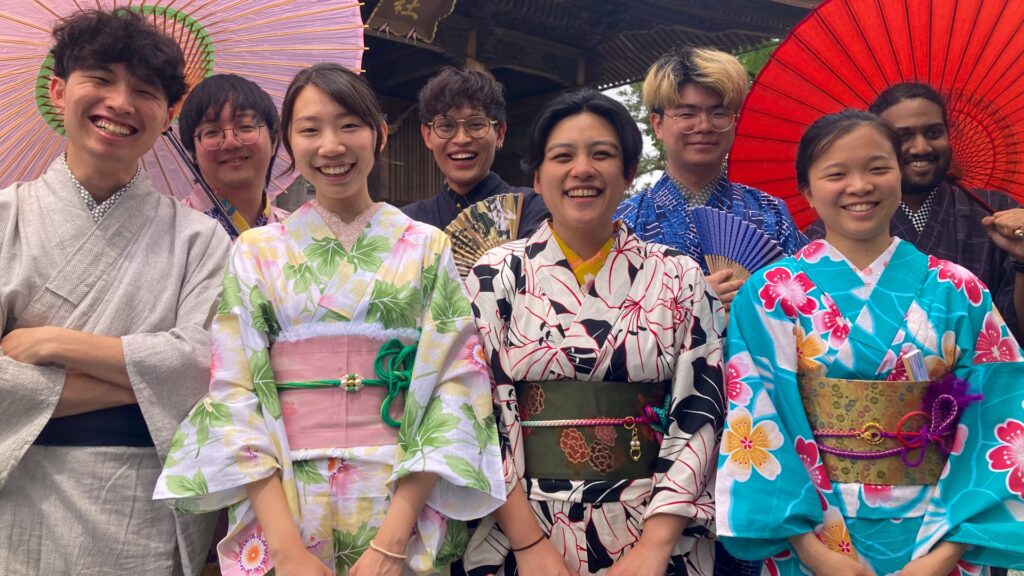
Laying the Groundwork
Before embarking on the journey, the students engaged in rigorous preparations at NUS. One concept that stood out was furusato, or "old village". While the term literally means an actual place, it often signifies a generalised nostalgic feeling. This concept of creating a native place would later help them understand the cultural significance and tourism strategies in the places they visited.
Additionally, the students prepared for their homestay by learning traditional Japanese etiquette in a tatami room. Understanding the cultural significance of respecting tatami mats was essential for fostering respectful interactions with their host families in the Aso region.
Immersing in Hakata's Heritage
In Hakata, the students experienced a blend of historical and contemporary influences. A walking tour revealed the ancient street map of Hakata, the serene Jotenji Temple, and the Kushida Shrine. Here, they engaged with locals to build confidence for deeper interactions in subsequent locations.
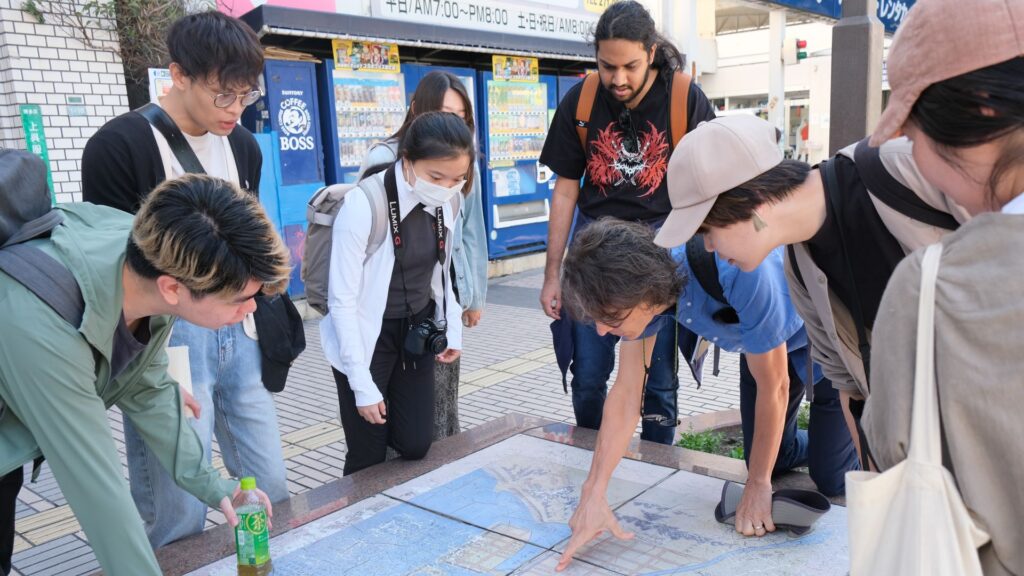

Their visit to the Kyushu National Museum, facilitated by NUS Faculty of Arts and Social Sciences alumna Sun Shuwei (Class of 2023), and her colleague Imai-san, provided an insider's view of artefact conservation. Meeting Shuwei also offered a personal connection on the trip. As a former teaching assistant for this module and now a professional in Japan, she shared her experiences of stepping out of her comfort zone to engage with locals.
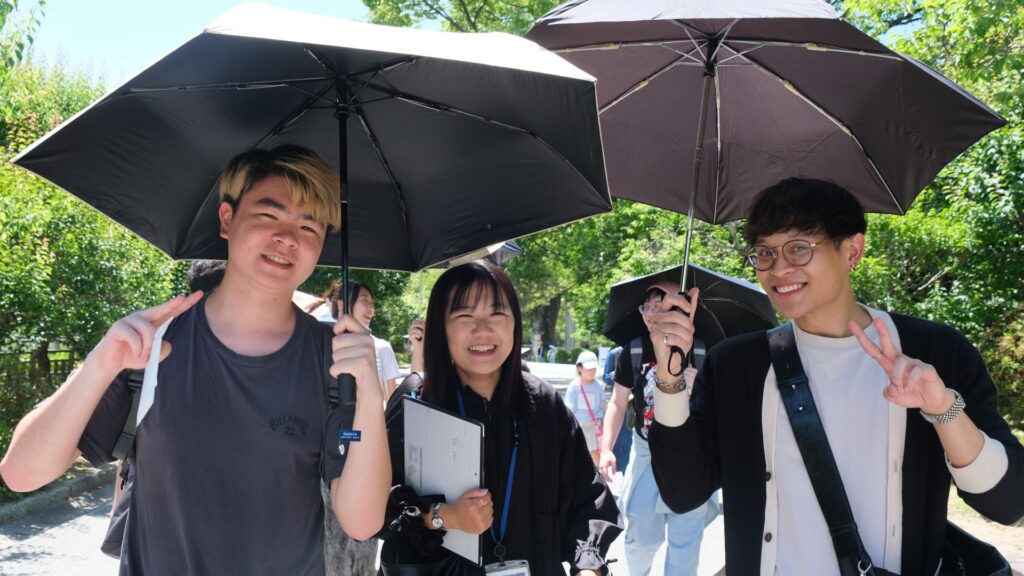
She also offered this advice to students: "It's important to go out of your comfort zone and try things you don't know you'd like. It could be fun! Also, make use of all the resources that NUS has - if you want to learn a language, there's no better time. "

Tsuetate: The tranquil healing town
Offering a stark contrast to busy Hakata was the town of Tsuetate Onsen. This peaceful town, with its flowing river and onsen, emphasised the healing and restorative aspects of tourism.
Engaging with locals in Tsuetate was a highlight. Conversations with residents revealed personal histories, the community's efforts to sustain its heritage and showcased the residents' remarkable hospitality and resilience. These interactions were invaluable for planning their walking tours, where students shared insights on local heritage sites.

Rachel Tan, a Year 3 undergraduate majoring in Japanese Studies, found Tsuetate to be her favourite area. "It was just so tranquil and beautiful, compared to the hustle and bustle of Fukuoka city. I really enjoyed exploring the town and talking to the residents, hearing their personal stories and finding out what Tsuetate meant to them," she shared.


Aso: Cultural immersion and breathtaking landscapes
In Aso, students participated in various cultural activities, including mochi-making, wearing kimonos, meditation, and calligraphy. They also experienced homestays with local families.
Mohamad Matin Bin Mohamad, a Year 4 student majoring in Japanese Studies, highlighted the calligraphy session as one of the best experiences of the trip. "I enjoyed the calligraphy, especially seeing everyone's thought process in choosing and writing their words. It revealed what was important to them and their personalities through their choices and writing styles. I chose 'ambition' because it reflects my personality."

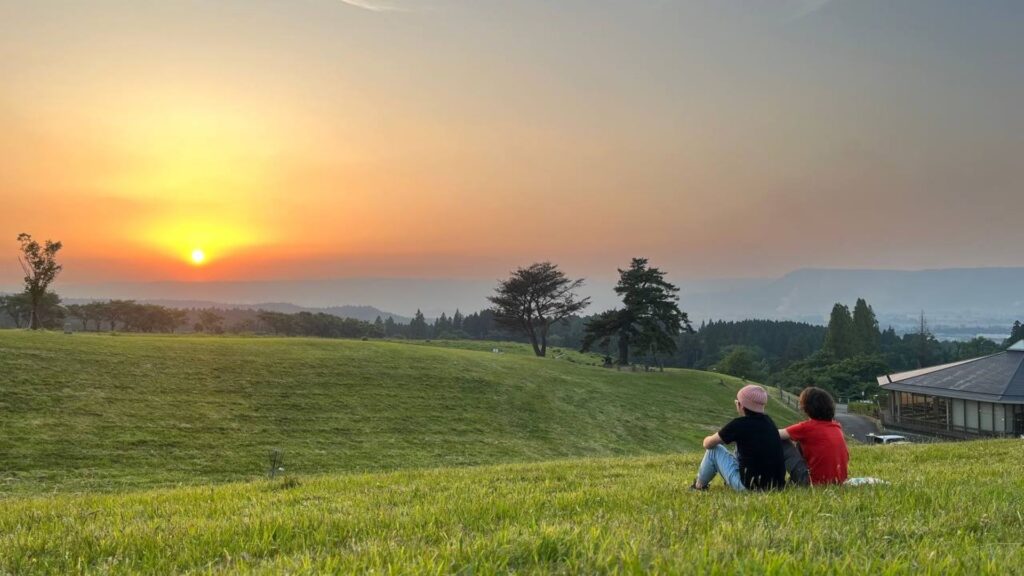
Some others enjoyed the meditation and Rachel identified it as her favourite activity in Aso. "It was my first time doing something like that, and it was just such an interesting experience. Under the guidance of the monk, we learned how to sit still and meditate for 40 minutes. Surprisingly, the time passed a lot quicker than expected, and I felt spiritually nourished by the end of it. The delicious matcha and Japanese sweets they served us after the session made the whole experience extra rewarding," she said.
The authentic homestay experience
The homestay offered students a profound immersion into Japanese culture and daily life. The hospitality of the homestay families was exceptional, with the hosts going out of their way to make the students feel welcome and comfortable. "I was treated as one of their own," shared Kien Sieng, a Year 3 Business Administration undergraduate, reflecting on the warmth and generosity of his host family.

Charisse Thong, a Year 2 undergraduate majoring in Physics with a minor in Japanese Studies, and Rachel also shared their delightful homestay experience of being hosted by a kind elderly couple whose youngest daughter, Chiaki, returned to the household for the duration of their stay. "She and our host mum were really sweet, making lots of delicious meals for us, and even teaching us how to bake a strawberry shortcake with the fresh strawberries we picked together," Rachel recounted. They had traditional Japanese breakfasts, helped prepare for a big family dinner, and even played with sparklers in the yard.
"It was fun to interact with the different family members and also see the differences between a household in Aso and in Singapore," Charisse added.


Mitchell, a Year 3 undergraduate with a double major in Chemical Engineering and Japanese Studies, emphasised the authenticity of the experience, stating, "If you consider tourism as the search for the authentic, I don't think there's anything more authentic than a homestay."
"Be open to talking about yourselves and be courteous and follow all the implicit culture rules," said Benjamin Khor, a Year 2 undergraduate majoring in Chemistry with a minor in Japanese Language, sharing his advice. The homestay not only fostered cultural exchange but also created lasting memories and deep personal connections, underscoring the unique and transformative nature of this educational journey.
Contrasting urban and rural experiences in Kumamoto
The field study concluded with a visit to Kumamoto City, where students explored Kumamoto Castle and met the governor and the city's mascot, Kumamoto. This experience provided a balance to the rural and small-town settings of the previous locations.
Visiting Kumamoto Castle was particularly fascinating for the students. Matin observed, "The detailed restoration process was impressive. The rocks that fell from the wall were labelled and reused, showing a strong commitment to preserving the castle's integrity. The contrast between the meticulously restored exterior and the modernised interior, complete with TV screens for tourists, was particularly striking."
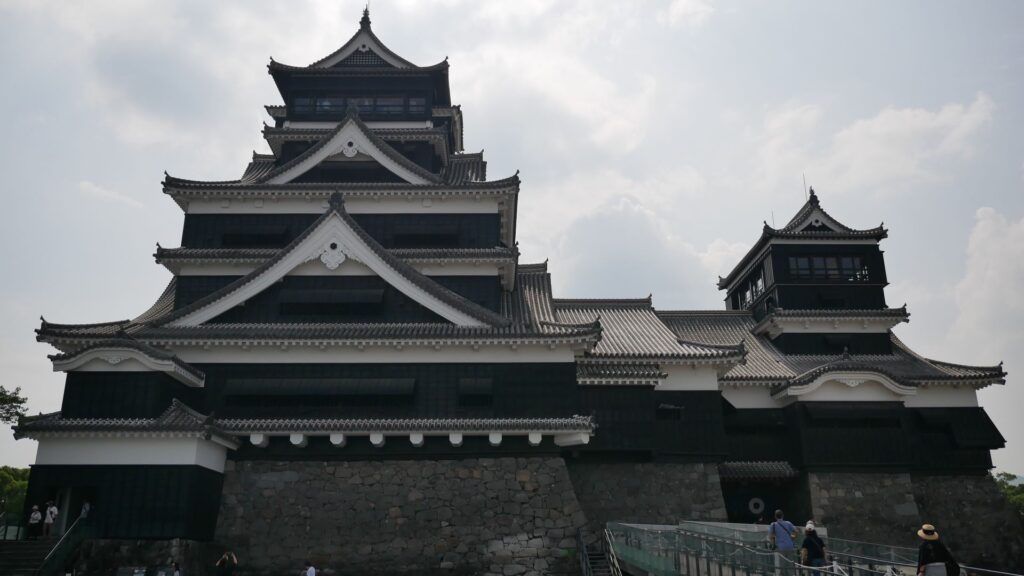
Mordecai Cheah, a Year 3 Faculty of Arts and Social Sciences undergraduate, appreciated Kumamoto's relaxed yet urban atmosphere. "Looking at the reasons why we travel to see things and the purpose of tourism helps me appreciate the heritage of the places we visited," he reflected.
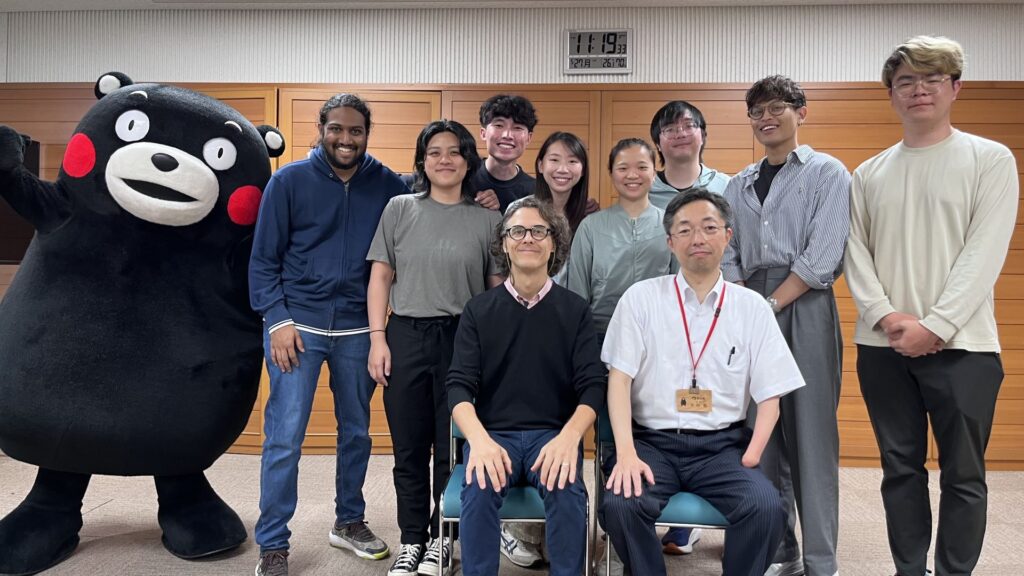
Personal growth and reflections
The students unanimously recommended the course for its approach and experience. "It is a very comprehensive course, and you'll learn more than what you've read in the readings," Kien said. The field study not only provided a deeper understanding of Japan's heritage and tourism but also encouraged growth and cultural appreciation.
Charisse echoed these sentiments, adding a personal lesson she learned: "Don't be afraid to talk to people. The fewer expectations you have, the more surprised you'll be."
Enthusiastically recommending the course to other students, she added: "My Japanese language ability probably improved a little bit too. I had a great time with my course mates, teachers and the people I met through this program. It's a great course if you want to learn more about Japan and people!"

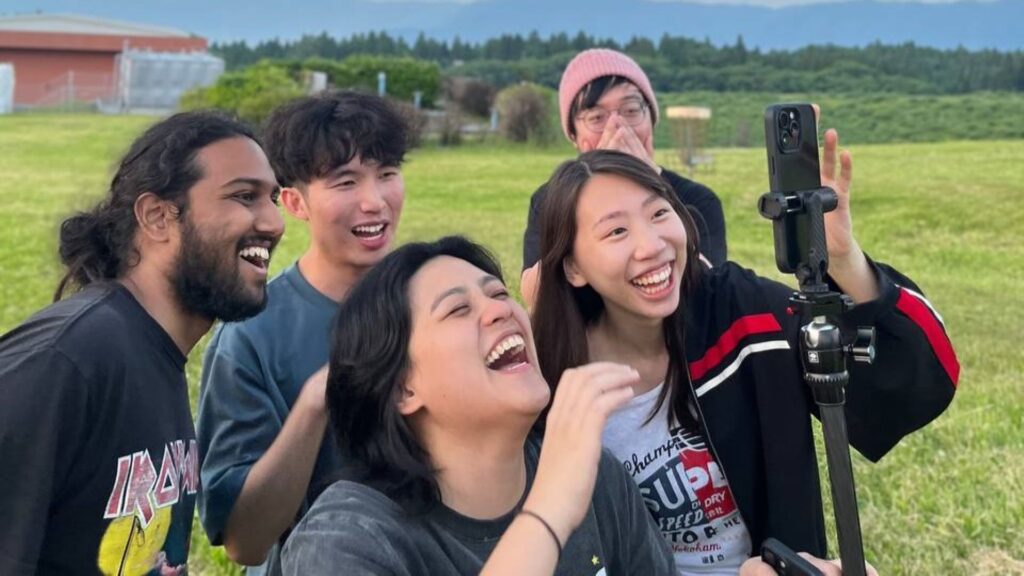
This story first appeared in NUSNews on 28 June 2024.
Mapping Middle Road: Prewar Japanese Community in Singapore
‘Mapping Middle Road: Prewar Japanese Community in Singapore’ is a research project funded by the National Heritage Board Heritage Research Grant from 2022 to 2024. Led by Dr Clay Eaton (NUS Japanese Studies), Professor Naoko Shimazu (The University of Tokyo, Tokyo College), and Senior Lecturer Lee Chee Keng (NUS College) and hosted by the NUS Asia Research Institute, the project seeks to reconstruct and understand the prewar Japanese community in Singapore.
The project examines the relatively obscured prewar period in Singapore’s history that has been predominantly overshadowed by the events of the wartime Japanese occupation. ‘Mapping Middle Road’ hence explores Singapore’s prewar era, looking at the critical role of the prewar Japanese community in shaping Singapore’s identity as a cosmopolitan port city. It delves into the complex social history of this community, which included individuals who held significant influence as well as those in marginalized positions.
Central to the research are questions concerning the establishment of the Japanese community in the Middle Road area, otherwise known as ‘Little Japan’, their integration into Singapore's cosmopolitan culture, and their positioning within colonial society. The study thus aims to shed light on socio-economic disparities, the intricate dynamics between colonizer and colonized, and the interplay of Asian and non-Asian cultures in Singapore.
The project’s objectives are twofold: 1) provide an in-depth analysis of the prewar Japanese community in Singapore and 2) use this historical insight to better understand broader cultural and racial dynamics in colonial and cosmopolitan settings. As such, it is instrumental in bridging gaps in Singapore’s historical landscape and promises to make significant contributions to both academic scholarship and public knowledge.
Overall, ‘Mapping Middle Road: Prewar Japanese Community in Singapore’ is poised to redefine our understanding of Singapore’s prewar era. With a focus on the Japanese community, it will illuminate a largely unexplored aspect of Singapore’s history, offering vital perspectives for future historical, cultural, and social discourses in the region.
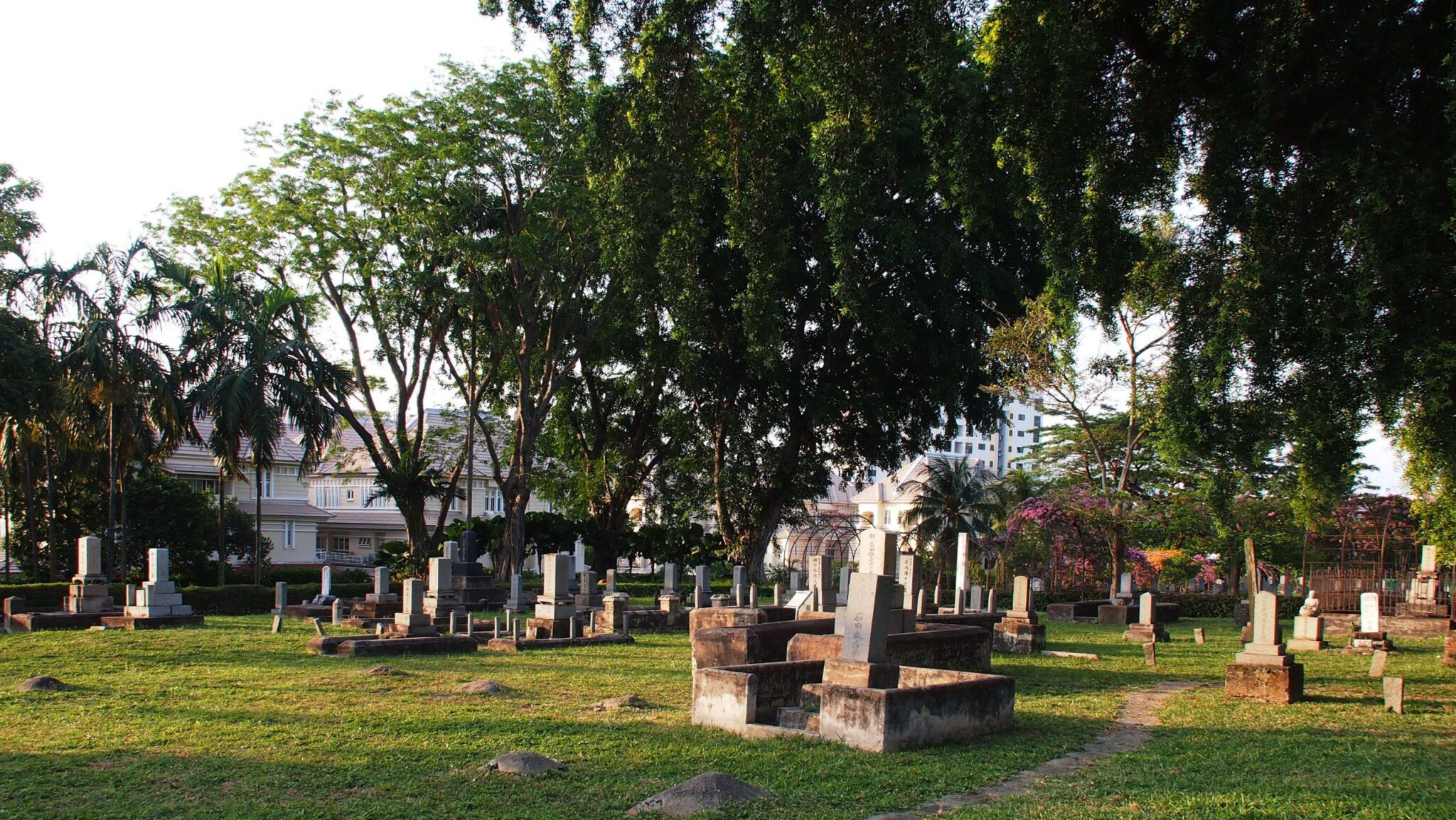
Changing the Culture of Caregiving to Support Self-Reliance in Life
IN BRIEF | 4 min read
- Op-Ed in zbSunday by Associate Professor Thang Leng Leng (NUS Japanese Studies)..
Click through image below to read this piece.

These stories first appeared in zbSunday and NUSNews on 24 March 2024.
Study: Elderly Residents Often Return to Tanglin Halt after Relocating
IN BRIEF | 4 min read
- A study led by NUS Asia Research Institute Senior Research Fellow Professor Elaine Ho (NUS Geography) finds that although there are supermarkets and coffee shops at Dawson Estate, the elderly residents who were relocated there a few years under the Selective En-Bloc Redevelopment Scheme (SERS) continue to return to Tanglin Halt to meet up and reminisce with their former neighbours.
Click through image below to read this piece.
These stories first appeared in Lianhe Zaobao and NUSNews on 21 March 2024.
NUS Open House 2024 Attracts more than 8.4m visitors as Screens and Campuses Buzz with Action
IN BRIEF | 10 min read
- Open House 2024 returned to an enthusiastic reception as visitors turned up in force to experience one of NUS' largest events of the year. Held in a hybrid format from 2 to 9 March 2024 and pulled together by the efforts of 2,674 faculty, staff, students and alumni, the event attracted more than 8.4 million visitors - up from 7.7 million in 2023 - as they explored the comprehensive showcase of what NUS has to offer both online and in-person.
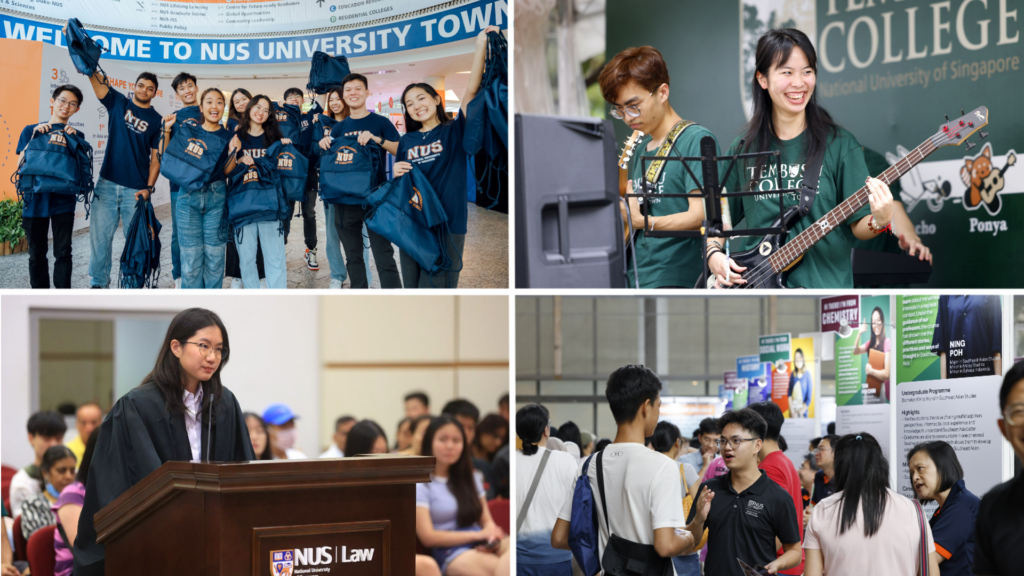
Open House 2024 returned to an enthusiastic reception as visitors turned up in force to experience one of NUS' largest events of the year. Held in a hybrid format from 2 to 9 March 2024 and pulled together by the efforts of 2,674 faculty, staff, students and alumni, the event attracted more than 8.4 million visitors - up from 7.7 million in 2023 - as they explored the comprehensive showcase of what NUS has to offer both online and in-person.
Kicking off the eight action-packed days was a slate of engaging virtual talks, webinars, and social media sessions. NUS Business School put together an informative line-up of virtual sessions featuring an Ask-Me-Anything session with its Vice Dean Associate Prof Chng Chee Kiong, an overview of the various majors with insights from faculty and students alike, and a glimpse of its vibrant student life via the Bizad Club.
At the online showcase by NUS Computing, prospective students joined a Discord live chat to get their questions answered by professors and student ambassadors on topics such as the differences between the school's five degree programmes. During a Zoom session by NUS Global, they heard about the University's exciting study abroad opportunities from students who embarked on exchange programmes with universities in Scotland, Canada, Switzerland and Hong Kong.
The on-campus segment on 9 March saw crowds throng the programme booths, talks, special classes, campus tours, student life performances and residential venues, with students gaining perspectives into all aspects of a world-class education at NUS, from the comprehensive curricula and career prospects to student life and global opportunities.
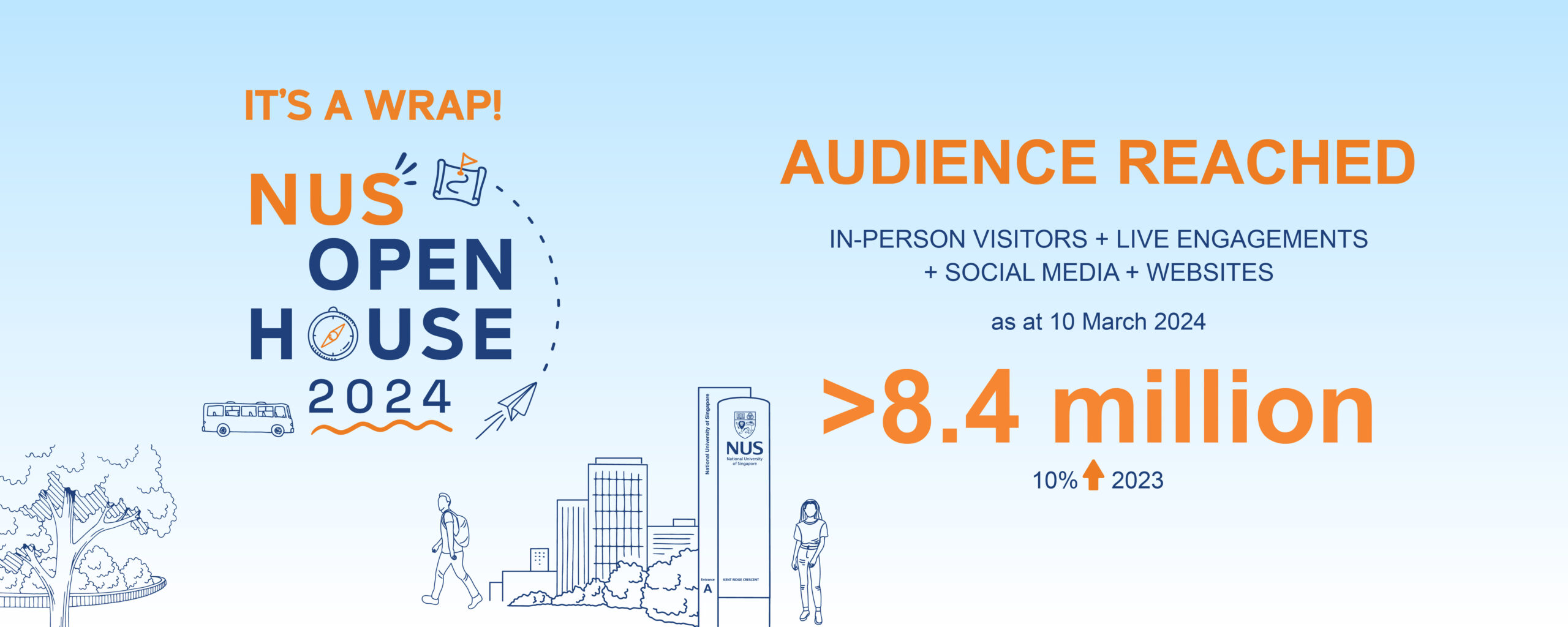
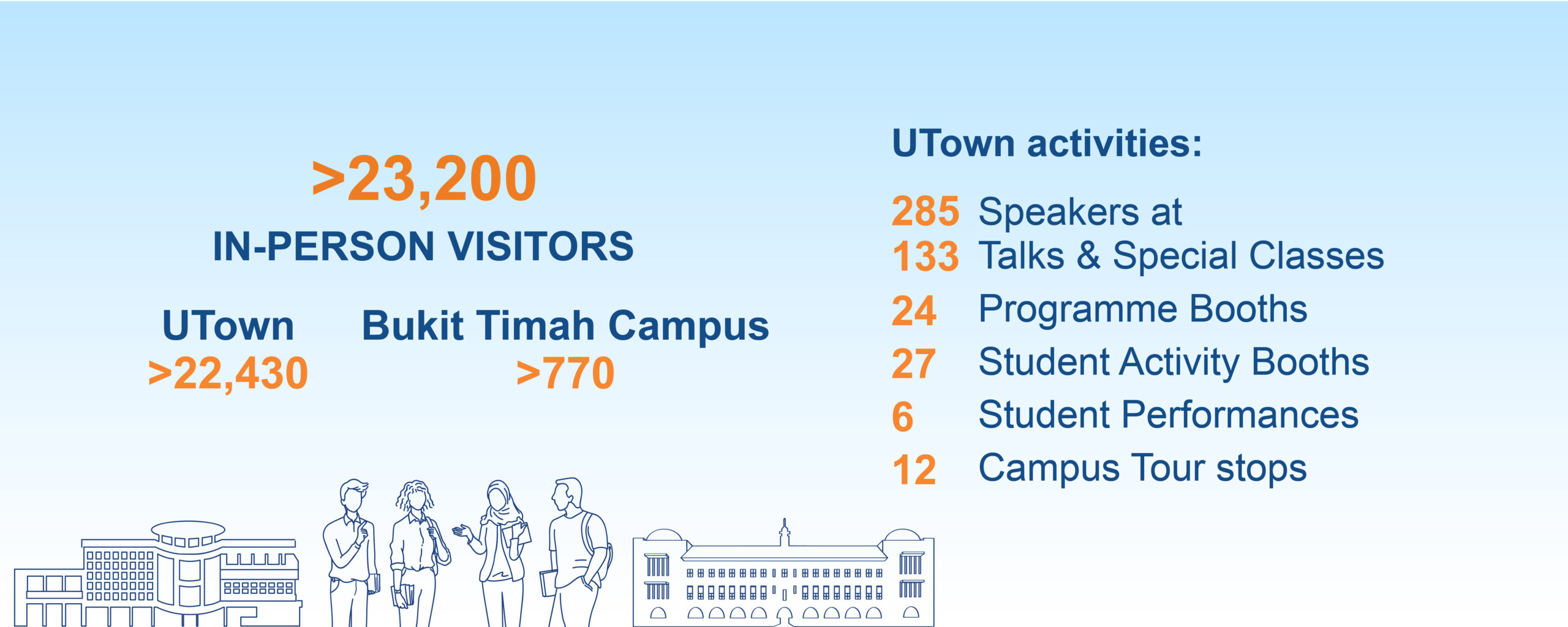


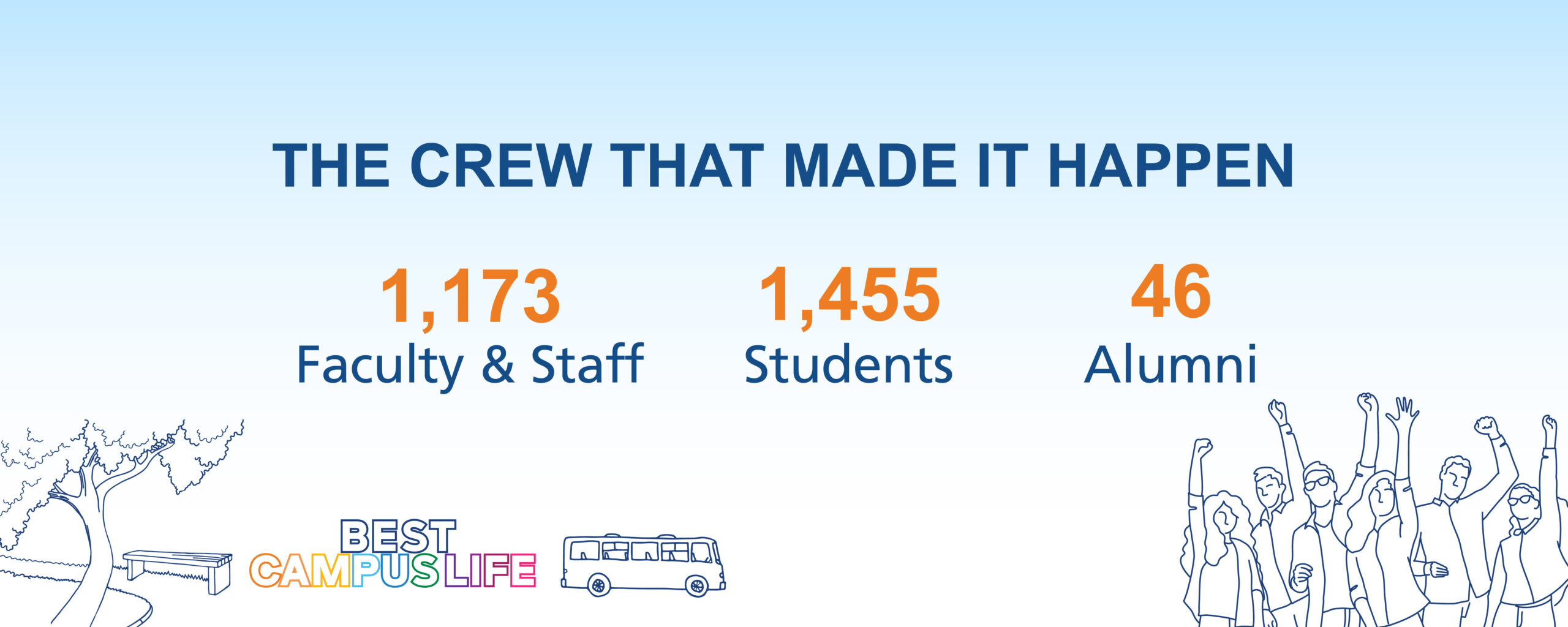 "The NUS Open House was an absolute delight! It provided me with invaluable insights into campus life and academic offerings," said prospective student Sim Wen Hao, who is currently in national service. "From informative discussions to first-hand testimonials, every interaction left me feeling more confident about my potential home away from home."
"The NUS Open House was an absolute delight! It provided me with invaluable insights into campus life and academic offerings," said prospective student Sim Wen Hao, who is currently in national service. "From informative discussions to first-hand testimonials, every interaction left me feeling more confident about my potential home away from home."
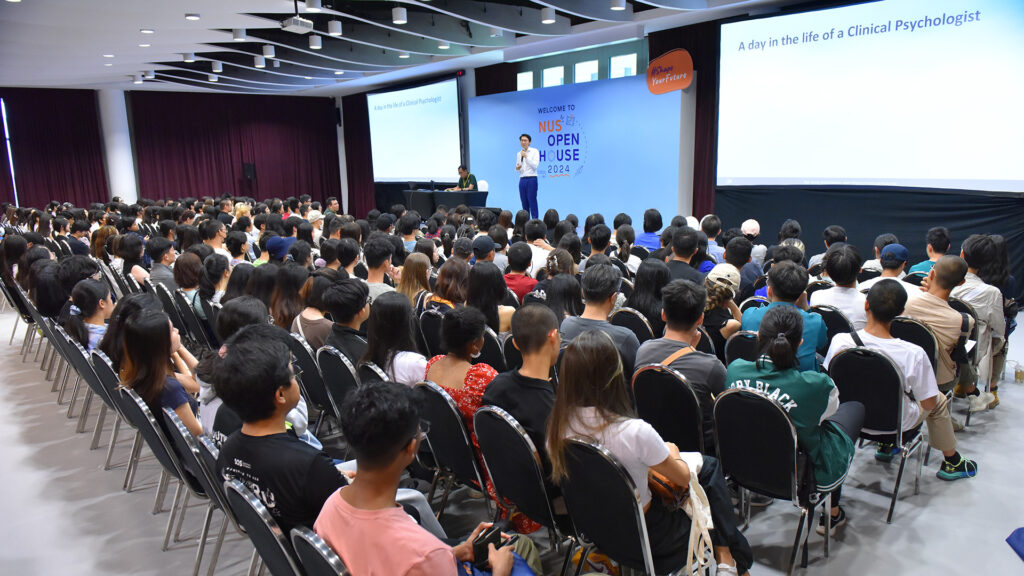
Charting pathways in humanities and sciences
The College of Humanities and Sciences (CHS), comprising the Faculty of Arts and Social Sciences (FASS) and the Faculty of Science (FOS), showcased how it is equipping students with skills to integrate knowledge across these domains and the wide range of programmes they can choose from through a variety of major and minor combinations.
An FASS panel featuring a Geography major, a Political Science major with a minor in Economics, a Philosophy major pursuing a Double Degree, and a Southeast Asian Studies major taking a minor in History dispelled misconceptions about their disciplines while discussing the potential career paths. Another joint talk by Psychology and Social Work on addressing mental health challenges in the 21st century explored how the issue is approached from their respective disciplines.
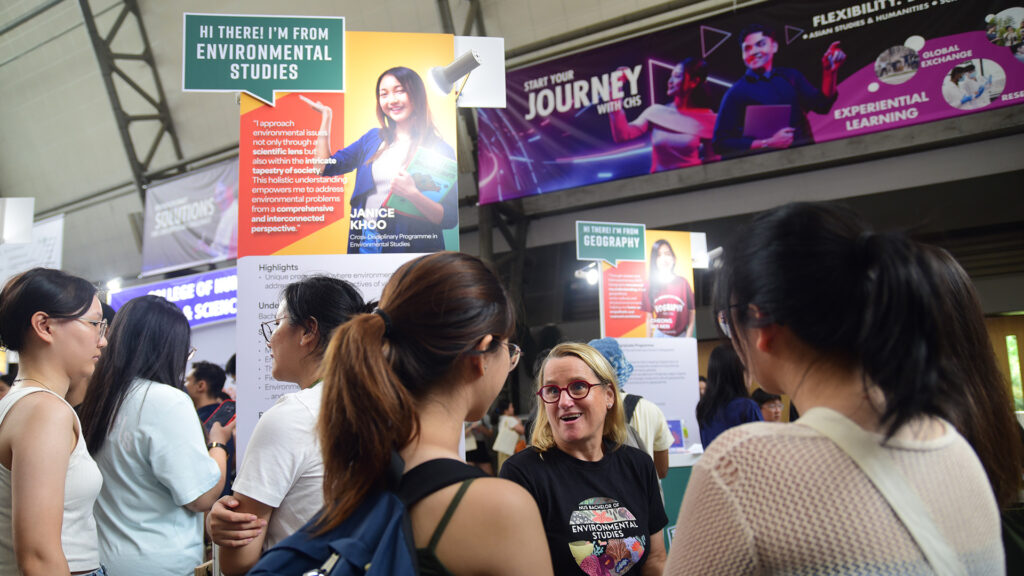
The boom in big data was the focus of the Data Science and Analytics talk that highlighted how the programme offers students industry exposure through real-world projects and internships. Another talk by the Environmental Studies Cross-Disciplinary Programme discussed its mission to develop environmental sustainability advocates keen to derive creative solutions to complex problems, along with its exciting fieldwork opportunities.
Lee Sue Ning, a Hwa Chong graduate who is interested in applying to Psychology, said of the FASS student panel: "The four students were from courses that I would never have considered. Hearing their experiences opened new doors for me, making me consider these courses as possible minors that I can take," she added.
Intersection of design and engineering
The talk on Chemical Engineering, Materials Science and Engineering, and Biomedical Engineering, held by the College of Design and Engineering (CDE) gave students valuable insights on the curriculum and disciplines, as well as showcased students' research. In an Ask-Me-Anything panel, the professors also shared about the flexibility of the curriculum, future career prospects, intersections between the various fields of engineering, and their thoughts on the most challenging yet rewarding aspects of taking a degree in Engineering.
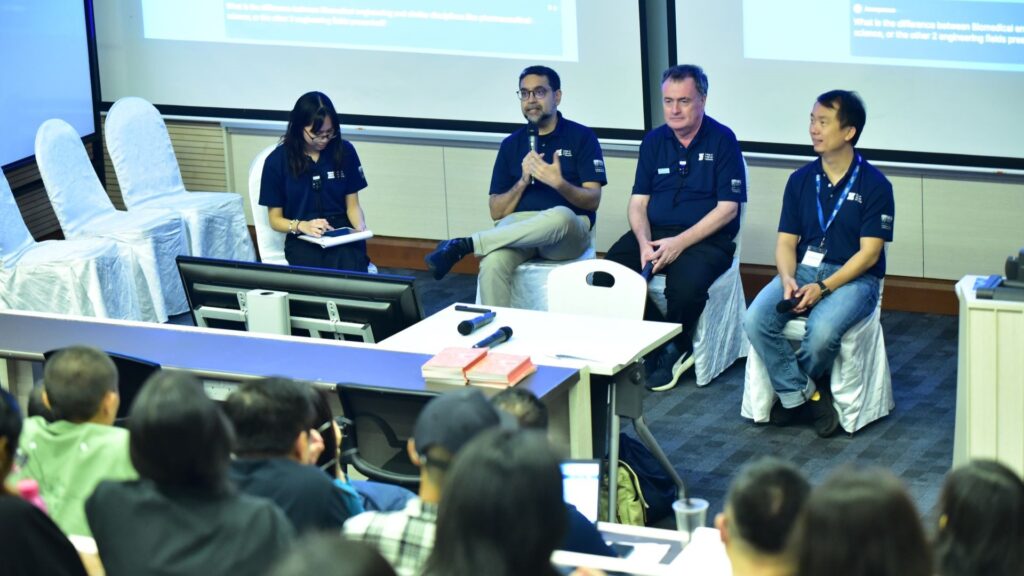
The talk on Architecture, Industrial Design, and Landscape Architecture gave students the inside scoop on how the programmes provide the core foundation, training, skills, and knowledge for students to become the next generation of effective and innovative architects and designers.
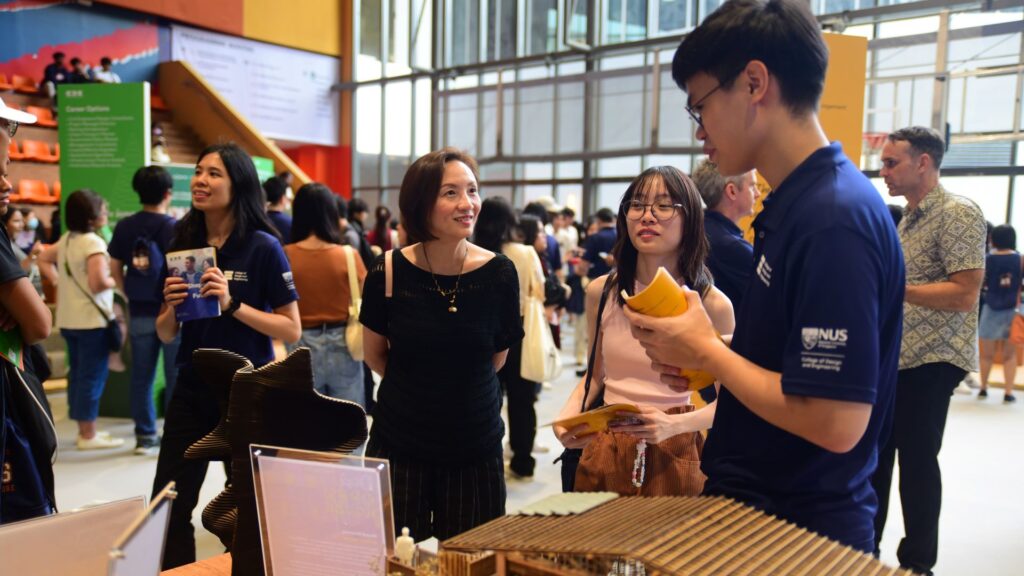
Over at SDE3, CDE's Built Environment Research Tour took participants behind the scenes-from live demonstrations of how 5G robotics reduce manpower and increase efficiency, to a lab tour of NUS' hydraulics laboratory facilities to explore wave mechanics and how natural coastal ecosystems like mangroves can protect shorelines against climate change. Students also participated in a hands-on session to design their own shoreline adaptation, choosing from models of nature-based solutions as well as traditional infrastructure.
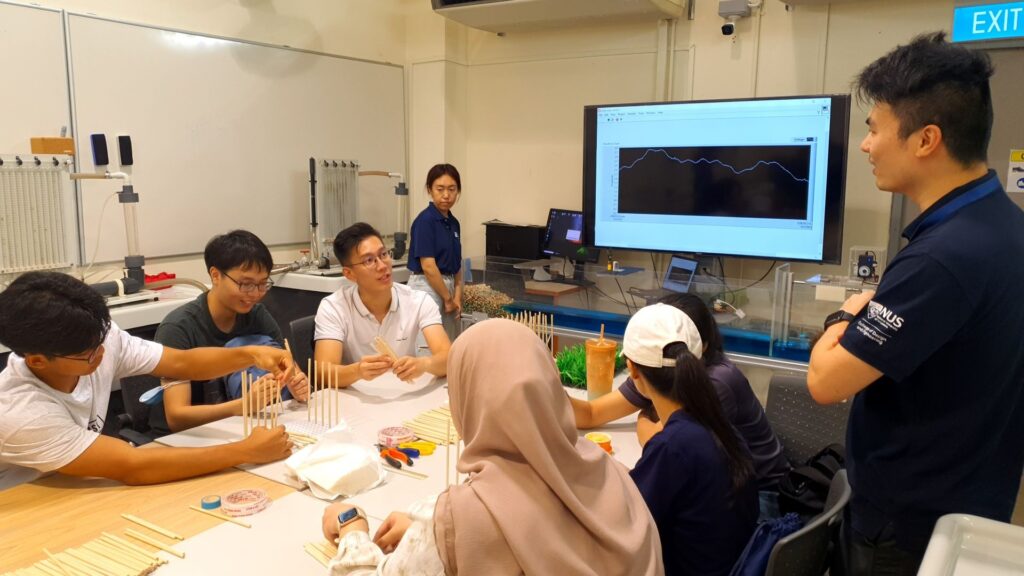
"It was nice to be able to see the facilities and get an idea about what Singapore is currently trying to improve on-designing a world with humans and robots, and coastal protection," Nur Annatasyia Binte Joferi, from Singapore Polytechnic, said. "It made me think about how things will progress and what comes next after those goals are met."
Immersive learning experiences
NUS College offered prospective students a window into its extensive interdisciplinary education that blends small-group seminars with experiential learning and a rich residential immersion through special classes on topics such as love, food, and even Shakespeare's plays. During Dr Chan Chi Wang's class on quantifying facial attractiveness using mathematics and statistical methods, prospective students busily plotted measurements of facial features on graph paper. In Associate Professor Stuart Derbyshire's class, they decoded mysterious sounds and intriguing illusions - sometimes with the aid of 3D glasses - understanding the science behind brain mechanisms that influence our perception.
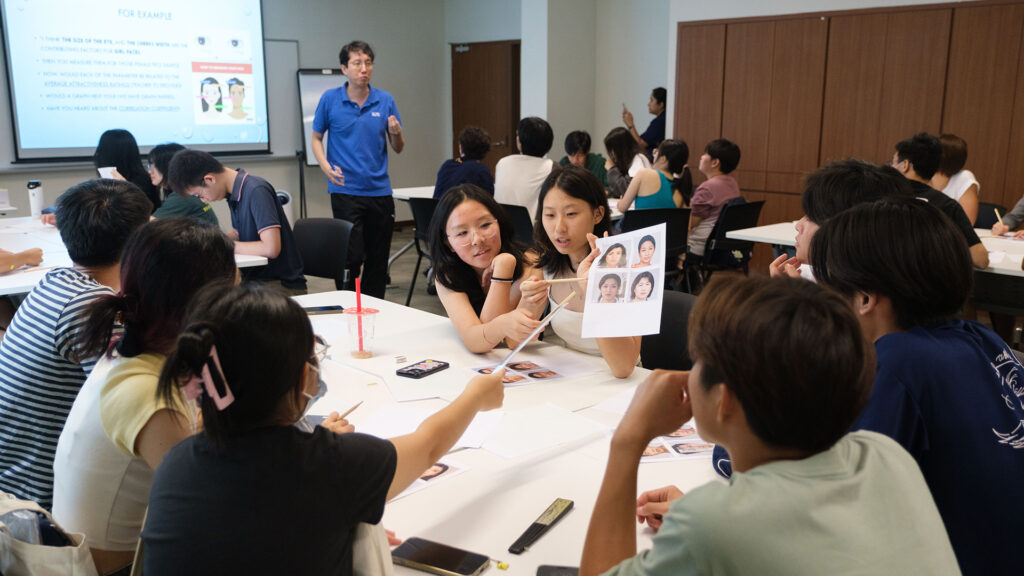
Foo Jun Wei, a Hwa Chong Institution graduate who will be joining Computer Science and NUS College, came away with useful information on what to expect as an incoming NUS student. "I enjoyed taking part in the guided tour where I got to see first-hand the facilities and accommodations that NUS College provides, as well as the immersive sample lesson on quantifying facial attractiveness. Above all, I was glad to be able to clarify my existing doubts and seek advice from the friendly student ambassadors on the ground," he added.
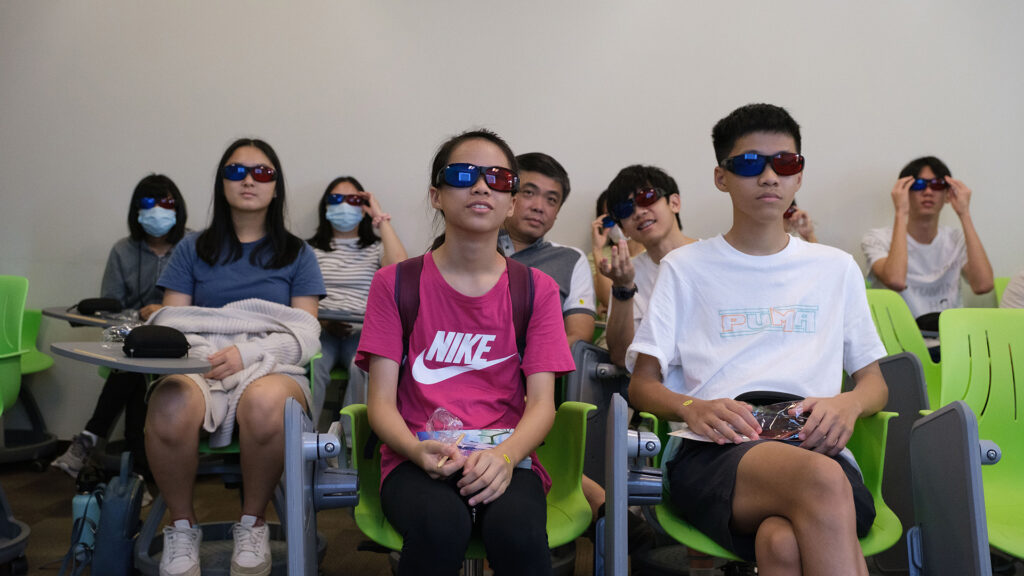
Over at Bukit Timah Campus, visitors to NUS Law had the choice of two masterclasses on criminal justice and conflict resolution approaches. At its mock moot sessions, visitors sat attentively in the gallery witnessing a simulation of a court case.
Mastering the 'heart' and science of healthcare
Prospective students interested in Medicine, Dentistry, Nursing and Pharmacy had the chance to find out about the new Common Curriculum for Healthcare Professional Education, which has been designed to align with Singapore's shift towards preventive healthcare. Aside from touching on the Common Curriculum, talks by NUS Medicine offered an overview of its academic journey, highlighting features such as its strong mentorship support and Pathway programmes aimed at broadening their skill sets. During a special class by NUS Nursing, visitors tried out basic nursing skills like using a stethoscope and learnt the importance of collaboration between healthcare professionals.
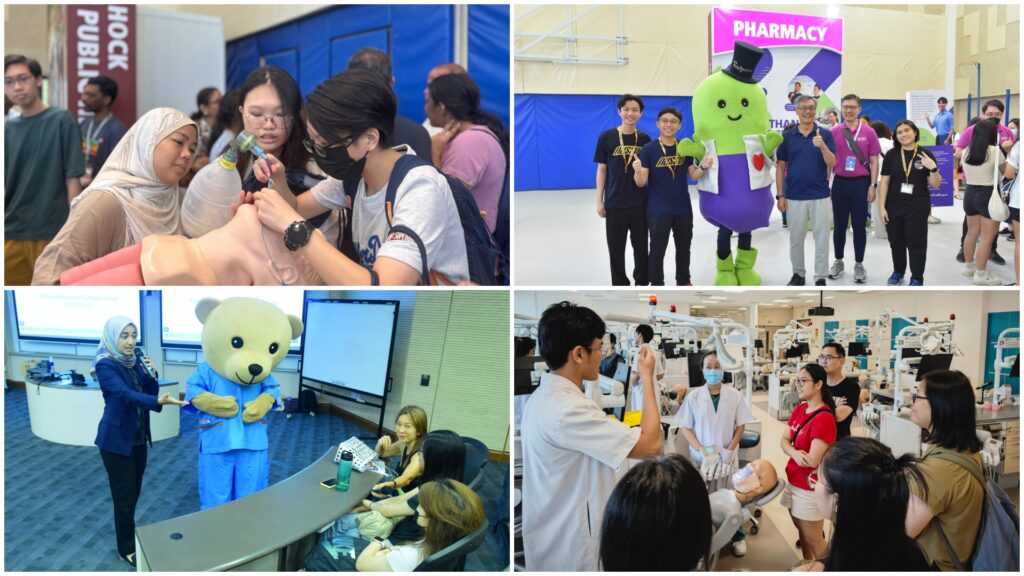
Prospective students interested in Medicine, Dentistry, Nursing and Pharmacy had the chance to find out about the new Common Curriculum for Healthcare Professional Education, which has been designed to align with Singapore's shift towards preventive healthcare. Aside from touching on the Common Curriculum, talks by NUS Medicine offered an overview of its academic journey, highlighting features such as its strong mentorship support and Pathway programmes aimed at broadening their skill sets. During a special class by NUS Nursing, visitors tried out basic nursing skills like using a stethoscope and learnt the importance of collaboration between healthcare professionals.
The interactive Pharmacy masterclass, titled "Unveiling the Pillars of Pharmacy: The Science and Art of Medication Therapy", saw prospective students participate in the decision-making process of a real-life clinical case study. They also gained insight into how NUS Pharmacy structures its curriculum to incorporate live interactive classes, science practicals, skills labs, and collaborative learning workshops, to help students apply concepts in real case studies.
Prospective student Wong Hon Wei from Anderson Serangoon Junior College said, "The Pharmacy masterclass was quite enjoyable yet unique, as the way the collaborative learning workshop was structured was engaging, incorporating the Biology and Chemistry concepts learnt in classrooms into real-world medical applications."
Innovating solutions for society and the world
Another popular feature at this year's Open House was the Innovation and Impact Hub, which showcased groundbreaking projects by students from CDE, Chua Thian Poh Community Leadership Centre, NUS College, and FOS that are making a tangible impact on society and the world.
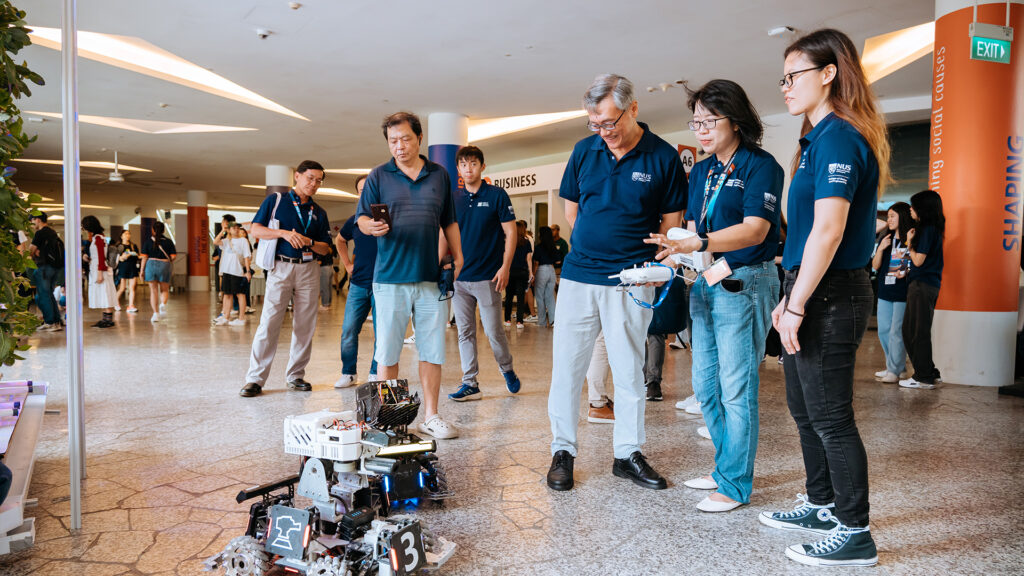
Visitors caught the interactive projects in action, from The Moving Farm, a movable modular tower system for hydroponics farming that increases crop yield sustainably, to TinkerThings, a project on AI-based gamified activities innovated to improve seniors' mental wellbeing and cognitive faculties.
Aside from exploring academic pathways, visitors also discovered NUS Enterprise's suite of entrepreneurship initiatives, including the NUS Overseas Colleges, NUS Enterprise Summer and Winter Programmes in Entrepreneurship, and incubation hub THE HANGAR.
At a panel session on student entrepreneurship, prospective students heard from NUS alumni who founded three start-ups - Pitchspot, Wateroam and Skilio. The founders shared how their involvement in Enterprise's entrepreneurship programmes and the support they received through the HANGAR enabled them to nurture their business ideas.
Exciting array of student and residential life activities
Over at the Student Village, a smorgasbord of vibrant student performances took Town Plaza by storm throughout the day, treating visitors to an exhilarating kaleidoscope of talent from student clubs and interest groups.
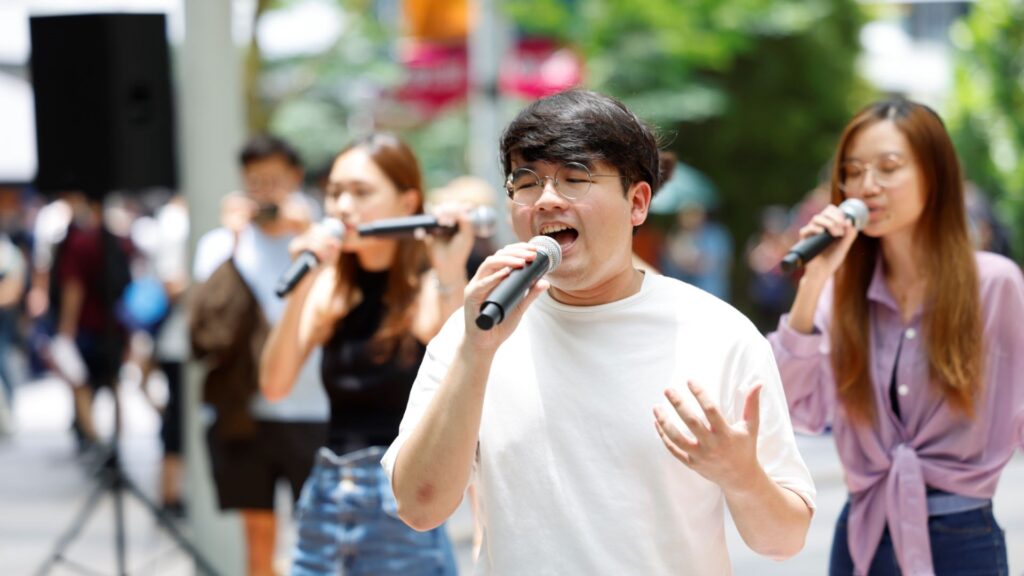
Getting a glimpse of the diverse student life opportunities that await, visitors were hyped up by the energetic cheerleading displays of King Edward VII Hall's KE Titans, the snazzy beats of NUS Rappers, and the slick dance moves of the NUS Korean Cultural Interest Group. They were also serenaded with catchy tunes from the Sheares Hall band, a capella group NUS Resonance, and NUS Fingerstyle Guitar.
On top of A-Day-in-the-Life videos and 360° virtual tours of the various Residential Colleges, Halls, and Houses, Masters and student representatives from the residences mingled with prospective students at the booths, talks, and Ask-Me-Anything panels, where they shared their insights and anecdotes on the on-campus experience, as well as the distinct culture of each residential unit.
Along with offering guided in-person tours and simulated classes, the residential units also showcased the interest groups available. Other engaging activities, such as Tembusu College's live performances and Ridge View Residential College's sports experience zones, coffee pour demonstrations, and warli art making gave prospective students a taste of the many facets of holistic residential life.
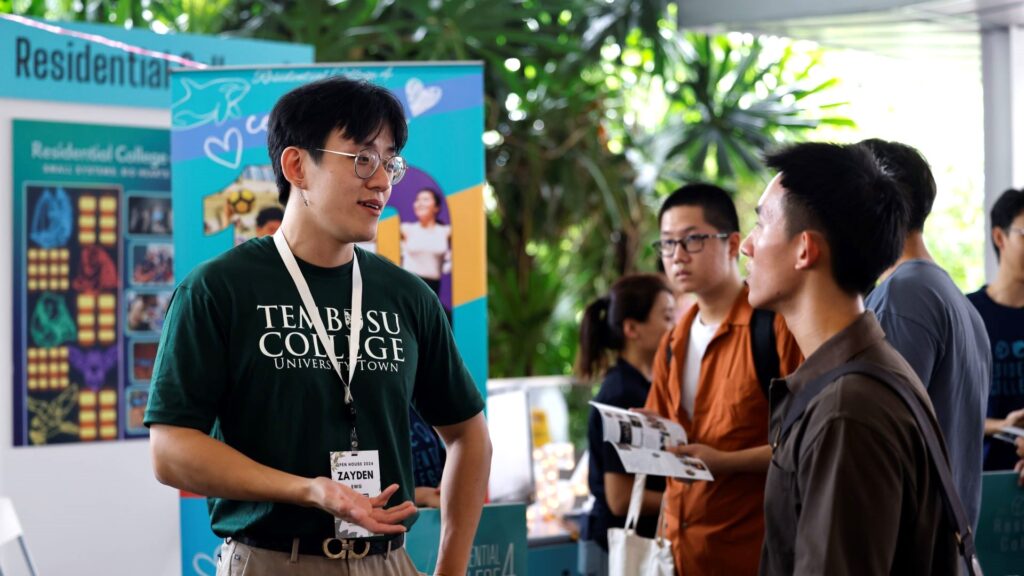
Prospective students Inez Ang from National Junior College and Vishnu Raj from Millennia Institute said the residential showcase gave them a better picture of living on campus.
Runyi Zhang, a graduate of St Andrew's Junior College who is applying to Business, said she had an enlightening experience sampling both the academic and extracurricular options. "Through the Open House, I've managed to capture a glimpse of student life in NUS… allowing me to have a clearer and more vivid image of what my future could be like here," she added.
This story first appeared in NUSNews on 14 March 2024.
Singaporean Women Living in China: The Uneven Burdens of Middle-class Transnational Caregiving
International Women's Day is commemorated annually on 8 March. This celebration empowers women by making their struggles visible, thus advocating for greater equality of the sexes.'Singaporean Women Living in China: The Uneven Burdens of Middle-class Transnational Caregiving' (Asian Studies Review, 2022) by Dr Sylvia Ang (Monash University), Associate Professor Thang Leng Leng (NUS Japanese Studies and Next Age Institute), and Professor Elaine Ho (NUS Geography and Asia Research Institute) contributes to knowledge about the inequalities women face, particularly in the transnational and ageing contexts. The paper draws on interviews with Singaporeans who are living in or recently lived in China. It primarily examines how gender moulds the options open to unmarried women and the decisions they make as they negotiate life between China and Singapore. The study finds that, as much as visa and residence status influence whether female migrants can stay in China, ideas of what is expected (or proper) behaviour also impact their decisions to stay in or leave China. The authors first observe that, compared to men, foreign women in China (including Singaporeans) have fewer options to prolong their stay. This is because, firstly, at the time of writing, the retirement age for women in China was 55, five years earlier than the retirement age of 60 for men. This means that employment opportunities are limited and less permanent for older women. Secondly, access to permanent residence or citizenship is strongly tied to marital status. Older women find it challenging to meet this requirement because it is difficult for them to find local partners: there is a cultural propensity for men to date women who are younger than them. The researchers also uncover that older women in families split between China and Singapore frequently find themselves in transnational caregiving roles. Unmarried women living in China tend to retain some form of care expectations back in Singapore. They could be supporting families financially by paying for rent or education expenses. They are also expected to travel several times a year to visit family members, sometimes taking over care duties during the time they are back in Singapore. The study’s respondents report that they dutifully respond to these expectations. Gendered expectations in Singapore also seem to impact the migrants' decisions to move back from China. For instance, some respondents indicate that they felt obligated to return to Singapore to care for ageing parents because their married siblings are busy with their own families. They internalise their obligations to take care of older family members by virtue of their status as single women. The study finds that gendered norms not only apply to young women, but persist into middle-age as well. The effects of gendered expectations are also surprisingly cross-national. In this case, gendered expectations in Singapore are also revealed to apply to Singaporean women living abroad. Read the article here: https://www.tandfonline.com/doi/abs/10.1080/10357823.2022.2124955
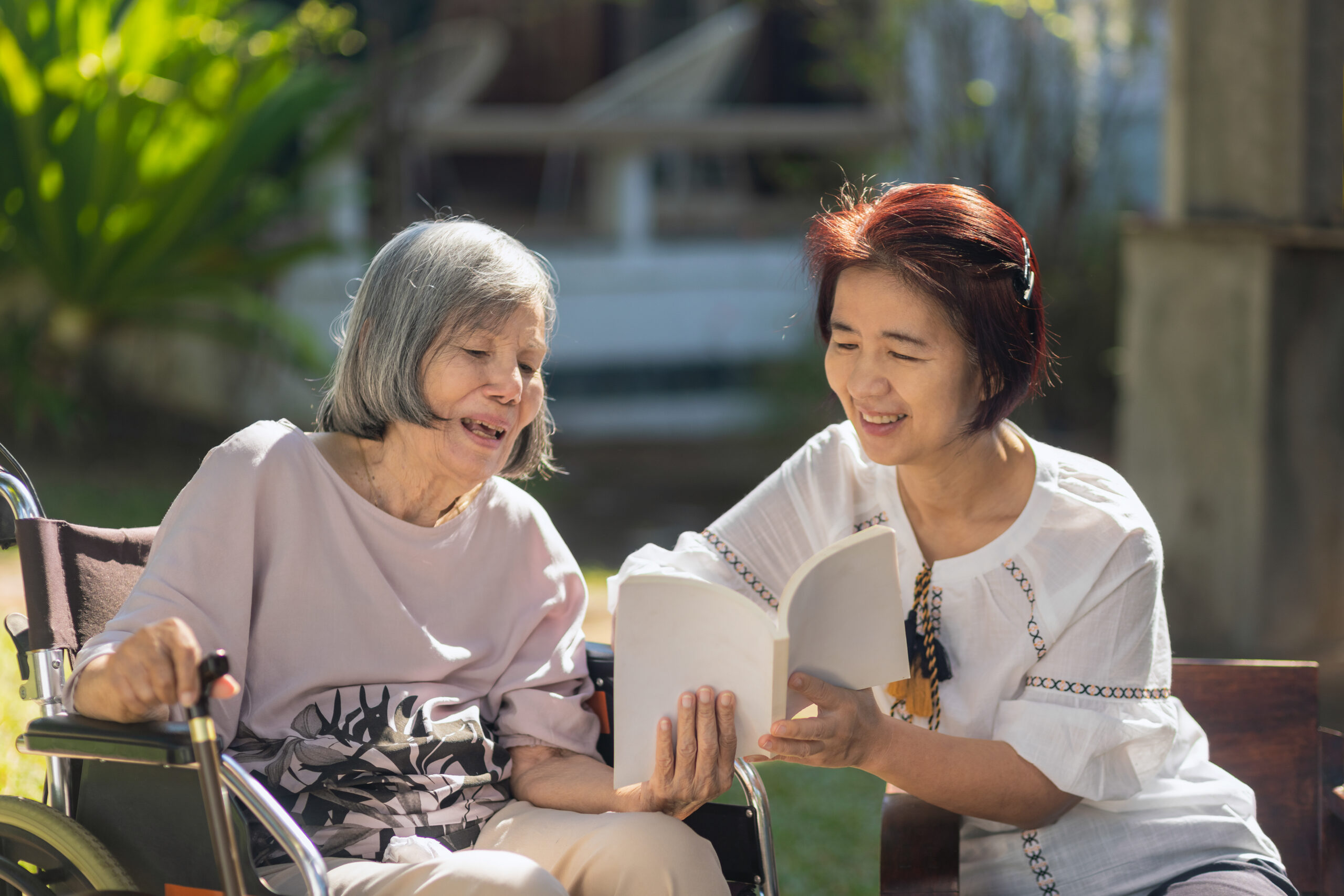
Coming Together in a Whole-of-Society Approach to Address Singapore's Ageing Population Challenges
IN BRIEF | 5 min read
- The profiled alumna Ms Siti Adriana Muhamad Rasip is the co-founder of Empowered Families Initiative, which seeks to harness the strengths and abilities of low-income families by investing in their aspirations, and took home the top honours at the inaugural =Dreams Asia Breakthrough Prize Competition, a nationwide contest of ideas to eradicate poverty.
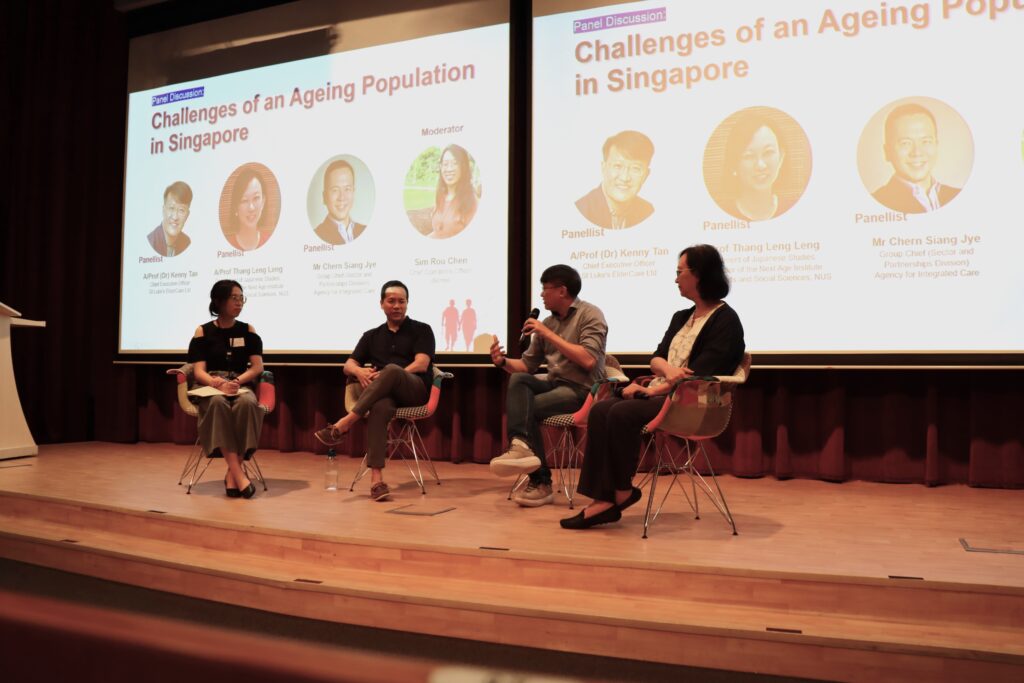
How can the whole of society be mobilised to tackle the challenges of an ageing population in Singapore? As the Singapore population demographic greys progressively, this question was at the centre of discussion at the annual symposium of the NUS Chua Thian Poh Community Leadership Centre (CTPCLC).
Held on 30 September at NUS University Town, the symposium gathered more than 120 attendees consisting of NUS students, staff and alumni, as well as stakeholders from the public and social sectors. Now in its 11th iteration, the in-person event saw changemakers, community leaders, and thought leaders discussing the issue of 'Challenges of an Ageing Population in Singapore', and how different organisations and individuals are doing their part to tackle this challenge.
The event was graced by Guest-of-Honour Mr Tan Kiat How, Senior Minister of State for Ministry of Communications and Information and for National Development, and Adviser to East Coast GRC Grassroots Organisations.
Noting that Singapore is home to some of the world’s longest living persons, Mr Tan highlighted the importance of closing the gap between life span and health span, adding that this is where everyone has a role. Mr Tan also reflected on his experiences of encountering seniors forming social networks and actively volunteering in the community, to overcome social isolation.
Expressing his delight that the CTPCLC curriculum has offered undergraduates a path to support these initiatives with their research and involvement in the community, Mr Tan expressed that this would bode well for our community, as it takes an all-of-community approach to tackle the challenges of an ageing society like Singapore.
Holistic Approaches to AgeingAttendees at the symposium delved into a thought-provoking hour-long panel discussion elaborating on efforts and plans to address the challenges of the ageing population in Singapore. Moderated by CTPCLC alumna Ms Sim Rou Chen, Chief Operating Officer of WeHiro, panellists Mr Chern Siang Jye, Group Chief, Sector and Partnerships Division, Agency for Integrated Care; Associate Professor (Dr) Kenny Tan, Chief Executive Officer of St Luke's ElderCare Ltd; and Associate Professor Thang Leng Leng from the NUS Japanese Studies and Co-Director of the Next Age Institute, NUS Faculty of Arts and Social Sciences), exchanged stories, insights, and recommendations on effectively addressing the challenges posed by an ageing population.
The discussion explored topics such as healthcare management, social support systems, and policy interventions, all designed to address key challenges faced by the elderly in our community. Assoc Prof (Dr) Kenny Tan captured the challenges succinctly in three words: helplessness, loneliness and boredom.
These thoughts were also echoed by Assoc Prof Thang Leng Leng, who spoke about loneliness and social isolation, even for elderly parents who may be living with their children, when conversations within the home could be limited to routine check-ins such as “Have you taken your medicine today?”
The discussion underscored the real need for elderly among the community to be actively engaged – and that the community can play a part through raising awareness of the former’s needs and supporting befrienders’ programmes, in ensuring that seniors can age amidst a strong social support network.
From Engagement to EffortSince its establishment in 2011, CTPCLC has continually challenged and empowered its students to explore the many facets of Singapore society and consider solutions to alleviate and address societal issues. CTPCLC students’ thoughtful analyses and implementations were showcased at the symposium through presentations, demonstrations and poster displays.

CTPCLC students and project partners Charmaine Song (Business, Year 4) and Tong Hui Yi (Social Work and Sociology, Year 4) took to the stage to elaborate on a year-long project they had embarked on in partnership with Thye Hua Kwan Moral Charities Limited.
During their project, which was titled ‘Reimagining the Active Ageing Centres (AACs) of Thye Hua Kwan’, Charmaine and Hui Yi interacted with seniors who were service users at Active Ageing Centres (AACs) in Ang Mo Kio. From the conversations, they gathered the seniors’ various opinions and hopes on how the AAC could further develop to serve Singapore’s ageing population.
Adopting a mixed methods approach that incorporated the use of observation work, semi-structured interviews, focus group discussions and online surveys, their study revealed that future AACs can play a vital role in serving as important sources of social, cultural and spatial capital for seniors: AACs provide social capital through important networks and social support among seniors; cultural capital by being a hub for acquiring new knowledge that will empower them; and spatial capital by being a potential ‘home away from home’, enabling seniors’ access to additional spaces of emotional and physical comfort.
The study also put forth key recommendations that highlighted how AACs can be further developed as a space for intergenerational communal socialisation, while serving as a rallying site for proactive seniors to engage in community-related volunteerism.

Beyond talks and discussions, attendees at the symposium also engaged with passionate CTPCLC alumni and students at a series of live demonstrations and poster displays detailing their various engagements with the community.
Amongst these was a demonstration by CTPCLC alumnus Mr Willoughby Niki Lee (College of Design and Engineering, Class of 2022) of his brainchild BoomBox - AI-based gamified activities innovated to help in seniors’ wellbeing, inspired by his love for the community and his engineering knowledge.

Ms Sim Rou Chen (Social Work and Psychology '22) also led an ageing simulation demonstration which allowed participants to experience what ageing could feel like, through the use of props and equipment like goggles, walking sticks and sandbags which hinder physical movement. Through this, participants developed a greater understanding and empathy of the physical, and thereafter, social and emotional, encounters and challenges that seniors could be facing in their daily lives.
Celebrating Tomorrow’s ChangemakersA ceremony was also held at the symposium to honour the achievements of CTPCLC’s Class of 2023, acknowledging their completion of the community development and leadership programme in NUS and celebrating their achievements in driving positive change within communities in Singapore.

“The Symposium has come at an opportune time as I begin my career in the community care sector,” said CTPCLC alumni Mr Kho Yong Xiang (Communications and New Media '23).
“CPTCLC has once again proven to be an invaluable platform for addressing the priorities of today. I heard peers discussing their ground-up research as well as connecting with partners and experts in the eldercare space. I am thankful for my time at the Centre and hope for more students to embrace the opportunities offered by CTPCLC,“ he added.
Beyond academics, the annual CTPCLC symposium provides a platform for like-minded individuals to share knowledge, foster collaboration, and inspire future leaders to address pressing community issues, making a difference to those around them. From their first tentative steps of taking courses at CTPCLC, the symposium also documents how students have been empowered to develop themselves further into passionate community builders and future leaders.
“In addition to the good work our alumni and students are doing in the community, it is really heartening that they continue to engage the Centre at an event like this one,” said Associate Professor Chng Huang Hoon, Director of CTPCLC. “I feel very proud to have been a part of their wonderful journey."
This story by NUS Chua Thian Poh Community Leadership Centre first appeared in NUSNews on 16 October 2023.
Uncovering the Secrets of a Ryokan
IN BRIEF | 10 min read
- Associate Professor Chris McMorran (NUS Japanese Studies) worked 14 hours a day at a traditional inn in a Kyushu onsen town for a year, and six other inns, as part of research for ‘Ryokan: Mobilizing Hospitality in Rural Japan’.
Click through image below to read this piece.
This article first appeared in The Straits Times and NUSNews on 9 May 2023.
Beyond Sushi and Umami: Curating an Immersive Experience through Japan’s Culinary Culture
IN BRIEF | 8 min read
- Find out how Associate Professor Emi Morita and Associate Professor Hendrik Meyer-Ohle from the Department of Japanese Studies at the NUS Faculty of Arts and Social Sciences curate an immersive, experiential pedagogical experience that brings to life the politics, culture, history and religion of Japan through the lens of culinary culture.
At the start of every term, Associate Professor Emi Morita, from the Department of Japanese Studies at the NUS Faculty of Arts and Social Sciences, asks students to name their favourite Japanese food. Sushi and ramen are usually the top contenders.
What many of her students do not realise is that these two dishes originated outside Japan.
Sushi, for example, traces its origins to the paddy fields of Southeast Asia, where people tried to ferment and preserve fish using rice. And ramen, which comes from China, became more popular in Japan after World War II, when the country faced a food shortage and received large quantities of wheat from the United States.
“What they think is Japanese food has very complex histories,” said Assoc Prof Morita. “We cannot ignore such histories of culture, politics, business, and international relations.”
Her module, titled Itadakimasu – Food in Japan, has been running at NUS for the past 11 years. And of course, there is no better way to appreciate the complex history of Japanese culture than to get an actual taste of it.
That is why a Japanese tea ceremony (sado) – where students get to partake in the ceremony led by instructors from Japan – has long been a highlight of the course, which emphasises immersive experiential learning that takes education beyond the classroom.
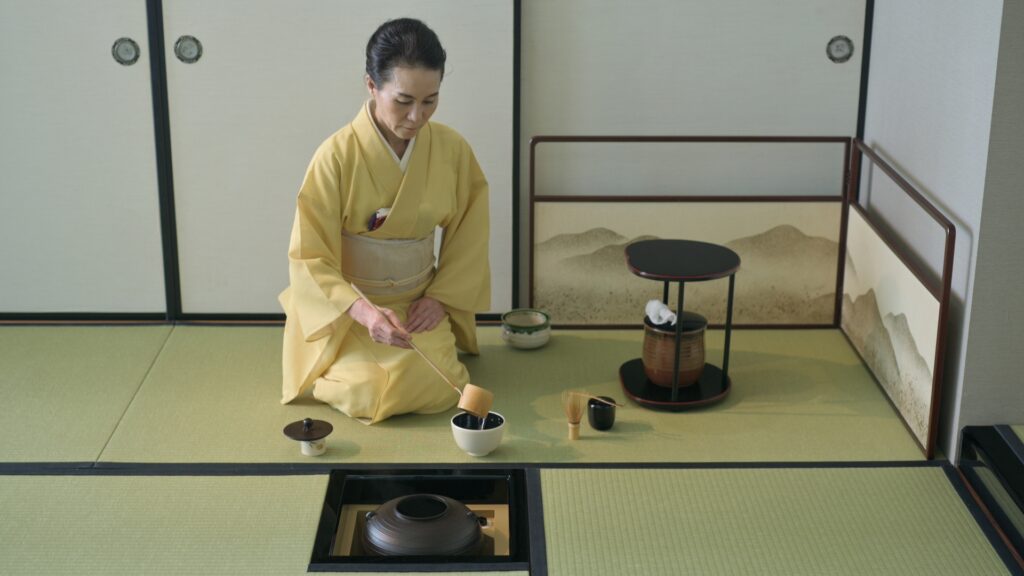
There is meaning and intent behind every step of the ritual – from the way people sit on tatami mats to the orientation of tea bowls and the exchange of bows. The decorations in the room, and the types of sweets served, reflect the time of year. Every tea master, dressed in traditional kimono, serves matcha sourced from their favourite tea farm in Japan.
“Because it has a lot of Zen Buddhist elements, the tea ceremony is not really explicitly – or verbally – taught, I don’t want to explain it too much during the tutorial, because the students should feel something themselves by experiencing it,” said Assoc Prof Morita, who added that the 45-minute session, held in the university’s Japanese Studies Culture Room, consists of a heavily-abridged version of the full ceremony, followed by class discussion.
“There is a certain way to pick up the utensils, and what to say, and how to bow. I emphasise (that they should think about) why there are such prescribed rules. For example, the (right) way to pick up chopsticks or pick up the tea bowl minimises the chance of damaging the precious object. And knowing how to bow, what to say, is about showing respect to others.
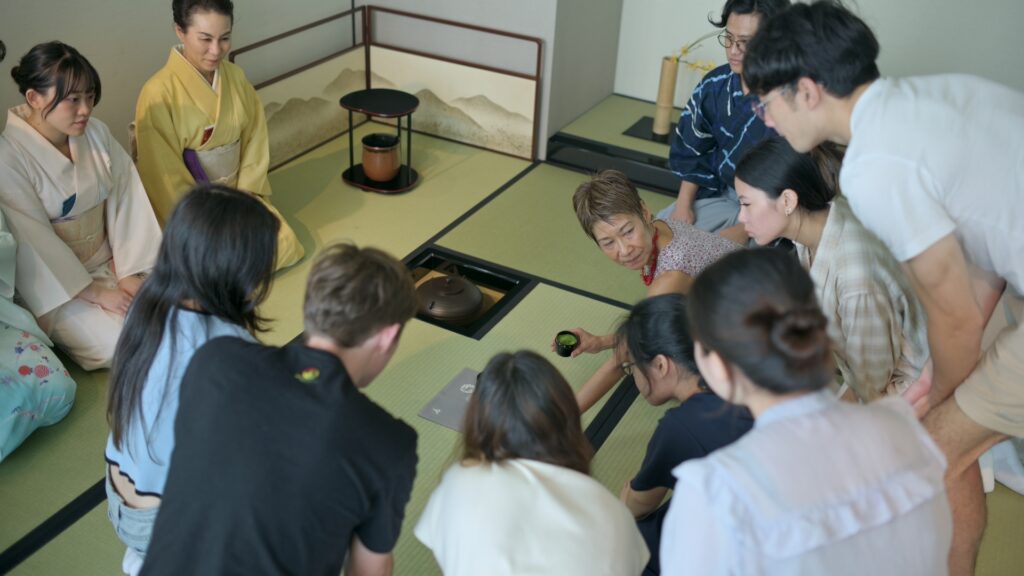
“You situate yourself in the nexus of the social network, and think that you are here but you are also aware of the other people. You are here because other people are also here.”
To see the World in a Grain of Rice
Assoc Prof Morita and her department colleague, Associate Professor Hendrik Meyer-Ohle, have helmed the Itadakimasu – Food in Japan module from day one. Itadakimasu, which means “I humbly receive”, is commonly said before the start of a meal in Japan.
While the two professors are the course coordinators, most of the classes are run by guest lecturers from different disciplines who share their insights on Japanese politics, religion, culture, and society through the lens of food.
“You cannot really understand food culture,” said Assoc Prof Morita, “unless you look into history, politics and religion.”
“We wanted to create a larger image of Japan, and food was a vehicle to do that,” added Assoc Prof Meyer-Ohle. “We are one of the larger Japanese departments in the world, especially in terms of the breadth of colleagues – (among whom are) historians (and researchers of) popular culture, business, politics, and society.”
Both professors have lived in Singapore for about two decades. Assoc Prof Morita, an applied linguist from Tokyo, has an especially deep affinity with food – her family runs a 75-year-old restaurant near Shinagawa selling “home-style” Japanese dishes. Assoc Prof Meyer-Ohle, who comes from the northwest German city of Osnabruck, wrote a PhD thesis on the introduction of supermarkets, convenience stores and modern retail formats to Japan.
Savouring the Taste of Umami
Another hands-on feature of the course is a tasting session by monosodium glutamate (MSG) producer Ajinomoto. Students take part in a “chemistry experiment” where they mix solutions consisting of bonito (a type of fish) and kombu (kelp) to create the flavour of umami, or a uniquely Japanese savouriness.
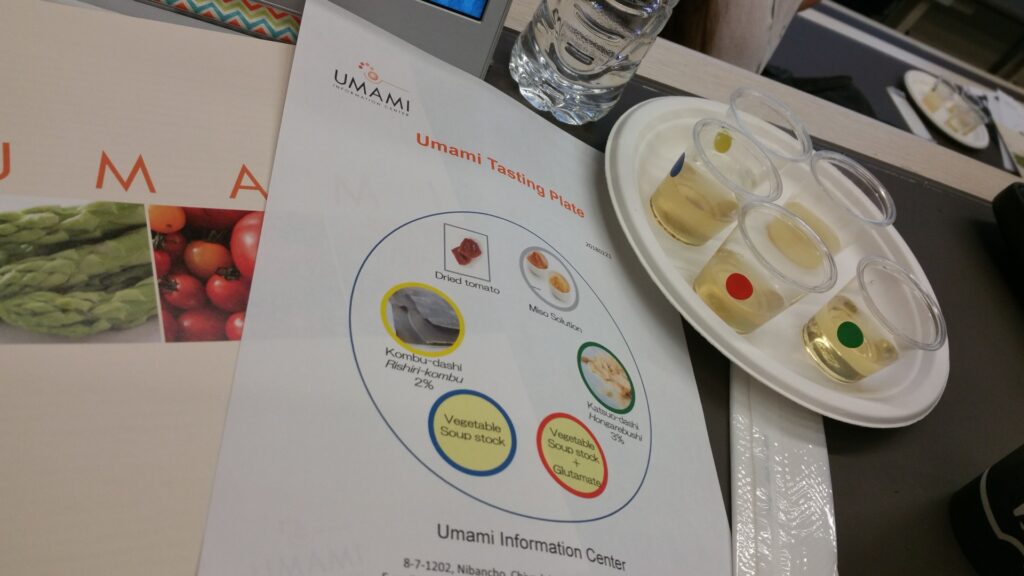
Assoc Prof Meyer-Ohle shares that students are encouraged to think critically about issues such as the “MSG debate” which includes criticisms that the popular flavour enhancer is bad for health.
Claims about its negative health effects date back to a letter published in the New England Journal of Medicine in 1968 from a physician who suggested that the food he ate at Chinese restaurants led to symptoms such as headaches and heart palpitations, coining the term ‘Chinese Restaurant Syndrome’.
Subsequent studies, however, have failed to show a clear link between these adverse reactions and the flavour enhancer, and the US Food and Drug Administration considers MSG-seasoned foods to be “generally recognised as safe”. The term has since been criticised for being pejorative and unscientific.
Such negative perceptions were “partially motivated by anti-Asian sentiment at the time,” said Assoc Prof Morita. “What I emphasise during the lecture is that if you hear some kind of statement, you should always check who is saying it, and what is the political motivation behind it.”
Besides tutorials, hands-on activities and readings, students also get the opportunity to engage in a debate on the controversial topic of whaling, challenging them to spar intellectually about real-life issues. They also have to write a reflective essay on their takeaways from the tea ceremony.
“The course material is very fun, but that doesn’t mean it’s an ‘easy’ course,” noted third-year undergraduate Isabelle Metzger, who is majoring in Political Science. “The topics are very structured and very insightful. It has that academic rigour to it.”
To fellow student Irfan B. Ibrahim, a third-year Psychology major, the tea ceremony was a highlight of the course.
“What it is trying to do is pull you away from the mundane, into the ritualistic realm,” he observed. “The concept is about ichigo ichie, which means one meeting, one occasion: you should really cherish the moments you experience, because you never know when you’ll get a chance of having it again.”
He added: “It’s a very enriching module. You don’t just learn about food. You learn about life, about yourself, and even your own culture.”
From participating in a traditional Japanese tea ceremony, to lively debates and umami tasting sessions, students of the Itadakimasu: Food in Japan course are challenged to take their learning beyond the classroom. Find out how Assoc Prof Emi Morita and Assoc Prof Hendrik Meyer-Ohle from the Department of Japanese Studies at the NUS Faculty of Arts and Social Sciences curate an immersive, experiential pedagogical experience that brings to life the politics, culture, history and religion of Japan through the lens of culinary culture.
This story first appeared on NUSnews on 3 May 2023.
NUS Open House: More than 7.7M Visitors Drawn to Action-Packed Showcase over 10 Days
IN BRIEF | 25 min read
- NUS Open House 2023 saw a strong showing by visitors eager to find out about the University’s academic programmes, as it returned in from 25 February to 6 March. Some 7.71 million visitors attended the physical and online showcase which involved 3,071 faculty and staff, students and alumni.
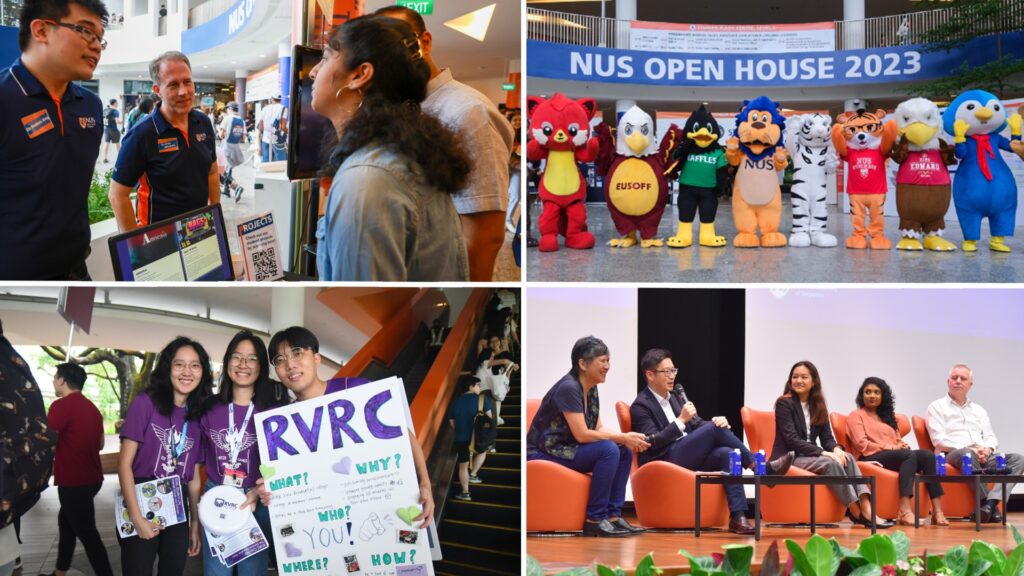
NUS Open House 2023 saw a strong showing by visitors eager to find out about the University’s academic programmes, as it returned from 25 February to 6 March. Some 7.71 million visitors attended the physical and online showcase which involved 3,071 faculty and staff, students and alumni.
Kicking off the 10 action-packed days were the informative virtual talks, webinars, and social media sessions. The on-campus event on 4 March saw packed crowds at the programme booths, talks, special classes, campus tours, student life performances and residential venues despite the heavy downpour. Prospective students gained valuable insights from faculty members, explored the University’s extensive global opportunities, as well as its diverse entrepreneurship platforms and lifelong learning courses, giving them a comprehensive overview of what NUS has to offer.
“I really enjoyed meeting the professors and students who are from the courses I'm interested in as I gained many insights from them on life in NUS and the various possibilities that are open for exploration,” said prospective student Karthika Warrier, an alumna from Raffles Institution who is considering applying to NUS Computing or the College of Humanities and Sciences (CHS).
Jasmine Chiam, an alumna from Nanyang Junior College (NYJC) who is interested in applying to CHS and NUS College, agreed. “The programme was well-run despite the fact that it was raining,” she said. “I felt that it was well-curated for students with different interests.”
A draw for many prospective students were CHS, the newly launched NUS College, and the College of Design and Engineering (CDE) – the University’s recent interdisciplinary pathways aimed at meeting the evolving demands of the workforce.
Addressing Shared Challenges with the Humanities and Sciences
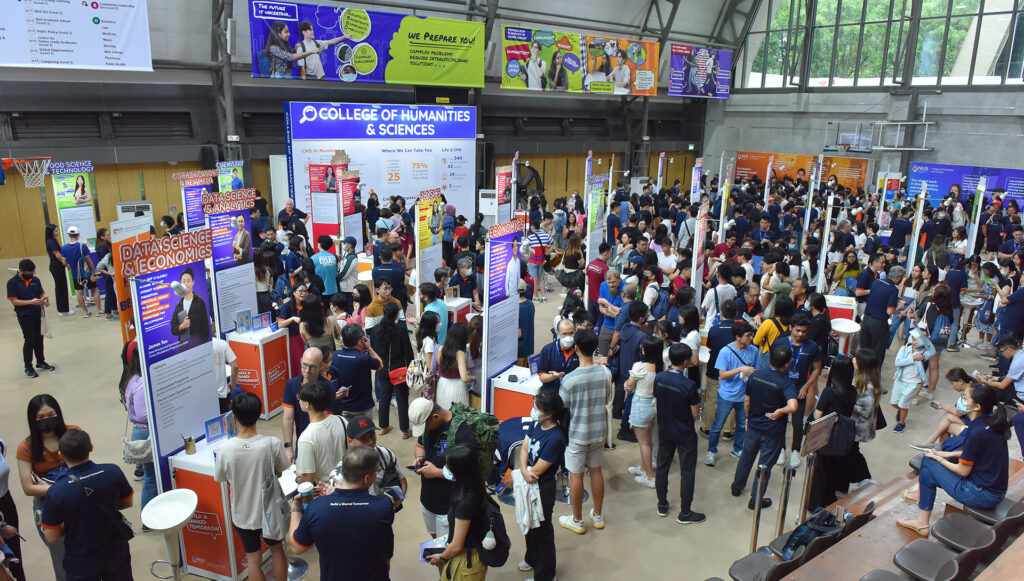
CHS, which provides an enhanced undergraduate experience for students of the Faculty of Science (FOS) and the Faculty of Arts and Social Sciences to pursue breadth and depth across academic disciplines, showcased its Common Curriculum throughout the Open House.
Currently accepting its third intake, it held talks on hot topics such as sustainability, food science and technology, and mental health to demonstrate how students can apply various perspectives to address complex real-world issues.
The panel entitled “Why Sustainability and Climate Change Matter” saw speakers from the Geography, Japanese Studies, Anthropology and English, Linguistics and Theatre Studies departments weighing in on the topic from their respective disciplines. Another session by the Department of Food Science and Technology explained how its programme applies principles from chemistry, biology, engineering and nutrition to address issues such as food safety and security, as well as the careers its graduates can pursue.
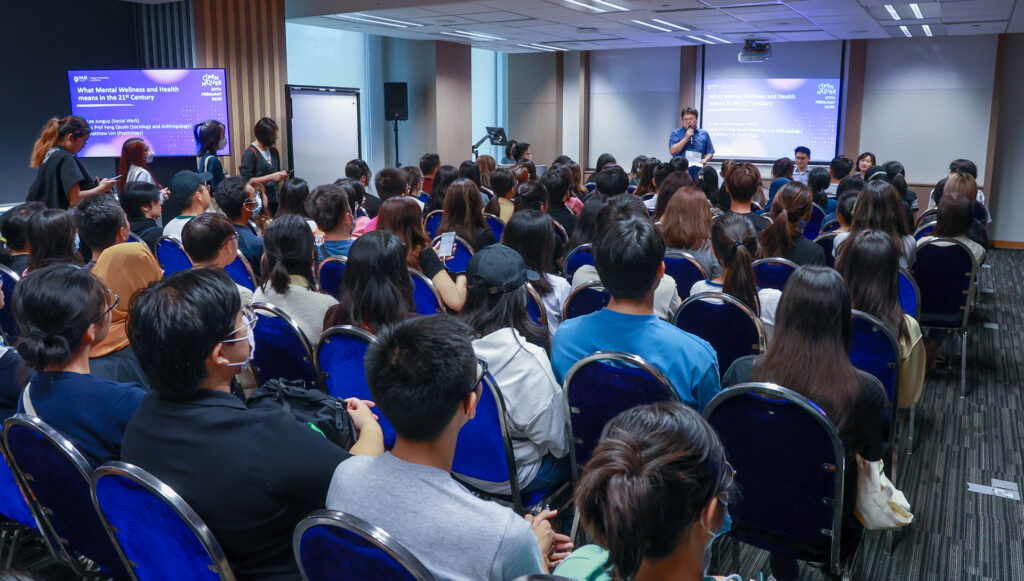
In the same vein, the panel “What Mental Wellness and Health Means in the 21st Century” saw speakers from the Social Work, Sociology and Psychology departments discuss perceptions of mental health in society. Dr Lee Jungup, an Assistant Professor in Social Work, pointed out the close relationship between social work and psychology. “Many of our Social Work students consider a double major with Psychology,” she said, noting that social work emphasises the practical while psychology is more theoretical and clinical in nature.
Jasmine, the NYJC alumna, said the various informative talks reaffirmed her decision to apply to NUS. “The NUS College tour as well as the CHS Common Curriculum sharing were particularly informative. They made the programmes seem quite appealing and I am looking forward to applying for both,” she said.
For some like Christian Chua, an alumnus from the NUS High School of Math and Science, attending the Open House talks helped clarify the career options available for the different programmes.
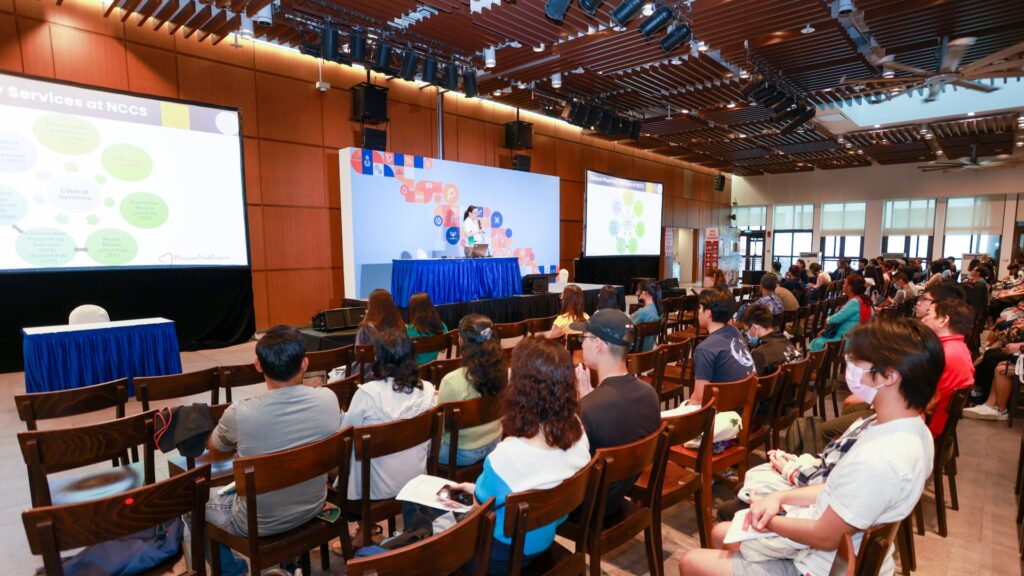
Christian, who is currently considering the Medicine, Pharmacy, and Pharmaceutical Science programmes, attended the Pharmacy talk and booth, where faculty members of different specialisations touched on the various career pathways and the collaborative practices of the discipline.
“It was useful that they discussed the different careers that Pharmacy graduates had gone into so I knew a degree in Pharmacy wouldn't just limit me to community or hospital pharmacy but also to the R&D, drug approval side, or the business side as well,” he said.
Shaping the Future of Design and Engineering
Meanwhile, there was action aplenty over at both the online and in-person Open House by CDE, which is accepting its second intake. Officially launched in November 2021, CDE was a merger of the Faculty of Engineering and the School of Design and Environment, ramping up the distinctive interdisciplinary experience at NUS.
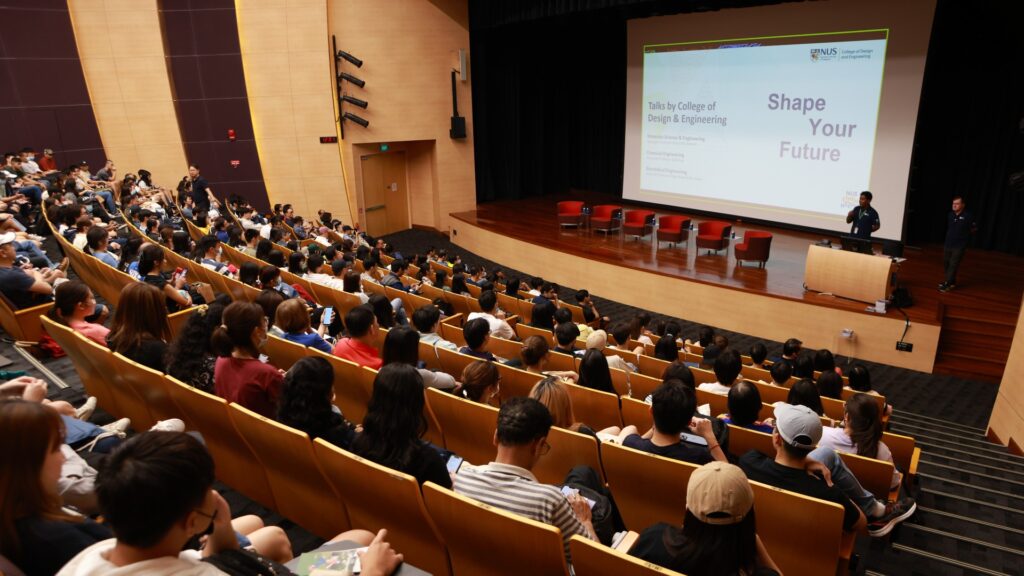
From the Common Curriculum and the multidisciplinary education model, to the Student Exchange Programme and future career prospects, CDE faculty and students shared their insights on a plethora of topics with prospective students.
The talks, such as the one on Biomedical Engineering, Chemical Engineering and Materials Science & Engineering, also provided valuable information. Prospective students learnt how undergraduates are exposed to a range of interdisciplinary topics with global-scale applications in class, and how NUS engineers are taking on the world’s biggest challenges, such as clean energy.
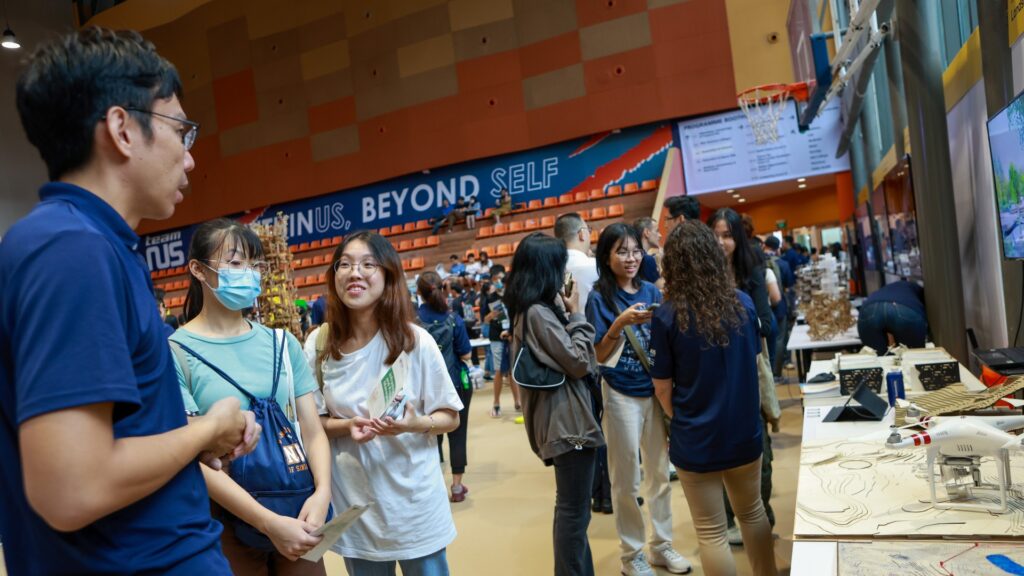
The talk on Architecture, Industrial Design and Landscape Architecture also saw a large turn-out. Discussing the breadth and depth of CDE’s curriculum, it touched on how students will be equipped to face the 21st-century challenges through their education in CDE.
Kaisyn, who is graduating from Nanyang Polytechnic this year, said, “I appreciated that they covered the basic skills and activities done throughout the curriculum. It allowed me to confirm that the Industrial Design course is relevant to my study and career plan.”
The in-person Ask-Me-Anything sessions with student panels also allowed participants to get their burning questions answered.
Tee Jia Hong, a graduate of Anglo-Chinese Junior College who intends to apply to Industrial and Systems Engineering (ISE) and attended the student sharing, said, “By listening to the experience from the ISE senior, I am able to get the hang of the academic and co-curricular prospect of being an ISE student.”
Over at CDE’s Rise of the Robots campus tour, participants were given a look at the Advanced Robotics Centre, which displayed projects such as an autonomous wheelchair, an artificial robotic arm, and a haptic feedback machine.
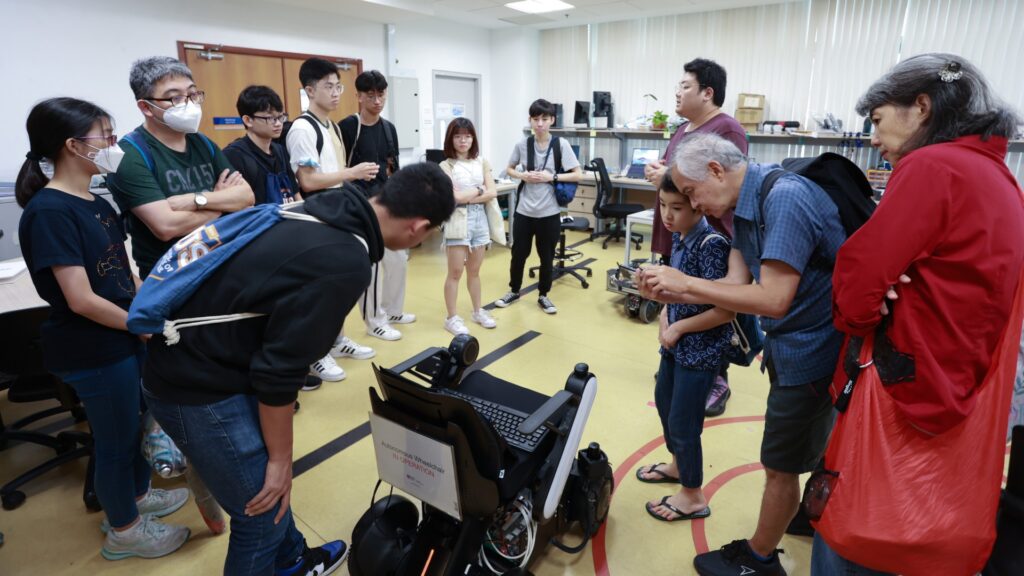
Robert Lim from Singapore Polytechnic, who attended the tour, said, “It was a memorable experience . . . I was able to learn more about what the courses have to offer and what undergrad students have accomplished in NUS.”
Exploring experiential learning
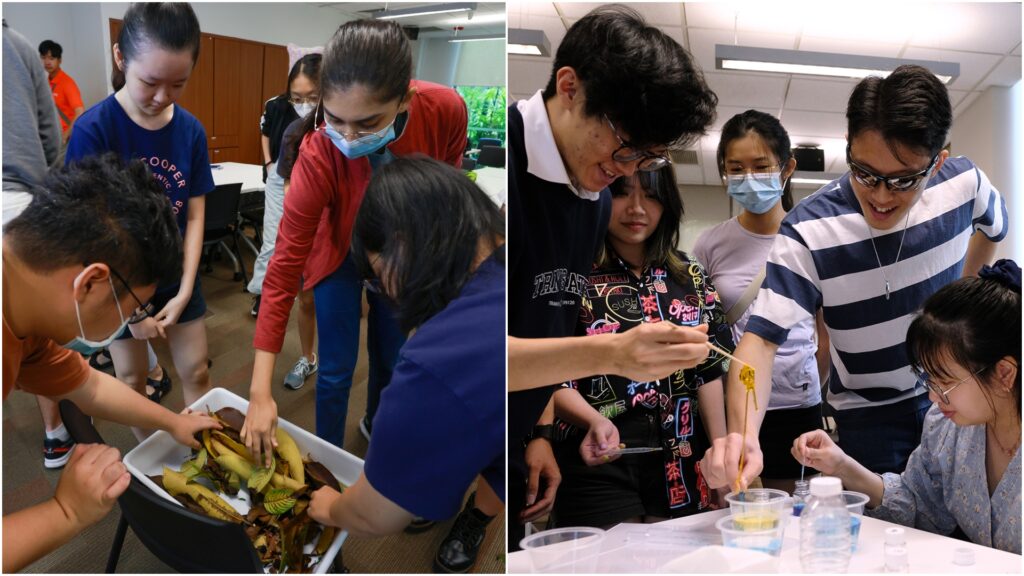
NUS College, Singapore’s first honours college, offered a glimpse of its flagship experiential learning programmes during its online and physical showcase. Faculty members highlighted the Impact Experience programme, where students develop solutions to real-world issues with community partners, and the Global Experience programme, which immerses them in global cities for specially curated courses and field visits based on specific themes.
The college, which is accepting its second intake, also held special classes for prospective students to get a feel of its small-group seminar-style lessons. Dr Ang Yuchen’s special class introduced his field course Biodiversity and Natural History in Singapore, which combines scientific concepts with the visual and language arts and environmental philosophy.
“I found the sample lessons useful in helping me not just get a sense of how lessons are conducted over at NUS College, but also how my potential Profs are like as teachers and facilitators,” said Eugene Teo, an alumnus of Raffles Institution, explaining that small, collaborative discussions was better suited to his learning style. Attending the Open House “also gave me a better understanding of the people I will be interacting with and the environment in which I would be studying in upon entering university life”, he added.
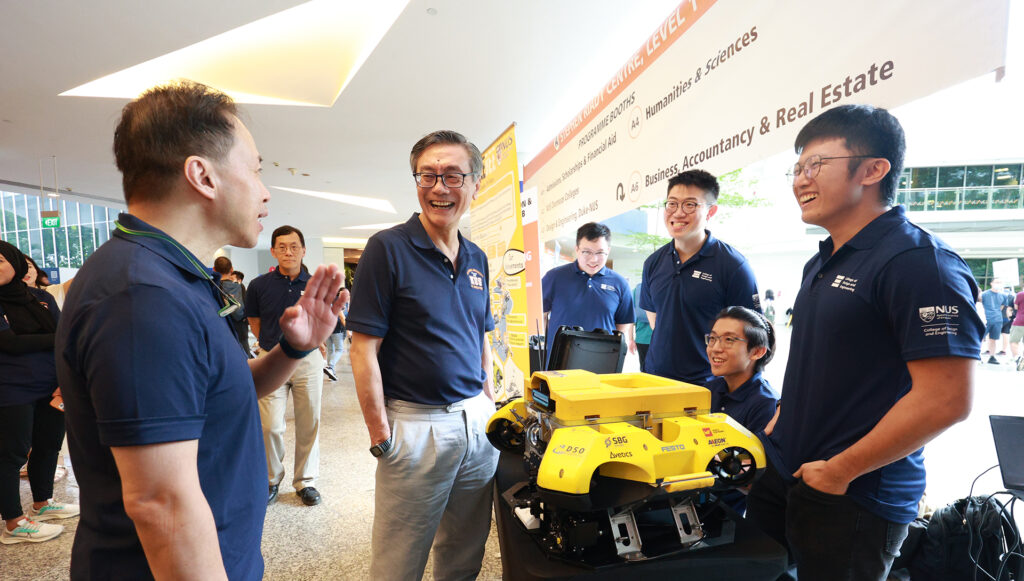
Interactivity was a prominent feature of the Open House. NUS Nursing offered visitors a chance to try basic wound treatment and resuscitation, while NUS Law held moot demonstrations at its Bukit Timah Campus.
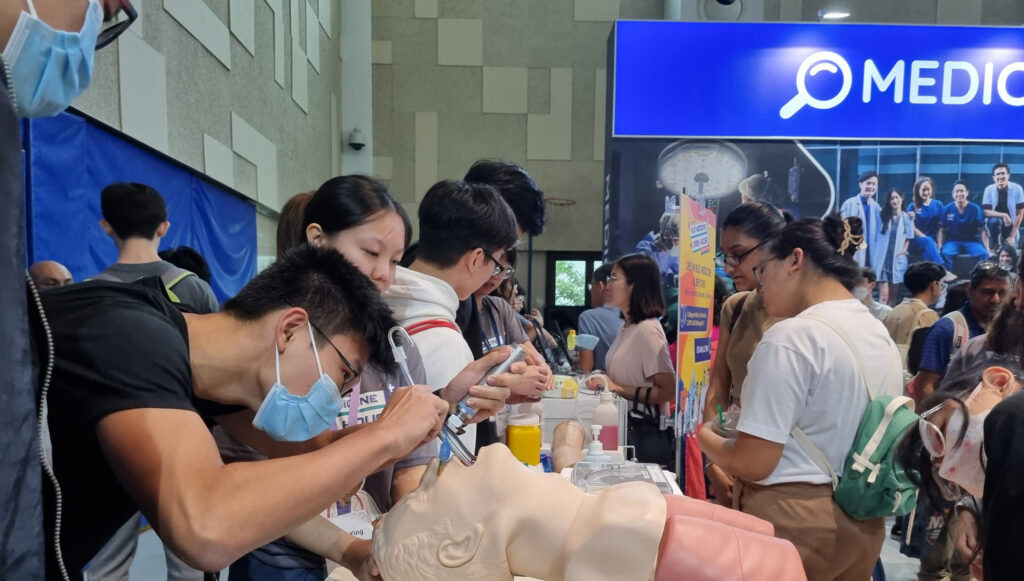 |
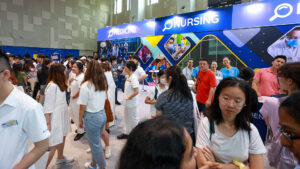 |
Aqirah Bte Azam, who will be graduating from Temasek Polytechnic in May, had the chance to see the Nursing students in action and attended a talk by its alumni. “Hearing their experiences in NUS and their careers have given me the courage to pursue my aspirations in nursing”, she said.
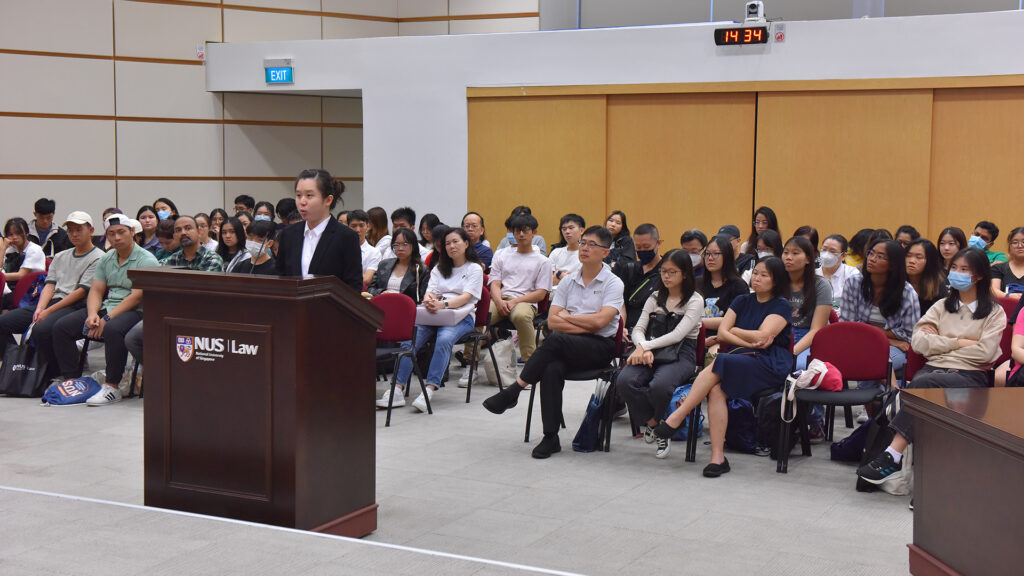
Smorgasbord of Student Life
Visitors also got a taste of the vibrant NUS student life on display. Student clubs and societies, as well as the Hall and Residential College (RC) interest groups, put their best foot forward at the Student Village.

Visitors were wowed by the striking moves of NUS Wushu, the energetic cheerleading displays of King Edward VII Hall’s KE Titans, and the snazzy K-pop dance moves of the Korean Cultural Interest Group. They were also treated to renditions of catchy tunes from Mandopop group NUS CAC Voices, acapella group NUS Resonance, Raffles Hall rock and jazz band RHockerfellas, and many more.
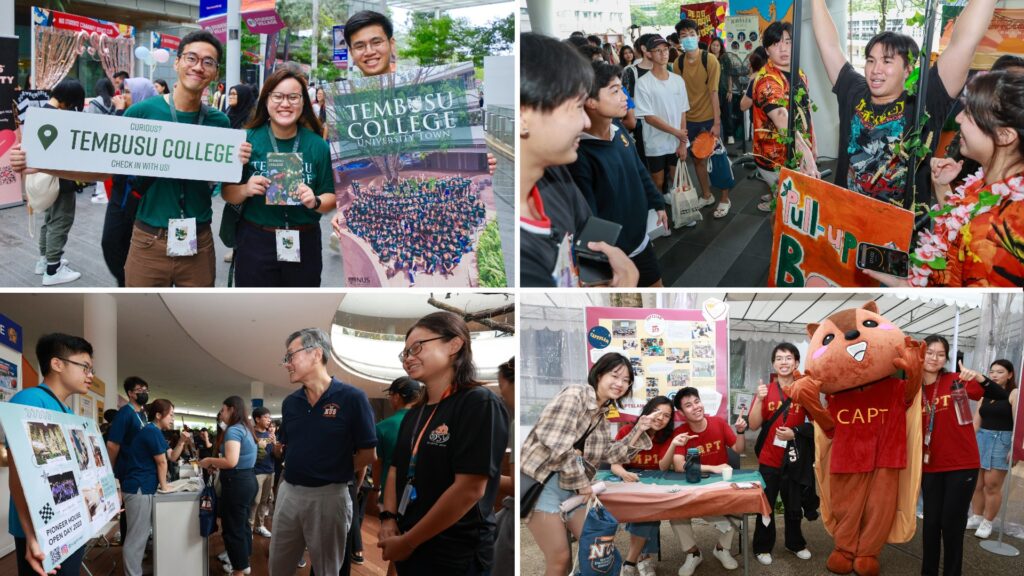
Representatives from the RCs, halls, and houses were present to offer prospective students the inside scoop on the on-campus experience. Complemented by A-Day-in-the-Life videos and 360° virtual tours, the booths, talks, and Ask-Me-Anything panels by student leaders gave participants a sense of the residential options at their fingertips.
“The House Life talk was the most enjoyable and informative event to me since the masters and students really explained to me what living in houses was like, while keeping us engaged through jokes and videos,” said Jia Hong.
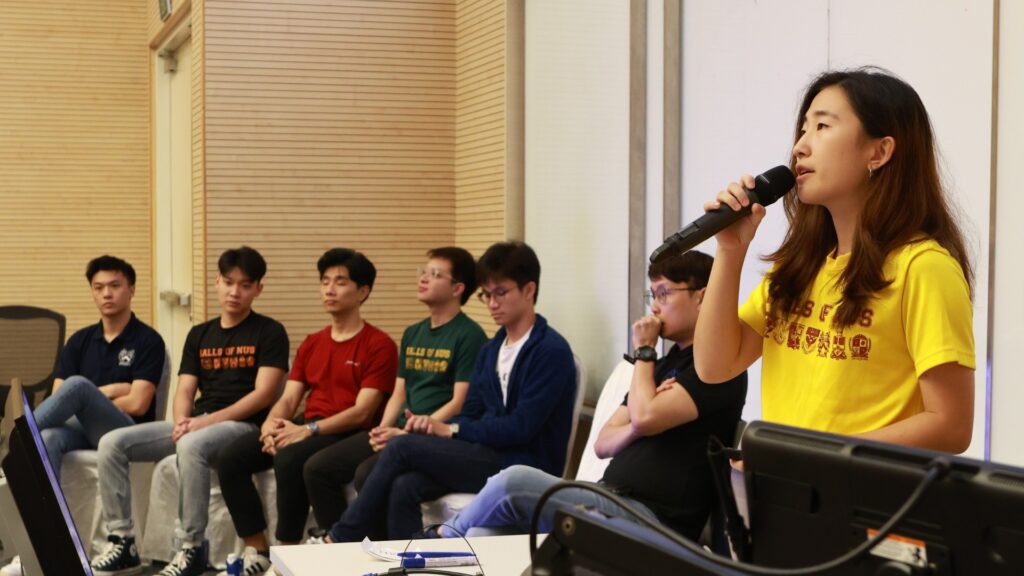
Charlotte Toh from Singapore Polytechnic, said the Halls talk helped her better understand the hall culture and admission criteria.
Guided in-person tours of the various halls and residences, such as King Edward VII Hall, Tembusu College, Ridge View Residential College, and Residential College 4, opened a window to the close-knit community of residential life.
Samuel Liu, who graduated from National Junior College, said, “The well-guided tours and booths set up for each RC that I visited gave me a good indication of which RC would be most suitable for my character and goals.”
This story first appeared on NUSnews on 9 March 2023.
FASS Inspiring Mentor 2022 Award Winners Announced

The NUS Faculty of Arts and Social Sciences is proud to announce the winners of the 2022 FASS Inspiring Mentor Awards.
Congratulations to:
- Assoc Prof Melvin Yap Ju-Min, Associate Professor, Department of Psychology
- Assoc Prof Robin Loon Seong Yun, Associate Professor, Department of English Language and Literature
- Dr Amazaki Osamu, Senior Lecturer, Centre for Language Studies
- Dr Natalie Pang Lee San, Senior Lecturer, Department of Communications and New Media
- Dr Kamalini Ramdas, Senior Lecturer, Department of Geography
The NUS Career Compass 2023
IN BRIEF | 5 min read
- Find out how the University has developed and broadened our curriculum to better prepare our graduates for the swiftly evolving workplace, and how interdisciplinary learning can help students solve complex issues in our society.

In collaboration with CNA938
How does NUS cultivate highly sought-after talents in the workforce of the future?
Find out how the University has developed and broadened our curriculum to better prepare our graduates for the swiftly evolving workplace, and how interdisciplinary learning can help students solve complex issues in our society.
This story first appeared on NUSnews on 23 February 2023.
CHS at NUS Open House 2023: Download the FASS Essentials on 27 February 2023
IN BRIEF | 10 min read
- On 27 February, get the full download on the essentials of academic programmes, student life, career preparation, overseas opportunities and financial aid at CHS via Zoom in the ‘virtual’ edition of CHS@NUS Open House 2023.
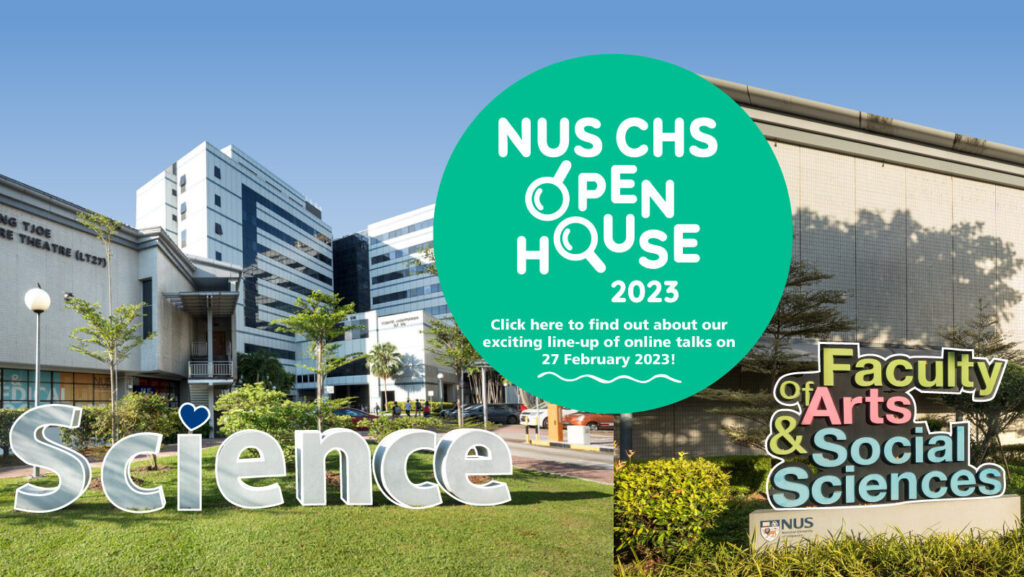
If you have not already marked your calendars for two dates with the NUS College of Humanities (CHS) during NUS Open House 2023, do it now!
On 27 February, get the full download on the essentials of academic programmes, student life, career preparation, overseas opportunities and financial aid at CHS via Zoom in the ‘virtual’ edition of CHS@NUS Open House 2023. Go to https://bit.ly/CHSatNUSOH2023-Virtual for the full 27 February programme.
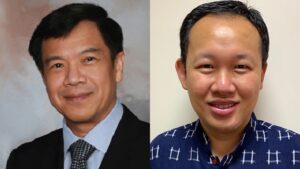
Then prepare to come on-campus on 4 March to engage with our award-winning faculty members, advisors and students to experience interdisciplinary education and explore your future vocation. Go to https://bit.ly/CHSatNUSOH2023-OnCampus for the full 4 March programme.
To help you plan your way through the lineup of FASS-specific talks and activities, read on for some of our highlights on 27 February 2023 that ought not to be missed.
Academics at the Forefront
The online edition of CHS@NUS Open House is meant to provide you with as comprehensive a briefing of what CHS, and its component Faculties of Arts and Social Sciences, and Science, have to offer students.
Academics is at the forefront and the day starts with a session devoted to the CHS Core Curriculum (9:00 – 11:00 am), a specially curated interdisciplinary programme that provides unprecedented freedom to choose the pursuit of breadth and depth across a broad spectrum of disciplines. This session will be led by Professor Sow Chorng Haur, Vice Dean (Outreach & Admissions), NUS Faculty of Science (FoS), and Dr Noorman Abdullah, Assistant Dean (External Relations & Student Life), FASS.
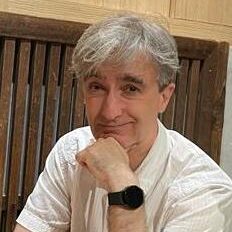
Associate Professor Luke O'Sullivan
The CHS Cross-Disciplinary Programmes
Three one-hour talks devoted to introducing Cross-Disciplinary Programmes (XDPs) offered by CHS will be running concurrently from 11:00 am. One programme FASS offers that embodies the concept of interdisciplinarity is the Philosophy, Politics, and Economics XDP, and the session for that will be led by Associate Professor Luke O’Sullivan (NUS Political Science) in discussion with fellow PPE Joint Programme Committee member, Dr Joel Chow (NUS Philosophy).
"This session is an opportunity to ask questions about the PPE-XDP. Philosophy, Politics, and Economics is a classic combination of disciplines that was first taught in Oxford and has spread globally because of its proven effectiveness. It brings together the ability to think about ideas in abstract and analytical terms, explore their practical implications for society, and model their costs and benefits in quantitative terms,” says Assoc Prof O’Sullivan. “PPE students can expect to develop a unique knowledge base and set of skills that leaves them suited for a wide range of careers in today's complex and fast-changing world."
Attendees are required to come prepared, because in addition to providing an overview of the PPE-XDP, Assoc Prof O’Sullivan expects audience engagement. Join the PPE-XDP session on 27 February at 11:00 am here.
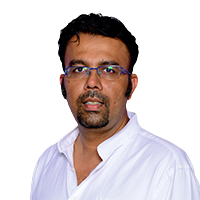
Associate Professor Rajesh Rai
Asian Studies @ CHS
NUS is recognised as a global centre of excellence in Asian Studies, where a multidisciplinary and comparative approach to the study of Asia and its regions is adopted. The session on programmes by the various Asian Studies departments at NUS (2:00 – 2:50 pm) will feature Associate Professor Rajesh Rai (NUS South Asian Studies), Dr Faizah Zakaria (NUS Malay Studies), Associate Professor Tham Shiao Wei (NUS Chinese Studies), Dr Clay Eaton (NUS Japanese Studies) and Dr Mohamed Effendy Abdul Hamid (NUS Southeast Asian Studies).
“You probably hear a lot about how Asia is the largest continent in the world, with the greatest diversity of cultures, philosophies, political thought and economic might, as well as scientific and technological advancement,” says Assoc Prof Rai, offering up a brief on the discussion he will be leading as moderator. “This session will take you through an interdisciplinary journey through history and current affairs to show you just how influential Asia has been a force for change, both positive and negative, on the world’s stage.”
Join this session by clicking here.
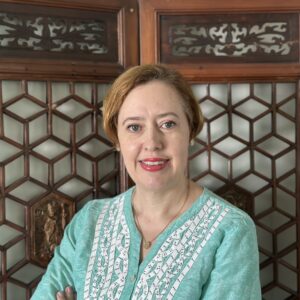
Humanities @ CHS
Learn more about the academic disciplines that focus on studying different aspects of the human condition from: Dr Donna Brunero (NUS History); Associate Professor John Whalen-Bridge, Associate Professor Graham Wolfe and Dr Leslie of NUS English, Linguistics and Theatre Studies; and Dr Zachary Barnett (NUS Philosophy).
“Do you: Ponder big questions regarding life, society, and culture? Wonder how language develops? Hold theatrical ambitions? Find yourself curious about connecting the past and present, the local and global?” session moderator Dr Brunero asks rhetorically. “If so, join us as we answer questions regarding our disciplines and share insights into how studying with us at NUS can broaden your horizons.”
To join Dr Brunero and her fellow speakers in this 3:00 - 3:50 pm session click here.
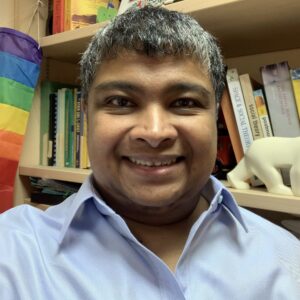
Social Sciences I: Same, Same but Different
This session features Dr Kamalini Ramdas (NUS Geography), Associate Professor Feng Qiushi (NUS Sociology and Anthropology), Dr Elaine Tan (NUS Political Science) and Dr Georgios Georgiou (NUS Economics), and will delve into their respective programmes as well as approaches toward forging a “collective identity”.
Session moderator Dr Kamalini explains. “This panel brings together social scientists from Economics, Geography, Political Science and Sociology to discuss what it takes to develop a collective identity as social scientists,” says Dr Kamalini, who will be working with her fellow speakers toward answering questions such as, “What are the benefits and challenges of a collective approach to learning and research? How might our students benefit from our commitment to engage?”
Click here to join the Social Sciences I (4:00 – 4:50 pm) session.
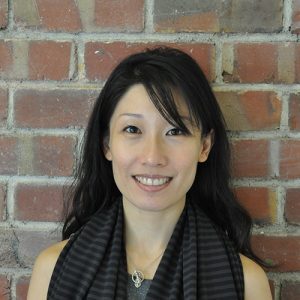
Social Sciences II: Understanding Social Complexity
Dr Adelyn Lim (NUS Sociology and Anthropology), Associate Professor Irene Ng (NUS Social Work), Dr Nina Powell (NUS Psychology) and Dr Alex Mitchell (NUS Communications and New Media) will be introducing the disciplines offered by their respective Departments, and show how they can each be applied to enable a deeper understanding of our world.
“The world we live in today can feel exciting but also downright contradictory. Global friendships are in many ways easier to make than in the past, yet we see terrorism, violent crime, wars, and enduring social inequality,” says session moderator Dr Lim, who will be discussing in detail with her fellow speakers complex issues thrown up by questions such as, “How did this world come about? Where are we heading in the future?”
To join the Social Sciences II (5:00 – 5:50 pm) session, click here.
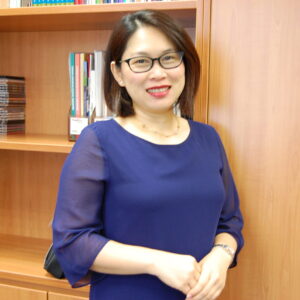
Ms Sasiwimol Klayklueng
Foreign Language Studies: Passport to the World
Meet leading Language instructors Ms Sasiwimol Klayklueng (Thai), Dr Sandhya Singh (Hindi and Tamil), Ms Indianti Tjan (Indonesian), Ms Rungnapa Kitiarsa (Thai) and Ms Sophie Undorf Bouvier (French), who will elaborate on the Minor in Language Studies and Proficiency Certificates conferred by the NUS Centre for Language Studies, which are very much sought after by students looking to enhance their career prospects.
The Half-life of Knowledge
IN BRIEF | 10 min read
- There is now an indisputable requisite to equip graduates with interdisciplinary knowledge and skillsets. We need both the agile lenses of interdisciplinarity as well as the deep-cutting laser of deep domain expertise. The former trains us to aim and focus the laser, while the latter allows us to cut to the heart of a problem.

| By Professor Tan Eng Chye |
“Teach a person to fish, and you may feed them for three-and-a-half years” may sound less inspiring than “Teach a person to fish, and you feed them for a lifetime”, but the former more accurately reflects the current realities of tertiary education.
Breaking news travels at warp speed, accelerated by social media and instant messaging. In a matter of minutes, news can reach the four corners of the world. Such interconnectedness highlights the leaps made in information technology over the years while underscoring a persistent and inexorable phenomenon – the reduction of the half-life of knowledge.
The half-life of knowledge, coined by Fritz Machlup in 1962, refers to the amount of time elapsed before half of the knowledge in a particular field is superseded or becomes obsolete. Given the speed with which knowledge develops and is shared, it is perhaps not surprising that this value is ever decreasing in many fields.
This phenomenon raises fundamental questions about our university degree programmes. How should a fresh graduate, filled with aspirations to change the world, deal with the harsh reality that a significant portion of their undergraduate training may be rendered irrelevant by the simple passage of time?
Distilling a degree programme is one possible, albeit drastic approach. We can consider equipping students only with evergreen core domain concepts. This training should take less time than our current degree programmes. As and when students require specific new knowledge, or need to upgrade existing knowledge, they can take short courses to bridge knowledge gaps and meet their professional needs. This type of “just in time” learning, also known as micro-credentialing, helps to circumvent the shortened half-life by injecting cutting-edge knowledge at just the right time.
Another less disruptive approach is revitalisation. We can maintain the current degree programme structure, but provide avenues for graduates to return to university in the future. Such short stints of study can follow existing models for bite-sized, self-contained courses, or semester-long study periods undertaken with the support of employers.
One certainty is that university study will cease to be just one stage of life. Instead, “university studies” will become the de facto way of studying, with a person continually refreshing and renewing their knowledge in tandem with or in anticipation of developments in industry, society and the world.
In anticipation of this, we created the NUS Lifelong Learners Programme (or NUS L3), which promises a 20-year period of student enrolment, from the point of undergraduate or postgraduate admission. In other words, a graduate of NUS can choose to come back to campus to take courses for at least 20 years from the day of matriculation.
Interdisciplinarity
Beyond the way knowledge is acquired, we are also grappling with working in an increasingly VUCA (volatile, uncertain, complex, and ambiguous) world. In such a context, can we continue to hold a siloed view of domain disciplines? In training law students, for example, we would be remiss not to show them basic programming, which can allow them to create customised commands to quickly and easily trawl through databases, with millions of legal records, to identify precedents.
Deep domain expertise is like a laser – a focused beam of knowledge that can cut through dense problems. However, real-world issues are increasingly multifaceted and ill-defined, often lacking a clear vulnerable spot at which a laser beam can be aimed.
As a mental experiment, consider the challenge of introducing autonomous electric vehicles to a city. This proposition involves urban design, city planning, the law, and engineering for accessibility. We can form a multidisciplinary team of experts, where each member is a domain expert, to tackle the issue. However, in all likelihood, we will encounter misalignment between domains, simply owing to differences in problem-solving methodology, thinking models or even nomenclature.
If we liken domain training to equipping students with specific lenses through which they can see and focus on information to solve a problem, then interdisciplinarity suggests that we should train students to operate across more than one domain. By educating them in core ideas from multiple domains and providing opportunities to apply their knowledge in authentic settings, students with interdisciplinary training can switch domain lenses as needed, solving problems using novel and unorthodox approaches that transcend domains.
To be clear, we are not advocating for dismantling deep domain training. Rather, we recognise that there is now an indisputable requisite to equip graduates with interdisciplinary knowledge and skillsets. We need both the agile lenses of interdisciplinarity as well as the deep-cutting laser of deep domain expertise. The former trains us to aim and focus the laser, while the latter allows us to cut to the heart of a problem.
NUS strongly believes in providing interdisciplinary pathways for our students. In 2020, we created the College of Humanities and Sciences (CHS) to provide an enhanced interdisciplinary undergraduate experience for students of the Faculty of Science and the Faculty of Arts and Social Sciences. CHS undergraduates can choose between deep domain training or the flexibility of interdisciplinary training of varying breadth and depth in modules offered by both faculties. Continuing our efforts to pave more interdisciplinary pathways for students, in 2021, we merged the School of Design and Environment and the Faculty of Engineering to form the College of Design and Engineering. More recently, NUS launched NUS College, Singapore’s first honours college offering pathways to more than 50 majors across a half dozen degree programmes. The aim of NUS College, as explained by its inaugural dean, Professor Simon Chesterman, “[is to offer] broad, interdisciplinary competencies that equip students for life, along with the opportunity to dive deep into areas in which you are passionate.”
To quote Charles Dickens, “It was the best of times, it was the worst of times, it was the age of wisdom, it was the age of foolishness.” Indeed, our experiences with the global pandemic and its effects on education over the past two years have given us the rare opportunity to engage in deep reflection and introspection. Witnessing the breakdown of resistance to adopting and adapting technology for teaching and learning during this time, we should be emboldened to re-examine and revolutionise some of our established, and perhaps outmoded, notions of how to offer higher education.
About the Author
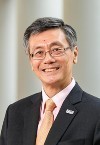 Professor Tan Eng Chye is President of the National University of Singapore. A passionate academic and educator, Prof Tan is a member of the World Economic Forum’s Global University Leaders’ Forum, as well as Singapore’s Future Economy Council, which is tasked with driving the growth and transformation of the country’s future economy.
Professor Tan Eng Chye is President of the National University of Singapore. A passionate academic and educator, Prof Tan is a member of the World Economic Forum’s Global University Leaders’ Forum, as well as Singapore’s Future Economy Council, which is tasked with driving the growth and transformation of the country’s future economy.
This article was first published in the Times Higher Education World University Rankings 2023 supplement and first appeared in NUSNews on 4 November 2022.
Call for Nominations | FASS Inspiring Mentor Award 2022
IN BRIEF | 3 min read
- We invite NUS FASS members of staff to nominate the colleagues who have served as their truly inspiring mentors - who have gone beyond the call of duty to positively impact their work and life - for FIMA 2022 honours.
Click through image below (or just write to fassmentoraward@nus.edu.sg) to file your nomination.
Closer Neighbours are Better than Distant Relatives
IN BRIEF | 10 min read
- Associate Professor Thang Leng Leng from NUS Japanese Studies shares how her experience and that of her friends', having lived in Japan and Singapore, has led her to appreciate the value of having a good neighbourhood.
Click through image below to read this piece.
This article first appeared in Lianhe Zaobao and NUSNews on 25 September 2022.
Commencement 2022: Kickstarting a Season of Celebration and Achievement
IN BRIEF | 10 min read
- NUS celebrates the milestone accomplishments of 13,975 graduates through 28 in-person ceremonies.
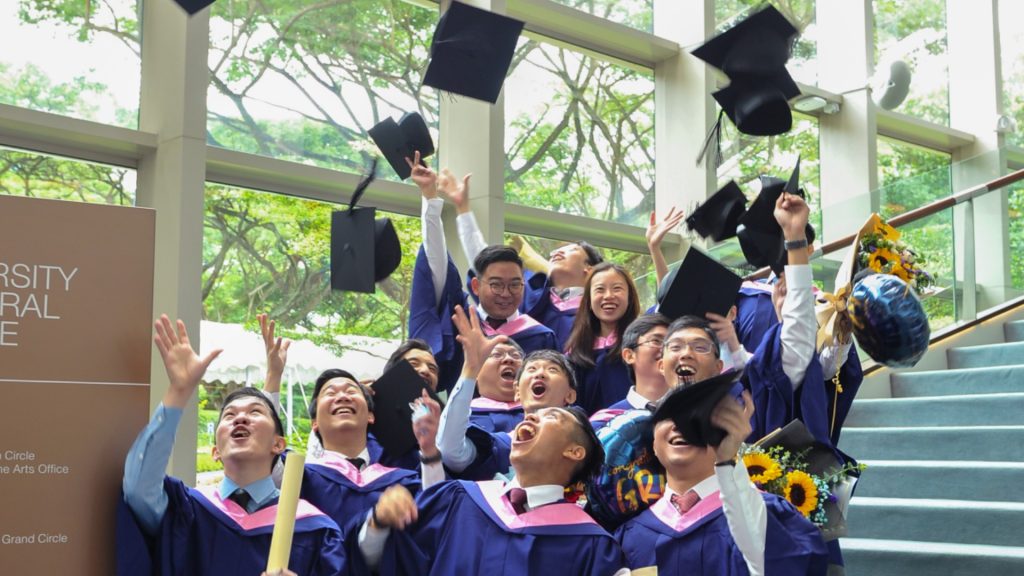
A long-awaited season of celebration is officially under way, with the inaugural ceremony of Commencement 2022 marking the milestone achievements of some 200 Faculty of Arts and Social Sciences (FASS) graduates, and seeing the conferment of two Honorary Graduates, Professor Tommy Koh and Professor Wang Gungwu.
Taking place at the University Cultural Centre, the ceremony kicked off bright and early on 6 July to an effervescent buzz of anticipation from the graduates and their loved ones, inaugurating a total of 28 in-person ceremonies to be held over the following 10 days.
In keeping with the Commencement traditions and the proud ceremonial heritage of NUS, the ceremony showcased the pageantry of the Ceremonial Procession, the fanfare, and playing of the National Anthem, all culminating in the highlight of the ceremony-the presentation of graduates. Graduates from the Class of 2022 celebrated their achievements amid the applause of family and friends, a momentous apogee of their time in NUS.
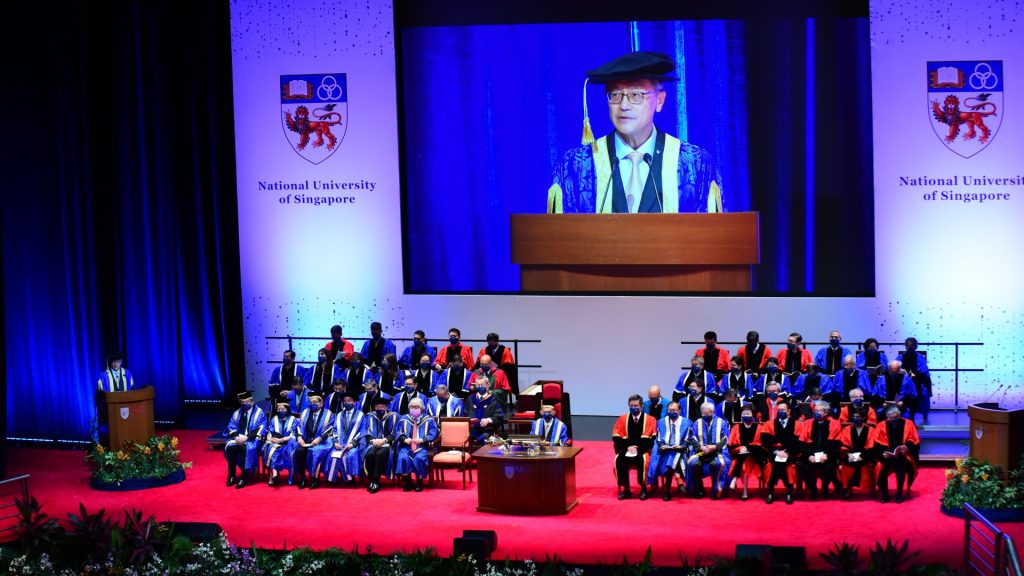
Speaking at the ceremony, NUS President Professor Tan Eng Chye reflected on the qualities needed for graduates to thrive in today's dynamic environment: an attitude of resilience and adaptability to overcome challenges, and a willingness and boldness to view problems as opportunities, exercise creativity, and apply their skills and knowledge to create solutions.
"For the Class of 2022, you are crossing the threshold into a wider world of dynamic change and great possibilities, but also of discomforting uncertainty," he said.
"But I am fully confident that the NUS graduates of today share the same ethos of excellence and service to community of generations past. In time to come, you will undoubtedly make your own unique contributions, and become the vanguard in elevating our collective prosperity and well-being."
Contributions to Law, Nature and Culture: Prof Tommy KohTwo illustrious NUS alumni were also honoured as Honorary Graduates for the Class of 2022-lawyer and diplomat Professor Tommy Koh, and historian Professor Wang Gungwu.
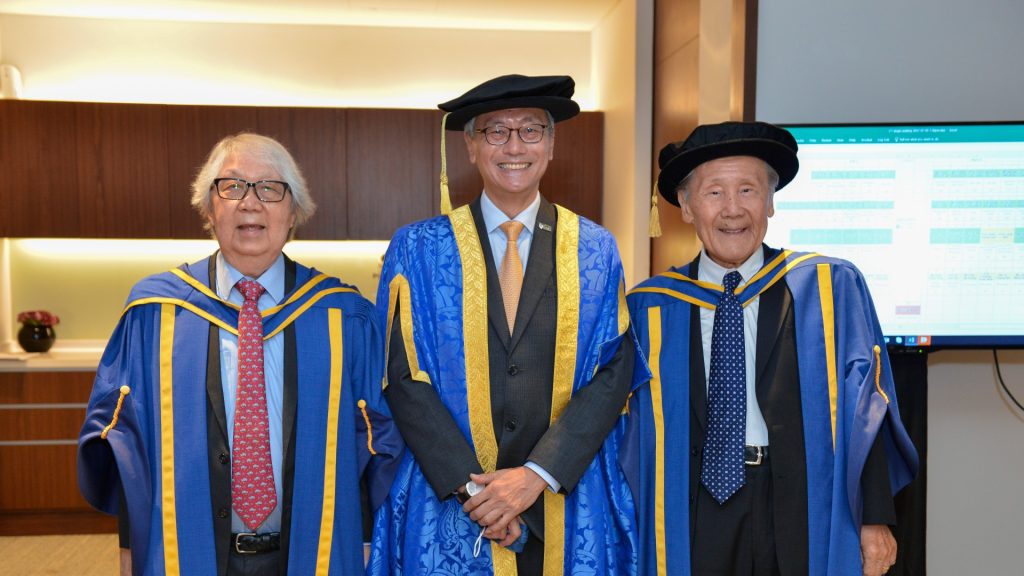
In recognition of his dedication as a practitioner-scholar and decades of service to the University, Singapore, and the world, Prof Koh, who wears many hats including Ambassador-at-Large at Singapore's Ministry of Foreign Affairs, Special Advisor of the Institute of Policy Studies, and founding Rector of NUS' Tembusu College, was conferred the Honorary Degree of Doctor of Laws.
Highlighting three areas on which he has focused his energies - law, nature, and culture - Prof Koh said, "I chose to study law, not to enrich myself, but to pursue justice and to promote the rule of law."
He also spoke about his work concerning nature and the environment, including chairing the 1992 Earth Summit, being patron of the Nature Society, and helping NUS establish the Lee Kong Chian Natural History Museum as its founding Chairman. "My vision is to live in harmony with nature. My agenda is to promote sustainability in all our endeavours," he added. "I am [also] glad that I have been able to play a very small role in transforming Singapore, from a cultural desert to a cultural oasis."
Delivering the citation for Prof Koh's conferment, Professor Simon Chesterman, Vice-Provost (Educational Innovation) and Dean of the NUS Faculty of Law and NUS College, referred to Prof Koh's "academic milestones [which] are but one strand of the rich tapestry of his professional life", as well as his leadership and guidance in education at NUS, and his eminent contributions to state and environmental diplomacy.
An Inspiring Story Worth Retelling: Prof Wang GungwuProf Wang, one of the world's foremost experts on the Chinese diaspora and Sino-Southeast Asian historical relations, was conferred the Honorary Degree of Doctor of Letters, the latest in a long list of accolades that includes the prestigious Tang Prize in Sinology, and the Distinguished Service Order of Singapore.
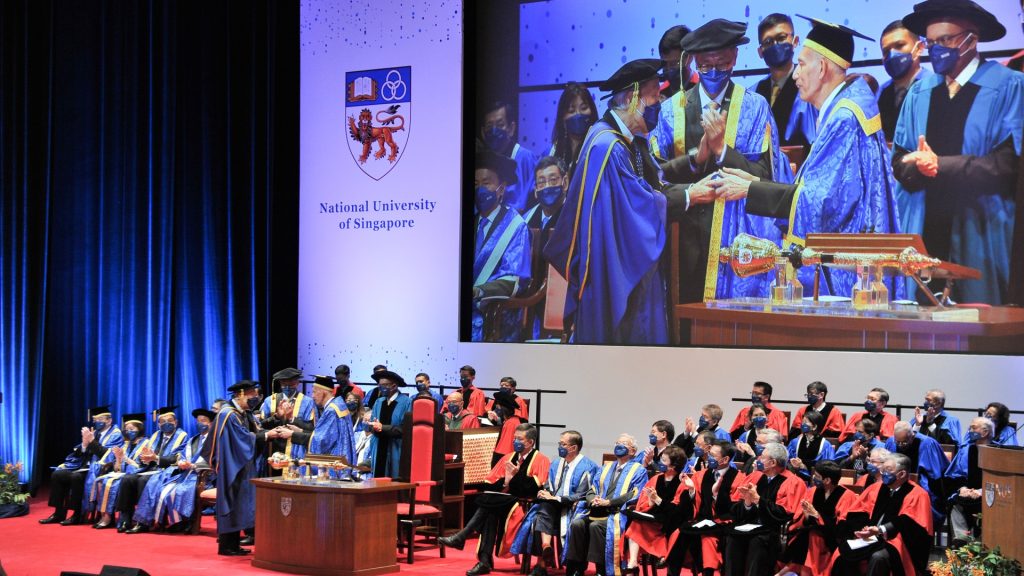
Reflecting on his time as a student of the University in colonial Malaya, Prof Wang said: "You can imagine how happy I am to be a graduand again with my alma mater. The university gave my generation a good start in life. It went on to adapt to the rapid changes of our time. In so doing, it has come out better and stronger."
He spoke about the "inspiring story worth retelling" of how the University had set out and followed its own aspirations, becoming a major centre of learning by being actively connected to the world, as well as regularly reinventing itself.
"The way our university strives to keep our humanity always in our sights is something to be very proud of. I hope that all of us graduating today, no matter where life leads us, will never hesitate to help our university to enhance this capacity to advance our human condition," Prof Wang stressed.
Prof Lionel Wee, Dean of FASS and co-Dean of the College of Humanities and Sciences, who delivered the citation on Prof Wang's conferment, lauded the latter as "an eminent figure and brilliant mind" who has made manifold contributions as a leading figure in Sinology, a renowned public intellectual, and a visionary leader and administrator at leading academic institutions around the world.
"This doctorate symbolises the meaningful connections between Professor Wang and the University, and it celebrates the long-standing contributions and value that Professor Wang's scholarly insights bring to Singapore, to Southeast Asia and, indeed, to the world," he said.
Parsing the Path ForwardInfusing the celebrations with a spirit of introspective gratitude, Valedictorian Mr Nickson Quak, who is graduating with a Bachelor of Arts with Honours (Highest Distinction) in Philosophy, Politics, and Economics said, "As varied as our journeys may have been, each and every one of us graduates here could have only made it thus far because of the unwavering support that our parents, our families, our loved ones, and our friends have so generously afforded us."
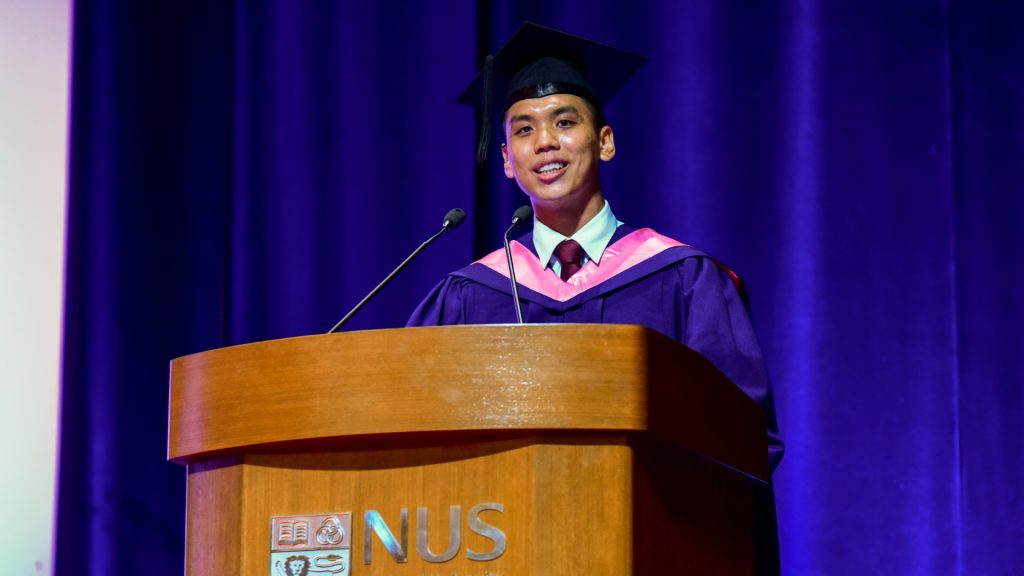
His words further summarised the spirit of determination and community that will carry graduates onwards in their lives: "If [the journey ahead] appears daunting to you, I say to you: fret not… because when you look to your left and your right, you see the resilient men and women who, forged by the challenges brought upon by the global pandemic, will always offer you a helping hand."
This story first appeared in NUSNews on 6 July 2022 as part of NUS News' coverage of Commencement 2022, which celebrates the achievements of our 13,975 graduates through 28 in-person ceremonies. For more on Commencement, look out for our upcoming graduate profiles, check out the official Commencement website, or look up (and tag) #NUS2022 and #NUSFASS on NUS' and FASS' social media channels!
NUS CHS Open House 2022: Discover #Interdisciplinary Education!
IN BRIEF | 5 min read
- The NUS College of Humanities and Sciences is hosting its Open House 2022 next week and all prospective students who have received offers are invited!
- A two-day hybrid programme – 11 May on Zoom (and viewable on CHS’ Facebook page) and 14 May on several locations across the NUS Kent Ridge campus, specifically the areas around the Faculty of Arts and Social Science (FASS), and the Faculty of Science (FoS) – CHS Open House 2022 aims to address all concerns a prospective undergraduate may have before committing to academic at the University and College.
- Highlights include opportunities to engage, discuss and explore academic pursuits, career development and student life at the College with key faculty and administrative staff and leadership — live and in person.
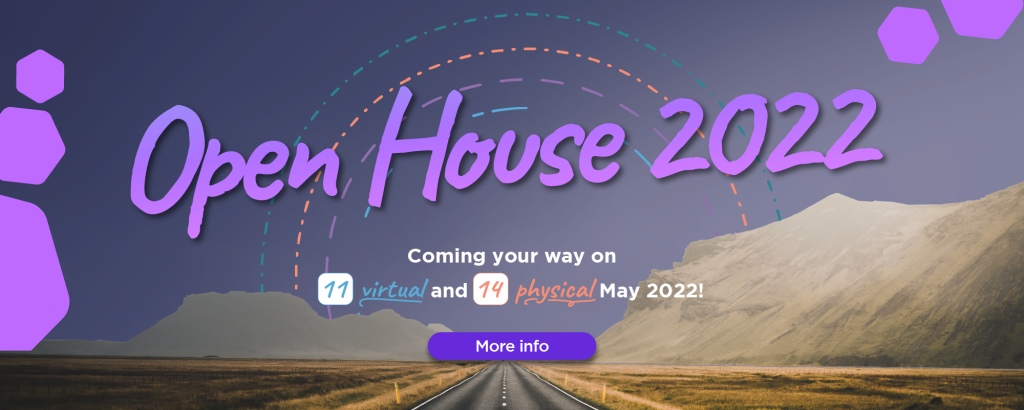
The NUS College of Humanities and Sciences is hosting its Open House 2022 next week and all prospective students who have received their offers are invited. As the deadline for them to accept their offers is looming, CHS has put together a programme aimed at answering all the questions they may have and clarifying all their concerns as much as possible.
Marking a cautiously calibrated return of the University to the normalcy of hosting large on-site events, this year’s CHS Open House is a two-day hybrid programme: 11 May on Zoom (and viewable on CHS’ Facebook page) and 14 May on several locations across the NUS Kent Ridge campus, specifically the areas around the Faculty of Arts and Social Science (FASS), and the Faculty of Science (FoS).*
11 May 2022 (Wednesday): The Essentials, OnlineThis a series of comprehensive information sessions (on Zoom and livestreamed on Facebook Live) covering everything new undergraduates need to know to get the most out of their education journey with CHS, including the:
- CHS Core Curriculum
- College’s three challenging but rewarding cross-disciplinary programmes
- Data Science and Economics (DSE-XDP)
- Environmental Studies (BES-XDP)
- Philosophy, Politics, and Economics (PPE-XDP)
- myriad Learning Pathways laid for you
- versatile career development programmes designed to prepare you for the future workplace
- CHS Student Experience—eye-opening and busy, yet energising and enriching
Speakers and panelists include CHS Co-Deans, Vice-Deans, key faculty staff members, career preparation and student services leader.
For more information and links to the 11 May sessions, click here.
14 May 2022 (Saturday): Get Personal, On CampusThe College is calling for prospective students to come on site, visit where they could well be spending their undergraduate years very soon, and speak to their future instructors and potential mentors. The full-day programme – running in key FASS and FoS locations across the NUS campus – offers:
- entry to witness and even participate in talks/lectures and panel discussions presented and hosted by award-winning instructors on a variety of academic subjects, interdisciplinary topics and specialised research areas
- face-to-face engagement with faculty, admin and student representatives from ALL Departments and student organisations under CHS, and opportunities to explore academic, financial aid and student activity options with the people in the know
- consultation with the career development teams of CHS
- guided Walking Tours across the facilities of FoS and FASS
For more information on the activities planned for 14 May, click here.
Discover Your #Interdisciplinary Future @ CHSThis Open House is the last chance for prospective students to learn more about the complete #interdisciplinary educational experience that they can expect at CHS. One that opens up a world of possibilities and equips them with skills and knowledge across the humanities, social sciences, physical sciences and applied sciences. One that inspires, cultivates and prepares them to work across diverse industries and sectors, with multidisciplinary teams, to solve some of the most complex wicked problems facing the world today — from social inequality to food shortage, unsustainable development and global warming. And one that grooms them to be the leaders of public institutions and private enterprise tomorrow.
* Campus shuttle bus services will be made available on 14 May to all visitors for easier movement across campus, which extends to Kent Ridge MRT.
FASS Alumni Honoured for Sterling Contributions to Nation and Society
IN BRIEF | 5 min read
- The NUS Faculty of Arts and Social Sciences (FASS) honoured five eminent alumni on 29 April 2022, presenting each with a FASS Distinguished Arts and Social Sciences Alumni Award 2021.
- The outstanding alumni were:
- Mr Peter Tan (Japanese Studies, ’92), Singapore’s Ambassador to Japan
- Mrs Josephine Teo (Economics, ’91), Minister for Communications and Information and Second Minister for Home Affairs
- Mr Haresh Sharma (English Language and English Literature, ‘90), Resident Playwright of The Necessary Stage
- Ms Denise Phua (English Language and Political Science, ‘83), Mayor of Central Singapore District
- Mr Low Thia Khiang (Chinese Studies, ‘81), former Secretary-General of the Workers’ Party
It was all smiles as five eminent alumni from the NUS Faculty of Arts and Social Sciences (FASS) took to the stage on 29 April to receive the FASS Distinguished Arts and Social Sciences Alumni Award 2021.
The outstanding alumni who took home the honours were:
- Mr Peter Tan (Japanese Studies, ’92), Singapore’s Ambassador to Japan
- Mrs Josephine Teo (Economics, ’91), Minister for Communications and Information and Second Minister for Home Affairs
- Mr Haresh Sharma (English Language and English Literature, ‘90), Resident Playwright of The Necessary Stage
- Ms Denise Phua (English Language and Political Science, ‘83), Mayor of Central Singapore District
- Mr Low Thia Khiang (Chinese Studies, ‘81), former Secretary-General of the Workers’ Party
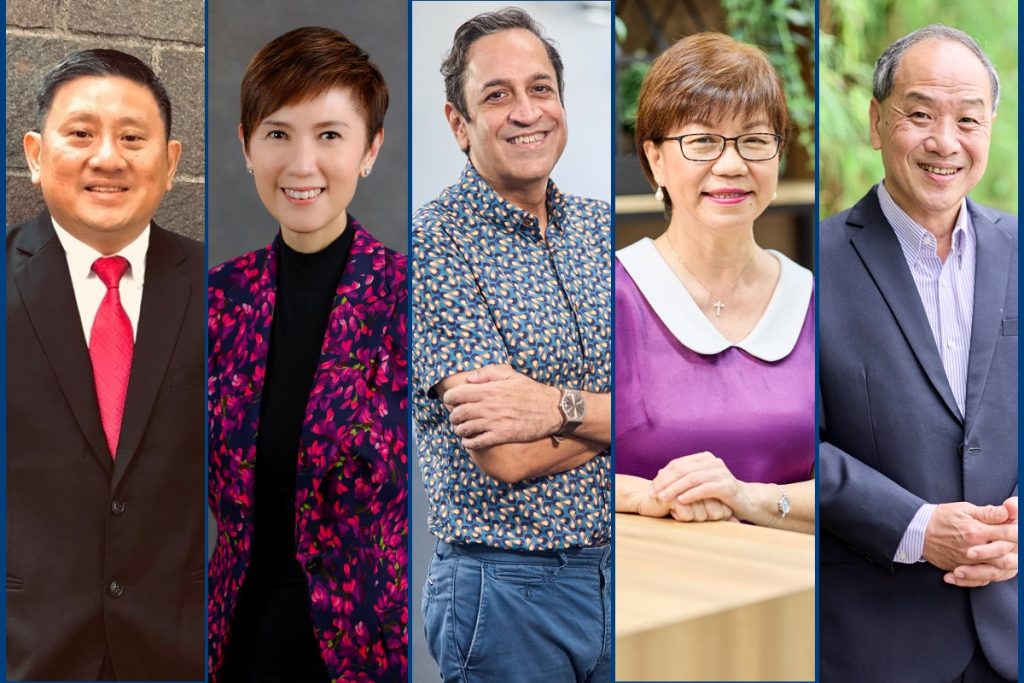
The 2021 awards ceremony had been postponed to this year due to the COVID-19 pandemic.
“These five individuals have contributed to Singapore in distinctive ways, and their passion, perseverance and pursuit of excellence serve as an inspiration to current and future generations of FASS students,” said NUS President Professor Tan Eng Chye.
“NUS is proud to have them as our alumni, and I hope they will continue to maintain close ties with their alma mater and with FASS. There is much we can do together, to nurture and inspire the next generation of Singaporeans to realise their potential.”
Echoing similar sentiments was FASS Dean Professor Lionel Wee who added that the five epitomise the spirit of service to the community. They play pivotal roles in Singapore and globally, through the arts, shaping of policies, diplomatic relations and community engagement.
The Honourees and their Contributions to Nation and SocietyMr Peter Tan has over three decades of foreign service experience under his belt. He has served with distinction in various capacities on issues related to areas including Southeast Asia, Northeast Asia, Europe and the United Nations since joining the Ministry of Foreign Affairs in 1992. He has vast diplomatic experience with regard to Japan, having previously served in the Singapore Embassy in Tokyo as First Secretary, as Counsellor, as well as Acting Minister-Counsellor and Deputy Chief of Mission. Mr Tan was awarded the Public Administration Medal (Silver) in 2008 for his contributions.
Playing a critical role in policymaking is Mrs Josephine Teo who is Singapore’s Minister for Communications and Information, Second Minister for Home Affairs, and Minister-in-charge of Smart Nation and Cybersecurity. She is also a member of the National Jobs Council and the Future Economy Council. Mrs Teo was the Minister for Manpower from May 2018 till May 2021, and previously served in the Prime Minister’s Office and other heavyweight ministries like Finance, Transport and Foreign Affairs. She has been a member of Parliament (MP) since 2006.
A critically-acclaimed playwright known for his socially-conscious plays, Mr Haresh Sharma began writing plays during his undergraduate days. As Resident Playwright of homegrown theatre The Necessary Stage, he has written more than 120 plays which have been staged in over 20 cities. His play on mental illness, Off Centre, was the first Singapore play selected by the Ministry of Education as a Literature text for the GCE N- and O-Levels. A 2015 Cultural Medallion recipient, Mr Sharma was also the first non-American to be awarded the prestigious Goldberg Master Playwright by New York University's Tisch School of the Arts in 2011.
Ms Denise Phua gave up a successful corporate career in 2005 to become a full-time special needs volunteer before joining politics in 2006. An MP for Jalan Besar Group Representation Constituency (GRC), she is best known for her advocacy for those at risk of being left behind in Singapore. She is one of the key architects behind three 5-year Enabling Masterplans for the Disabled in the country, and she is the President of Autism Resource Centre (Singapore) and Chairman of Autism Association Singapore – both being established autism charities. She supervises the Pathlight School – Singapore’s first autism special school which she co-founded – and helped start The Purple Parade, an annual parade to support inclusion.
Making his mark in politics is former politician Mr Low Thia Khiang who served as Secretary-General of the Workers’ Party between 2001 and 2018. He was one of two opposition MPs between 2001 and 2011 and was the de facto opposition leader between 2006 and 2018. Following the 2011 General Election, Mr Low became one of five elected opposition MPs of Aljunied GRC – and went on to represent the Bedok Reservoir–Punggol division between 2011 and 2020. Mr Low stepped down as the MP for Aljunied GRC prior to the 2020 General Election, making him Singapore's longest serving opposition MP with 29 years in service.
The Journey with FASS and BeyondDinner guests were treated to videos of the awardees who shared about their FASS experience – how it has shaped their lives and careers thereafter – as well as their career milestones.
Both Mr Sharma and Mr Tan shared fond memories of spending time in the libraries and reading rooms, as well as the invaluable friendships that blossomed beyond the classrooms in FASS. For Mr Sharma, NUS played a pivotal role in his theatre journey. He explained, “There was the huge support structure all around me, from the lunchtime performances where we could perform, to my lecturers and tutors, who when they found out that I was interested in Singapore theatre and literature, started encouraging me.”
Reminiscing on her university “days of freedom”, Ms Phua appreciated the considerable latitude afforded to her to select subjects that she loved and pick the lecturers she wanted to learn from. FASS, she shared, had helped hone her ability to think critically, developed her confidence to speak up, and made her realise the importance of finding solutions to problems to make a difference.
Established in 2015, the Awards recognise individuals for their distinguished scholarship and exemplary service to the Faculty, the University and Singapore. These outstanding recipients have made significant impact in various fields locally and internationally, which has contributed to the betterment and promotion of the arts and social sciences.
Click here for more info on this year’s award recipients.
This article first appeared in NUSNews on 29 April 2022.
#DiscoverFASS@CHS 2022 | Watch Masterclasses Here!

As part of the #DiscoverFASS@CHS campaign leading up to our Open House in May this year, we are holding Masterclasses presented by three of our award-winning Faculty members, and streaming them 'live' online here. Masterclasses by Award-Winning Faculty
Experience lessons led by our dynamic faculty members. See schedule below.
| 0930 - 1000 | Prof William Bain The Wisdom of Liars and the Ethics of War |
| 1030 - 1100 | Assoc Prof Deborah Shamoon Animé and the Japanese |
| 1130 - 1200 | Dr Maiya Murphy Theatre as Aesthetic Art and Social Tool |
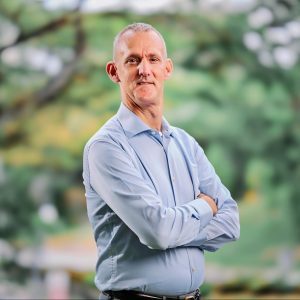
Prof William Bain, NUS Political Science
The Wisdom of Liars and the Ethics of War
War is widely thought to be estranged from moral judgement-the language of right and wrong. In time of war self-interest and necessity quickly overcome moderation and restraint; and the call of the nation-or some other community-justifies conduct that would be unacceptable in all other contexts. The strong do what they will and the weak suffer what they must. In this masterclass I will sketch out the conventional ethics of war in modern international relations. One might object that moral judgement is, in fact, a charade, a mask behind which hypocrisy lurks. I respond to this objection by arguing that liars and hypocrites provide the best evidence of authentic moral judgement in time of war.
William Bain is Professor of international relations in NUS Political Science. His research and teaching focuses on questions and theories of world order, international ethics, and religion and international relations. His most recent book, Political Theology of International Order, argues that dominant ways of imagining international order are properly understood as a worldly application of a theological pattern that originates in the Middle Ages.
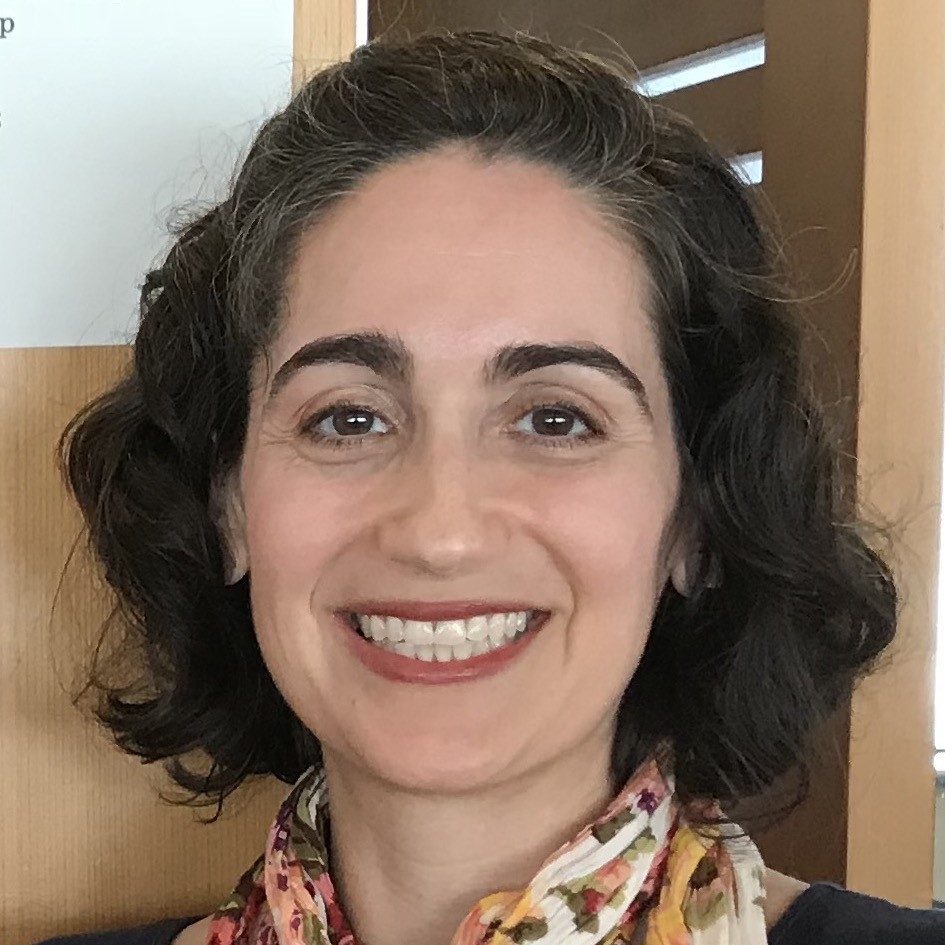
Assoc Prof Deborah Shamoon, NUS Japanese Studies
"I said Anime, but There's Hardly Been Any Movement!": Understanding Limited Animation
What is Japanese about anime? How do we discuss anime in an academic context? This lecture will give a brief introduction to the history of anime and explain the limited animation techniques that give anime its distinct look and feel. We will also discuss the way that form affects content, how cost-saving measures in animation gave rise to a national style, and why certain tropes get repeated in anime narratives. This lecture will change the way you look at anime, and introduce you to key concepts in anime studies, including superflat, database consumption, and the media mix.
Associate Professor Deborah Shamoon(NUS Japanese Studies), who is originally from the United States, received her PhD in Japanese Studies at the University of California, Berkeley, and taught at the University of Notre Dame before coming to NUS in 2012. Her areas of specialisation are cultural studies and gender studies. She has published books and essays on Japanese manga, anime, literature and film. She teaches modules on Japanese popular culture, art history, and literature. of international relations in NUS Political Science. His research and teaching focuses on questions and theories of world order, international ethics, and religion and international relations. His most recent book, Political Theology of International Order, argues that dominant ways of imagining international order are properly understood as a worldly application of a theological pattern that originates in the Middle Ages.
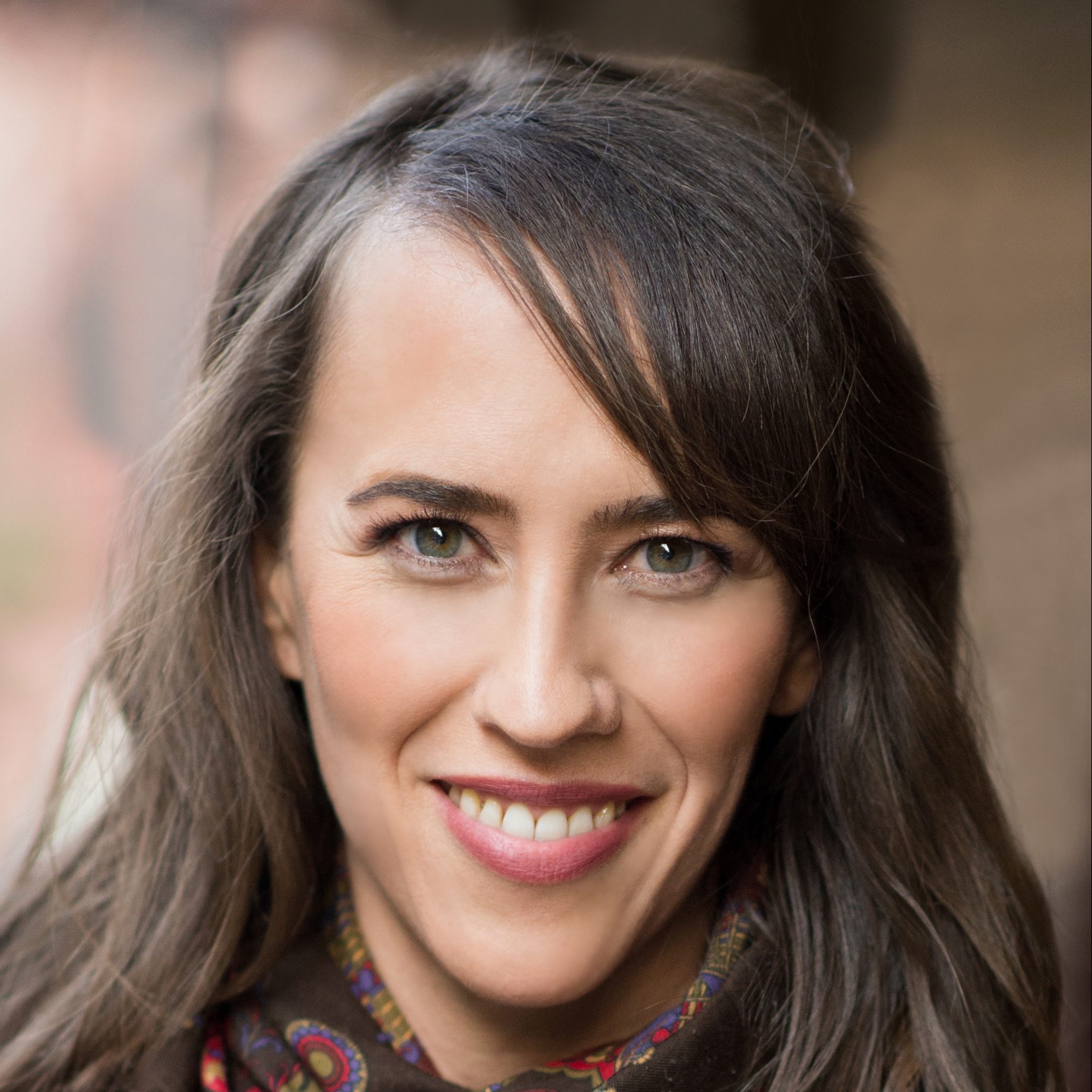
Dr Maiya Murphy, NUS English, Linguistics & Theatre Studies
Theatre and Performance on Stage and in the World
This class explores how performance can be understood as aesthetic art and social tool. By taking the concerns and approaches of the performing arts seriously, we will examine how theatre and performance can reflect human behaviour and shape social life. We will consider the diversity of performances across time and place, some unique skills and intelligences embedded in artistic technique, and recent exchanges between theatre and science. Through drawing together the realms of imagination and everyday life, this class demonstrates some key ways in which performance helps us teach ourselves how to better live in our world.
Dr Maiya Murphy works at the confluence of performer training, theatre making, movement, and cognitive approaches to understanding theatre. She is the author of Enacting Lecoq: Movement in Theatre, Cognition, and Life(2019). Her work has also appeared in Phenomenology and the Cognitive Sciences, Constructivist Foundations, Theatre, Dance and Performance Training, New Theatre Quarterly, Theatre Survey, Practice as Research in the Arts and Beyond (Robin Nelson, ed.), The Routledge Companion to Jacques Lecoq (Mark Evans and Rick Kemp, eds.), and The Oxford Handbook of Dance and Theater (Nadine George-Graves, ed.). She is an Assistant Professor in NUS Theatre Studies (Department of English, Linguistics and Theatre Studies) and makes theatre with her collective, Autopoetics.
Watch Masterclasses!Open House 2022 Engages and Excites
IN BRIEF | 30 min read
- The ever-popular NUS Open House hit new heights this year, attracting over 8.61 million visitors – a 26.2 per cent increase from the 6.83 million visitors that attended last year's online Open House.
- From 26 Feb to 5 Mar, visitors crowded the websites, livestreams, webinars and social media sessions hosted by the University's colleges, faculties and schools. There was something for everyone, and the event covered everything from academic courses to student life and entrepreneurship programmes.

The ever-popular NUS Open House hit new heights this year, attracting over 8.61 million visitors – a 26.2 per cent increase from the 6.83 million visitors that attended last year's online Open House.
From 26 Feb to 5 Mar, visitors crowded the websites, livestreams, webinars and social media sessions hosted by the University's colleges, faculties and schools. There was something for everyone, and the hybrid event covered everything from academic courses to student life and entrepreneurship programmes.
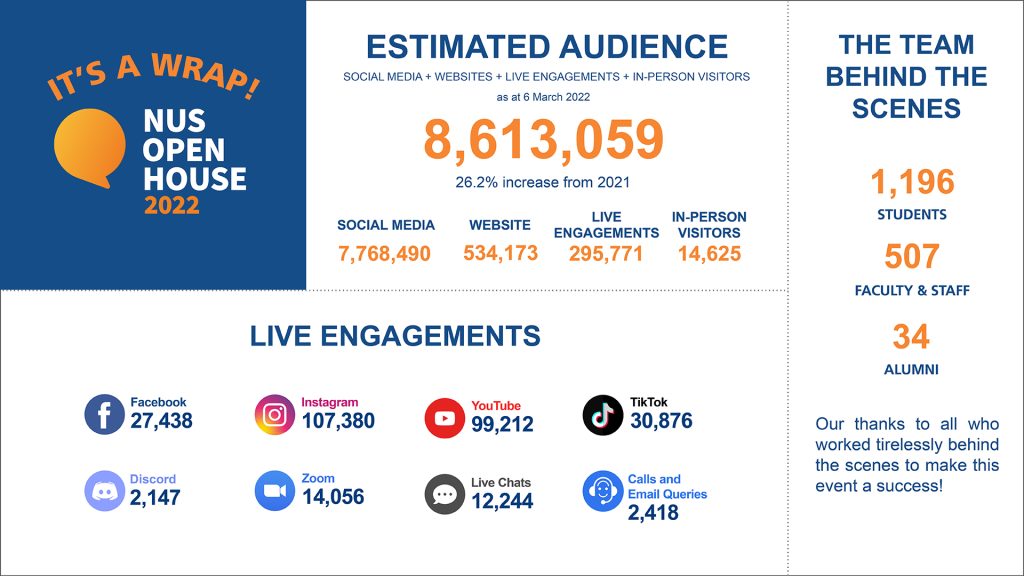
While much of the engagement happened online, prospective students got to meet NUS students and staff face-to-face for the first time since the pandemic started.
The physical Open House, held one sunny Saturday on 5 Mar, included numerous booths showcasing the University’s wide-ranging academic options and vibrant student life; sample classes and talks to get a taste of varsity life; and tours of the different colleges, faculties, and schools.
Prospective students gave the hybrid format a thumbs-up.
Joshua Chua, an alumnus of Anderson Serangoon Junior College, appreciated the online sessions and felt the physical Open House was a huge differentiating factor.
“The (physical) Open House really gave me a good image of what living and studying at NUS could look like by virtue of being an in-person event as opposed to it being virtual, so I'm really grateful to NUS and everyone involved for having this opportunity during the pandemic,” he said.
On her part, Hwa Chong Institution alumna Elsie Woo, who attended both the online and in-person sessions, said, “The experience was really welcoming and wholesome, and really exposed me to NUS as a whole.”
Showcasing the country’s first honours college
One of the highlights this year was the NUS College, Singapore’s first honours college. It will accept its first batch of students this year.
Prospective students were treated to online webinars on the College’s distinctive curriculum, its global pathways, and its focus on hands-on experiential learning. In more intimate breakout rooms, staff and student volunteers readily answered questions about student life and academic pathways. By having a home college or faculty – say Business or Science – while simultaneously being enrolled at NUS College, students will be able to get an educational experience that is as broad as it is deep.
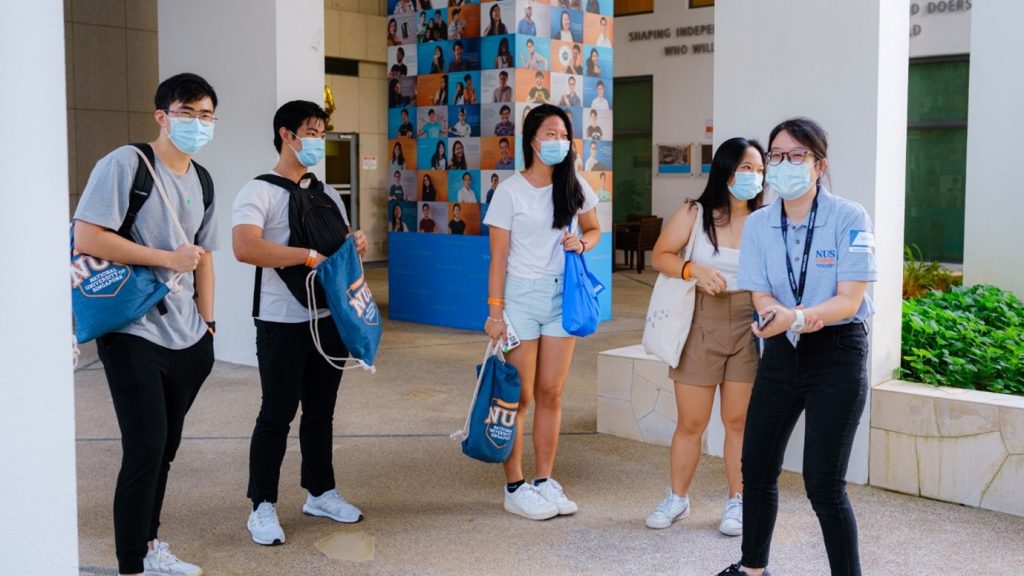
The in-person activities featured a tour of the facilities and residential options that NUS College students would be able to enjoy.
Elsie Woo was one of many students drawn to NUS College’s unique offerings.
“I attended a few webinars, including introductory talks for NUS College and Food Science and Technology,” said Elsie, who also visited many booths in-person.
“The sessions were very well-planned and the seniors were extremely helpful and patient.”
Nanyang Polytechnic alumnus Koh Jin Yuen focused his time on NUS College, attending the College’s guided tour and virtual sharing sessions.
“The NUS College tour was informative as I got to ask the facilitators about their experiences. I think the curriculum is very meaningful,” said Jin Yuen.
“The Open House helped to deepen my understanding of how NUS College works, and allowed me to better understand the lifestyle of a student from NUS College.” He is intending to apply for the Information Systems programme offered by NUS Computing, as well as NUS College.
Ramping up interdisciplinary offerings
Exciting developments in the realm of interdisciplinary education—a major theme that NUS has been championing—were foregrounded at the Open House, with the College of Design and Engineering (CDE) also taking in its inaugural cohort. A result of the merger of the Faculty of Engineering and the School of Design and Environment, CDE is set to transform the NUS educational experience.
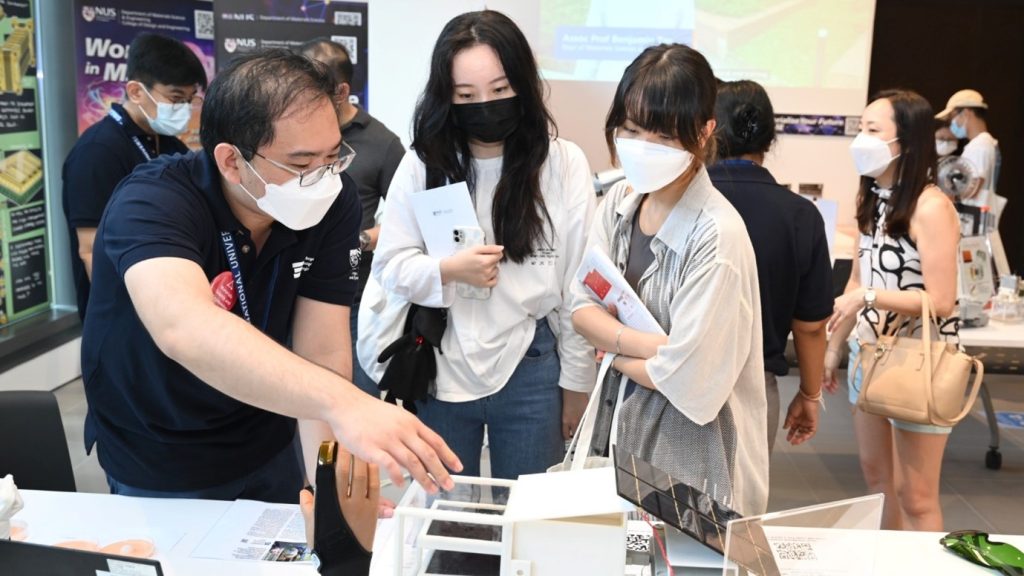
Across five galleries and 19 sub-categories, including Architecture, Industrial Design, Materials Science and Engineering, Biomedical Engineering, and Civil Engineering, visitors were presented with an informative display of the wide range of courses and programmes that will be on offer in the new College.
Raffles Institution alumna Grace Zai, who visited the Designing the Future exhibition and galleries, said, “The Engineering galleries were very informative as I could ask questions I had about the course, as well as student life, and get a clearer picture of what I would be studying and doing. It helped me make a more informed decision on my choices.”
Grace is considering applying to Engineering Science and Architecture, as well as Mechanical Engineering and Electrical Engineering with a specialisation in robotics.
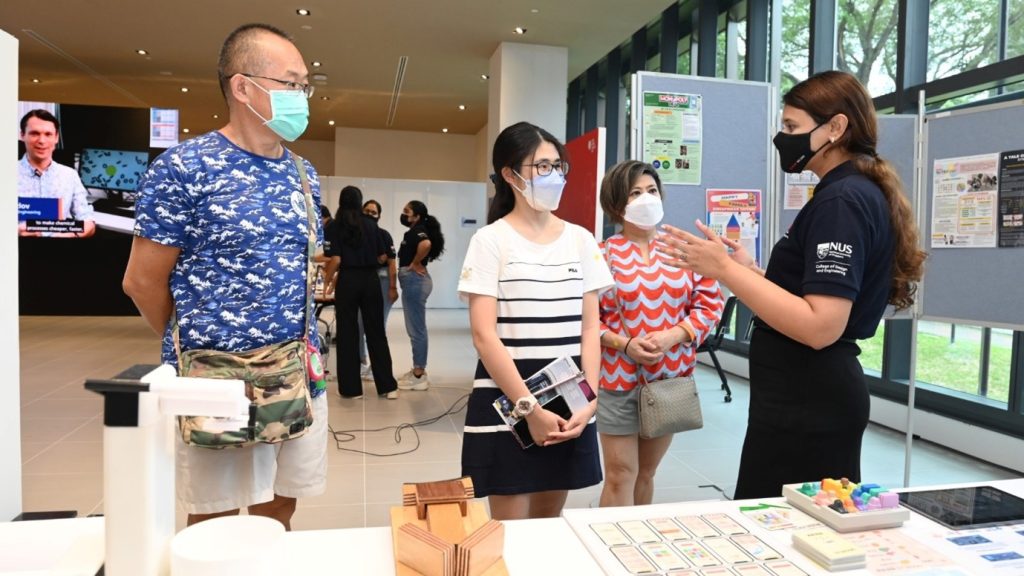
There were also panel discussions, both online and in-person, where faculty and current students interacted with prospective students to share their experiences and answer questions about the new interdisciplinary curriculum.
“As a prospective student, I got to see first-hand the school facilities, as well as the accommodations. My experience was pretty enriching and enlightening because I could ask the professors questions I had in mind and learn more about the courses,” said Timothy Tay, a graduate of Victoria Junior College who visited the SDE gallery on Sustainable Innovations.
“For example, I did not realise Project Facilities Management (PFM) was recently changed to Infrastructure Project Management (IPM). The professor explained that students will now graduate with a BEng degree rather than a BSc degree,” he recalled, referring to the first interdisciplinary full-time undergraduate programme to cover engineering, design, management, technology, building science and law modules.
Information was also available on the vibrant student life of the College’s various clubs and societies, as well as career programmes that enable students to better understand their interests and what it takes to marry that with industry skills and experience.
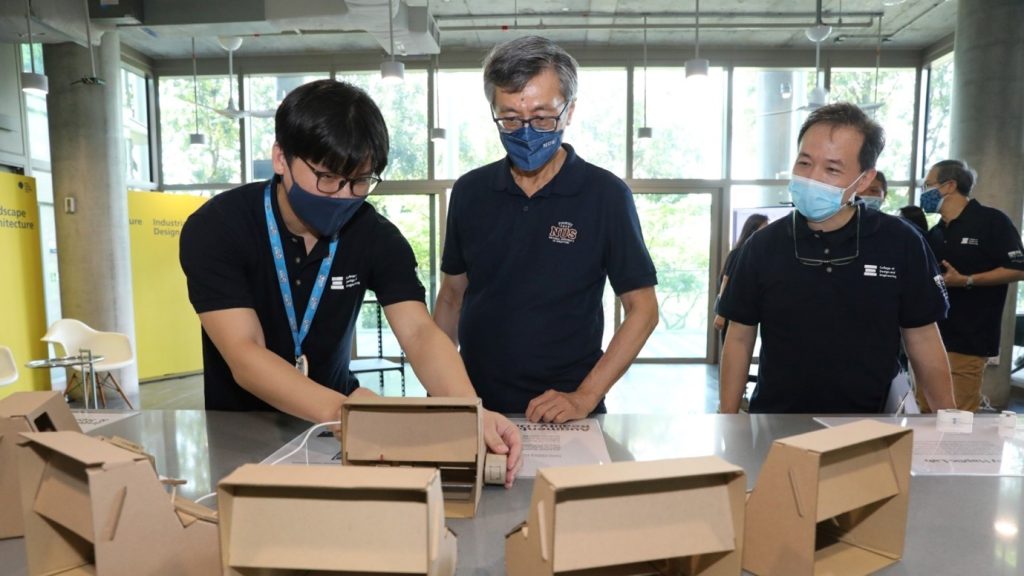
“The NUS Open House provided me with a more informed perspective on the courses offered in NUS. The various booths set up and run by students allowed for quick chats about what the courses have to offer. The responses by the students and professors were engaging and genuine, which I found informative in making my choice for courses in NUS,” said Kalepu Sai Sri Akshath, who attended CDE’s online and in-person events with his family and is intending to apply to Computer Engineering.
Drone-sensing demonstrations and the Solar Roof Tour, 5G Lab Tour, and BEEHUB Tour further showcased the College’s manifold facilities. Visitors also got a first-hand experience of NUS’ very own net-zero energy building through tours at SDE4, itself a product of both architecture and engineering, and the first of its kind in Singapore.
A marriage of the humanities and sciences
Continuing in the vein of interdisciplinarity and equipping students with a multifaceted, integrated toolbox of skills to thrive in the future economy is the College of Humanities and Sciences (CHS), which will be accepting its second intake this year.
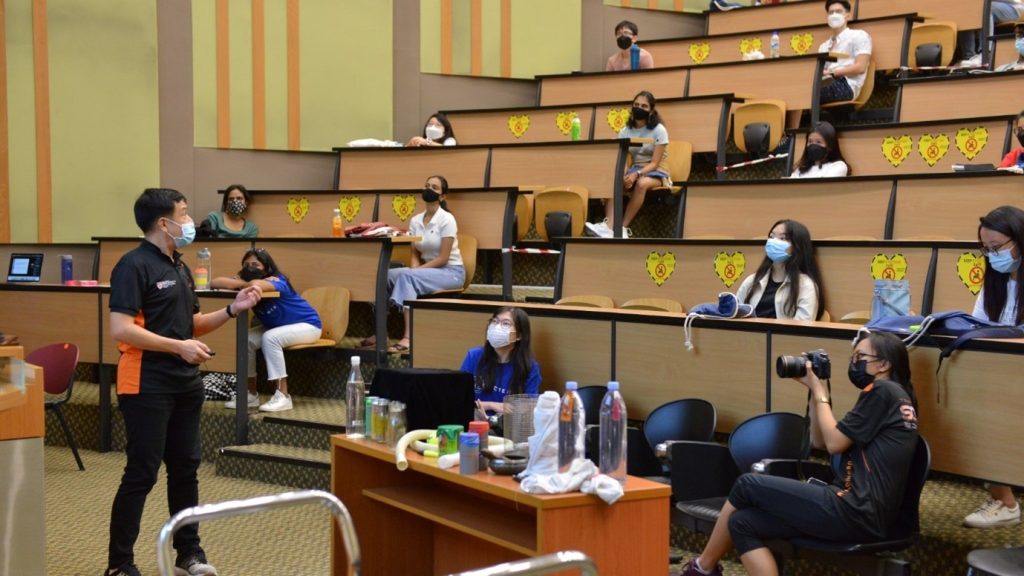
Seminars about the CHS Core Curriculum were available at the Open House, as well as informative masterclasses that covered a vast range of interdisciplinary topics.
The Data Science and Economics masterclass saw Assoc Prof Lim Tiong Wee and Assoc Prof Chen Ying (Statistics & Data Science, Faculty of Science) and Dr Denis Tkachenko (Faculty of Arts and Social Sciences) break down the complexities of the digital economy with real-life examples, and explicate its relevance to Singapore’s Smart Nation goals.
The new Data Science and Economics (DSE) cross-disciplinary programme will be the first of its kind in Singapore to integrate knowledge across these two disciplines.
“I got to understand how data science and economics complement each other,” said Russell Hor, a graduate of St. Joseph's Institution who has finished National Service and is enrolling in CHS this year.
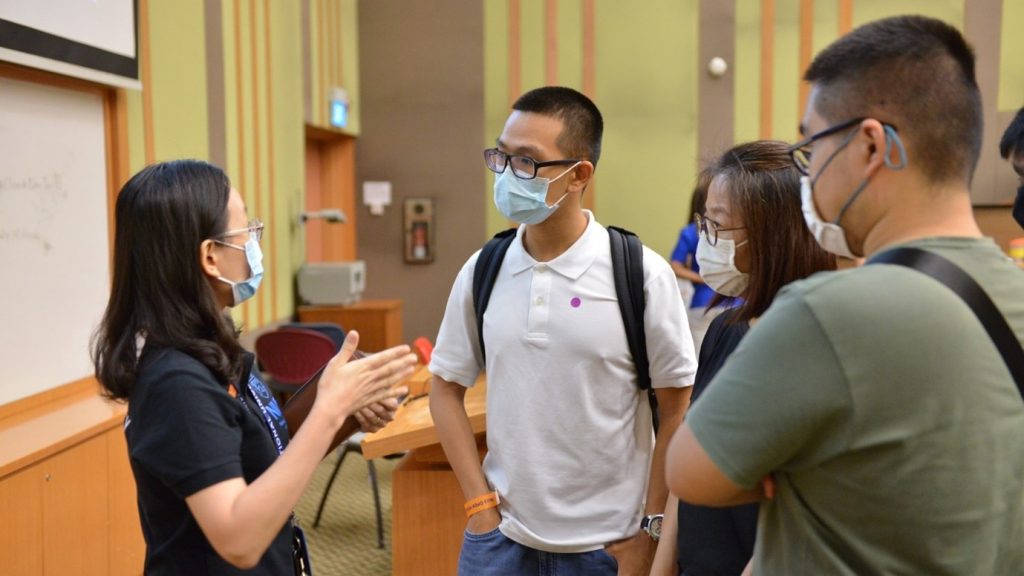
Vanille Goh, who graduated from Anglo-Chinese Junior College and attended the Geography and Environmental Studies masterclasses, said, “[The masterclasses] provided me with a good overview of how passionate the lecturers were and how each course will adequately prepare me for what I would want to do in the future.”
Nanyang Junior College alumna Wen Xinyue also appreciated the in-person masterclasses, adding that they gave her a first-hand glimpse into studying humanities at the university level.
“I am interested in studying English, and from the English Language and Literature masterclass on Gender, Sexuality and Language, I learnt about how entrenched gender roles and stereotypes can be within the language we use,” she shared.
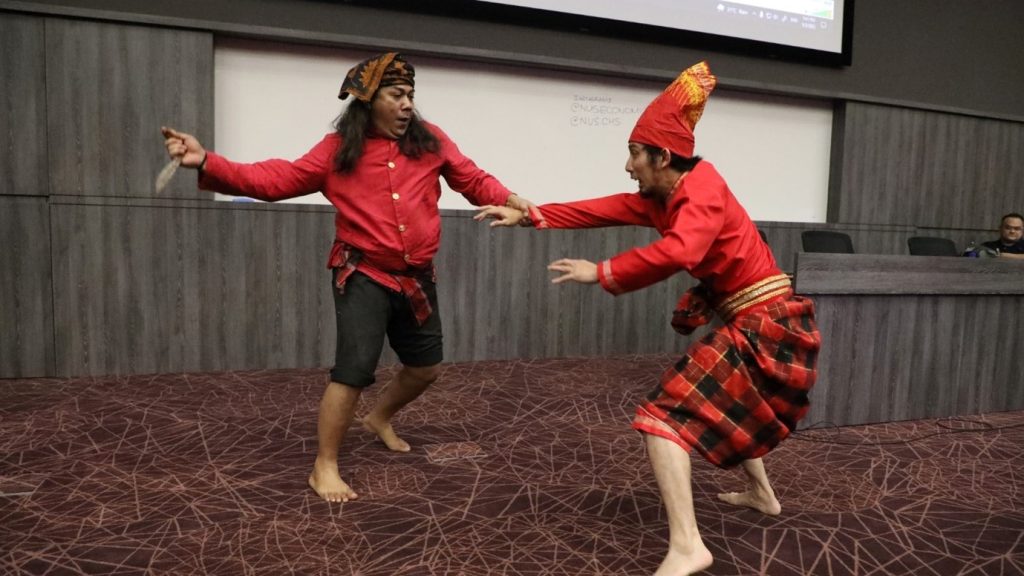
Meanwhile, over at the “Insights into Southeast Asia from the Martial Arts Perspective” masterclass, Dr Mohamed Effendy of NUS Southeast Asian Studies presented prospective students with a riveting intellectual and visual treat, demonstrating how useful unique perspectives on the region’s myriad communities can be gleaned by studying them through the lens of the martial arts. Students saw the concepts brought to life – witnessing first-hand an exciting live demonstration by practitioners of pencak silat – of how Southeast Asian warriors of old defended themselves using a wide array of techniques and weapons.
Action aplenty
There was action aplenty among other faculties. NUS Business School’s programmes included a 360 live tour, as well as live chats with the BBA Deans on the different majors offered by the School. Its in-person sessions included sharing sessions by the BBA Deans, BIZCareers advisors, and student ambassadors.
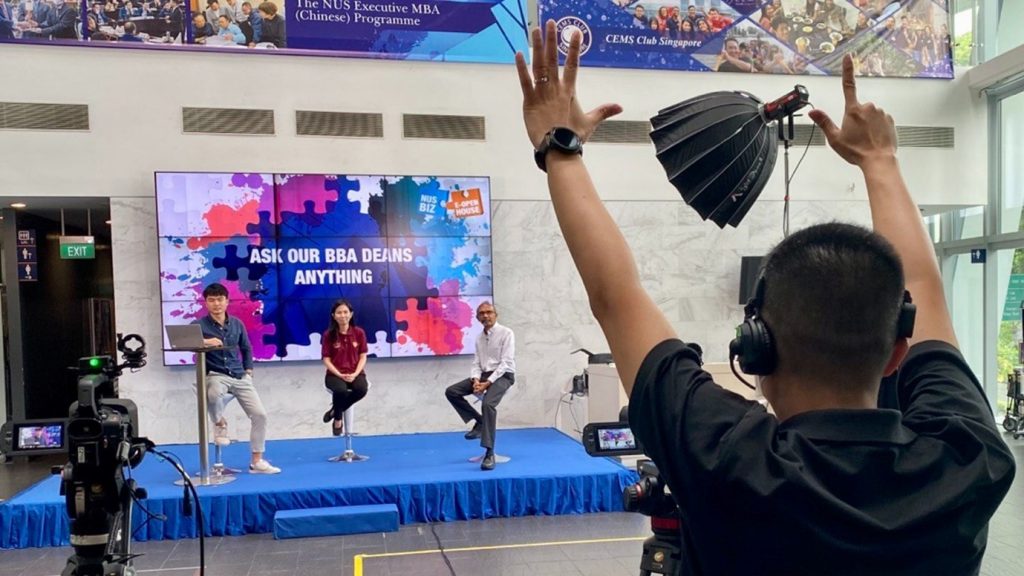
Year 4 Accountancy and Finance undergraduate Calvin Chur was one such student volunteer, serving as an emcee for the online Open House and sharing in-person on 5 Mar about life at the Business School.
“It was a tiring, but extremely fulfilling day engaging with prospective students, learning about their concerns with regards to entering a new phase of life and trying to address those concerns,” said Calvin. “In fact, many of their concerns mirrored those that I had as a fresh A-level graduate attending the NUS Open House back in 2016 – and I am glad that I could offer insider insights to help them make an informed decision at this major milestone of their lives.”
Year 4 Real Estate undergraduate Natasha Liem, another student volunteer who served as an emcee, added, “There was quite a large number of viewers for the panel and a prospective student actually sent me a message on Instagram to enquire more about real estate from a student's perspective. I think the panel went well!”
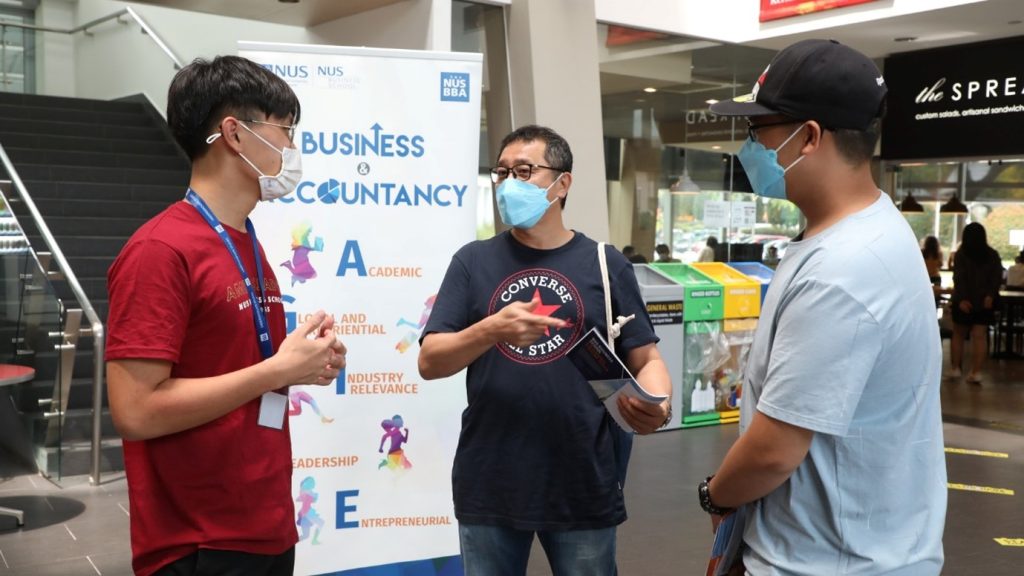
For NUS Business School Executive (Marketing & Outreach) Ms Casey Jean Grant, it was an eye-opener to experience the whole planning process.
“Most of the students and parents were very curious and excited about the prospect of coming to NUS Business School,” she added. “Their excitement definitely rubbed off on us and made the rest of us excited to share about our School.”
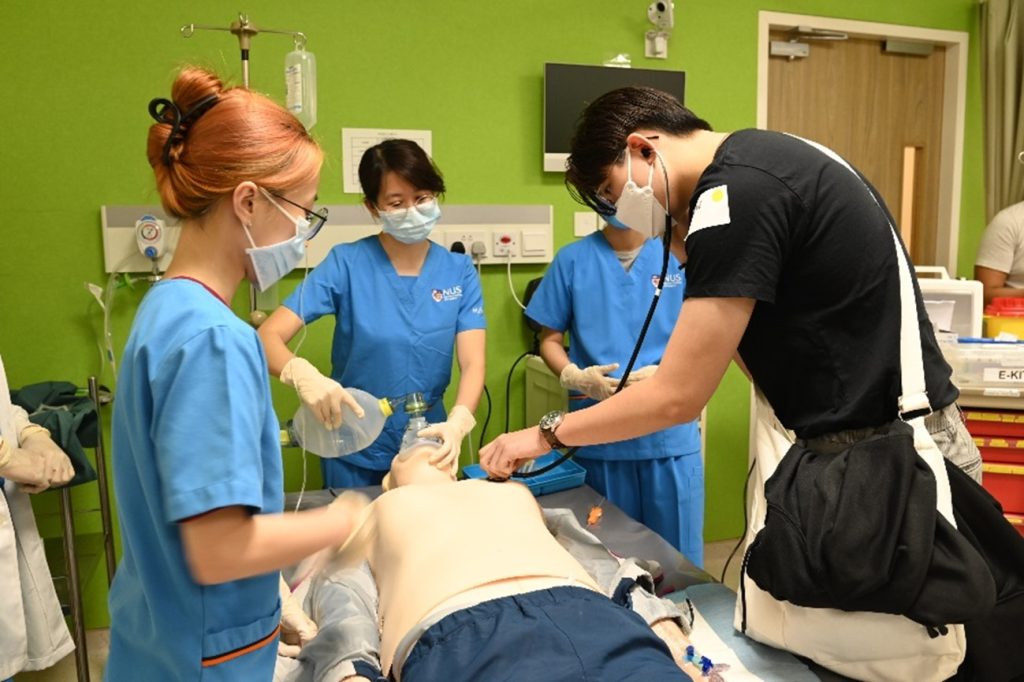
With frontline healthcare workers being in the spotlight these couple of years, there was plenty of interest in NUS Dentistry, NUS Nursing, NUS Medicine, and Duke-NUS Medical School. Live demonstrations were conducted and prospective students got a taste of what it would be like to be a dentist, nurse or doctor.
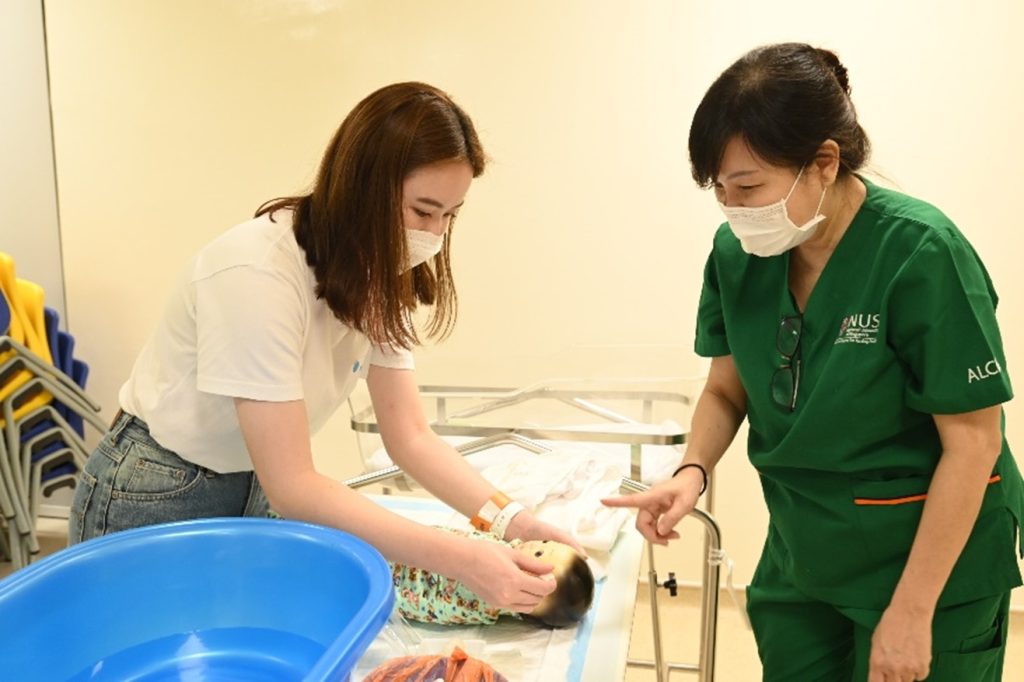
Serving up a slice of campus life
Whether on the screen or in the flesh, visitors to the Open House also witnessed the rich and vibrant student life beyond the classroom that NUS is known for.
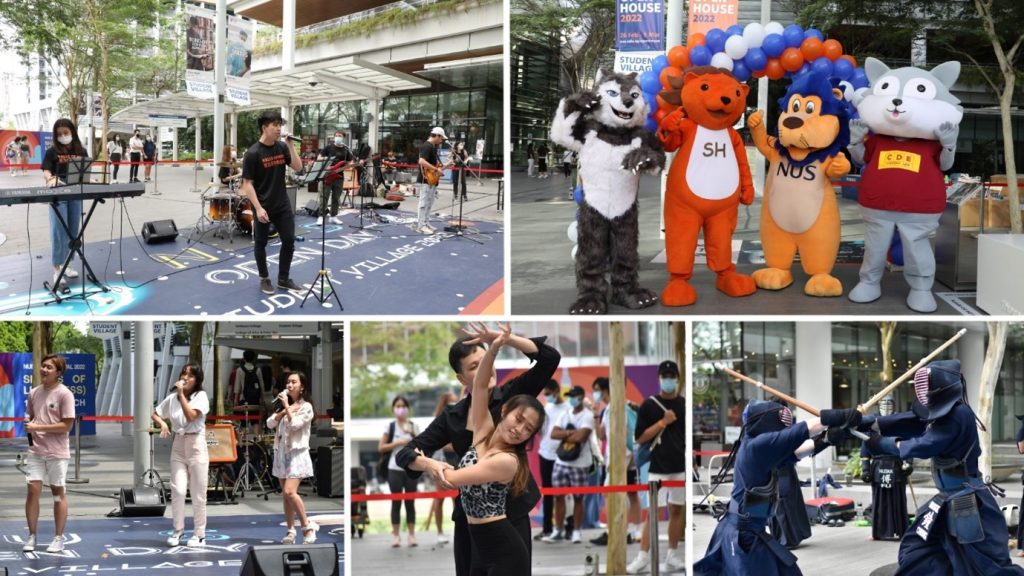
Besides holding talks to acquaint visitors with the wide range of co-curricular activities available, student clubs and societies rose to the occasion at the Student Village showcases to feature a spectacular smorgasbord of music, dance and sporting performance across the eight days that Open House was on. Visitors were serenaded by soulful tunes by the NUS Jazz Band and wowed by the moves of NUS Kendo Club. They were also treated to cheerleading displays, snazzy dance performances by NUS Funkstyle and BreakiNUS, catchy renditions of contemporary pop and choral music by the a cappella group Resonance, and the dulcet tones of TheNUSChoir and the NUS Mandopop group Voices.
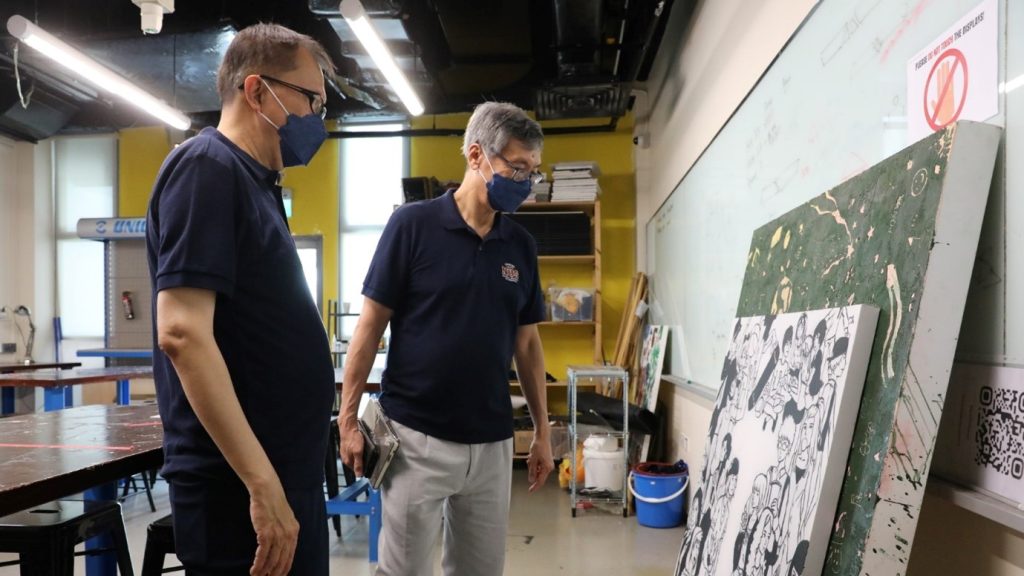
"It was really lively with dozens of booths as well as live performances put on by really talented students! It truly allowed me to understand the culture here and makes me want to be a part of it after experiencing first hand,” Vanille Goh shared.
Students and hall masters from the halls and residences also conducted informative residential life talks, A-Day-in-the-Life-Of vlog sessions and Ask-Me-Anything sessions to help students interested in on-campus living understand its manifold aspects like academic programmes and pastoral care.
These were complemented by in-person tours of King Edward VII Hall, NUS College, Ridge View Residential College, Tembusu College, RC4, and Pioneer House, NUS’ newest housing model, giving participants a real taste of the sense of community and camaraderie that comes with residential life in NUS.
Joshua Chua, who also participated in the RC4 tour, said, “The RC4 tour was definitely a highlight because the tour guide, as with most staff and students, was welcoming and frank, which eased my nervousness.”
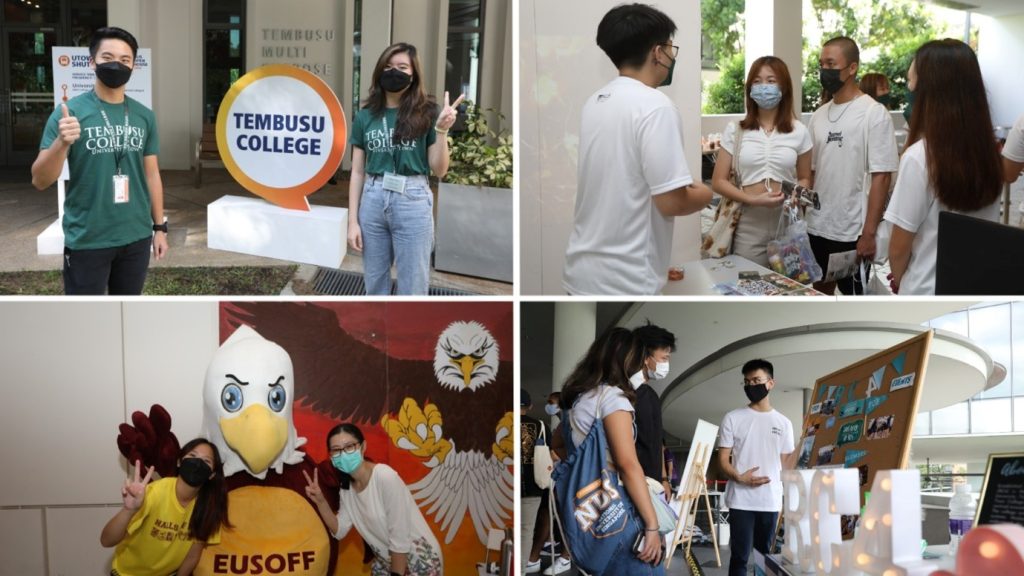
Matthew Yeow, an alumnus of Anglo-Chinese School (Independent) who attended both online and in-person sharing sessions by student residents of the Residential Colleges, said, “During the physical Open House, I had the opportunity to find out a lot more about the residential colleges and what made them distinct from halls. Furthermore, I also got to find out more about the individual residential colleges and their communities, as well as the additional modules they took.”
“As a prospective student, I think the Open House was executed effectively through both the online and physical mediums. Having the opportunity to come down and visit the University and talk to the current students gave me a better understanding of student life in NUS,” he added.
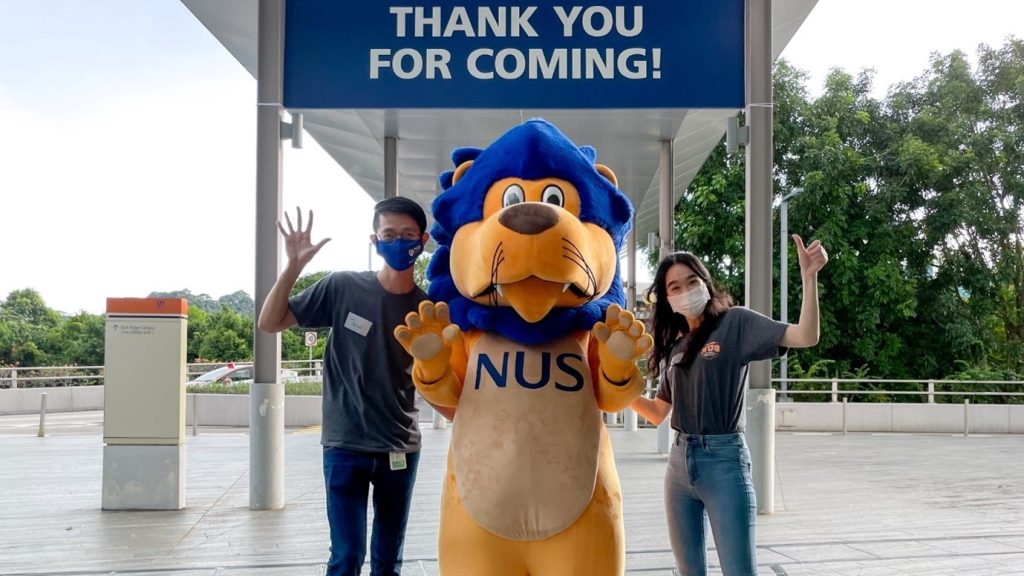
This story first appeared on NUSNews on 8 March 2022.
New Courses for the New Economy
IN BRIEF | 5 min read
- NUS is offering a number of new programmes to prepare graduates for the future, including the much-anticipated Major in Anthropology, and Minor in Interpreting by the NUS Department of Chinese Studies.
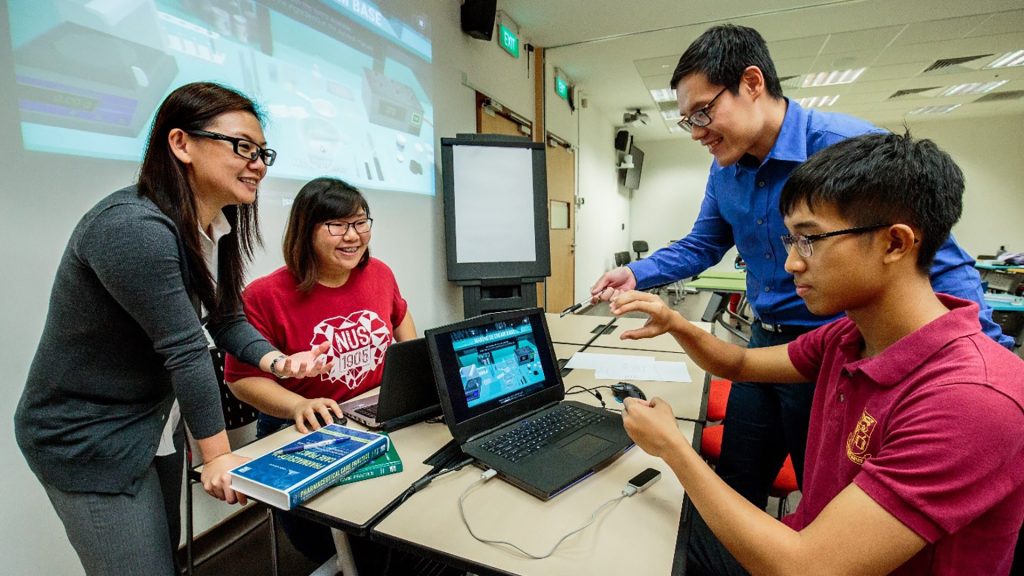
The University’s key theme of preparing undergraduates for the workplace of the future will be further enhanced with the launch of new majors, minors and degree specialisations in the upcoming academic year. About 10 new courses are on the cards.
New programmes from the NUS College of Design and Engineering (CDE), NUS Faculty of Science, NUS School of Computing, and NUS Faculty of Arts and Social Sciences will cover areas such as Artificial Intelligence, technology, data science, sustainability, globalisation. They will add on to the interdisciplinary offerings by the flagship NUS College, Singapore’s first honours college welcoming its first cohort in August – as well as those by the College of Humanities and Sciences (CHS).
“The overall goal of all our education reform efforts is to advance a university curriculum that prepares students well for a Fourth Industrial Revolution world and workplace,” said Professor Bernard Tan, NUS Senior Vice Provost (Undergraduate Education).
“Our education, focused on both breadth and depth, ensures that our graduates are held in high regard by employers. Last year, more than nine in 10 NUS graduates secured a job within six months of their final examinations.”
New majors and minors
Bachelor of Engineering (Infrastructure and Project Management)Offered by CDE’s Department of the Built Environment, this degree will equip graduates with the knowledge and interdisciplinary skills to excel in the multifaceted built environment. This is the first interdisciplinary full-time undergraduate programme to cover engineering, design, management, technology, building science and law modules. Major in Anthropology
Offered by the NUS Faculty of Arts and Social Sciences to all CHS students, this major will study the range of human diversity, accounting for how people in different times and places have developed into distinctly different societies. The degree will expose students to a vast variety of different beliefs and health practices, economic and political systems, material culture, and even different notions of beauty, the environment, food, family, and the good life.
Anthropology is much sought after for the sort of training it offers its students – a ground up approach to developing deep understanding on just about every aspect of the human condition. Students will be equipped to better understand and deal with the chaos, uncertainty, and ambiguity that characterises the contemporary age.
Second Major in Sustainable Urban DevelopmentOffered by CDE’s Department of Civil and Environmental Engineering, it aims to train the next generation of urban problem-solvers. They will be equipped with interdisciplinary knowledge and skills to create sustainable urban environments in the context of the changing climate. Open to all NUS undergraduate students, this major is stackable to students’ primary major in their chosen field, and can be completed in four years with no additional academic workload. Second Major in Nutrition
This will be offered by the Faculty of Science to all CHS students, including those reading Food Science and Technology as the primary major. It is designed to equip students with knowledge in human nutrition, providing them with the necessary foundation to develop a cross-disciplinary perspective along the food supply chain – from farm to fork to health. Minor in Interpreting
Multilingualism is a defining characteristic of Singapore’s multi-ethnic, immigrant society. With four official languages and with English as the working language, translating and interpreting between each of the mother tongues and English has always been a prominent feature of Singapore society. Against this backdrop, the NUS Department of Chinese Studies has placed as one of its core objectives, the training of graduates with strong Chinese-English bilingual skills who can become leaders in the translation and interpreting arenas.
This new Minor will allow students a related alternative to translation, or as an affiliated Minor to Translation which is already being offered at the Department.
New specialisations
Three new specialisations will be offered by the NUS School of Computing:
Specialisation in Digital Product and Platform ManagementThis will be offered to students pursuing the Bachelor of Computing (Information Systems) Degree. They will build up a repertoire of knowledge and skills sought after by both technology companies and the digital immigrant companies that are fast adopting the product- and platform-centric technology and business operating models. Specialisation in Intelligent Systems Solutioning
Students pursuing the Bachelor of Computing (Information Systems) Degree can also take this new specialisation to learn to implement and apply intelligent system solutions buttressed by the new technologies of Artificial Intelligence, the Internet of Things, and Augmented Reality. They will learn to apply these new technologies in software engineering, and to implement and manage intelligent system solutions. Graduates will be able to take on job roles in intelligent systems engineering and solutioning. Specialisation in Machine Learning-based Analytics
This new specialisation for Bachelor of Science (Business Analytics) students will enable students to tap into the analytics capabilities of Machine Learning, a sub-field of Artificial Intelligence. They will learn to rapidly and automatically develop models that can quickly and accurately analyse massive, complex data sets, in order to help businesses unlock the value of corporate and customer data and enact decisions that keep them ahead of the competition. Graduates will be able to take on careers in the rapidly-growing business and data analytics field, among others.
New modules
Aside from the new majors, minors and specialisations, a number of new modules are being offered. For instance, the NUS School of Computing is starting a Digital Ethics and Data Privacy module to educate students on this pertinent and pressing issue.
The NUS Faculty of Law is introducing two modules – one on Law & Technology and one on Data Literacy – as technology and data are increasingly being key drivers for the legal industry.
Find out more about the courses offered by the University, and explore this year’s Open House. Here are four things to look out for at the Open House.
This story first appeared on NUSNews on 24 February 2022.
NUS Open House 2022: Interdisciplinary Offerings, In-person Activities and More!
IN BRIEF | 5 min read
- NUS Open House 2022 is back with opportunities for prospective students to meet NUS professors, students and alumni face-to-face, after two years of connecting virtually.
- Running from 26 February through 5 March, NUS Open House 2022 will begin with a comprehensive line-up of informative activities, including the online segment, during the week leading up to the physical Open House, which takes place on Saturday, 5 March from 9 am to 7 pm across NUS’ campuses in Kent Ridge and Bukit Timah.

NUS Open House 2022 is back with opportunities for prospective students to meet NUS professors, students and alumni face-to-face, after two years of connecting virtually.
The physical event will take place on Sat, 5 Mar from 9am to 7pm across NUS’ campuses in Kent Ridge and Bukit Timah. This will be preceded by a comprehensive line-up of informative activities during the week leading up to the physical Open House.
Including the online segment, NUS Open House 2022 takes place from 26 Feb to 5 Mar. Here’s a heads-up on four things to check out:
1. Exciting interdisciplinary offerings
NUS College, Singapore’s first honours college, was formed by the merger of the University Scholars Programme and Yale-NUS College. Offering an immersive, experiential and interdisciplinary educational journey, it will welcome its first batch of students this year. Students will have a home college or faculty, say, Business or Engineering, while simultaneously being enrolled at NUS College. There, they will have the opportunity to enjoy a holistic interdisciplinary curriculum that is complementary to their major.
Another option for interdisciplinary learning can be found at NUS College of Design and Engineering. The College offers a programme that prepares students for the future through interdisciplinary learning and robust research in the fields of engineering and design. At the College, students are given the flexibility to build and design their own learning experience.
The NUS College of Humanities and Sciences, the enhanced undergraduate experience for students of the Faculty of Arts & Social Sciences and the Faculty of Science, is accepting its second intake this year. The College offers 13 Common Curriculum pillars consisting of modules such as scientific inquiry, humanities, digital literacy, design thinking, artificial intelligence and many more exciting options. These are complemented by majors and minors spanning the arts, humanities and sciences, such as global studies, philosophy, theatre and performance studies, quantitative finance, data analytics and pharmaceutical science. Students can pick and choose modules to create a customised curriculum that matches their interest and aspirations.
To ensure that graduates are ready to take on leading roles in the New Economy, NUS constantly develops new courses. Here are this year's new offerings.

2. Meeting you in person - again
After two years of meeting virtually, the NUS community is excited to get together in real life with prospective students once again!
You can look forward to an enlightening schedule of in-person activities including a tour of the Centre for Healthcare Simulation by NUS Nursing; tours of residential living options such as Tembusu College, CAPT (College of Alice & Peter Tan), and RC4; a live demonstration of a moot court session and tour of the NUS Bukit Timah campus by NUS Law; tours and a showcase of NUS College; as well as a live question-and-answer session with Duke-NUS Medical School.
3. Webinars, talks, live chats, hotlines and more
Get a taste of life as an NUS student, even before the physical event. A host of insightful webinars, talks, question-and-answer sessions, live chats, hotlines, and virtual tours have been arranged starting 26 Feb to give you a head start on topics such as admissions, student life, and on-campus living, as well as programmes offered by NUS College, the College of Design and Engineering, the College of Humanities and Sciences, Business, Music and many more.
Obtain behind-the-scenes knowledge from NUS student ambassadors and the NUS Students’ Union on the rich student life available at NUS, and be serenaded by NUS Choir and NUS Jazz Band.
Professors will be on hand to share information on their respective programmes, and you’ll even have a chance to sit in on classes. Have a question that is not covered by the briefing? No sweat! There’ll be chat sessions with NUS Admissions, professors and students from selected programmes during which you can get your queries addressed.
Click here for the list of virtual and in-person activities for NUS Open House.

4. Exciting student life
NUS offers a myriad options for a rich student life, and NUS Open House is the perfect place to start exploring the possibilities. Many alumni recall their NUS days fondly, remembering not only the academic progress they made, but the camaraderie forged with friends from clubs, societies and on-campus residences.
Throughout the period of the online Open House and during the physical event, representatives from various student-led groups will speak on topics including hall life, clubs and societies, as well as campus performing groups. Take part in a live session with music and dance groups, embark on a virtual residential tour, and more.
We’re looking forward to seeing you online from 26 Feb and in-person on 5 Mar!
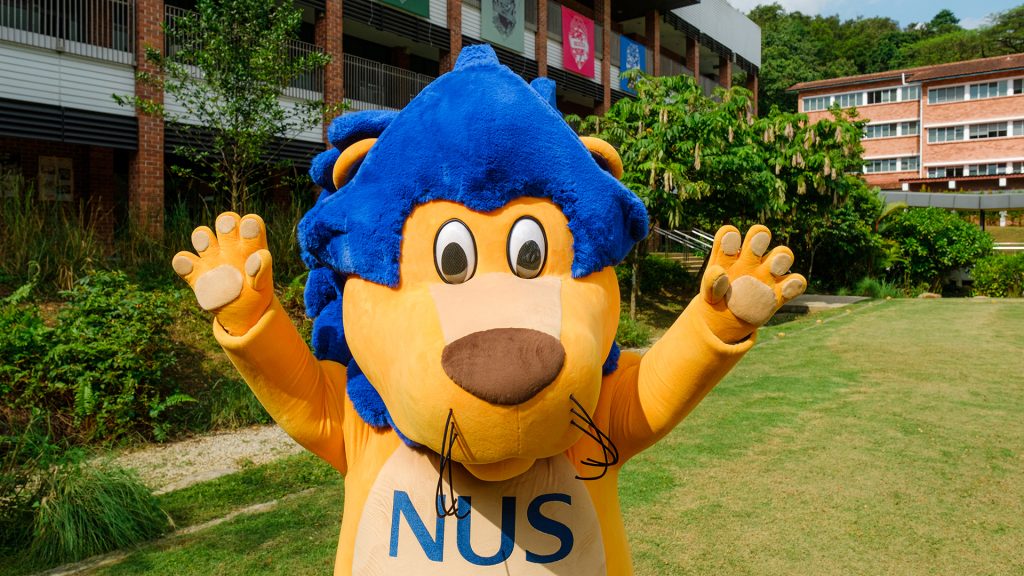
This story first appeared on NUSNews on 23 February 2022.
FASS Inspiring Mentor 2021 Award Winners Announced

The NUS Faculty of Arts and Social Sciences is proud to announce the winners of the 2021 FASS Inspiring Mentor Awards.
Congratulations to:
- Prof Jack Qiu Linchuan, Professor, Department of Communications and New Media
- Assoc Prof Loy Hui Chieh, Associate Professor, Department of Philosophy
- Assoc Prof Robin Loon Seong Yun, Associate Professor, Department of English Language and Literature
- Dr Michael Yoshitaka Erlewine, Assistant Professor, Department of English Language and Literature
- Dr Nina Laurel Powell, Senior Lecturer, Department of Psychology
Winners of AY2020-21 Faculty Teaching Excellence Awards Unveiled
 The NUS Faculty of Arts and Social Sciences is proud to announce the 37 winners of the Faculty Teaching Excellence Award for their work in AY2020‐21, 16 of which have also been nominated for the Annual Teaching Excellence Award(ATEA) and Annual Digital Education Award (ADEA).
The NUS Faculty of Arts and Social Sciences is proud to announce the 37 winners of the Faculty Teaching Excellence Award for their work in AY2020‐21, 16 of which have also been nominated for the Annual Teaching Excellence Award(ATEA) and Annual Digital Education Award (ADEA).
Special thanks are due to members of the Faculty Teaching Excellence Committee–Dr Susan Ang (English Language and Literature and Chair of FTEC), A/P Loy Hui Chieh (Philosophy; FASS Vice‐Dean), A/P Lim Wee Hun, Stephen (Psychology), Dr Gilbert Yeoh (English Language and Literature) and Mrs Chen Ing Ru (Centre for Language Studies)–for their efforts in shortlisting and nominating the winners.
|
NAME |
DEPARTMENT |
|
Mr Appriou Yannick Francois |
Centre for Language Studies |
|
Ms Baranska, Malwina |
Centre for Language Studies |
|
Ms Klayklueng, Sasiwimol |
Centre for Language Studies |
|
Ms Morita, Kazuko |
Centre for Language Studies |
|
Dr Chaidaroon Suwichit |
Communications and New Media |
|
Dr Hong Renyi |
Communications and New Media |
|
Dr Mitchell, Alexander Ian |
Communications and New Media |
|
Dr Shobha Avadhani |
Communications and New Media |
|
Mr Tan Kai En |
Communications and New Media |
|
Dr Timothy Wong Chong Ji |
Economics |
|
Dr Vu Thanh Hai |
Economics |
|
A/P Michelle M. Lazar |
English Language & Literature |
|
Dr Miguel Escobar Varela |
English Language & Literature |
|
A/P Starr Rebecca Lurie |
English Language & Literature |
|
A/P Thell Anne Marie |
English Language & Literature |
|
Dr Roy, Tania |
English Language & Literature |
|
A/P Chang Tou Chuang |
Geography |
|
A/P Daniel Adam Friess |
Geography |
|
Dr Gretchen Christina Coffman |
Geography |
|
Dr Kamalini Ramdas |
Geography |
|
Dr Kenney-Lazar Miles Richard |
Geography |
|
Dr Teo Sheng Kiat, Shaun |
Geography |
|
Dr Donna Maree Brunero |
History |
|
Dr Lawrence, Kelvin |
History |
|
Dr Sayaka Chatani |
History |
|
Dr Beddor, Robert Speeter |
Philosophy |
|
Prof Bain, William Ward |
Political Science |
|
Dr Dunya Deniz Lepori |
Political Science |
|
Dr Jia Lile |
Psychology |
|
Dr Nina Laurel Powell |
Psychology |
|
Dr Wong Shi Hui Sarah |
Psychology |
|
Dr Peace Wong Yuh Ju |
Social Work |
|
Dr Chua Hui Ching, Emily |
Sociology |
|
Dr Elliott Edward Prasse-Freeman |
Sociology |
|
Dr Jennifer Emily Estes |
Sociology |
|
Dr Noorman Abdullah |
Sociology |
|
Dr Radics, George Baylon |
Sociology |
Congratulations to them all!
FASS Announces New Additions to Leadership Team
IN BRIEF | 2 min read
The NUS Faculty of Arts and Social Sciences is pleased to announce recent new appointments to the Faculty's leadership team.
Three eminent members of the Faculty received new appointments to the Deanery at the beginning of this year:
- Professor Joseph Park (English Language and Literature)
Vice-Dean (Undergraduate Studies) - Dr Zhang Yang (Economics)
Associate Dean (Undergraduate Studies) - Dr Noorman Abdullah (Sociology)
Assistant Dean (External Relations and Student Life)
We wish them the very best with their new portfolios. Click here to visit the FASS Deanery page.




[??? ????] ??????: ?????????? ??????????? ?? ????? ?????
Kurokawa Onsen is a hot springs village resort in Japan with more than twenty traditional inns, otherwise known as ryokan. In ??????: ?????????? ??????????? ?? ????? ?????, Associate Professor Chris McMorran (NUS Department of Japanese Studies) explores the ins and outs of ryokan work, explaining how Kurokawa’s ryokan serve as a form of rural escape from the otherwise globalised and fast-paced everyday life of the Japanese. These ryokan, which draw nearly a million tourists a year, have led village youth to take over their families’ ryokan businesses. The face of the ryokan are the nakai – hired female staff who welcome guests, serve meals, and clean rooms. ??????: ?????????? ??????????? ?? ????? ????? focuses on the importance of both the generational work of ryokan owners as well as the daily work of their employees, while highlighting the differences in the work owners and employees do. Through A/P McMorran’s year-long ethnography in a ryokan, along with nearly two decades of research on ryokan in Kurokawa, he reveals that many nakai turned to employment in ryokan as a way out of their violent or unhappy marriages. Yet despite their numerous years of working in ryokan, many remain socially and economically vulnerable. ??????: ?????????? ??????????? ?? ????? ????? will be published in April 2022 by University of Hawai’i Press. Pre-order the book here. Stay tuned for the virtual book launch in 2022!
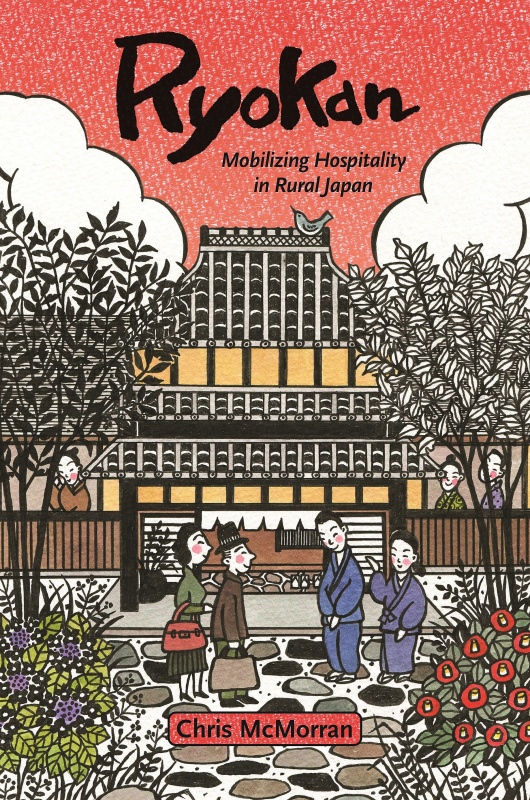
NUS Bags Major PR Award for College of Humanities and Sciences Campaign

One year since the official inauguration of the NUS College of Humanities and Sciences (CHS), the publicity campaign for the new College has gained recognition at the recent Public Relations in the Service of Mankind (PRISM) Awards.
The University bagged a Distinction Award in the category “Outstanding Campaign by a Non-Government Organisation or Not-For-Profit Organisation” for the launch and publicity of the interdisciplinary College.
The award recognises NUS’ effective communications regarding the necessity of an interdisciplinary education to faculty members, prospective students and their parents, alumni, employers, and members of the public.
The campaign also underscored what CHS offers students in a world plagued by complex challenges that require integrated interdisciplinary approaches. The campaign included the launch event, student profiles, social media, and CHS collaterals and media assets in the form of CHS-specific infographics, news and FAQs.
The campaign also included a video series on interdisciplinarity, a podcast series by the teaching team of the common curriculum Humanities module, and stakeholder endorsement in the form of testimonials from students and alumni of NUS Faculty of Arts and Social Sciences (FASS) and the NUS Faculty of Science (FoS) who have pursued interdisciplinary studies. A successful admissions publicity campaign was run, including the 2021 NUS Open House which drummed up interest in the College with student and employer panels, small group tours, and student chat rooms.
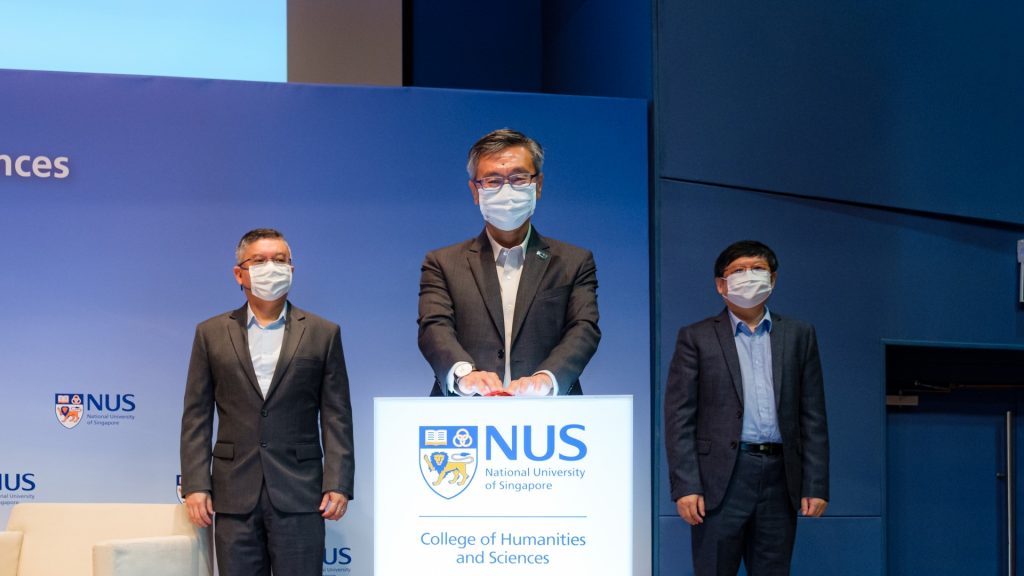
The accolade from PRISM, which coincides with the one-year anniversary of the official inauguration of CHS, bears testament to the concerted effort on multiple fronts of the campaign by various stakeholders, including the Communications teams from FASS and FoS, the NUS Office of University Communications and communications agency AKA Asia.
“The award comes as a truly wonderful one-year anniversary gift to all our colleagues involved in the CHS campaign,” said NUS Chief Communications Officer Ms Ovidia Lim-Rajaram.
“It is gratifying to know that our efforts to kickstart a meaningful, groundbreaking programme at the College are paying off, and that the journey to promoting an interdisciplinary, 21st-century educational experience at NUS is off to a great start.”
Communications at CHS is co-led by Mr Nisar Keshvani, Associate Director for Strategic Outreach and Communications at FASS, and Ms Janice Quah, Associate Director for Corporate Communications at FoS.
“The campaign award, a result of the synergy and collaboration across diverse University faculties and departments, epitomises the spirit of interdisciplinarity that CHS values, and the idea of capitalising on each other’s strengths to achieve the best outcomes,” Mr Keshvani said.
Ms Quah added, “It has been a challenging journey but seeing our communications ideas collectively come to fruition is truly fulfilling! The validation of the hard work motivates us to continue raising the bar, to sustain the impactful profiling of CHS to students and stakeholders.”
Recognising the best in public relations
Celebrating 44 winners across 27 categories, the PRISM awards ceremony was held on 15 Dec by the Institute of Public Relations Singapore (IPRS), the only accrediting body for public relations practitioners in Singapore. The Guest of Honour was Mr Tan Kiat How, Minister of State at the Ministry of Communications and Information (MCI).
Acknowledging the challenges of a shifting communications landscape, Mr Tan said, “MCI recognises the importance of excellence in public relations and communications across all sectors of the economy.”
“The campaigns up for awards today show how all of you have worked around these challenges and continued to achieve excellent levels of reach and impact.”
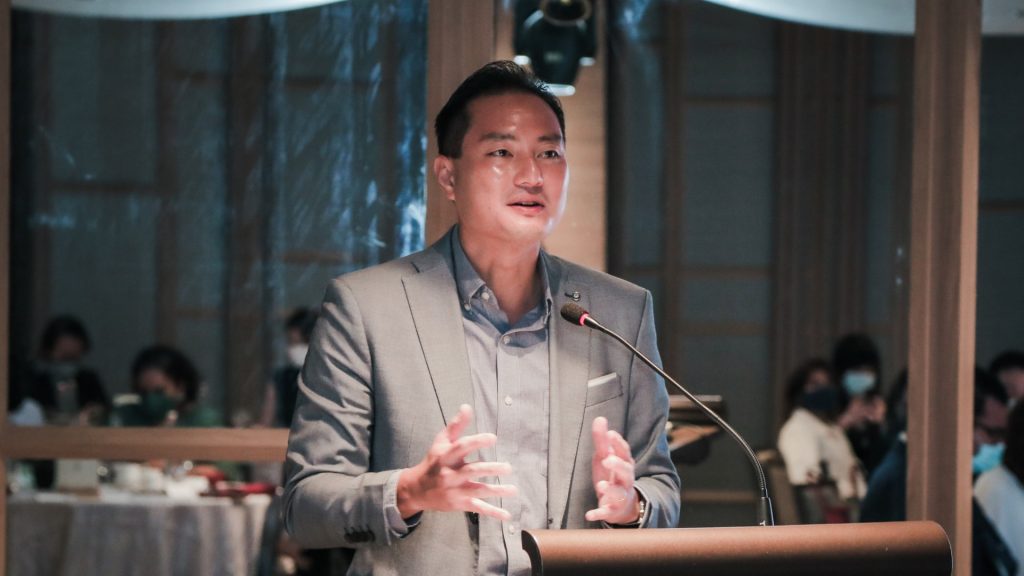
Held biennially since 1987, the PRISM Awards is one of the oldest and most prestigious awards in the industry, celebrating Singapore’s brightest stars in the communications and public relations industry. It is judged by a panel of established business leaders and senior practitioners, recognising and honouring organisations and individuals for excellence in public relations and communications.
Ms Koh Juat Muay, President of the IPRS Council 2021/2023 said, “The winning entries and the winners this year reveal a singular story – the resilience of our people, the ingenuity of the campaigns and strength of the organisations that continues to thrive in an evolving local and global communications landscape.”
“IPRS is privileged to hold PRISM Awards 2021 and share in the pride of profession demonstrated by our people and in the brilliance of their campaigns. Our winners truly embody the meaning of PRISM and that is Public Relations In the Service of Mankind,” she added.
This story first appeared in NUSNews on 21 December 2021.
An Interview with Emeritus Prof S. Vasoo and Assoc Prof Winston Goh on The Strange Start of Psychology at the National University of Singapore
The Strange Start of Psychology at the National University of Singapore (NUS Department of Psychology, 2021), showcases the history of the NUS Faculty of Arts and Social Sciences' Department of Psychology, Singapore's oldest psychology programme. The programme, which kicked off during the 86/87 academic year at the Department of Social Work (renamed the Department of Social Work and Psychology), became a department in 2005.
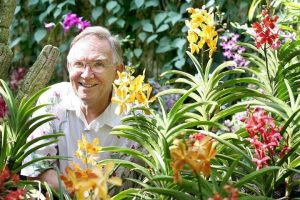
Author Dr John Michael Elliott (1945-2019), who was at the time a psychologist at the then Ministry of Social Affairs, joined the programme six weeks after it began and retired in 2018.
As the book explains, in Singapore, historically psychology was viewed more as clinical work that supported psychiatry, and mental health care was deprioritized. Instead, during the island's colonial era, patients requiring mental health treatment were institutionalized in The Insane Hospital, which commenced operations in 1841 with 30 beds. This hospital evolved into The Lunatic Asylum (1862, 100 beds), followed by The New Lunatic Asylum (1887, 300 beds), and then the Mental Hospital in 1928, which became Woodbridge Hospital in 1951.
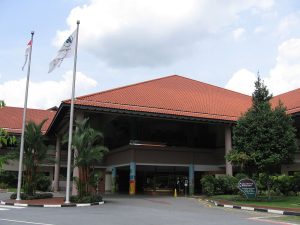
In 1993, Woodbridge Hospital moved to Buangkok Green, becoming the Institute of Mental Health's new inpatient facility.
There was a definite need for trained psychologists in Singapore, as well as a programme to train them, since, post-independence, all psychologists in the country completed their education abroad. When the NUS psychology programme got started in July 1986, however, the discipline was still often seen as non-Asian and more as medical training than a social sciences course, and also as a luxury in the realm of social work. The Department of Social Work was an ideal place for the new programme, Dr Elliott notes, as it would contribute to the department's own development, enabling it to offer an honours degree in social work and psychology.

The NUS psychology programme's initial cohort had 72 students and 1 staff and grew rapidly. There are currently around 900 students in the introductory psychology module and 220 honours graduates annually. At its inception 35 years ago the programme offered a three year general degree with a competitive fourth year honours degree. In 1989, 50 students received a general degree, 11 of whom went on to get an honours degree. Today, the department's own clinical psychology master's programme graduates approximately 15 annually, and psychology graduate students can also obtain a Master of Social Sciences or PhD.
The NUS Department of Psychology ranks 16 out of 303 on the Quacquarelli Symonds list and psychology is a well recognized and respected course of study in Singapore. Many graduates go on to engage in psychological work in the public sector, such as in Singapore's Ministries of Health, Defense, Home Affairs, and Social and Family Development. A number of graduates are also employed in private sector positions involving psychological work like human resource management and marketing, or in private practice in the fields of clinical, counselling, and industrial-organisational psychology, among others.

We discussed the The Strange Start of Psychology at the National University of Singapore, which has an online launch on Friday, 10th December at 11 am, with Associate Professor Winston D. Goh, the current NUS Department of Psychology Head, and Emeritus Professor S. Vasoo, who led the then NUS Department of Social Work and Psychology from 1987 to 1999.
 A/P Vasoo Q & A
A/P Vasoo Q & A
1. What were your most memorable experiences developing the new psychology programme during your term leading the NUS Department of Social Work and Psychology?
I have been teaching students and working with academic staff for about 50 years. In the course of these years, I always encouraged and advised them not to look back on events that had surpassed them. This is because memorable matters would not come back and one would not be able to deal with the bygones. No point spending time lamenting over things that have gone past as it can be emotionally costly and tiring. I always encourage students and academic staff to look ahead on events that will be forthcoming as these can be managed as they unfold and are within their control. I am of the opinion that various human issues that we can grasp at hand are largely solvable as long as we persistently tackle them with empathy. It is only with good empathy that we can have clearer insights to deal with human issues and relationships.
I recall that one of the challenging tasks that I had to deal with as the Head of the Department of Social Work and Psychology was to quickly recruit a group of Psychology academic staff to deliver the undergraduate psychology programme in 1986. I had selected staff with diverse psychology training such as a developmental psychologist, a cognitive psychologist, a social psychologist, an experimental psychologist, a clinical psychologist, and a psycholinguist. You can imagine with these varied backgrounds coming together to agree on a basic undergraduate curriculum was not easy. Each of them had different hobby horses to ride, which was understandable while mind-boggling, as there were protracted views within the group and at times heated arguments that I had to mediate. I brokered a deal as a non-partisan and drew a consensus among the different psychological academic personalities for the need to develop a top-notch undergraduate psychology programme based on the best psychology departments in the United Kingdom and United States. The foundation laid for the early phase of the psychology programme saw the fruition of some of our top psychology scholars in the Faculty of Arts and Social Sciences. I am indeed proud to witness that some of these accomplished scholars have become lead anchors of the NUS Department of Psychology and later appointed Heads. The nurturance of these top scholars have helped stabilize the psychology programme and provided succession of leadership. They also supported the Deanery of the Faculty of Arts and Social Sciences.
2. What can psychologists learn from social workers, and what can social workers learn from psychologists?

To put it simply, both psychology and social work are non-identical twin disciplines with each having to deal with human behaviour and social issues. As a psychologist, one has to understand human behaviour and the cause of such behaviour, and as a social worker, one has to understand the cause of social and human problems and then enable people to find ways to problem solve. Both disciplines deal with human and psychosocial issues, and human behaviour requires a multidisciplinary focus. I would say that no single discipline is adequate to solve human life course issues. I must add that a good psychologist will require social work lenses and a competent social worker needs to have helpful psychological lenses. As one will appreciate, we are all human beings and are ecologically bounded. Therefore both psychological and social work analyses are critical to better appreciate human behaviour and social interactions, and these can contribute to effective human and social problem solving.
3. What do you see as the most notable impacts in practice of social work and psychology in Singapore so far and in the future?

Psychology graduates as well as social work graduates are making robust contributions in public service, private enterprises, and non-governmental organisations. Psychologists hold highly respectable positions in areas such as clinical services, rehabilitation, health, human resources, education, the armed forces and the police, besides others. Increasingly, psychologists are needed to contribute psychological solutions to strengthen our psychological defences against various societal crises.
Likewise, social workers are also appointed in highly regarded positions in fields such as social services, rehabilitation, health, social research, counselling and mental health, education, the armed forces, and childcare, among others. Both psychologists and social workers have so far given valuable suggestions and inputs to policy changes to the care and protection of children, youth, and women, and in the support of the vulnerable and the promotion of inclusiveness of people with special needs.
Singapore like the rest of the world will be confronted with serious social and ecological changes, including the consequences of unabated climate change. In view of these changing scenarios, our future psychologists will have to be equipped with psychological skills in assessing the impact of human behaviour on mitigating issues related to the environment and climate change as well in order to have good insight into the social and psychological consequences of an ageing Singapore community. Trainee social workers can be better equipped with social analytical skills, which will make them more versatile in predicting specific vulnerable sectors of the community. Thereby, the future social workers can enhance their community problem solving capacity by building more support networks to build a socially healthy community. Specifically, more attention can be paid by both social workers and psychologists to deal with the social and psychological implications of the growing social divide between the haves and have-nots, and find more innovative ways to deliver services to enable the less well-off to move up.
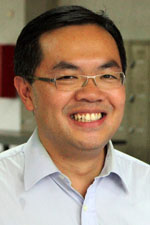 A/P Goh Q & A
A/P Goh Q & A
1. What are some of your fondest memories of Dr John Elliott, first as a teacher, and later as a colleague?
John encouraged critical thinking and we always had very illuminating discussions during his tutorials (see photo on page 28); of course, tutorials at that time only had between 5 and 7 students, so very difficult to hide! He was quite a tough marker though - never got an A from him for my term papers; but then again, As were given out very sparingly during that period (and there were no CAs at that time; the term paper grades were not counted). As a colleague, he was always willing to give advice to young hires, and his experience helped me immensely in the crafting of exam questions when I first started helming my own modules. I also remember he was very particular in signing or agreeing to legal documents - he once refused to upload materials into IVLE (the forerunner of LumiNUS) because he felt NUS did not provide enough protection for staff.
2. What motivated you to study psychology at NUS as an honours and then Masters student, and what prompted you to return to the department to teach and carry out research projects?
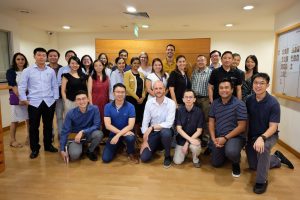 I was in the pre-med programme in junior college, so the path seemed straightforward for me. But I started reading about psychology as a course in various government information booklets and thought this was more interesting than medicine - I also didn't do well at the A levels, so perhaps this was fate telling me to take another path. However, this meant you had to go overseas as there was no psychology programme offered locally and my parents could not afford an overseas education. So when I was accepted in FASS, I was set to major in the closest one at the time - Sociology. I didn't start right away as I had to serve National Service; and in my second year of NS, I found out that NUS had started a psychology programme (again, fate may have been looking out for me!). Fortunately, I did well enough in the aptitude test (required then) to be allowed to major in Psychology. Everyone was hoping to do Honours, and at the time, you had to be invited, so I was elated when the Department of Social Work and Psychology offered me Honours, no motivation required. As for the Masters, I worked as an RA after completing my Honours, so I wanted to see if a research and academic career appealed to me, and decided to do my Masters while I was a TA for the Department. After that, NUS funded my PhD overseas on a staff development scheme, so I was obligated to return to serve a bond. In a sense, NUS Psychology has been my home since I started as an undergrad student, for I never left!
I was in the pre-med programme in junior college, so the path seemed straightforward for me. But I started reading about psychology as a course in various government information booklets and thought this was more interesting than medicine - I also didn't do well at the A levels, so perhaps this was fate telling me to take another path. However, this meant you had to go overseas as there was no psychology programme offered locally and my parents could not afford an overseas education. So when I was accepted in FASS, I was set to major in the closest one at the time - Sociology. I didn't start right away as I had to serve National Service; and in my second year of NS, I found out that NUS had started a psychology programme (again, fate may have been looking out for me!). Fortunately, I did well enough in the aptitude test (required then) to be allowed to major in Psychology. Everyone was hoping to do Honours, and at the time, you had to be invited, so I was elated when the Department of Social Work and Psychology offered me Honours, no motivation required. As for the Masters, I worked as an RA after completing my Honours, so I wanted to see if a research and academic career appealed to me, and decided to do my Masters while I was a TA for the Department. After that, NUS funded my PhD overseas on a staff development scheme, so I was obligated to return to serve a bond. In a sense, NUS Psychology has been my home since I started as an undergrad student, for I never left!
3. What future plans are in the works for NUS Psychology and how do they connect to the need for scholars and practitioners of the discipline in Singapore and the region?

Top psychology departments in the world are very well resourced with research spaces, laboratories, and facilities; so we hope to move in that direction and provide all of our research-active staff dedicated lab spaces to do research that will benefit Singapore and the discipline in general. We will also need to see how many more students (we have always been one of the more in-demand majors since inception) will want to be Psychology majors with the advent of the College of Humanities and Sciences, and perhaps develop various teaching innovations to serve an even more expanded student body (the days of 5-7 pax tutorials, or a 10-student Honours cohort in my year, are long gone). But we have very good educators in the department, so I am not worried about that. Our Clinical Psychology Masters programme is also in very high demand, given the focus on mental health needs nowadays. So we will need to see how we can support training for manpower needs in the public and private sectors in terms of workshops for associate psychologists, in additional to training people to be professional clinical psychologists.
Thank you very much for your time and answers, Prof Vasoo and A/P Goh! Readers can learn more about the history of the NUS Department of Psychology here. Catch the book launch on Friday December 10th at 11 AM by registering via Zoom.
NUS Faculty of Arts and Social Sciences 18th Dean Takes Office
IN BRIEF | 2 min read
-
Dean of the Faculty of Arts and Social Sciences, Professor Lionel Wee, and other members of the Deanery take on their leadership roles today.
Professor Lionel Wee has assumed the position of Dean of the NUS Faculty of Arts and Social Sciences (FASS) and Co-Dean of the College of Humanities and Sciences (CHS) as of today, Friday, 1 October 2021. Prof Wee takes over the helm from Professor Robbie Goh, who is now the Provost of the Singapore University of Social Sciences.
Before becoming FASS' 18th Dean, Prof Wee was the Faculty’s Vice Dean of Research from 2014 till 30 September 2021 and is a Professor of Linguistics with the Department of English Language and Literature. He was also the Head of the Department of English Language and Literature from 2010 to 2014 and is a Provost's Chair Professor of Linguistics with the Department of English Language and Literature.
“It is an honour to be given the opportunity to helm the Faculty of Arts and Social Sciences. The Faculty has achieved much since its founding nearly a century ago, continually evolving to anticipate and address the needs and challenges of a changing society," said Professor Wee. "Together with the Deanery, colleagues, and students of the FASS, I am confident that we will continue to make breakthroughs in both education and research. While these benchmarks are important, diversity and inclusion are priorities for me, and essential pillars of every organisation. My plan is to further emphasise and ensure our staff and students feel empowered and safe in the Faculty in the coming years."
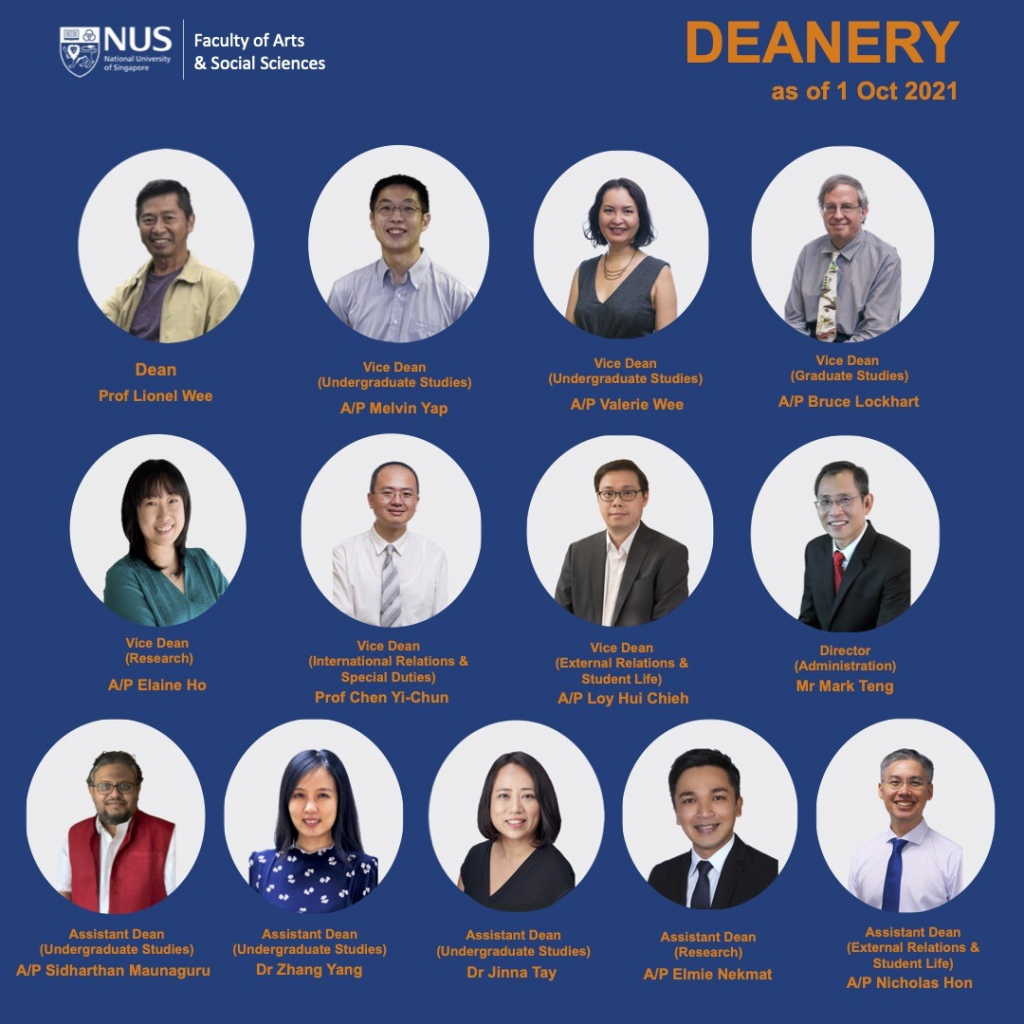
New Appointments to the Strong Leadership
Beginning their new roles with the FASS Deanery today are:
- Associate Professor Elaine Ho (Geography) as Vice Dean (Research). She was previously Assistant Dean (Research)
- Associate Professor Elmie Nekmat (Communications and New Media) as Assistant Dean (Research)
The following members of the Deanery will continue to serve in their respective positions:
- Associate Professor Melvin Yap, Vice Dean (Undergraduate Studies)
- Associate Professor Valerie Wee, Vice Dean (Undergraduate Studies)
- Associate Professor Bruce Lockhart, Vice Dean (Graduate Studies)
- Professor Chen Yi-Chun, Vice Dean (International Relations and Special Duties)
- Associate Professor Loy Hui Chieh, Vice Dean (External Relations and Student Life)
- Mr Mark Teng, Director of Administration
- Associate Professor Sidharthan Maunaguru, Assistant Dean (Undergraduate Studies)
- Dr Zhang Yang, Assistant Dean (Undergraduate Studies)
- Dr Jinna Tay, Assistant Dean (Undergraduate Studies) – recently appointed to the Deanery on 1 July 2021.
- Associate Professor Nicholas Hon, Assistant Dean (External Relations and Student Life)
Fewer, and Fewer
IN BRIEF | 2 min read
- In her review of the fourth instalment of the Maya Dance Theatre's PANCHA series in Lianhe Zaobao, Associate Professor Thang Leng Leng of the NUS Department of Japanese Studies (and Co-Director of Next Age Institute, as well as Fellow (Honorary) of the College of Alice and Peter Tan), delves into how the performance explores the notion of shared space and time and attempts to answer questions such as those surrounding relationships between the young and old in society.
Click through to read this article.
This story first appeared in Lianhe ZaoBao on 22 September 2021.
New NUS Dean of Arts and Social Sciences Appointed
IN BRIEF | 5 min read
-
Professor Lionel Wee will be appointed the new dean of the NUS Faculty of Arts and Social Sciences (FASS) and co-dean of the College of Humanities and Sciences from 1 October 2021.
-
Prof Goh, who has served as the Dean since 2017, will be taking a leave of absence from the University, but will continue to contribute in the Singapore education sector as the new Provost at the Singapore University of Social Sciences from 1 October 2021.
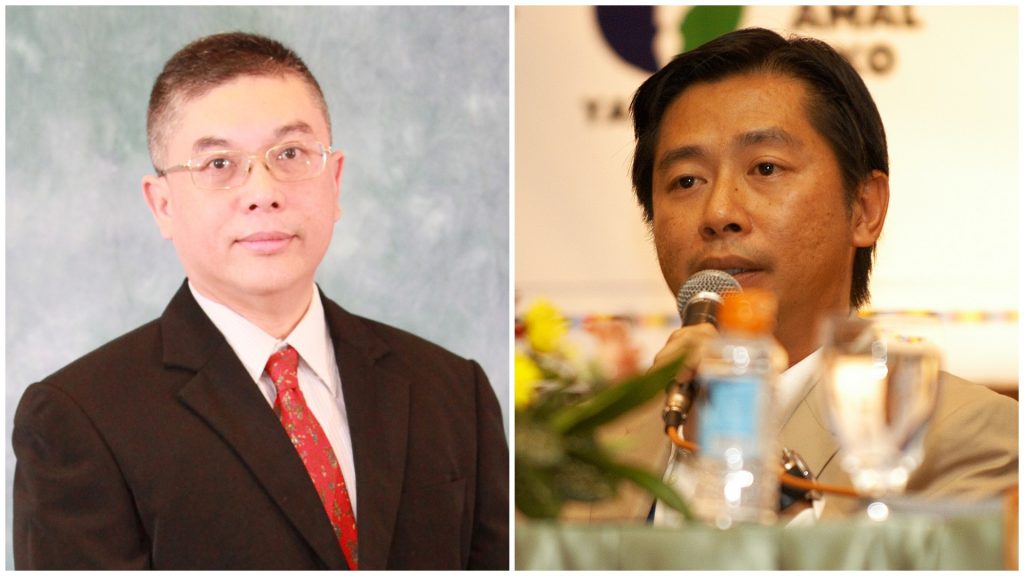
The University today announced the appointment of Professor Lionel Wee as the new Dean of its Faculty of Arts and Social Sciences (FASS) and Co-Dean of the College of Humanities and Sciences. Prof Wee will take over the helm from Prof Robbie Goh as the Faculty’s 18th Dean from 1 October 2021.
Currently FASS Vice Dean of Research and Professor of Linguistics in the Department of English Language and Literature, Prof Wee was appointed Provost’s Chair Professor in July 2017 for his outstanding scholarly achievements.
After graduating from NUS in 1988 with a Bachelor of Arts (First Class Honours) degree majoring in English Language and Sociology, Prof Wee embarked on an academic career, joining the University as a Teaching Assistant with the Department of English Language and Literature. He was awarded the NUS Overseas Graduate Scholarship where he pursued his PhD in Linguistics at the University of California, Berkeley. Prof Wee was appointed as a Lecturer upon his return to Singapore in 1995, and rose the ranks to full Professorship in 2012.
“NUS is pleased that after a rigorous global search, Prof Lionel Wee has been selected to be the next Dean. He is passionate about high quality education and research, and has an excellent understanding of FASS and the University, having served in numerous leadership roles at the department, faculty and university-levels. I am confident that he will bring the Faculty to new heights of international excellence,” said NUS President Professor Tan Eng Chye.
Besides serving as Vice Dean of Research at FASS from 2014 to present, Prof Wee was also the Head of the Department of English Language and Literature from 2010 to 2014. He had also contributed on various committees such as Chair of the FASS Faculty Promotion & Tenure Committee II, Chair of the University Mid-Term Advisory Report Committee, and Member of the University Promotion and Tenure Committee. In recognition of his dedicated service and contributions to NUS and education in Singapore, Prof Wee was awarded the National Day Awards Public Administration Medal (Bronze) in 2020 and the Long Service Medal in 2018.
“I am excited and honoured to be given this opportunity to lead my alma mater as its next Dean. Having spent more than three decades at FASS, both as a student and a faculty member, I have experienced firsthand the selfless commitment of my colleagues and impressive insights our students bring to the study of the arts, humanities and social sciences. I am confident that together, we can continue to make significant contributions to society while enhancing our Faculty’s standing as one of the leading humanities and social sciences faculties in the world,” said Prof Wee.
Besides his passion in linguistics, Prof Wee feels very strongly about animal welfare and is also very much an avid city traveller, although the pandemic has put quite a damper on travel in the past year or so. He also enjoys the cafes, a habit which he picked up during his time as a graduate student in Berkeley. Students and colleagues at FASS may have many a times seen Prof Wee deep in thought at the cafes across the NUS campus. He is very much focused in developing a particular idea or argument once he is seated down and would need to walk around before he can move on to another new idea.
Prof Wee has published widely in international and local journals, and also sits on the editorial boards of a number of academic journals and publications, including Applied Linguistics, English World-Wide, Multilingual Margins, The Journal of Asian Linguistic Anthropology, the “Cambridge Elements: World Englishes” book series, and the “Multilingualisms and Diversities in Education” book series. He is a well-respected scholar with research interests in the areas of language policy (especially in Southeast Asia), the grammar of Singapore English, metaphorical discourse, and general issues in sociolinguistics and pragmatics.
Prof Goh, who has served as the Dean since 2017, will be taking a leave of absence from the University. However, he will continue to contribute in the Singapore education sector as the new Provost at the Singapore University of Social Sciences from 1 October 2021.
Prof Goh said, “It has been a privilege and honour to serve as Dean of one of Singapore’s largest and most historied Faculties. I am grateful to my talented colleagues for all their hard work. I believe that together, we have brought the Faculty to new heights of excellence in teaching, research and service. I look forward to the work of creating new programmes and nurturing talent in my next role as Provost of the Singapore University of Social Sciences, and hope that I will also be able to forge new ties and collaborations between the two universities."
Having spent more than three decades at the University, Prof Goh has taken on numerous administrative and leadership roles outside of the Faculty. He was Deputy Director of the NUS Centre For the Arts from 1996 to 1999, and Deputy Director of the Asia Research Institute from 2008 to 2010.
“On behalf of the University, I would like to express my heartfelt appreciation to Professor Robbie Goh for his dedication and strong stewardship in leading NUS FASS. Under his visionary leadership, the Faculty has made significant contributions to the advancement of education and research in the humanities and social sciences. During his leadership, the FASS 2.0 Industry Tracks programme was started to enhance the employability of its graduates. New multidisciplinary initiatives such as the Philosophy, Politics & Economics programme were also established. The Faculty has also expanded collaborations with industry and further strengthened its high international reputation,” added Prof Tan.
This story first appeared on NUSnews on 13 August 2021. The full press release is here, and Professor Lionel Wee's biography is here.
From Careers for a Lifetime, to a Lifetime of Careers
IN BRIEF | 5 min read
-
The top skills desired by employers will include critical thinking, analysis, problem-solving and self-management skills such as active learning, resilience, stress tolerance and flexibility.
What does the future of work look like? In this evolving world, new occupations and roles which did not previously exist continue to emerge, while certain traditional skills and jobs continue to become obsolete.
The World Economic Forum’s (WEF) The Future of Jobs Report 2020 (October 2020) highlighted a few key trends.
First, technological adoption of cloud computing, Big Data and e-commerce in many businesses will accelerate the transformation of jobs, skills and entire industry value chains. 85 million jobs are expected to be displaced by a shift in division of labour from humans to machines by 2025, while 97 million new roles may emerge.
Second, online learning and training boomed during the pandemic. The shift was a watershed moment, and there is no turning back for many industries. The pandemic also brought into sharper focus the importance of lifelong learning, with more employees upskilling and reskilling to stay relevant in the volatile job market. More workers are now pursuing personal and professional development, especially in digital skills.
Last but not least, the top skills desired by employers will include critical thinking, analysis, problem-solving and self-management skills such as active learning, resilience, stress tolerance and flexibility.

What skills do employers seek?
Many of these in-demand skills highlighted in WEF’s report corroborate CFG’s Industry Insights Survey (2020). Drawing on insights from career events, industry surveys and engagements, CFG’s survey cited a similar list of soft skills that are becoming increasingly imperative at the workplace.
These are abilities learnt through life experiences that are impervious to change, and relevant across all professions and workplaces. They are attributes we take with us when we embark on job pathways in the New Normal - which are shifting from one defined career over a lifetime, to a series of dynamic and rapidly changing careers.
Our survey clusters these abilities into two main categories: Personal Qualities and Workplace Traits.
Personal qualities
Many employers are looking for individual cognitive abilities such as problem-solving, learning agility and pattern-recognition. They are also seeking graduates who are equipped with design and computational thinking, as well as proficiency in quantitative analysis.
They want graduates who are able to look at problems from different perspectives, to solve complex problems in real-world environments. For example, can a customer service issue be resolved with a combination of user interface design changes, IT infrastructure automation and manpower staffing? What are consumer consumption patterns and behaviours telling us?
Employers also seek character traits such as curiosity, resilience, empathy, proactivity, leadership and adaptability. These traits are predictors of future potential, and potentially determine career longevity and progression. For example, are you curious to learn what other teams or functions are doing beyond your job scope and discover potential synergies? Are you adaptable to changes in your project scope, and possess a “can-do” attitude in the face of obstacles?
Workplace traits
Besides personal qualities, employers are also looking for graduates who possess certain desirable workplace traits. These include good communication and presentation skills, cultural sensitivity and a global mindset. Graduates with business acumen, who are able to influence and negotiate, and are competent in managing different teams and projects, are much sought after.
These attributes mirror the realities of the modern workplace, where teams and projects are becoming more diverse, cross-functional, cross-cultural and business-driven. For example, can you work with a diverse team of colleagues towards achieving a common objective? Can you visualise your organisation’s business potential in an overseas market or a new customer segment?
The call to CHS students
In CHS, you will acquire interdisciplinary knowledge and skills by learning how to draw connections, links and insights across diverse disciplines. It is this important foundation of interdisciplinarity that will better prepare our students to become problem-solvers in an uncertain world beyond the pandemic.
Even as the pandemic has accelerated digital transformation, data is now the new asset that enables businesses to enhance efficiency and augment the ability of their teams to deliver greater value. CHS will focus on competencies like data literacy and design thinking, skills that are now in high demand by industries seeking to unlock value from Big Data.
Beyond academics, internships are one of the best ways to hone workplace experience. When you are on vacation, aim for at least two (if not more) internships, preferably one with an overseas employer. Immerse yourself in co-curricular activities, which provide hands-on opportunities to gain skills such as leadership, teamwork and project management. These experiences in your resume and portfolio will place you in a better stead with employers.

Enhancing employability, preparing for careers
CHS students will have a dedicated Career Advisor, who will guide you through the process of developing a personal career plan. You will be pre-assigned a career preparation module, Career Compass, closely following CFG’s four-year Career Readiness Roadmap which provides a formal framework for your career planning during your undergraduate journey.
You will be enrolled in Career Catalyst, a foundational freshmen module that identifies your core strengths and enhances your profile towards securing an internship. As you progress to Years Two/Three and your final year, you can also sign up for our Career Booster workshops or Career Advancement Webinar Series (CAWS).
Article contributed by the Centre for Future-ready Graduates (Ms Joan Tay, Director and Career Advisors Mr Ryan Ang and Mr Ng Buck Seng)
This story first appeared on CHS on 29 July 2021.
NUS CHS Case Competition: Driving EV Adoption in Singapore
IN BRIEF | 1 min read
- The just-released problem statement for NUS CHS' inaugural Case Competition – Encouraging electric vehicle (EV) ownership in Singapore – is an important real-world topic of especial relevance to us all, as the nation is driving toward a future of electric mobility that is essential to the Singapore Green Plan 2030.

Are you interested in translating your innovations to reality by applying interdisciplinary knowledge and skills?This is now possible with the inaugural College of Humanities and Sciences (CHS) Case Competition, launched on 26 July.
The competition is specially designed for NUS students, and enables participants to synthesise ideas and perspectives from different disciplines to solve complex, real-world challenges.
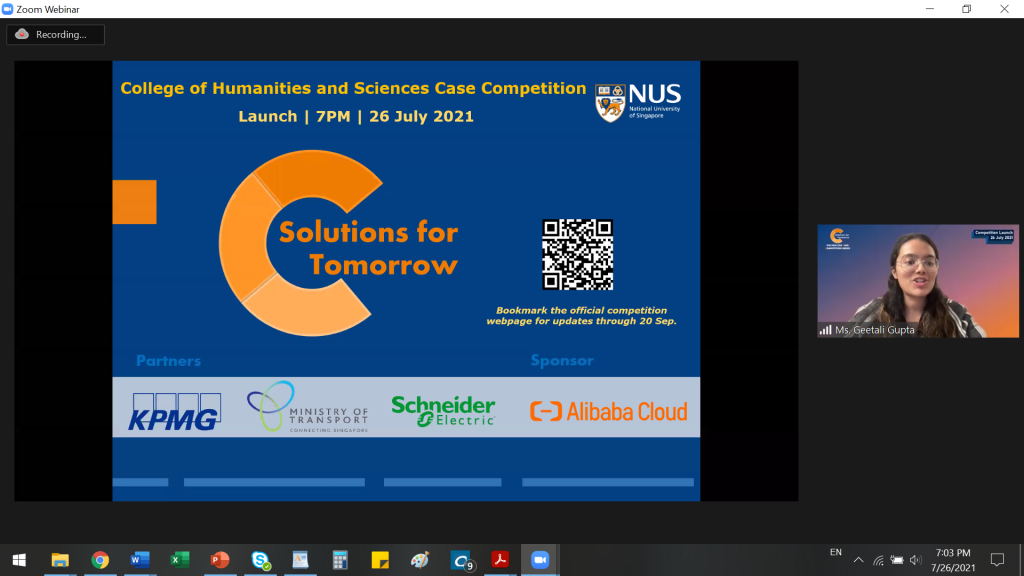
The competition themes, “Sustainability” and “Technology and Us”, are highly topical today. The problem statement - Encouraging electric vehicle (EV) ownership in Singapore - is an important real-world topic, even as Singapore ushers in a future of electric mobility as a key piece of the puzzle in the Singapore Green Plan 2030.
At the virtual launch, our competition partners - the Ministry of Transport, KPMG and Schneider Electric - discussed plans by the Singapore government to usher in the future of EV, Schneider Electric’s vision of a 100% electric mobility future with net-zero carbon emissions and upcoming trends in mobility solutions identified by the advisory arm of KPMG.
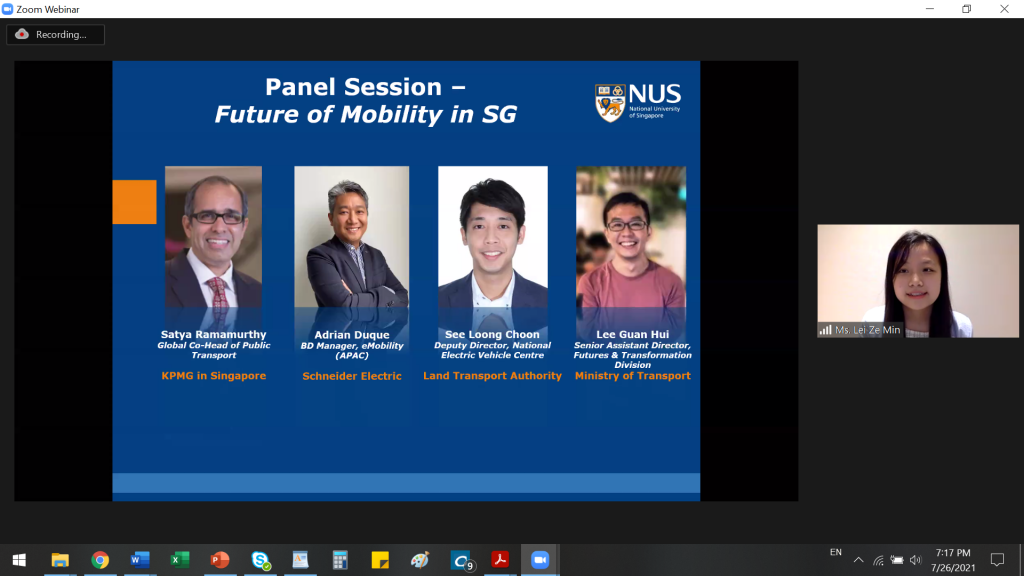
Participants will have the opportunity to attend mid-term workshops in mid-August, which provide important domain knowledge, including engineering and design, and communications skills.
The project submissions will be judged in the final round of the competition on 20 September by representatives from our competition partners. They will also be sharing their EV domain expertise with the participating teams throughout the competition.
The launch was attended by more than 100 participating teams (close to 200 individual attendees) from across NUS.
Find out more about the competition here and read the problem statement here.
Strong Interest in Interdisciplinary Learning With High Acceptance Rates
IN BRIEF | 5 min read
-
NUS President Professor Tan Eng Chye discusses the University’s recent interdisciplinary initiatives – the setting up of the College of Humanities and Sciences (CHS) and the new Common Curriculum for the Faculty of Engineering and the School of Design and Environment – and the importance of lifelong learning in ensuring that students are adaptable and future-ready.
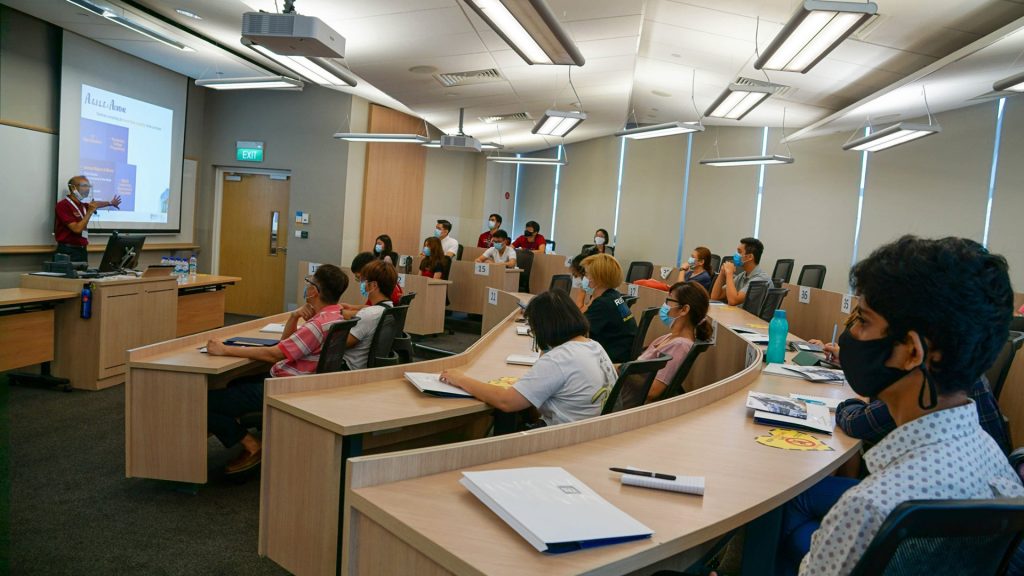
In today’s volatile, uncertain, complex and ambiguous (VUCA) world, staying stagnant is never an option. Now, more than ever, universities have to prepare students to thrive in a fast-changing and unpredictable post-COVID reality through an interdisciplinary education.
Just ask the incoming batch of freshmen, who have given a thumbs-up to the University’s recent interdisciplinary initiatives – specifically, the setting up of the College of Humanities and Sciences (CHS), and the new Common Curriculum for the Faculty of Engineering and the School of Design and Environment.
During the admissions exercise this year, 71 per cent of those who had applied to these programmes as the first choice accepted the offer. Among the incoming batch of freshmen, over 4,000 will be exposed to an interdisciplinary education. By August 2022, NUS hopes to push this number to more than 6,000.
“We are quite heartened that the applicants have responded very well,” said NUS President Professor Tan Eng Chye, as he spoke on the new changes in NUS’ curriculum. “They are receptive to the flexibility that they will have. No more are you confined to one discipline.”
Prof Tan noted that the world faces many wicked problems that cannot be solved with only one discipline.
He cited COVID-19 as a wicked problem, requiring more than just medical sciences to solve. “Even with the right medical knowledge, many countries had difficulties handling COVID-19 and its spread,” he noted.
The pandemic, in fact, prompted NUS to ramp up efforts in remodelling its educational philosophy and pedagogies to prepare its graduates for this dynamic reality.
At the centre of these reforms is the push for lifelong learning, as well as the shift towards interdisciplinary education to ensure students are adaptable and future-ready.
A lifetime of learning
While universities used to prepare their graduates for a single job, this approach is fast becoming obsolete. Today, graduates will change jobs at least 10 times over the course of their lifetime.
In line with this trend, NUS has been future-proofing its education to prepare students for lifelong learning.
“A student’s enrolment is valid for 20 years from the point they enter the university,” Prof Tan explained. “We want to remove the conception that university is only for four years. You can always come back to (NUS) to learn new skills and knowledge.”
For instance, the NUS Lifelong Learners (L3) programme upskills alumni through a wide array of skill-based, industry-relevant courses, carefully tailored to focus on emerging skills identified under SkillsFuture such as data analytics or digital literacy.
The process of returning to NUS for further studies is also made seamless. If a student does not complete a second major or degree in their initial four years, they are welcome to return to the university to read the necessary remaining modules even after graduation.
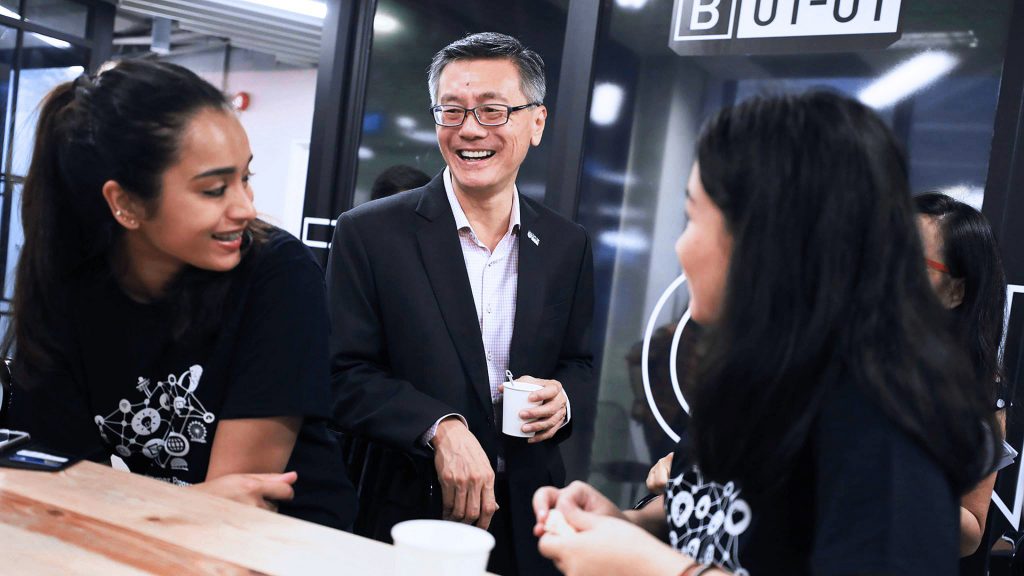
Towards interdisciplinary learning
Recognising the benefits of interdisciplinary learning, NUS is rolling this out to more students.
This started with the launch of CHS, which brings together the Faculty of Arts and Social Sciences and the Faculty of Science.
In the upcoming semester, CHS will admit 2,200 students and they will take a new Common Curriculum within their first three semesters – consisting of integrated modules with a problem-based pedagogy.
Similarly, a Common Curriculum has been introduced for the Faculty of Engineering and the School of Design and Environment to encourage knowledge transfer between the two complementary disciplines.
For instance, NUS’ very own net-zero energy building at SDE4 is a product of melding both architecture and engineering – the first of its kind in Singapore.
“The building’s beautiful architectural design alone doesn’t contribute to it being net-zero energy. What you have is a lot of deep engineering work embedded into it. It shows that architects have to work very closely with engineers in order to achieve this,” explained Prof Tan.
With interdisciplinary learning, the proportion of Unrestricted Elective modules a student can take has also been increased to up to 30 per cent, encouraging students to have two or more specialisations.
In the four faculties that now have an interdisciplinary common curriculum, this works out to more than 700 possible double major pairings, 1,700 major-minor pairings, and 100,000 major with double minor combinations.
Expanding choices for students
Ultimately, these educational innovations create greater flexibility for students to curate their own curriculum.
They will no longer have to make an immediate commitment to a single discipline. Instead, they are given time to decide on their academic calling through the common curriculum.
These efforts are central to NUS’ flagship role as a creator, integrator and propagator of knowledge.
Looking ahead, the structural barriers between faculties will further dissolve, allowing students to build even broader connections between disciplines.
“Right now, we have 70 majors and 80 minors, but we may actually have more as we go along. We start with a minor. If there’s enough interest, we push it to a second or full major. The possibilities are endless especially as we move online,” said Prof Tan.
This story first appeared on NUSnews on 26 July 2021.
Creating New Internship Opportunities: Engaging Employers to See Value in Humanities and Social Sciences
IN BRIEF | 4 min read
-
Mr Jonathan Sim, instructor from the Department of Philosophy, describes how he engaged with local employers to open internship opportunities to humanities and social sciences students who would not previously have been considered.

Humanities and social science majors are frequently misunderstood, in Singapore as in many other parts of the world. The value of their education is regularly questioned, and many employers are unaware of the value such majors can bring to the table. They prefer to hire graduates with more explicitly “practical” degrees for jobs that humanities and social sciences students could excel in.
As a result, humanities and social sciences students are not typically considered for many organisations and roles, despite offering relevant and useful skills.
So when developing an internship module, I began reaching out to organisations to create internship opportunities in such roles, to boost receptivity to hiring students from these disciplines. This enabled potential employers to better understand how students in subjects they might have previously overlooked can fill gaps in their talent pool.
Compounding the issue is that many humanities and social sciences students are unaware of the diversity of careers available to them and tend to limit themselves to roles stereotypical of their majors. There is a good reason for this. When these students apply for non-stereotypical roles, they are often turned down due to having an “impractical” major.
I regularly hear employers and people in the corporate sector lamenting the lack of creativity and critical-thinking and communication skills in their industries. These key capabilities are needed to challenge assumptions, innovate and improve processes within organisations. Employers’ lack of awareness of the value of humanities and social sciences is preventing them considering this potential talent pool.
Starting an internship module
I teach a module on data analysis and philosophical reasoning to hundreds of students each semester. With so many students under my charge, I was inspired by the idea that education is more than just about imparting knowledge. Rather, it is about facilitating growth in one’s students by providing them with opportunities for challenge and development.
As a result, I decided it would be worthwhile to experiment with an internship module where I approach employers, explain the value my students can bring to their organisation and ask them to offer temporary roles not typically filled by humanities and social sciences majors. A model designed to be mutually beneficial to both employers and students.
Here are my key lessons in how to do this:
Start by approaching contacts working in human resources (HR) and ask them to link you up with senior management or with department heads of your target companies. I initially spoke to friends in HR and some of them linked me up with HR professionals from other organisations.
Provide reassurance that you will be guiding and mentoring the students throughout the programme. My credentials as a university educator meant employers were generally open to exploring this strategic partnership.
Prepare and present a pitch clearly describing what value and skills your students can bring to the companies where you wish to secure internships. I explained how my students were excellent in data analytics, coding and problem-solving, and their training in humanities and social sciences meant they could bring unique perspectives thanks to creativity and critical thinking. Having worked with the students for one semester already, I could also vouch for their character, including attributes such as work attitude, independence and willingness to learn.
Discuss the job scope and be honest and realistic about what your students can and cannot do. I helped advise the hiring managers on my students’ capabilities, based on what I had taught them, and sometimes this meant suggesting new items in the job scope that the organisation may not have considered.
Invite students to apply for the roles available by submitting their CVs, then interview shortlisted candidates. I found interviews useful to get a better understanding of what students wanted to do and what they hoped to achieve during the internship. The application process also provided an opportunity to work with students to improve their CVs and interview skills before they spoke to employers.
Try to match students with internship roles that will best suit their personality, skills and career aspirations.
During the internships, check in on students regularly and ask them to share any challenges, so you can help them troubleshoot any issues. My role was more like an adviser pointing them to resources or giving life advice on how to handle novel social or professional situations.
Ask the students to write reflections centred on how their training in humanities and social sciences can be applied to the work they do as an intern. This helped me gauge the extent of their learning but also nudged students towards deeper reflection on their discipline to see its value and relevance in the work they did. It was very eye-opening to see concrete examples of how students found connections and applications between their studies and their work.
Benefits to organisations and students
These collaborations have proven mutually beneficial. They allow participating organisations to develop strategic partnerships with the university, helping employer branding and making it easier for them to attract talent.
At the same time, the student interns become living proof to employers that their major makes them as good as, if not better than, some students from more “practical” disciplines. The internships help inform humanities and social sciences students that they can take on roles they never thought were open to them.
We have completed one round of internships with organisations such as Henkel, a German multinational chemical and consumer goods company, and Azendian, a local AI data analytics start-up.
Students were pleased with the chance to take up roles they would not have ordinarily pursued, or been given a chance to try, in areas such as supply chain and logistics management, database management and data analytics for marketing. The internships provided profound insights on how they can apply the skills from their majors in ways that allow them to craft a niche in such roles.
The first round of placements seems to have persuaded employers to be more receptive when it comes to hiring humanities and social sciences students, as they have asked for more interns in subsequent iterations.
This is just the beginning, and there is a lot more that we can achieve in our capacity as university faculty by engaging with local organisations and employers. We can work to create more internship opportunities and help employers better understand the capabilities of our students across multiple disciplines here in Singapore and further afield.
This story first appeared on Times Higher Education on 21 June 2021.
Commencement 2021: Special Message of Congratulations to the Classes of 2020 and 2021!
IN BRIEF | 3 min watch
-
FASS Faculty and students congratulate the Classes of 2020 and 2021 and wish them all the best as they go out to change the world for the better!
“We believe in you. I believe in you. Go out there, do us proud. Make the world a better place.” — Associate Professor Loy Hui Chieh, FASS Vice Dean of External Relations and Student Life FASS, joint committee member of the NUS Philosophy, Politics, and Economics (PPE) programme, and also Faculty member of staff at the NUS Department of Philosophy.
Faculty and students talk about what life has been for them this past year, what they miss about campus life, and extend words of advice and congratulations to the graduating Classes of 2020 and 2021.
This video features Assoc Prof Loy and Dr Lohsnah Jeevanandam, Senior Lecturer, NUS Department of Psychology, as well as students from the graduating Classes of 2020 and 2021: Alvarez Brielle Clavel ('20); Somesh s/o Sailesh ('20); Douglas Ong ('20), Christina Chen (Doctoral Class of '20); Ng Qian Qian ('21); and, Lai Wei Na ('21).
Meet the Neighbours: The Seven Animals You’ll Spot in NUS
IN BRIEF | 5 min read
-
NUS is not only a second home for staff and students, but also a place for a wide range of biodiversity to call home. Mr Athanasius Koh, a management trainee with the NUS Faculty of Arts and Social Sciences (FASS) and FASS Political Science alumnus ('21) tells us about the interesting animals he has spotted around campus.
Beyond the lecture theatres, classrooms and student hangout spots, it is hard to miss the lush greenery that surrounds NUS. This has made the campus environs not only a second home for staff and students, but also a place for a wide range of biodiversity to call home.
These habitats are here to stay too. Emphasising NUS’ commitment to preserving its rich biodiversity, fighting climate change and being an environmentally responsible campus, the “Planting 10,000 Trees” initiative launched by NUS President Professor Tan Eng Chye in 2018 saw 500 mature trees planted throughout the campus, as well as 9,500 saplings nurtured in the NUS nursery. In addition, a strict policy to protect existing trees was also implemented.
Mr Athanasius Koh, a management trainee with the NUS Faculty of Arts and Social Sciences (FASS) Corporate Communications team for the past six months, and avid nature photographer, takes regular photo walks exploring these habitats. Mr Koh, who is also from the FASS Class of 2021, shares about the interesting animals he has spotted along the way.
Collared Kingfisher (Todiramphus chloris)
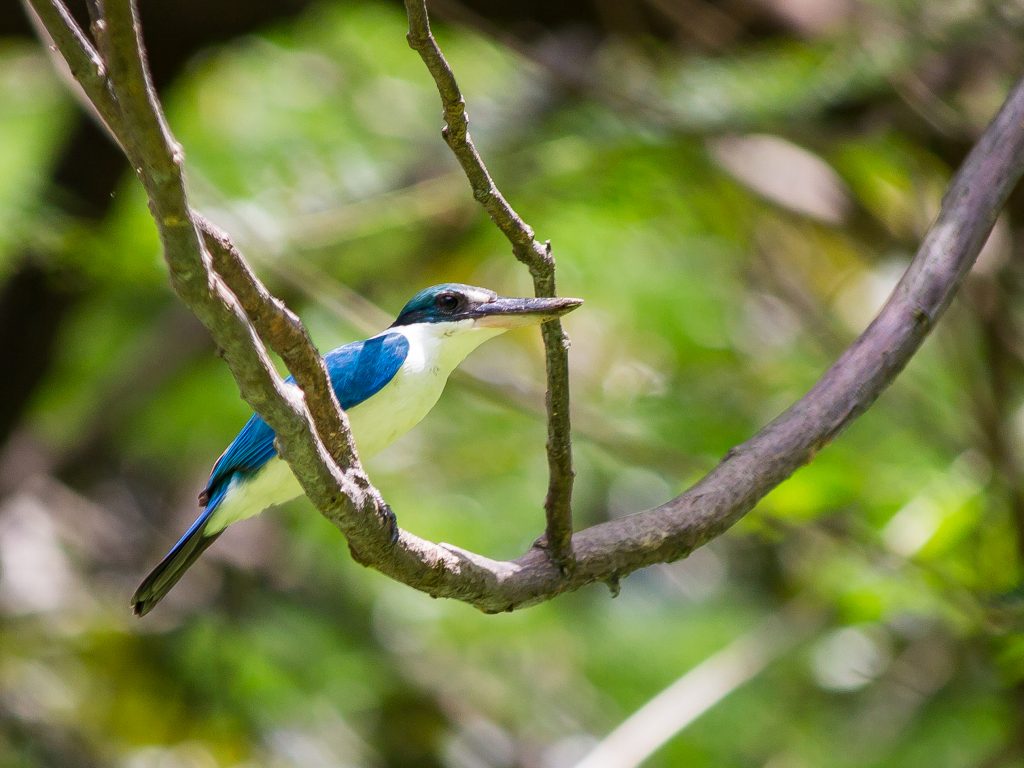 A collared kingfisher perched on a tree at AS8. (Photo: Mr Athanasius Koh)
A collared kingfisher perched on a tree at AS8. (Photo: Mr Athanasius Koh)
Dressed in beautiful blue feathers and a broad white “collar” around its neck, the collared kingfisher is a vocal bird spotted about campus with its series of harsh “kee-kee” notes, described by some as a maniacal laugh.
The collared kingfisher has also been quite the icon in Singapore’s history, gracing not only stamps but even the now decommissioned $10 note as part of The Bird Series Currency Notes from 1976 to 1984.
Look out for the collared kingfisher’s outstanding blue plumage as it rests atop trees and lamp posts. This sharply dressed celebrity is an easy spot around FASS and NUS Faculty of Engineering.
Red Junglefowl (Gallus gallus)
 Male red junglefowls proudly flaunt their dark green tail feathers and black primary feathers. (Photo: Mr Athanasius Koh)
Male red junglefowls proudly flaunt their dark green tail feathers and black primary feathers. (Photo: Mr Athanasius Koh)
Even if you have never personally caught sight of the resident FASS red junglefowl, you are more than likely to have heard its signature “cock-a-doodle-doo” around the faculty. Often confused for the domestic chicken, the red junglefowl is in fact its wild ancestor.
According to a study led by NUS ornithologist Associate Professor Frank Rheindt, the red junglefowl can be quite easily distinguished from the domestic chicken. Male red junglefowls proudly flaunt their dark green tail feathers and black primary feathers while females have distinguishing grey legs and sport black primary feathers.
While it remains a mystery why it crosses the road, the red junglefowl and its loud presence has certainly captured the attention of students and staff alike.
Plantain Squirrel (Callosciurus notatus)
 A plantain squirrel resting on a tree behind AS4. (Photo: Mr Athanasius Koh)
A plantain squirrel resting on a tree behind AS4. (Photo: Mr Athanasius Koh)
Scurrying and leaping from tree to tree, the plantain squirrel is an adorable sight if you are lucky to observe one at rest or enjoying its meal. This active animal is one of the most common mammals in Singapore and can be identified by distinctive black and white stripes on the sides of its body and its long bushy tail.
These physical features might have you thinking what a beautiful squirrel it is, and you are not alone! In fact, Callosciurus, the plantain squirrel’s taxonomic group, translates to “beautiful squirrel”.
Blink and you just might miss this nimble creature, but the plantain squirrel can be commonly found on the trees around NUS such as at the NUS Faculty of Science. Listen out for the rustling of leaves and you just might come face-to-face with this lovable rodent.
Rose-Ringed Parakeet (Psittacula krameri)
 A rose-ringed parakeet perches on a branch after breakfast along the AS6-AS8 walkway. (Photo: Mr Athanasius Koh)
A rose-ringed parakeet perches on a branch after breakfast along the AS6-AS8 walkway. (Photo: Mr Athanasius Koh)
Often moving in flocks and squawking in unison, the rose-ringed parakeet is a loud presence in NUS. Sporting a bright green plumage, orange beak and blue-tipped tail, males also have an added pink collar around their neck in their third year.
The rose-ringed parakeet was introduced to our green spaces as escaped pets. Native to the Indian subcontinent and northern Southeast Asia, it is a resilient bird that has thrived even in locations as far as Europe!
A bird that you might hear before you see, the rose-ringed parakeet has been spotted on sunny mornings at FASS’ Lovers’ Park and along the walkway between Blocks AS6 and AS8 grabbing its breakfast.
Yellow-vented Bulbul (Pycnonotus goiavier)
 The Yellow-vented Bulbul is easily distinguishable from its black eye-mask, olive-brown back and yellow undertail (Photo: Mr Athanasius Koh)
The Yellow-vented Bulbul is easily distinguishable from its black eye-mask, olive-brown back and yellow undertail (Photo: Mr Athanasius Koh)
One of the most common birds in Singapore’s many green spaces besides the mynah, the yellow-vented bulbul is an easy spot with its black eye-mask, olive-brown back and wings and most strikingly, yellow undertail.
An unfussy fellow, the yellow-vented bulbul has been observed to feed on a variety of small fruits and insects. In addition, it can sometimes be seen carrying strips of man-made waste like plastic bags and tissue paper to be used as nesting material. You might have heard its distinct chirps before, without knowing that it was the yellow-vented bulbul, but now you can keep an eye out for them too! Spot them in shrubs and trees around campus, such as the patch of greenery right outside NUS Press at Block AS3.
Changeable Lizard (Calotes versicolor)
 Adult male changeable lizards develop an orange-coloured head and black patches over their cheeks during the mating season (Photo: Mr Athanasius Koh)
Adult male changeable lizards develop an orange-coloured head and black patches over their cheeks during the mating season (Photo: Mr Athanasius Koh)
Often mistaken for the chameleon, the changeable lizard definitely is not one at all, but that does not stop it from changing its colours when it needs to! Usually brownish to greenish yellow with faint stripes along its body, adult males develop an orange-coloured head and black patches over their cheeks during the mating season.
As common as this rapid reptile is, you might be surprised to know that it is not native to Singapore. It is believed that it was accidentally introduced in the 1980s and has since populated in numbers, aggressively displacing the native green crested lizard (Bronchocela cristatella).
While the changeable lizard is somewhat adept at camouflaging, its timid nature means that you are more likely to find it scurrying away the moment there is a slightest disturbance, rustling up the grass. They can be seen all around campus such as at the FASS Fragrant Plant Garden or outside The Deck.
Oriental Pied Hornbill (Anthracoceros albirostris)
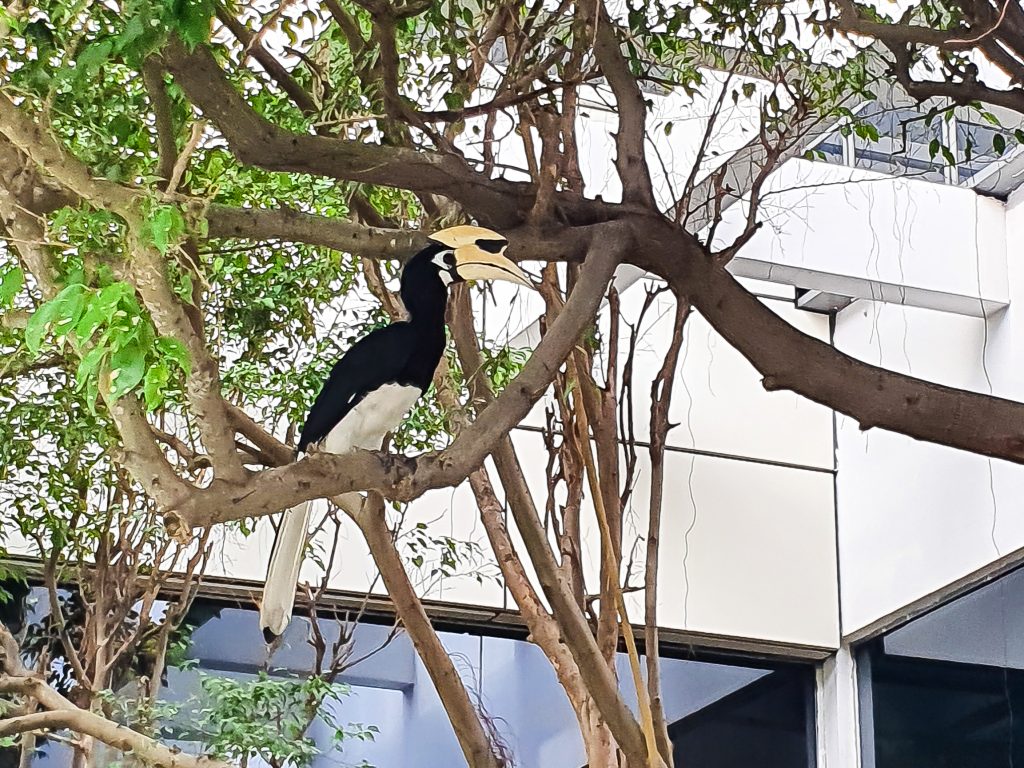 An oriental pied hornbill perches on a tree outside of AS7, Shaw Foundation Building. (Photo: Mr Athanasius Koh)
An oriental pied hornbill perches on a tree outside of AS7, Shaw Foundation Building. (Photo: Mr Athanasius Koh)
The oriental pied hornbill has certainly made an impactful comeback to Singapore’s shores. Once thought to be locally extinct, the large bird can be identified by its casque atop its beak as well as its black and white plumage.
Along with other “celebrity wildlife” like the otters in Singapore, the oriental pied hornbills’ return to the mainland can be largely attributed to conservation efforts by the National Parks Board, Wildlife Reserves Singapore and the local research community. These efforts include providing sufficient mature trees for hornbills that favour nesting in tree holes.
Spotted across a number of locations in Singapore, NUS is no exception. It has been spotted in University Town and around FASS Block AS1 as well as the trees outside AS7, Shaw Foundation Building.
Now that you have met some of the interesting wildlife that have called NUS their home, be sure to keep an eye out for our neighbours in nature between classes! Do appreciate them from a safe distance and refrain from feeding them.
This story first appeared on NUSnews on 17 June 2021.
NUS CHS Case Competition: Solutions for Tomorrow
IN BRIEF | 1 min read
- The NUS College of Humanities and Sciences has launched the Case Competition Series. Register your interest now!
 The NUS College of Humanities and Sciences has launched the Case Competition Series, which seeks to encourage undergraduate and post graduate students to apply their curriculum learning to tackle complex real-world challenges that require interdisciplinary approaches to their solution. The students, who are expected to work in teams comprising members from across different disciplines, will be presented with a complex problem (to be shared at the start of the competition in late July), and given four weeks to build their cases in consultation with participating industry and Faculty advisers before their presentation for the first round of judging. Scan the QR code below or just click here to register your interest as team leader for this competition now. More details will be released to participants next month.
The NUS College of Humanities and Sciences has launched the Case Competition Series, which seeks to encourage undergraduate and post graduate students to apply their curriculum learning to tackle complex real-world challenges that require interdisciplinary approaches to their solution. The students, who are expected to work in teams comprising members from across different disciplines, will be presented with a complex problem (to be shared at the start of the competition in late July), and given four weeks to build their cases in consultation with participating industry and Faculty advisers before their presentation for the first round of judging. Scan the QR code below or just click here to register your interest as team leader for this competition now. More details will be released to participants next month.
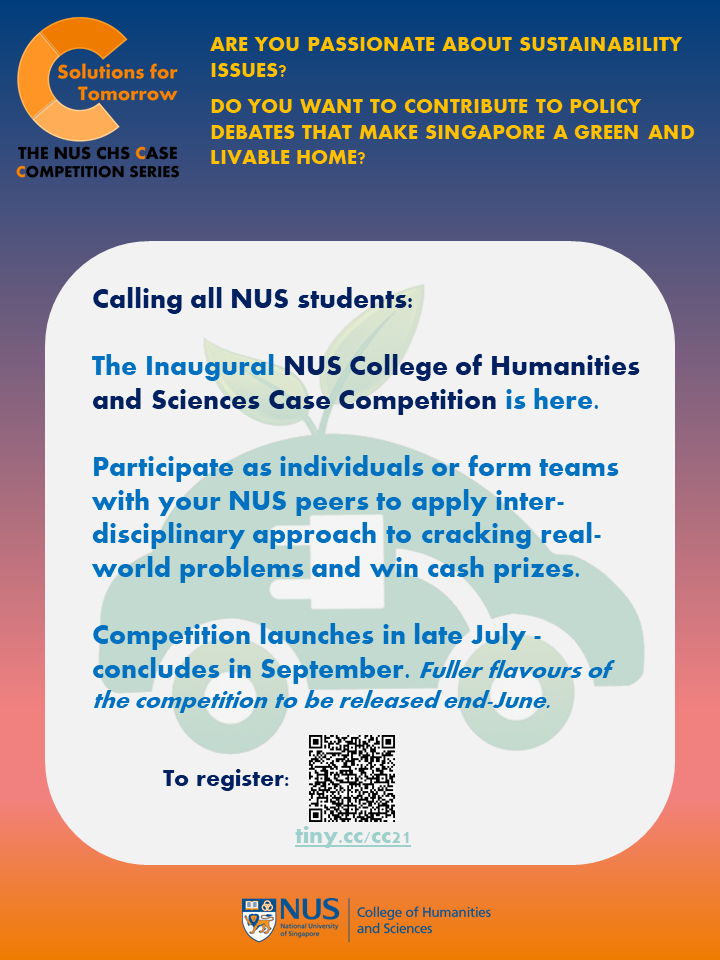
Honouring five outstanding alumni from Arts and Social Sciences
IN BRIEF | 3 min read
- Five exceptional NUS Faculty of Arts and Social Sciences (FASS) alumni from diverse backgrounds were lauded at the annual FASS Distinguished Arts and Social Sciences Alumni Awards 2020 in a simple presentation ceremony on 30 April at Swissotel The Stamford.
 (From left to right): FASS alumni Mr Yatiman Yusof, Mr Niam Chiang Meng, Ms Lim Sau Hoong, Mr Ravi Menon and Dr Liang Wern Fook have made singular contributions to the areas of the arts, education, media, finance, policy and community development.
(From left to right): FASS alumni Mr Yatiman Yusof, Mr Niam Chiang Meng, Ms Lim Sau Hoong, Mr Ravi Menon and Dr Liang Wern Fook have made singular contributions to the areas of the arts, education, media, finance, policy and community development.
Five exceptional NUS Faculty of Arts and Social Sciences (FASS) alumni from diverse backgrounds were lauded at the annual FASS Distinguished Arts and Social Sciences Alumni Awards 2020 in a simple presentation ceremony on 30 April at Swissotel The Stamford.
All have left their distinct mark in the wide-ranging fields that they serve. They are namely:
- Mr Yatiman Yusof (Geography and Malay Studies, ’72), Non-Resident High Commissioner of Singapore to Kenya
- Mr Niam Chiang Meng (Economics, ’83), Chairman of the Maritime and Port Authority of Singapore (MPA)
- Ms Lim Sau Hoong (Chinese Studies, ’83), Founder, Former CEO and Executive Creative Director of advertising agency 10AM Communications
- Mr Ravi Menon (Economics, ’87), Managing Director of the Monetary Authority of Singapore (MAS)
- Dr Liang Wern Fook (Chinese Studies, ’89 and Master of Arts, ’92), Writer, musician and educator
Congratulating the award recipients, FASS Dean Professor Robbie Goh said, “Ms Lim Sau Hoong, Dr Liang Wern Fook, Mr Ravi Menon, Mr Niam Chiang Meng and Mr Yatiman Yusof, have made singular contributions to the arts, education, media, finance, policy and community development. Not only do their wide-ranging achievements bring pride to the FASS family, but I believe that it also attests to the disciplinary range, intellectual curiosity and critical thinking that are the hallmarks of the FASS educational experience.”
This disciplinary diversity, Prof Goh elaborated, would soon be enhanced by FASS’ partnership with the NUS Faculty of Science in the NUS College of Humanities and Sciences (CHS) where students would be able to choose any major that is offered by both faculties. He added that this would be a major boost to FASS students’ educational experience as “the CHS common curriculum will prepare students for a disruptive world – by giving them a compulsory grounding in essential skills such as writing and communication, data literacy, digital literacy, design thinking and AI.”
Our alumni and their contributions
 Present at the ceremony were (clockwise from top left): FASS Dean Prof Robbie Goh; Mr Menon; Dr Liang; Mr Bernard Toh, Director of NUS Alumni Relations; Mr Niam; Ms Lim; Mr Yatiman; and NUS President Prof Tan Eng Chye.
Present at the ceremony were (clockwise from top left): FASS Dean Prof Robbie Goh; Mr Menon; Dr Liang; Mr Bernard Toh, Director of NUS Alumni Relations; Mr Niam; Ms Lim; Mr Yatiman; and NUS President Prof Tan Eng Chye.
A teacher and a journalist early on in his career, Mr Yatiman served key government appointments including as a Member of Parliament and Senior Parliamentary Secretary of the Ministry of Foreign Affairs and the then-Ministry of Information and the Arts, before his retirement in 2006. In addition to being Singapore’s non-resident envoy to Kenya, Mr Yatiman is a Board Member of the Singapore Press Holdings Foundation and the Chairman of the Malay Language Council of Advisors.
Contributing extensively to the public sector too was Mr Niam who served in the Ministries of Finance, Trade and Industry, Health, Law, and Information, Communications and the Arts – including Permanent Secretary appointments in several of these Ministries. He also served at the National Population and Talent Division, and the National Climate Change Secretariat. Aside from his current MPA chairmanship, Mr Niam is also the Chairman of Gardens by the Bay Pte Ltd and MediaCorp Pte Ltd.
A heavyweight in the media, marketing, and advertising industry, Ms Lim’s creative leadership of 10AM Communications has garnered over 300 prestigious global awards including The One Show, the Clio Awards, and the Communication Arts. Identified for her unique creative talent, Ms Lim was Visual Advisor to the Planning Committee for the 2008 Beijing Olympics’ Opening Ceremony and headed the Shanghai World Expo 2010 Singapore Pavilion Advisory Panel. In 2007, Ms Lim was awarded the President’s Design Award and was named Designer of The Year for her extensive contributions to media, marketing and culture in Singapore.
Prior to his appointment at MAS, Mr Menon served as Permanent Secretary at the Ministry of Trade and Industry, and Deputy Secretary at the Ministry of Finance. A recipient of the Singapore Government’s Meritorious Service Medal and Public Administration (Gold) Medal, he has served on boards in the public, private, and people sectors. He is currently Chairman of the Institute of Banking and Finance, and serves on the Board of Trustees of the Singapore Indian Development Association.
A singer-songwriter, poet and academic in Chinese literature and language, Dr Liang is a respected cultural figure and pioneer of Xinyao – a movement of locally composed Mandarin pop songs from the 1980s. To date, Dr Liang is the only artist who has received the National Arts Council’s Young Artist Award (Literature) and the prestigious Cultural Medallion (Music) across different art genres. He was also honoured recently with the Singapore Chinese Cultural Contribution Award for his outstanding contribution to the promotion, enrichment and development of Chinese Singaporean culture. His canon of work includes over 15 publications of literature, more than 200 songs, and two Mandarin musicals – a number of his most important works were written and composed during his university days.
On receiving the awards
Also present at the event was NUS President Professor Tan Eng Chye who presented the awards to the five alumni. Invited guests were also treated to videos of the award recipients who shared about their university days in FASS and their career highlights.
Recalling the moment he received news of the award, Mr Yatiman humbly shared, “To be frank, I’m quite surprised when I was told about it. And I thought there are hundreds, if not thousands of people who are more suitable to receive this award. I’m just a small worker in the community, not doing much in my lifetime. I think there are many others. So, for those who’ve been working hard for the good of the community, I take this award as recognition of their effort too.”
Mr Niam recalled some of his best memories were during university days where he learnt a lot about networking and life skills. It was also where he found his life partner. He said, “It is a privilege to be given this award. I would like to thank NUS and the organising committee for bestowing this honour on me and the other recipients…it means a great deal.”
 Taking the form of a rising star, the alumni award represents the inspiration these individuals bring to society through their brilliant contributions towards the Faculty, University and Singapore.
Taking the form of a rising star, the alumni award represents the inspiration these individuals bring to society through their brilliant contributions towards the Faculty, University and Singapore.
Established in 2015, the Awards recognise individuals for their distinguished scholarship and outstanding service to the Faculty, the University and Singapore. These outstanding recipients have made significant impact in various fields locally and internationally, which has contributed to the betterment and promotion of the arts and social sciences.
Previous recipients of the Awards include luminaries such as former President Mr S R Nathan, Emeritus Senior Minister and former Prime Minister Mr Goh Chok Tong, former United Nations Under-Secretary General Dr Noeleen Heyzer; Permanent Member of the Presidential Council for Minority Rights Mr Abdullah Tarmugi; and Executive Chairman of Banyan Tree Holdings Limited Mr Ho Kwon Ping.
Click here for more details on this year’s award recipients.
This story first appeared on NUSnews on 6 May 2021.
#DiscoverFASS@CHS 2021 | Sign Up for Masterclasses, Learn All About Our Majors
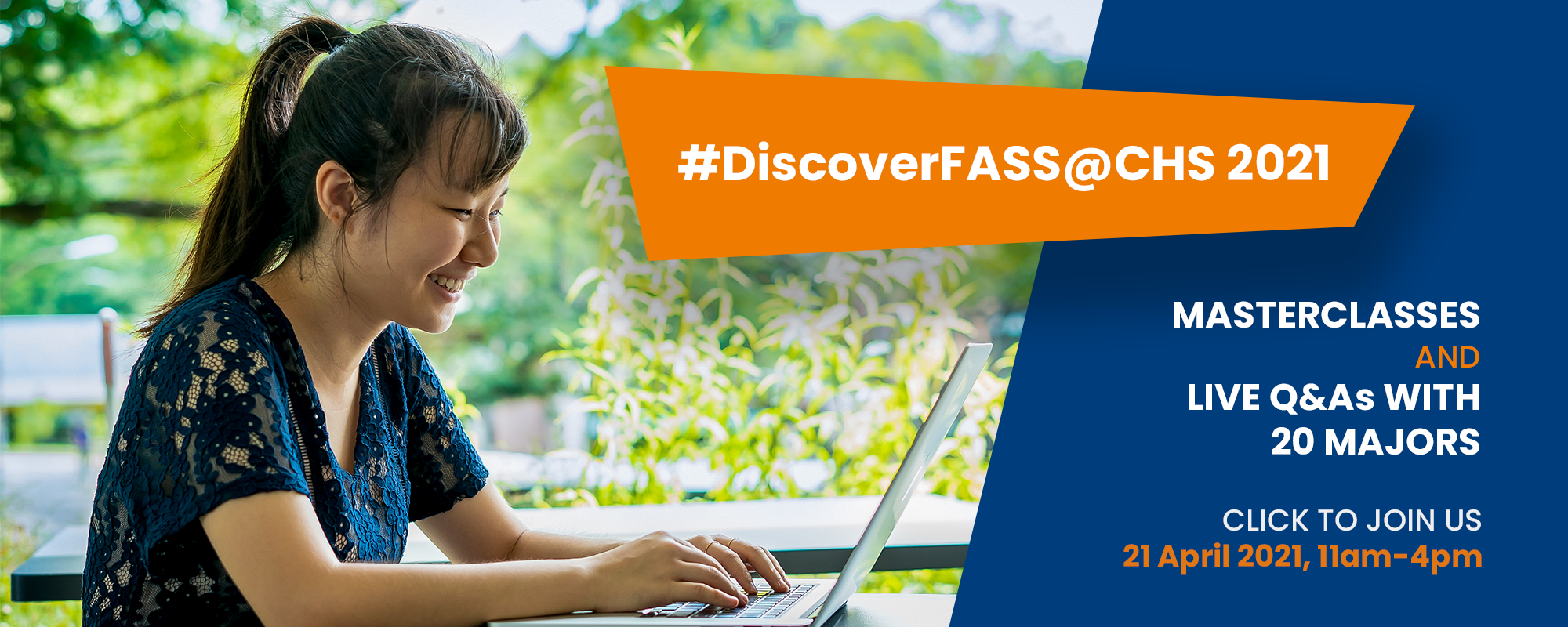
As part of the #DiscoverFASS@CHS campaign leading up to our Open House in May this year, we are holding 'live' Masterclasses presented by three of our award-winning Faculty members, and our Departments are hosting 'live' Q&A sessions for prospective students. These are opportunities not to be missed if you wish to know all you need to know about classes here and the myriad programmes available to you if you are a part of the FASS community. Masterclasses by Award-Winning Faculty
Experience lessons led by our dynamic faculty members.  Roasted Fetuses and Corpse Magic: An Introduction to Supernaturalism in Southeast Asia
Roasted Fetuses and Corpse Magic: An Introduction to Supernaturalism in Southeast Asia
Presented by Associate Professor Irving Johnson, Department of Southeast Asian Studies
The class aims to foreground the fascinating world of beliefs in supernaturalism that pervade Southeast Asian lives. Many of us enjoy telling and listening to creepy stories, watching horror movies on Netflix or dabbling in the esoteric. In this masterclass, we will look at some of the beliefs that structure constructions of the supernatural in modern Southeast Asia. The class revolves around a series of interrelated questions that seek to discover commonalities in popular belief systems and their prominence in the region, linking supernaturalism to larger issues of power, gender and politics. 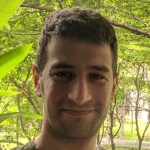 Evidence and Promise Making
Evidence and Promise Making
Presented by Assistant Professor Zachary Barnett, Department of Philosophy
Promise-making is an important part of life. We make promises to our friends, families, and significant others, and they make promises to us. We will look at a puzzle that arises when we think about "promising against the odds": How should I feel about making a promise, if I know that most of the people in my exact situation end up breaking that promise? For example, suppose that I promise to quit smoking cigarettes. At the same time, I know that most people who sincerely promise to quit smoking do not actually succeed on their first attempt. Should I believe that I will be the exception to the rule? If not, am I justified in making the promise in the first place? And if I do make the promise, should my friends and family believe me? These questions arise in many different contexts, ranging from the superficial to the serious, involving addiction or relationships. 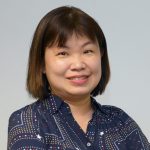 Making Sense of Self-Awareness and What That May Mean
Making Sense of Self-Awareness and What That May Mean
Presented by Dr Peace Wong Yuh Ju, Department of Social Work
In this talk, Dr Wong will attempt to broaden our understanding about ‘self’ and what that may mean to us. It is not uncommon for students in wanting to gain greater self-awareness with the attempt to learn more about one’s beliefs/feelings in relation to the observed world around us. Yet, how do we deepen our understanding of ‘self’, given that we are both familiar with who we are, and yet at times finding ourselves baffled by our reactions, and wondered why we respond in a certain manner? We will briefly discuss the various influences that may impact our values and beliefs, as well as consider what knowing your ‘self’ may mean to you.
To register for Masterclasses, click here.
Live Q&As with our Departments
Meet key Faculty and student representatives of every FASS Department and major programme in their respective Zoom meeting rooms and ask them specific questions about the requirements, content and value of the programmes they offer.
Department of Chinese Studies
The Chinese Studies Department provides training in diverse areas of Chinese Studies and Chinese Language, with the aim of preparing students for employment in a wide range of sectors. Graduates are offered career opportunities as professionals in the educational and business sectors, academia, the translation service industry and the mass media.
Join the Department's #DiscoverFASS@CHS 2021 'Live' Q&A session on 21 April (2-4 pm) here.
In the meantime, visit the College of Humanities Programmes page for more details on what this Department offers.
Department of Communications and New Media
Communications and New Media (CNM) at the National University of Singapore is the only Department in Southeast Asia that offers media studies, interactive media design, cultural studies, and communication management with a focus on new media.
Join the Department's #DiscoverFASS@CHS 2021 'Live' Q&A session on 21 April (2-4 pm) here.
In the meantime, visit the College of Humanities Programmes page for more details on the programmes offered by this Department.
Department of Economics
The Department of Economics has an established reputation as one of the largest and leading departments of Economics in the Asia-Pacific region. Faculty members’ research areas span a wide range of economic fields, with strength in the core areas of microeconomics, macroeconomics and econometrics, as well as in particular fields such as game theory and industrial organization, labor economics, education, financial economics, and growth theory and development with special reference to Asia.
The Department's #DiscoverFASS@CHS 2021 'Live' Q&A session on 21 April (2-4 pm) here. This session includes discussion of the Data Science and Economics Cross-Disciplinary Programme (DSE-XDP).
In the meantime, visit the College of Humanities Programmes page for more details on the programmes offered by this Department.
Department of English Language, Literature and Theatre Studies
The Department of English Language, Literature and Theatre Studies houses three undergraduate majors and three graduate programmes. The English Language major offers an education in linguistics, the study of human language. The undergraduate programme in English Literature is designed to provide a broad foundation in reading and analysing texts of all kinds. And, the Theatre Studies curriculum delivers education in all areas of theatre and performance history, production and interpretation.
The Department's #DiscoverFASS@CHS 2021 'Live' Q&A session on 21 April (2-4 pm) here.
In the meantime, visit the College of Humanities Programmes page for more details on the programmes offered by this Department.
Department of Geography
Modules in the Department of Geography are organized along four areas of enquiry: environmental processes and change; global political economy; society and culture; and regional specializations (with a focus on Asia). The Department also offers a Field Studies module in which students travel to countries in the region such as Thailand and Malaysia where they conduct field work and collect research material over a 3-5 week period. Home-stays and visits to local universities and key sites of interest are part of the overseas learning experience it delivers.
The Department's #DiscoverFASS@CHS 2021 'Live' Q&A session on 21 April (2-4 pm) here. This session includes discussion of the Bachelor of Environmental Studies Programme (BES-XDP).
In the meantime, visit the College of Humanities Programmes page for more details on the programmes offered by this Department.
Department of History
The Department of History offers training at undergraduate and graduate levels, and its teaching and research expertise lies primarily in the history of Southeast and East Asia, but there is strong selection of module offerings in European, American, and military history, as well as the history of art, business, religion, science and technology.
The Department's #DiscoverFASS@CHS 2021 'Live' Q&A session on 21 April (2-4 pm) here.
In the meantime, visit the College of Humanities Programmes page for more details on the programmes offered by this Department.
Department of Japanese Studies
Founded in 1981, the Department of Japanese Studies is one of the largest area studies departments devoted to the study of Japan in the Asia-Pacific region, and offers BA, MA and PhD degrees in Japanese Studies taught by specialists with qualifications from leading universities around the world.
The Department's #DiscoverFASS@CHS 2021 'Live' Q&A session on 21 April (2-4 pm) here.
In the meantime, visit the College of Humanities Programmes page for more details on the programmes offered by this Department.
Department of Malay Studies
The Department of Malay Studies actively engages in research on a wide range of issues concerning the Malay world from a multi-disciplinary perspective, promotes exchanges with centres of Malay studies worldwide, and encourages the development of new and alternative approaches to the understanding of Malay history, economy, politics, society and culture.
The Department's #DiscoverFASS@CHS 2021 'Live' Q&A session on 21 April (2-4 pm) here.
In the meantime, visit the College of Humanities Programmes page for more details on the programmes offered by this Department.
Department of Philosophy
The Department of Philosophy is one of Asia’s leading centres for philosophical education and research. It is the top English-language philosophy program in Asia, and the inaugural Asian member of the Australasian Association of Philosophy. The faculty members have a broad range of interests spanning diverse philosophical traditions, offer a philosophical education spanning diverse philosophical traditions.
The Department's #DiscoverFASS@CHS 2021 'Live' Q&A session on 21 April (2-4 pm) here. This session will also include discussion of the Philosophy, Politics, and Economics Cross-Disciplinary Programme (PPE-XDP).
In the meantime, visit the College of Humanities Programmes page for more details on the programmes offered by this Department.
Department of Political Science
The Department of Political Science offers modules in comparative politics, international relations, political theory, and public administration. It also houses the Global Studies Programme, a new, multidisciplinary field of inquiry that examines the processes and effects of globalisation across political, economic, social and cultural domains around the world.
The Department's #DiscoverFASS@CHS 2021 'Live' Q&A session on 21 April (2-4 pm) here. This session includes discussion of the Global Studies Programme.
In the meantime, visit the College of Humanities Programmes page for more details on the programmes offered by this Department.
Department of Psychology
The Psychology programme at NUS aims to equip students with knowledge in the key areas of psychology (such as human biological processes, developmental processes, social processes, cognitive processes, mental health and adjustment of individuals) as well as an understanding of the applications of psychology. It also develops skills for undertaking studies of behaviour, including statistical skills and the use of computers for data analyses.
The Department's #DiscoverFASS@CHS 2021 'Live' Q&A session on 21 April (2-4 pm) here.
In the meantime, visit the College of Humanities Programmes page for more details on the programmes offered by this Department.
Department of Social Work
The main objective of the undergraduate General and Honours degree programme offered by the Department of Social Work is to equip its graduates for entry into the social work profession at the direct-service level. Students are exposed to social service visits, skills laboratory training, fieldwork placements and module projects, among other applied learning methods.
Go to this Department's #DiscoverFASS@CHS 2021 'Live' Q&A session on 21 April (2-4 pm) here.
In the meantime, visit the College of Humanities Programmes page for more details on the programmes offered by this Department.
Department of Sociology
The Department of Sociology is a diverse, dynamic and innovative research and teaching unit with strong expertise in research on Southeast Asia, East Asia and South Asia as well as on Singapore society. One of the largest Sociology departments in the world, it offers comprehensive undergraduate, honours and graduate programmes, led by a group of dedicated and creative researchers and educators.
The Department's #DiscoverFASS@CHS 2021 'Live' Q&A session on 21 April (2-4 pm) here.
In the meantime, visit the College of Humanities Programmes page for more details on the programmes offered by this Department.
South Asian Studies Programme
South Asian Studies, as offered by the South Asian Studies Programme (SASP), focuses on the region comprising India, Pakistan, Bangladesh, Sri Lanka, Nepal, Bhutan and the Maldives. At the undergraduate level, students are offered a range of modules in economics, religious and cultural studies, history, international relations, philosophy, politics and gender studies. The aim is to provide graduates of the programme with a broad understanding of the region from different points of view - knowledge that will be useful in dealing with this changing region in the 21st century.
The Department's #DiscoverFASS@CHS 2021 'Live' Q&A session on 21 April (2-4 pm) here.
In the meantime, visit the College of Humanities Programmes page for more details on the programmes offered by this Department.
Department of Southeast Asian Studies
The Department of Southeast Asian Studies is located in the Asian Studies Division of the Faculty of Arts and Social Sciences, and offers distinctive programmes for anyone interested in studying Southeast Asia, from the undergraduate to the PhD level.
The Department's #DiscoverFASS@CHS 2021 'Live' Q&A session on 21 April (2-4 pm) here.
In the meantime, visit the College of Humanities Programmes page for more details on the programmes offered by this Department.
Centre for Language Studies
The Centre for Language Studies was established in 2001 to serve the foreign language needs of the Faculty of Arts and Social Sciences and has today over 80 full-time and part-time faculty members. It teaches thirteen different languages - Arabic, Bahasa Indonesia, Chinese, French, German, Hindi, Japanese, Korean, Malay, Spanish, Tamil, Thai and Vietnamese - to app. over 3,300 students per semester and thus helps them acquire a very valuable economic and social resource in today's world of growing globalisation and internationalisation.
The Department's #DiscoverFASS@CHS 2021 'Live' Q&A session on 21 April (2-4 pm) here.
In the meantime, visit the College of Humanities Programmes page for more details on the programmes offered by this Department.
Online Screening of "Care Nin – Thank God You’re Here –"ケアニン あなたでよかった and Special Panel Discussion on Community Aging in Japan
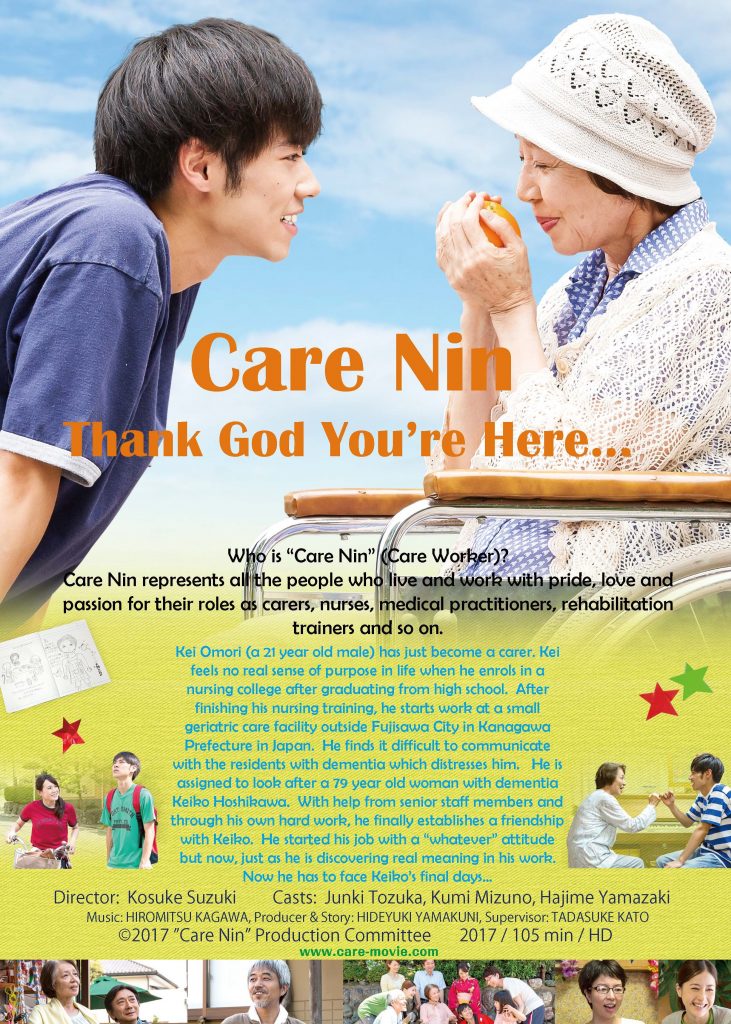
The film, “Care Nin – Thank God You’re Here –”, will be made available online to view for a limited time from 10-17 March 2021 FREE OF CHARGE. This heart-warming film pieces together stories shared by Otagaisan (Aoicare Co., Ltd.) of Fujisawa City in Kanagawa Prefecture and 30 other care facilities, technical schools, and other related organisations. It highlights the meaningfulness of work that care workers find through their profession and the preciousness of the connection between people and with the community. Screenings are free, with registration required. There will also be a special panel discussion, "Conversations on Community Aging in Japan", on 13 March 2021 from 3:00 to 4:30pm.
Film Synopsis
“I won’t let dementia end your life.” 21-year-old Kei Omori is a newly-certified care worker. His first few days working at a small multi-functional facility in the suburbs were frustrating, as Kei had a difficult time communicating with the elderly residents but he is soon assigned to be the main caregiver for 79-year-old Keiko Hoshikawa, who has dementia. Through trial and error, and with the support of his experienced colleagues, Kei gradually develops a stronger bond with Keiko and begins to get serious about his profession in caregiving.
Colour / 2017 / 105 min / Japanese audio with English subtitlesDirected by: Kousuke Suzuki
Produced by: Hideki Yoshimi, Hiroaki Kanenobu, Yasumasa Osada, Taro Yanase
Cast: Junki Tozuka, Wakana Matsumoto, Hajime Yamazaki, Kumi Mizuno
Register to view the film online (10-17 March 2021)
The film will be available for viewing online from 10 March 2021 (Wednesday), 10am, through 17 March 2021. Please register via this link, and the movie link and password will be sent to you via email two days before the screening period commences. Sharing of the movie link and password is not allowed; each viewer should register individually using the above link. If you would like to cancel your slot after you have registered, please e-mail jcc@sn.mofa.go.jp. Kindly register early to avoid disappointment. As there are limited slots available, your slot will be confirmed only upon receipt of confirmation email from JCC.
Register for Conversations on Community Aging in Japan (13 Mar 2021)
To gain a deeper understanding of care work and community aging in Japan, there will be a special panel discussion, "Conversations on Community Aging in Japan", on 13 March 2021 from 3:00 to 4:30pm. NUS Japanese Studies has invited the film's executive producer Mr. Hideyuki Yamakuni, and Mr. Shogo Murata, who does research on community care systems in Japan and Singapore, for an insightful discussion on community aging in both countries. This session will be hosted by Associate Professor Thang Leng Leng, Head, Department of Japanese Studies. Please register for the panel discussion via this link. If registration is full, or if you would like to cancel your registration, please e-mail jcc@sn.mofa.go.jp. Kindly register early to avoid disappointment. As there are limited slots available, your slot will be confirmed only upon receipt of confirmation email from JCC.
About the Speakers
Mr. Shogo Murata is a healthcare advocacy consultant at Makaira Inc (Tokyo, Japan). He is also working on his PhD at Rikkyo University, researching on integrated care initiatives in Japan and Singapore. He holds an LL.B. and MMA (Master of Medical Administration) and had been involved in social policy making as a member of the Kashiwa City Council and as a legislative assistant of a member of parliament. He also holds a social worker qualification in Japan.
Mr. Hideyuki Yamakuni is the writer and Executive Producer of "Care Nin– Thank God You’re Here –". He established Wonder Laboratory Inc. in 2007. He advocates the concept of "Cinema Social," a type of movie production that is created by and for the community. He produces films that focus on social themes for the public. He is also the Executive Producer of other films like "Gareki to radio."
Associate Professor Dr. Thang Leng Leng is Head of the Department of Japanese Studies, also co-Director of the Next Age Institute, Faculty of Arts and Social Sciences, National University of Singapore. She is a socio-cultural anthropologist with research interest on aging in Asia, especially Japan and Singapore.
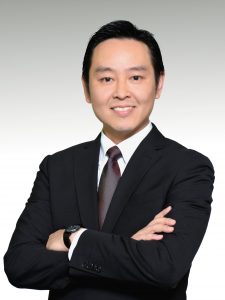
Mr Shogo Murata
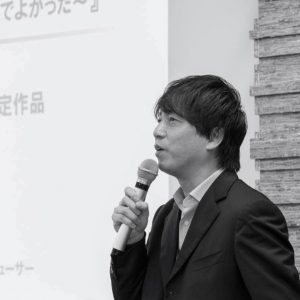 Mr Hideyuki Yamakuni
Mr Hideyuki Yamakuni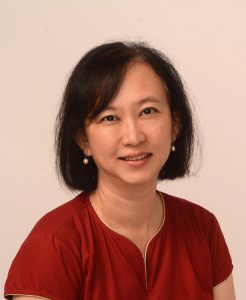 A/P Thang Leng Leng
A/P Thang Leng LengAn Evening of Kyogen Performance
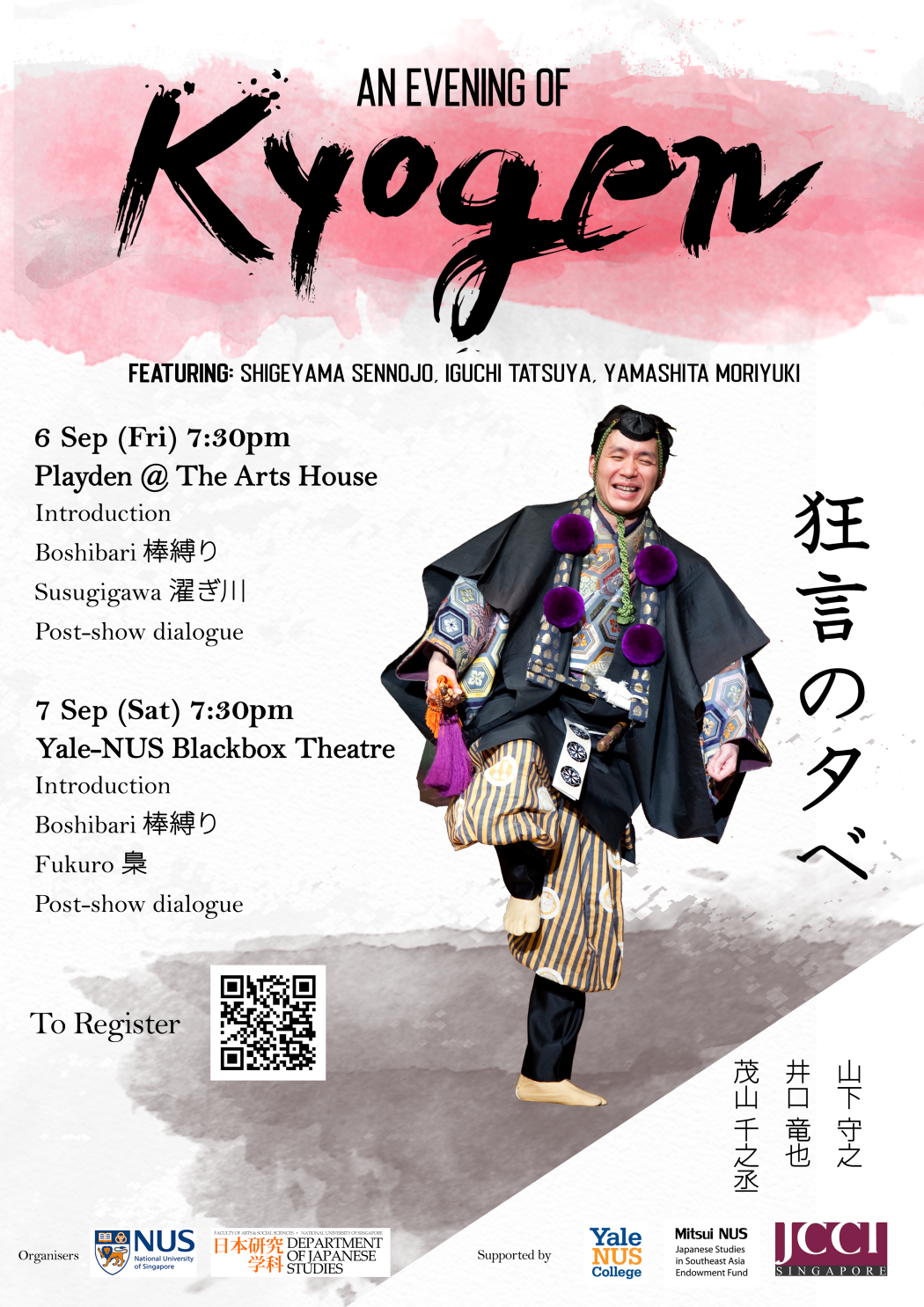
More information of the performance can be found here: https://blog.nus.edu.sg/kyogen2019/
Visual Exhibit: 50 Years of Japanese Performances in Singapore
A/P Lim Beng Choo and her Digital Humanities project team (faculty members, research students and librarians) have launched a visual exhibit of 50 Years of Japanese Performances in Singapore on the NUS Digital Scholarship Portal. In this interactive visual exhibit users can find basic performance data from 1965 till 2015, filtered with other components such as performance venue and genre. Anyone interested in Japan’s cultural presence in Singapore will find this website interesting and informative. Visit the site at https://libds.nus.edu.sg/jpsg and the NUS Digital Scholarship Portal at http://libds.nus.edu.sg for other exciting digital projects.
Mrs. Abe Visits the Department
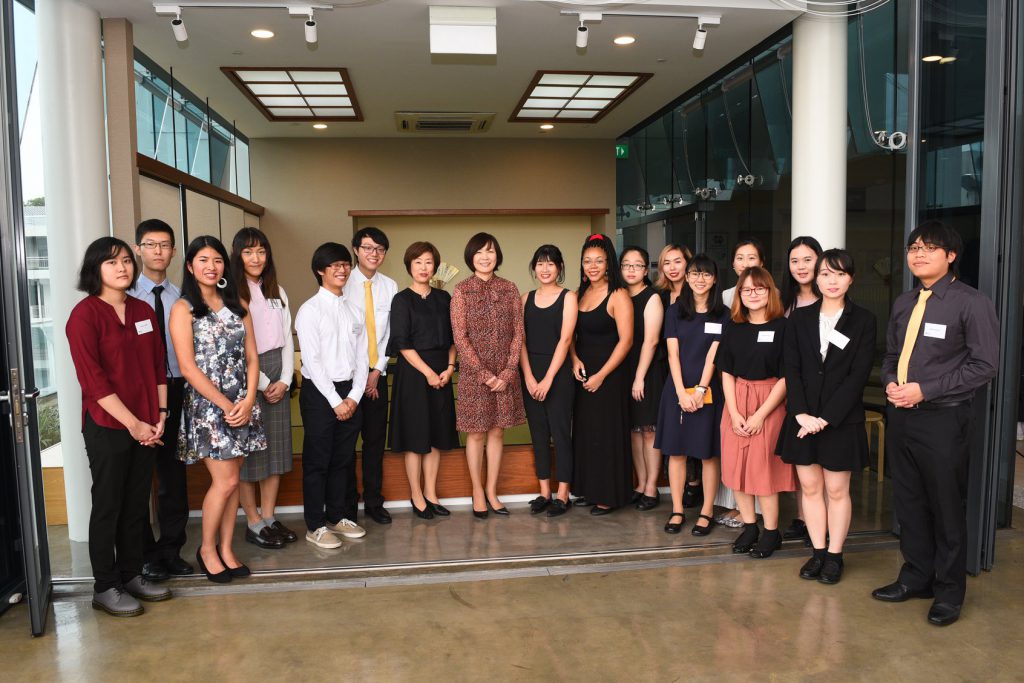
On 14 November, the Department of Japanese Studies, along with the Centre for Language Studies (CLS), welcomed Her Excellency, Akie Abe, spouse of Prime Minister Shinzō Abe. She was accompanied by Mrs. Junko Yamazaki, spouse of the Ambassador of Japan to Singapore, Jun Yamazaki. The FASS Dean, Professor Robbie Goh, as well as the two Heads of Department, officially greeted Mrs. Abe and joined her in a briefing session about the two programs. The visit also included a tea ceremony by the NUS Sadō Club and music by the NUS koto ensemble, KotoKottoN. Afterwards, Mrs. Abe met students from Japanese Studies, CLS, and several Japan-related student clubs. The students discussed their motivations for learning about Japan and their future career plans.
This little dot we call home
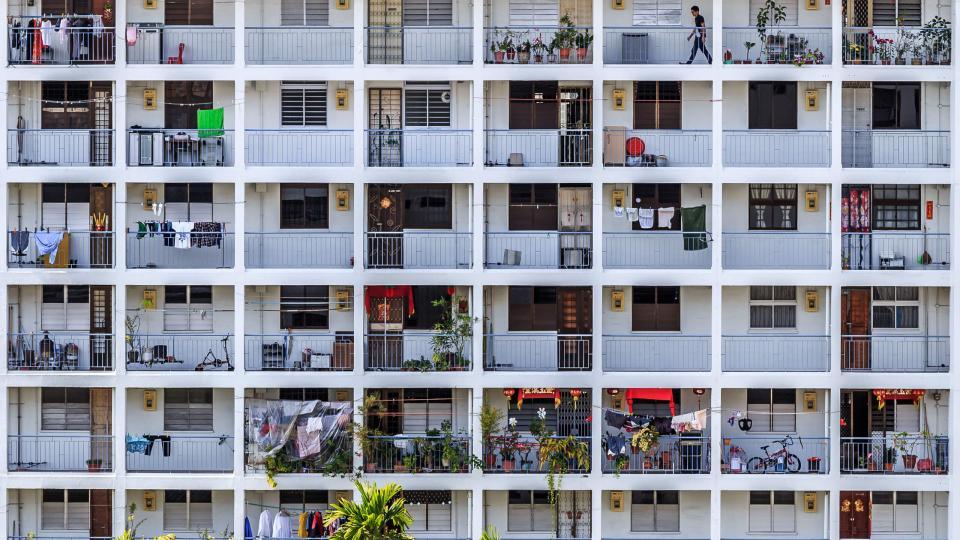
A podcast developed by Assoc Prof McMorran and students delves into the idea of home, with one episode centred around public housing
What is home? That is the question asked each week in “Home on the Dot,” a podcast led by NUS Japanese Studies Associate Professor Chris McMorran. The podcast consists of 10 episodes, each revolving around a particular aspect of Singapore related to the idea of home, such as public housing and hawker centres.
Sharing the inspiration behind the project, Assoc Prof McMorran said that while designing one of his modules — a General Education module titled “Home” — he wanted students to be able to apply what they had learnt in class to their own lives, in order to make their learning personal. He was also inspired by the British Museum and BBC’s project “A History of the World in 100 Objects” as well as “Life 101”, a podcast about the life of university students in the US. “I considered how I might blend these ideas into one, so I could learn about students, they could learn about home, and together we could share their stories with the world.”
More than 10 students were involved in the podcast, from writing scripts and recording interviews to editing and composing original music. Some had taken the Home module, while others applied to be part of the project team. “I was looking for great storytellers,” shared Assoc Prof McMorran.
The podcast’s varied topics — including intriguing ones such as Chinese offerings to the dead and haunted houses — stemmed from student research in the module. For example, one student submitted an essay on the comfort she experienced from the sound and vibration of her grandmother’s sewing machine. This prompted Assoc Prof McMorran to visit the grandmother’s home, interview her about the machine’s history and record its unique sound.
Work on the project was not all smooth sailing. “The greatest challenge has been translating student projects into an audio-only format. Some student work is very visual, so it takes some thought to make it accessible in an audio format,” said Assoc Prof McMorran.
Ironically, a concern which Assoc Prof McMorran thought would be a stumbling block did not materialise. “I thought the greatest challenge would be technical: recording, editing, uploading and managing audio files. But I have been fortunate to find students with amazing skills. They have either been self-taught, or they have completed a course in audio engineering at one of Singapore’s excellent polytechnics. We at NUS are truly fortunate to benefit from the country’s great academic institutions,” he elaborated.
Mr Stanley Chow Jun Hao, who recently graduated from NUS Arts and Social Sciences (FASS), is one of the students with audio engineering skills. Serving as the principal or second sound engineer on most of the episodes, Mr Chow said that obtaining a clean and usable recording was a main difficulty, as was gathering unique sounds for inclusion in the podcast. He added that working on the podcast has made him ponder much more now whenever the topic of home is raised.
Ms Abirami Ashok Kumar, another recent FASS graduate who took the Home module, worked on an episode about National Service — military conscription for all male Singaporeans and second-generation permanent residents. While finding it difficult initially to write for a listening audience, she felt the project team overcame the challenge with “lots of meticulous editing and revising”. She added, “As it turns out, the challenges of the auditory medium also offer opportunities for sound design that a written piece clearly would not”.
Having worked on the project, Ms Ashok Kumar has developed a new appreciation for podcasts as a learning tool, saying, “There is a certain authenticity and vulnerability in the human voice that often goes unheard in a written piece.”
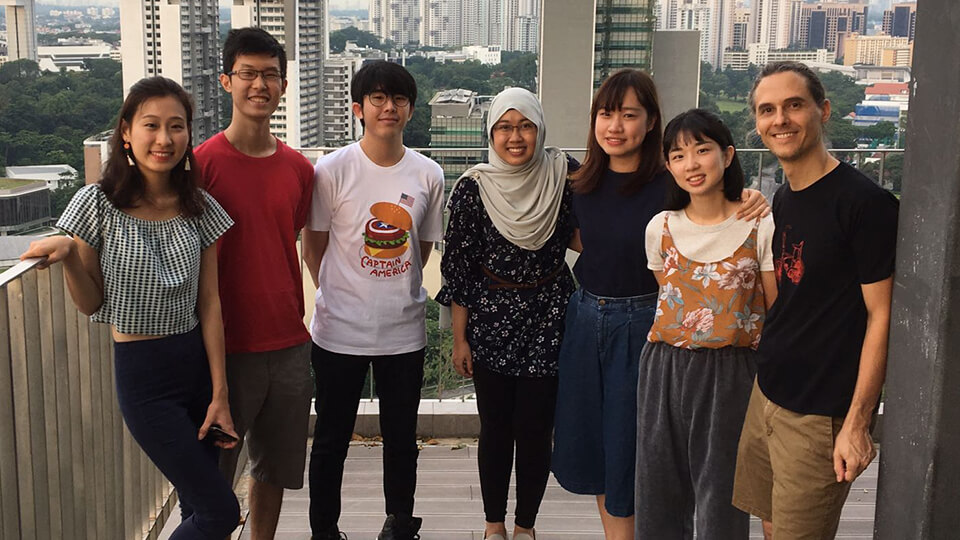
Assoc Prof McMorran (right) with some members of the podcast team (from left): Lee Sue Ling, Naomi Hashimoto, Year 4 FASS; Toh Jia Han, Year 5 FASS; Mr Chow, FASS alumnus; Raudhah Razali, Year 3 FASS; Samantha Leong Hwai Yan, Year 4 FASS; and Ms Tang Hui Jun, FASS alumna
As to whether the podcast will have a sequel, Assoc Prof McMorran said it would depend on the listeners. “If we get a sense that people are listening to and enjoying the podcast, there will be a Season 2 and possibly a Season 3,” he said. Season 2 would still be about home, with possible topics being Changi Airport and Lucky Plaza, a shopping centre popular as a home-away-from-home for foreign workers on their days off.
The podcast is available at the Home on the Dot blog or via iTunes by searching for “Home on the Dot”. Six episodes, each about 20 to 25 minutes in length, have been posted, with another four to be shared in the weeks to come.
This article was first published on 7 September 2018 in NUS News at https://news.nus.edu.sg/highlights/little-dot-we-call-home.
Film Screening - So Long Asleep (Jointly organised with Asia Research Institute)
This event is jointly organised by Asia Research Institute, and Department of Japanese Studies, National University of Singapore.
Date: 15 Nov 2017Time: 3:00 pm - 5:00 pm
Venue: Asia Research Institute, Seminar Room, AS8 Level 4, 10 Kent Ridge Crescent, Singapore 119260

Followed by Skype discussion with Project Co-Leader, Byung-Ho Chung and the Film’s Producer-Director, David Plath
CHAIRPERSON
Assoc Prof Timothy Amos, Department of Japanese Studies, National University of Singapore
ABOUT THE FILM
“So Long Asleep” chronicles the decades-long project of exhuming, memorializing, and finally repatriating the remains of 115 forced laborers from the Korean peninsula from several different worksites including the Uryu dam construction site in Hokkaido, Japan. A project begun by Jodo Shinshu priest Yoshihiko Tonohira with locals in the 1970s, it grew into a collaborative project in the 1990s which included lead physical anthropologist Sunjoo Park of Chungbuk University, Hanyang University anthropologist and social activist Byung-ho Chung, and Kichan Song, a media anthropologist at Ritsumeikan University who went as a student for the first group excavation at the Uryu Dam site. The project was an ongoing excavation and workshop that brought students from Japan and South Korea together in an effort to excavate not only remains, but histories, and in so doing create a community of awareness and mutual respect among the participants in the workshops. The film is a lyrical and haunting meditation on the ideas of return and closure, one that sensitively and thoughtfully addresses war memory, restitution, and the creation of communities not only to preserve memories but also to learn from them.
ABOUT THE PRODUCER & FILMMAKER
Byung-Ho Chung is Professor of the Department of Cultural Anthropology at Hanyang University, and president of the Korean Society for Cultural Anthropology, South Korea. For almost two decades, he has planned and practiced the excavations and repatriations of the remains of Korean forced labor victims in Hokkaido, Japan. He has also founded Steppingstones for Peace, a Korean NGO, which organizes the commemorative activities for national reconciliation and peace. His books and articles include, “North Korea: Beyond Charismatic Politics (with Heonik Kwon, 2012),” and “North Korean Refugees as Penetrant Transnational Migrants (Urban Anthropology, 2014).”
David Plath was first drawn into media production in the 1970s as a writer and member of the academic advisory panel for a project that created two semester-length TV courses on Japanese history and culture entitled, Japan: The Living Tradition and Japan: The Changing Tradition. During the 1990s, Plath worked with Jackson Bailey of Earlham College, developing the Center for Educational Media, a (pre-internet) database for teaching about Japan. They partnered with Japan’s National Institute for Media Education to produce two dozen video programs about contemporary Japan, and one about Thailand. After Bailey’s untimely death in 1996, the database was moved to the University of Illinois, where it was expanded into the Asian Educational Media Service (www.aems.illinois.edu). Plath continued to write and produce educational films about Japan, which have been broadcast on PBS, and screened at academic meetings, colleges and universities, and film festivals worldwide. In 2000, The Society for East Asian Anthropology established the David Plath Media Award, given biennially for the best new educational media on East Asian societies and cultures. Plath has published six books on Anthropology and Japan Studies, and holds a PhD in Anthropology and Far Eastern Languages from Harvard University. He is an Emeritus Professor of Anthropology and Asian Studies, University of Illinois at Urbana-Champaign.
Official Opening of the AS8 Building
On 2 October, FASS held an official opening ceremony for AS8, the new home to all Asian Studies departments. The event was opened by Dean Robbie Goh and included gamelan music and the unveiling of a mural on the 2nd storey. The opening ceremony was part of the AS8 Inaugural Conference: "Asia: The Region and the World," held 2-3 October.
As part of the celebrations for the opening of AS8, the Department joined its fellow Asian Studies departments in the AS8 Inaugural Conference: "Asia: The Region and the World." The two-day conference held 2-3 October featured presentations and discussions on themes like "The Oceanic Turn in Asian Studies" and "Theorizing from the Margins."
The Department hosted a session called "Transcultural Flows: Japan in Asia/Asia in Japan," which featured presentations by Timothy Amos, Timothy Tsu (former faculty member, currently at Kwansei Gakuin Uni), Ng Wai-ming (former faculty member, currently at Chinese University of Hong Kong), and Karl Ian Cheng Chua (former student, currently at Ateneo de Manila Uni).
For more info about the event: http://www.fas.nus.edu.sg/latest-news/as8-building.html
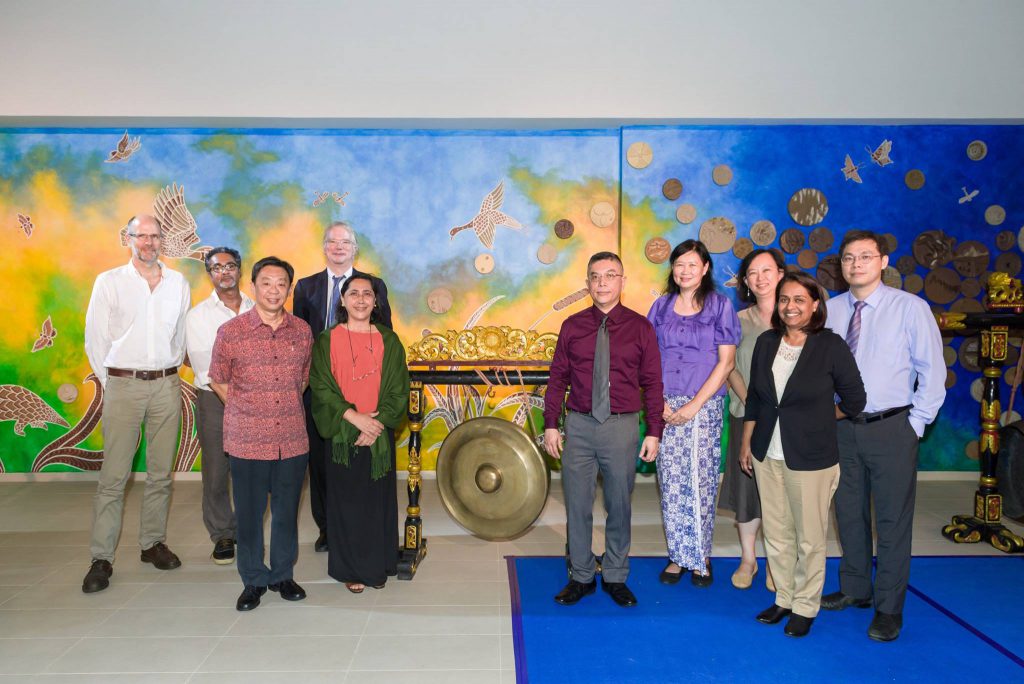
Perform Contemporary Tradition
Associate Professor Lim Beng Choo, together with the digital scholarship team members Feng Yikang and Richard Ho at the NUS libraries, has created the Perform Contemporary Tradition website. http://performct.nus.edu.sg The site is an archive for traditional performance in contemporary context, as well as a communication platform for researchers, practitioners, students, teachers and everyone who is interested in traditional performance.
The first project on the site is a collection of conference papers and video recordings of a conference organized by A/P Lim at the Department last October. With support from the Japan Foundation and our Department, the conference invited researchers and practitioners from Singapore, the Philippines, Japan, US and Europe to present research papers and lecture performances. The theme of the conference was on how traditional Japanese performance genres engage with contemporary scholarly, social and cultural context.
35th Anniversary of Japanese Studies Department
On 5 November 2016, the Department of Japanese Studies and the Japanese Studies Alumni Group organised a dinner party at the NUSS Suntec City Guild House to celebrate the Department's 35th anniversary. More than 60 former and present staff, alumni members and guests attended the special event. Participants were treated to an awesome night of good food, exciting games, and attractive prizes. Special thanks to the Faculty of Arts and Social Sciences, Office of Alumni Relations and the Kagoshima Prefectural Government for their sponsorship of door gifts and prizes!
